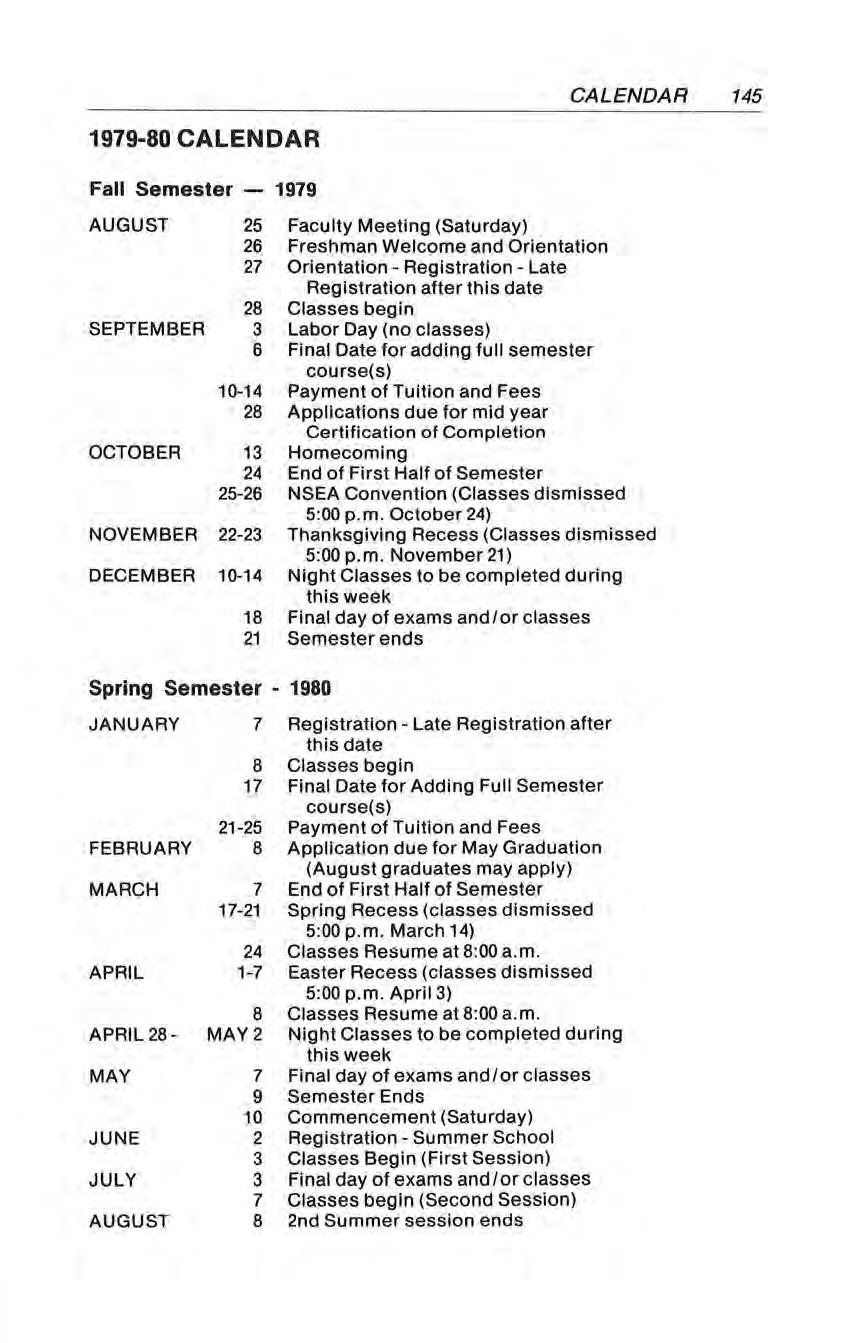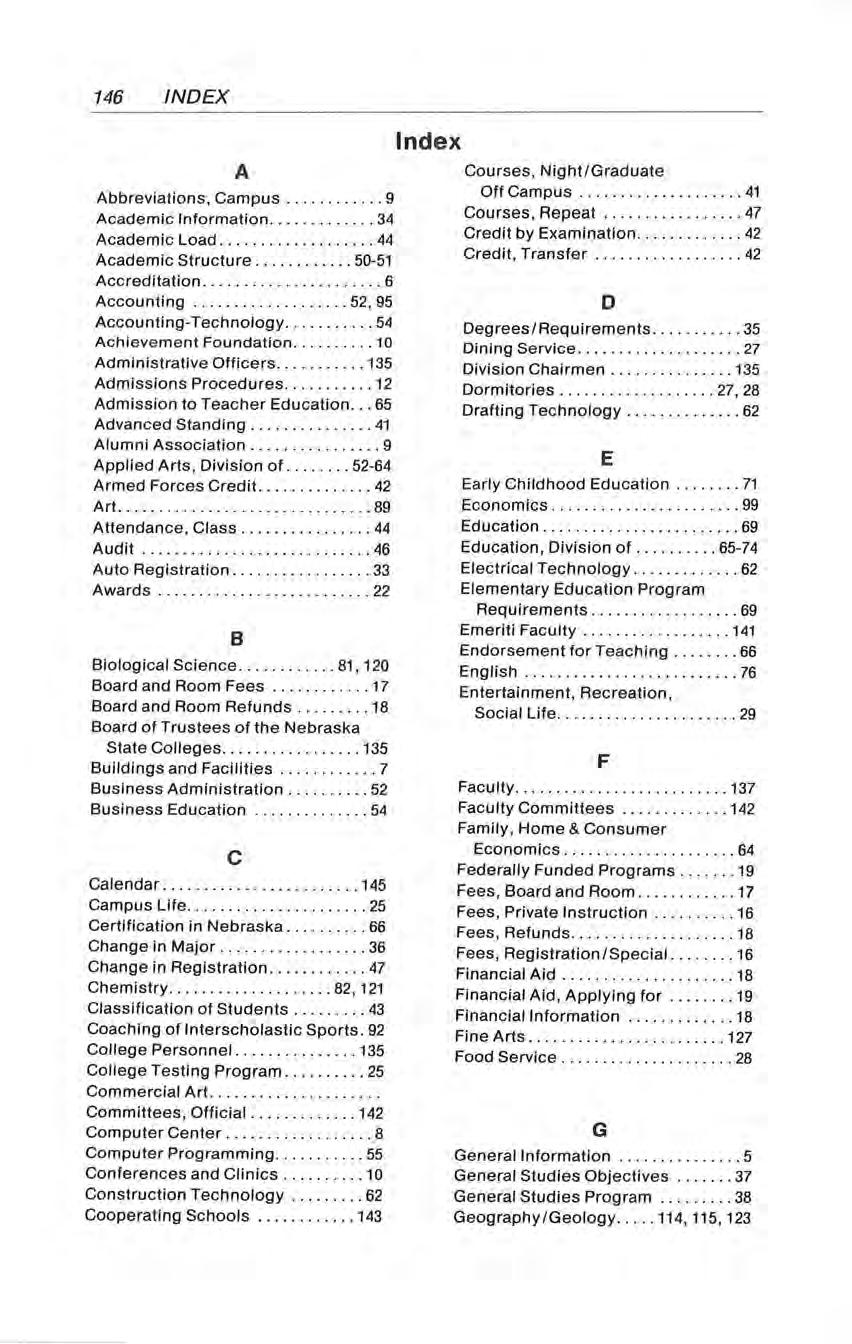CATALOG



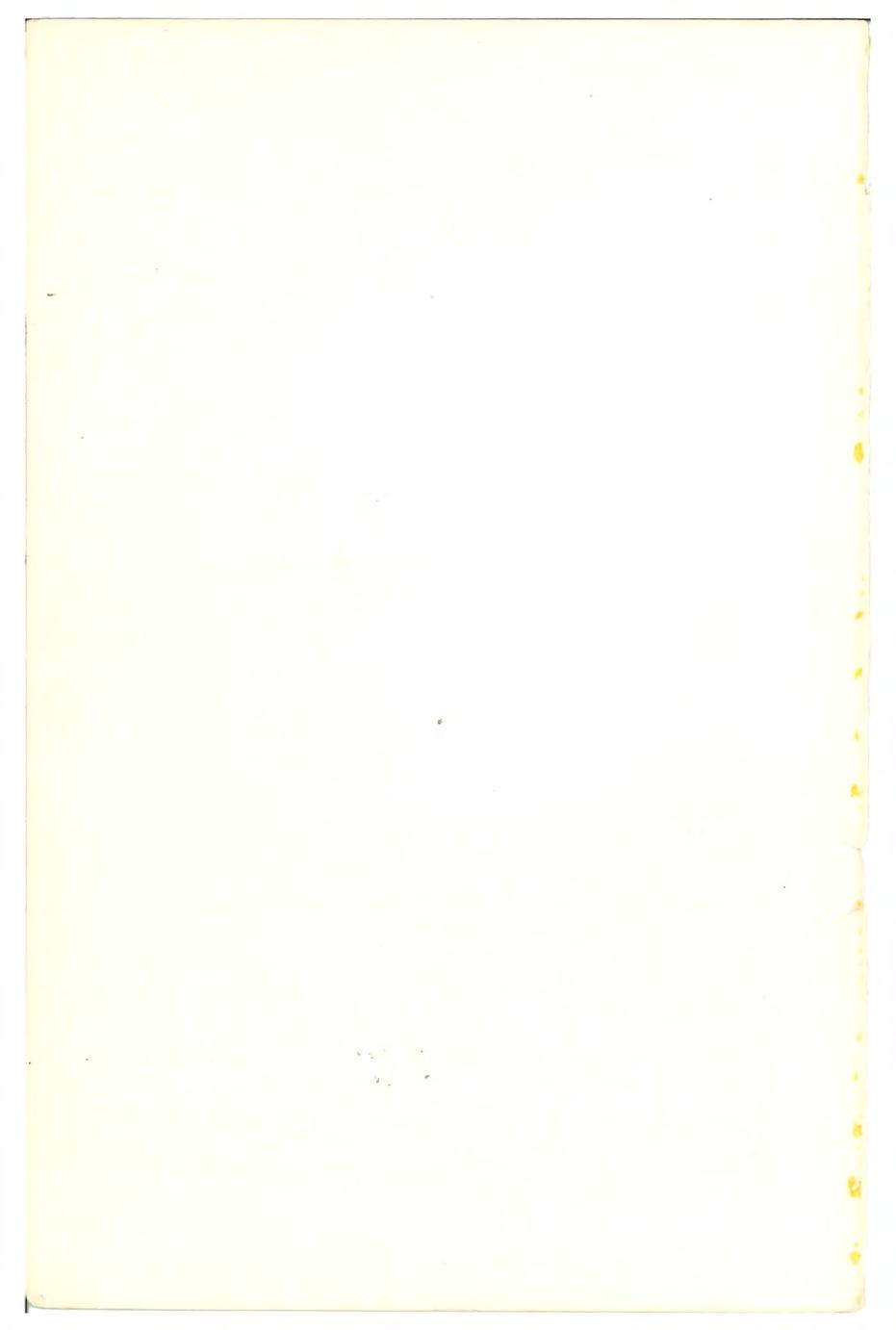

CATALOG




Published by Peru State College at Peru, Nebraska and entered under Bulk Permit Number 4 at Peru , Nebraska, 68421
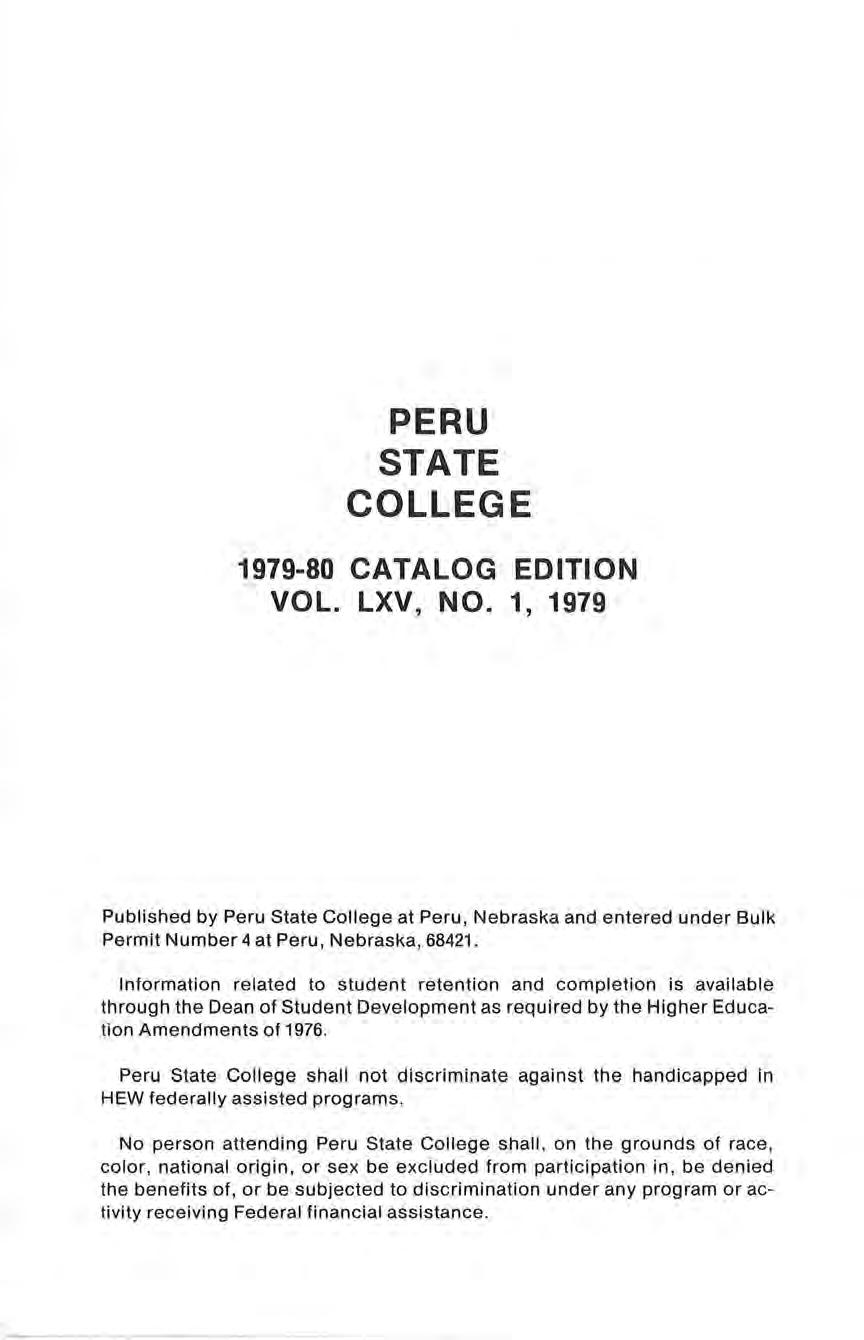
Information related to student retention and completion is available through the Dean of Student Development as required by the Higher Education Amendments of 1976
Peru State College shall not discriminate against the handicapped in HEW federally assisted programs.
No person attending Peru State College shall, on the grounds of race , color , national origin, or sex be excluded from participation in, be denied the benefits of, or be subjected to discrimination under any program or activity receiving Federal financial assistance.
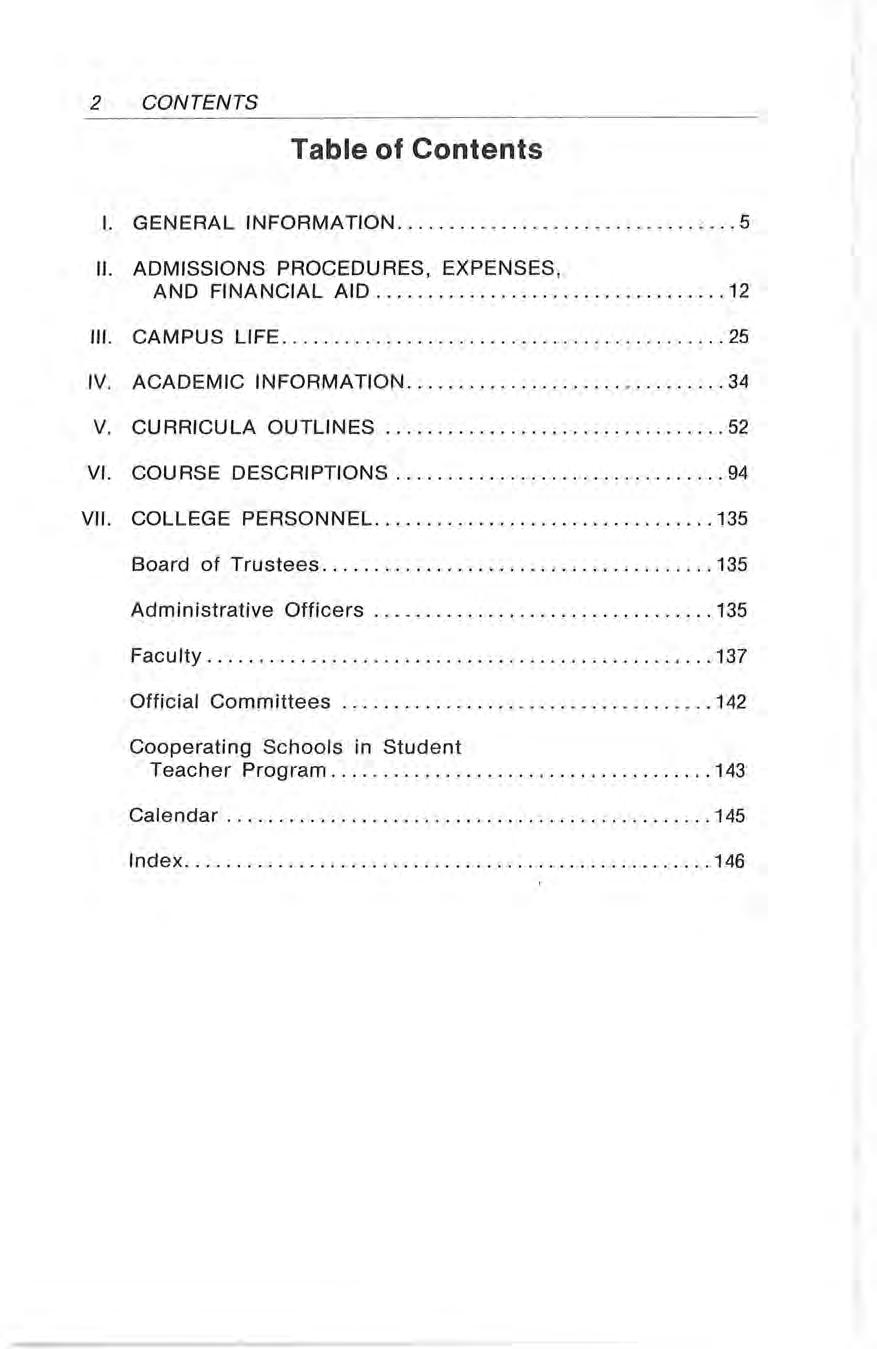

Peru State is the oldest college in Nebraska and the third oldest teachertraining institution established west of the Missouri River. Peru was founded the same year Nebraska became a state For more than a century thousands of young people have crossed the Campus of a Thousand Oaks and have gone forth to become teachers and leaders in business and industry in Nebraska and throughout the nation
The people of Nebraska have made the facilities of this College available to students at a minimum of personal cost. The taxpayers of the state bear a major portion of the cost of college education of the students , exclusive of personal expenses.
Public institutions such as Peru State generally have an "open door" admission policy , i.e. , admit graduates of accredited high schools Peru State believes every young person is entitled to a chance to succeed at the collegiate level. We believe a young person with ability and a willingness to work has an e x cellent opportunity for success at Peru State
This College believes in academic excellence, in opportunities for personal growth, and in student self-determination consistent with the principles of a democratically organized society The administra t ion recognizes that college students are adults and should be involved in the decisions made on campus which affect them The educational experience provided by the College is designed to enable students to learn, equip themselves for meaningful careers, and become productive members of society.

Peru State students have an opportunity to know t heir teachers well and to become working partners with the staff and other students . To live with other young people in college residences offers many opportunities for friendship , and growth , and personal development .
The college faculty and staff are here to serve you We welcome the opportunity to assist you in reali z ing your personal educational and career objectives
The same year Nebraska became a state, the new state legislature provided for the establishment of a training school for teachers or normal school at Peru. At that time only two other such institutions existed west of the Missouri River-one in Kansas and one in California The school's beginning actually dates back to December 2, 1865 , when its predecessor institution, Mount Vernon College , was organized by a group of early settlers who resolved to place the school under the "care and management of the Methodist Episcopal Church " .
Colonel T . J. Majors , a leader in the War between the States and a state legislator, proposed that the school be made the state university Although the offer was rejected, the state legislature on June 20, 1867, did accept the school as a "normal school " several months before the state university was established. For 38 years after the Peru school became a normal school, it was the only teacher education institution in the state.
As Nebraska's population increased, the legislature provided for three other normal schools - at Kearney in 1905, at Wayne in 1910, and at Chadron in 1911. The legislature extended the normal schools from two years to four in 1921, and authorized these institutions to grant the degrees of Bachelor of Arts in Education, Bachelor of Science in Education, and Bachelor of Fine Arts in Education. At the same time, the names of the schools were changed from State Normal Schools to State Teachers Colleges . In 1963 the name was changed to Peru State College .
When the United States entered World War 11 , the College offered its staff and facilities to the government for the training of officers for the armed forces . The first unit of men in the Navy V- 12 program arrived on July 1, 1943 . During the time the nearly 500 trainees received college training , the College operated an accelerated program for both civilian students and naval trainees. Since that time many of these trainees have used the hours of college credit earned at Peru for degree requirements at Peru, or other institutions of higher learning throughout the nation .
In 1949, the legislature authori z ed the Nebraska State Colleges to confer the Bachelor of Arts degree The Bachelor of Science degree was authori zed in 1965. Emerging from the role of a single - purpose teacher ' s college, the College is now serving as a regional state college with many and diverse two and four-year programs in a wide variety of fields, serving to m e et the changing higher education need s of people in southeast Nebraska
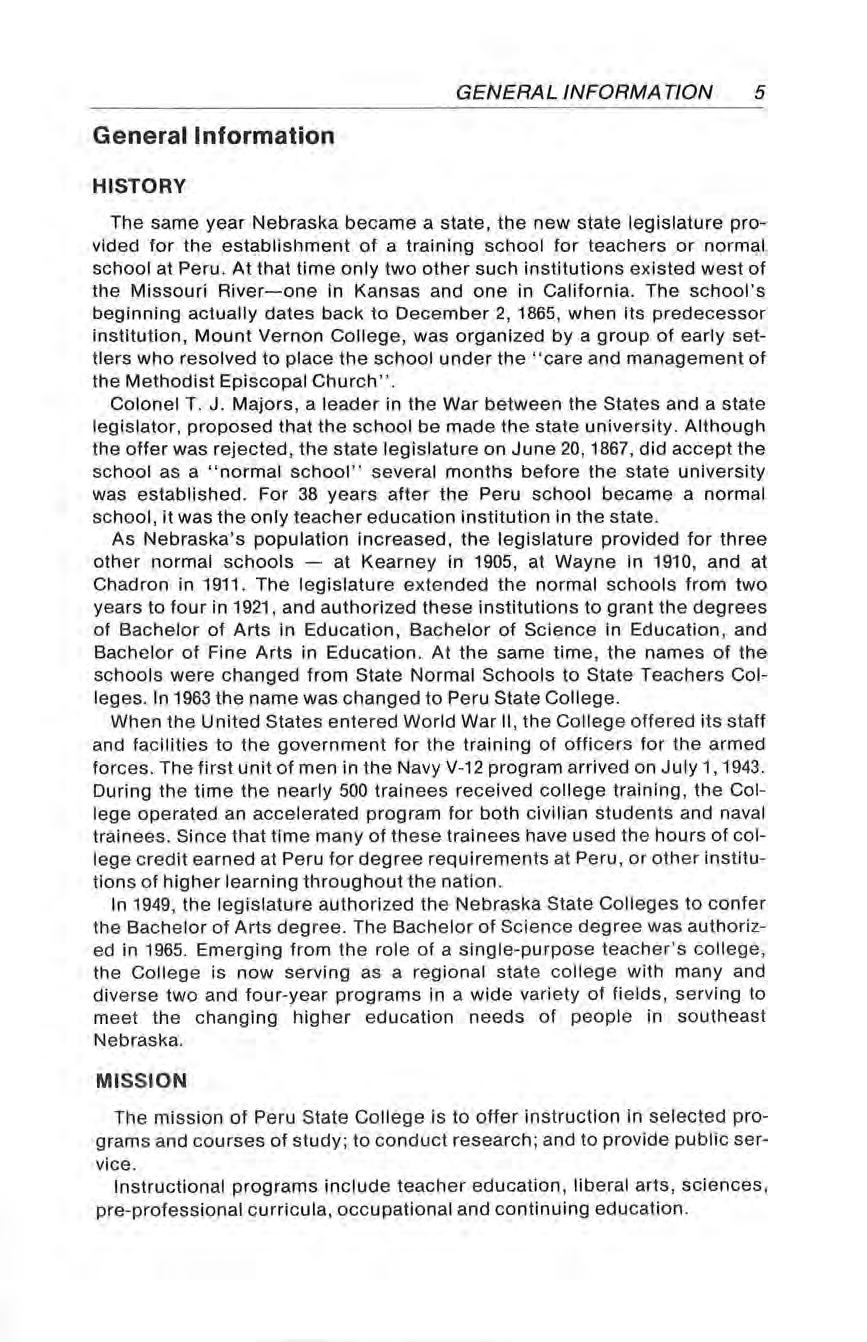
The mission of Peru State College is to offer instruction in selected programs and courses of study; to conduct research ; and to provide public service .
Instructional programs include teacher education, liberal arts , sciences, pre - professional curricula, occupational and continuing education
Research programs create new knowledge and provide a broader intellectual and factual basis for extended knowledge .
Public service activities enhance and promote effective living of the people served by the College through assisting in the solution of problems and in the development of increased skills.
The seat of Nebraska's oldest institution of higher education is historic Peru located in the hills along the Missouri River in the southeast corner of the state . The picturesque Nemaha County town is 62 miles south of Omaha and 75 miles southeast of Lincoln. Peru is served by Nebraska Highway 67, which intersects U . S. Highway 73 and 75 six miles west of Highway 136 six miles south of the campus. Auburn, county seat of Nemaha County, is five miles south, and Nebraska City , Otoe County seat, is 15 miles north of the junction of these highways The Campus of a Thousand Oaks is on approximately the same latitude as New York City and is about 150 miles east of the center of continental United States . About 80 per cent of Peru's students come from Nebraska, with adjacent states well represented. Students from more distant states are also enrolled at Peru
Daily bus service to Omaha , and Kansas City with connections in those cities to more distant points, is avi lable at Auburn, 12 miles from Peru. College transportation will be provided to and from Auburn at the beginning and end of semesters, summer sessions, and spring recess .
Peru State College is accredited Commission on Institutions of the North Central Association of Colleges and Schools and by the National Council for Accreditation of Teacher Education as a bachelor ' s degree granting institution. Full membership is is maintained in the American Association of Colleges for Teacher Education and the American Council of Educat ion The College also is a charter member of the Nebraska Council on Teacher Education
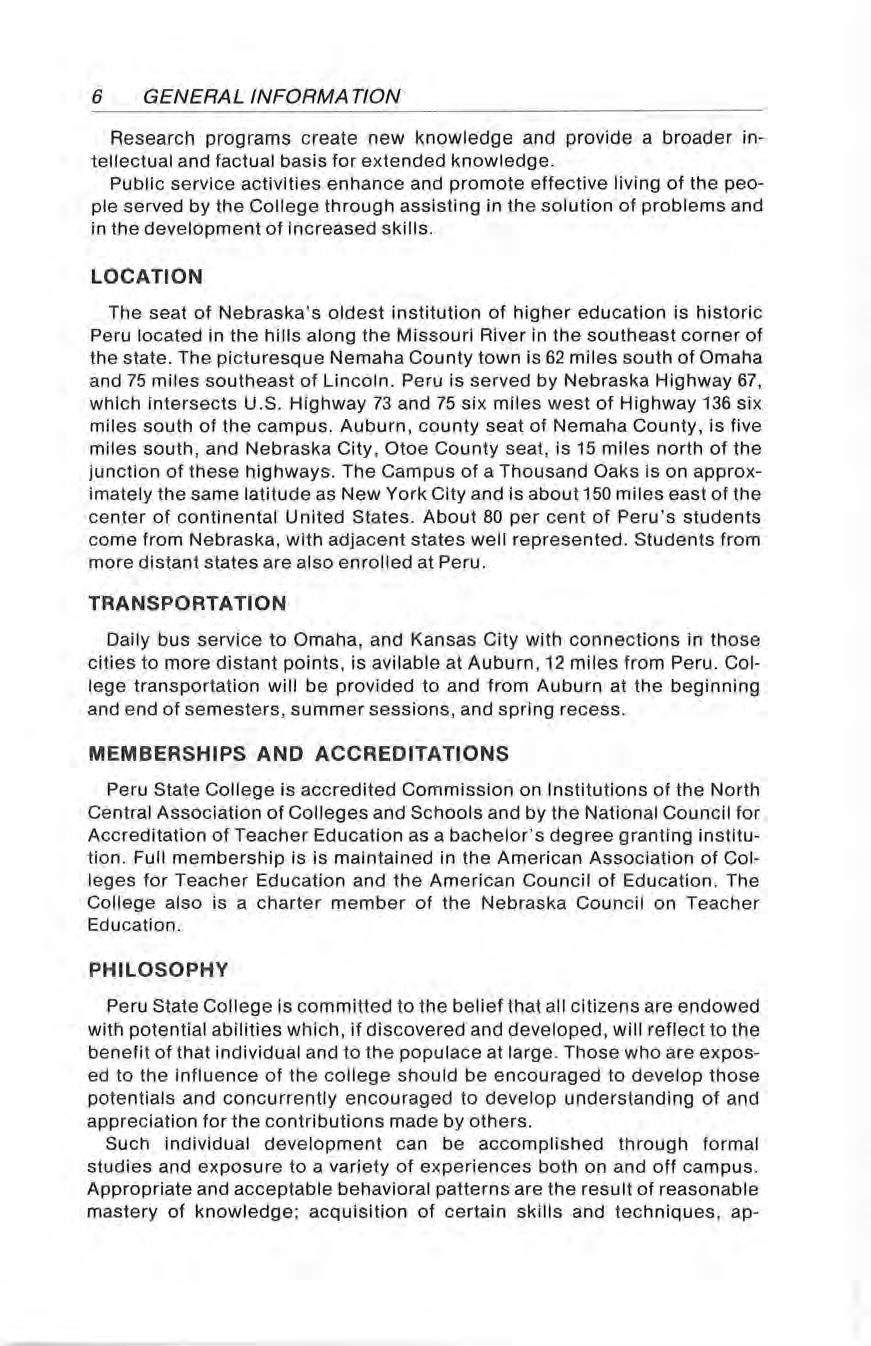
Peru State College is committed to the belief that all citizens are endowed with potential abilities which, if discovered and developed, will reflect to the benefit of that individual and to the populace at large. Those who are e x posed to the influence of the college should be encouraged to develop those potentials and concurrently encouraged to develop understanding of and appreciation for the contributions made by others.
Such individual development can be accomplished through formal studies and exposure to a variety of experiences both on and off campus. Appropriate and acceptable behavioral patterns are the result of reasonable mastery of knowledge; acquisition of certain skills and techniques, ap-
preciation and understanding of areas beyond narrow personal interests , and from meaningful religious and social experiences
To increase the quality and diversity of programs to provide for the differing aptitudes, interests, and needs of the people it serves .
To intensify a milieu of academic excellence .
To enhance the intellectual cooperation between the liberal and applied arts
To promote involvement of both students and faculty in experimental and creative research
To strive to be a more effective public service institution
To offer continuing and occupational education for personal and career enrichment.
To explore new and creative educational opportunities for students.
To serve as a transitional educational institution for students pursuing various occupational, vocational, and professional objectives
To prepare students to become contributing members of a democratic society.
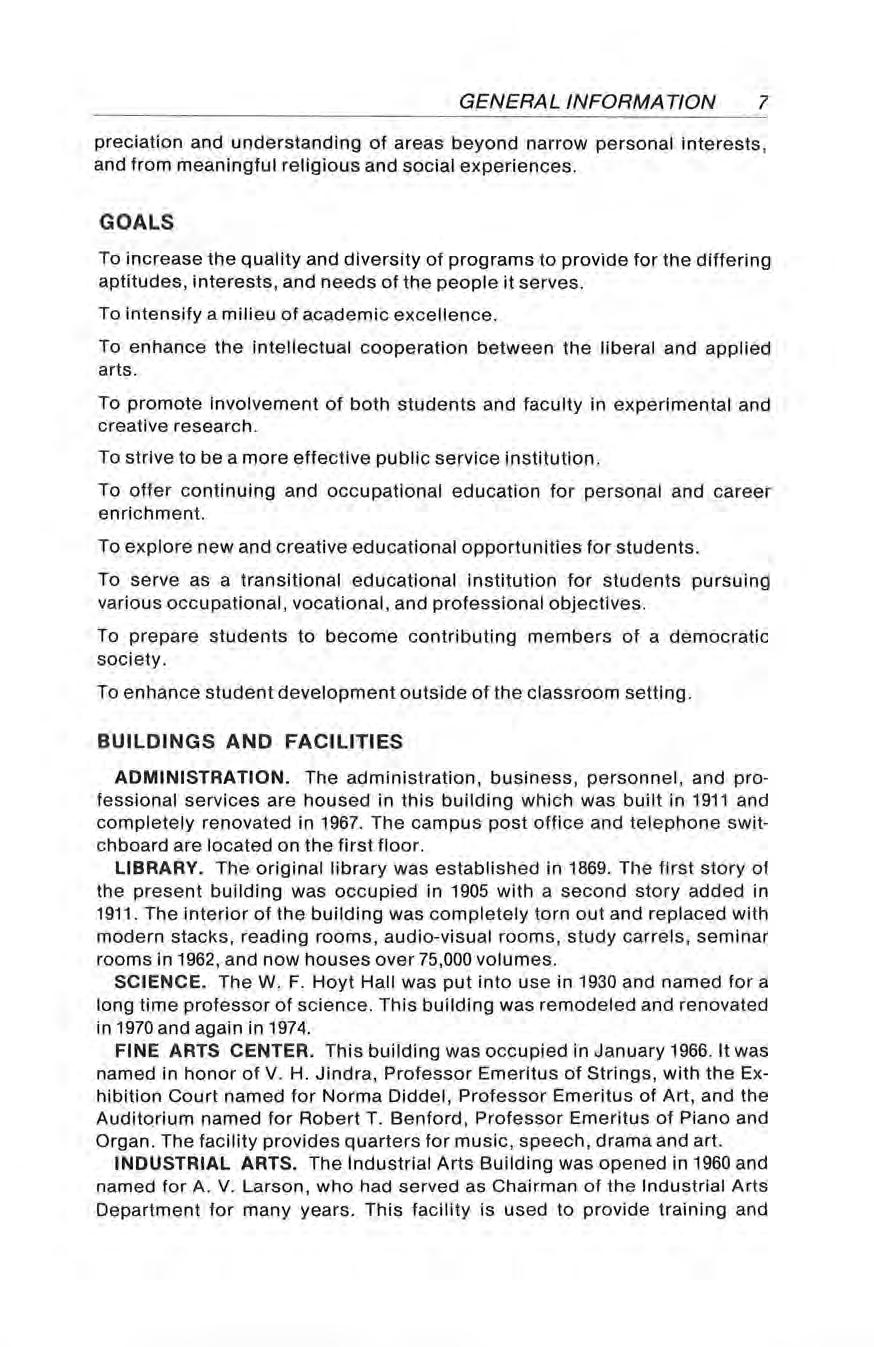
To enhance student development outside of the classroom setting .
ADMINISTRATION. The administration , business , personnel, and professional services are housed in this building which was built in 1911 and completely renovated in 1967 The campus post office and telephone switchboard are located on the first floor .
LIBRARY. The original library was established in 1869. The first story of the present building was occupied in 1905 with a second story added in 1911. The interior of the building was completely torn out and replaced with modern stacks , reading rooms, audio - visual rooms, study carrels, seminar rooms in 1962, and now houses over 75,000 volumes
SCIENCE. The W F. Hoyt Hall was put into use in 1930 and named for a long time professor of science. This building was remodeled and renovated in 1970 and again in 1974 .
FINE ARTS CENTER. This building was occupied in January 1966. It was named in honor of V. H. Jindra, Professor Emeritus of Strings, with the Exhibition Court named for Norma Diddel, Professor Emeritus of Art, and the AuditQrium named for Robert T. Benford , Professor Emeritus of Piano and Organ. The facility provides quarters for music, speech, drama and art.
INDUSTRIAL ARTS. The Industrial Arts Building was opened in 1960 and named for A. V. Larson, who had served as Chairman of the Industrial Arts Department for many years . This facility is used to provide training and
equipment in power mechanics, electricity-electronics, industrial crafts, woodworking, metal working drafting, graphic arts, photography, and related areas
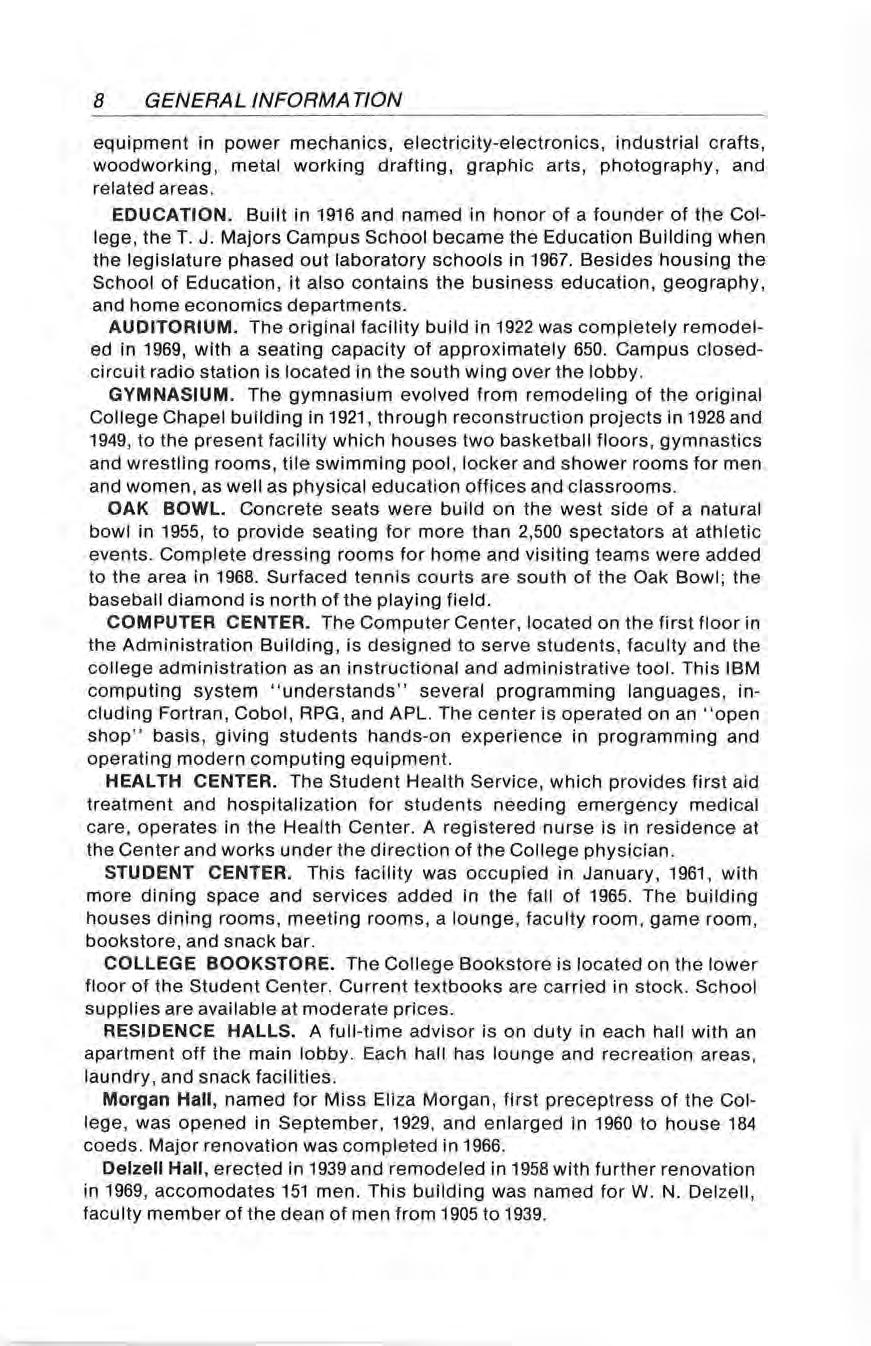
EDUCATION. Built in 1916 and named in honor of a founder of the College, the T. J. Majors Campus School became the Education Building when the legislature phased out laboratory schools in 1967. Besides housing the School of Education, it also contains the business education, geography, and home economics departments.
AUDITORIUM. The original facility build in 1922 was completely remodeled in 1969, with a seating capacity of approximately 650 Campus closedcircuit radio station is located in the south wing over the lobby
GYMNASIUM. The gymnasium evolved from remodeling of the original College Chapel building in 1921, through reconstruction projects in 1928 and 1949, to the present facility which houses two basketball floors, gymnastics and wrestling rooms, tile swimming pool, locker and shower rooms for men and women, as well as physical education offices and classrooms
OAK BOWL. Concrete seats were build on the west side of a natural bowl in 1955, to provide seating for more than 2,500 spectators at athletic events . Complete dressing rooms for home and visiting teams were added to the area in 1968. Surfaced tennis courts are south of the Oak Bowl; the baseball diamond is north of the playing field.
COMPUTER CENTER. The Computer Center, located on the first floor in the Administration Building, is designed to serve students , faculty and the college administration as an instructional and administrative tool. This IBM computing system "understands" several programming languages, including Fortran , Cobol, RPG, and APL. The center is operated on an "open shop" basis, giving students hands-on experience in programming and operating modern computing equipment.
HEAL TH CENTER. The Student Health Service, which provides first aid treatment and hospitalization for students needing emergency medical care, operates in the Health Center . A registered nurse is in residence at the Center and works under the direction of the College physician.
STUDENT CENTER. This facility was occupied in January, 1961, with more dining space and services added in the fall of 1965. The building houses dining rooms, meeting rooms, a lounge, faculty room , game room, bookstore, and snack bar.
COLLEGE BOOKSTORE. The College Bookstore is located on the lower floor of the Student Center. Current textbooks are carried in stock School supplies are available at moderate prices
RESIDENCE HALLS. A full-time advisor is on duty in each hall with an apartment off the main lobby. Each hall has lounge and recreation areas, laundry, and snack facilities.
Morgan Hall, named for Miss Eliza Morgan, first preceptress of the College, was opened in September, 1929 , and enlarged in 1960 to house 184 coeds Major renovation was completed in 1966.
Delzell Hall, erected in 1939 and remodeled in 1958 with further renovation in 1969, accomodates 151 men. This building was named for W. N. Delzell, faculty member of the dean of men from 1905 to 1939.
Majors Hall . The 90-man East Wing was built in 1960 and named for A D. Majors, long time governing Board member and nephew of founder T. J. Majors. In 1965, a 122-man West Wing was added .
CENTENNIAL COMPLEX. The co-educational seven-unit complex is almost a community in itself, housing 234 students in six structures. Dedication of these facilities took place in 1967 during celebration of the College's Centennial year, each unit being named in honor of long-term faculty members. Students are housed in suites of two or three bedrooms, living room, and full bath.
Davidson, Palmer, Clayburn, Mathews Halls , accommodates both men and women. Neal Hall is used as an auxiliary building for special events.
MARRIED STUDENT HOUSING. Five housing units containing eight two-bedroom apartments and six one-bedroom apartments, were completed for occupancy in 1956, in a park-like setting east of the Oak Bowl. All are furnished with basic kitchen equipment.
Nicholas Hall at Centennial Complex was converted to apartments for married students in 1970. Pate Hall at Centennial Complex is used to house guests and overflow of faculty and married student housing . Each apartment contains kitchen-dining area, living room, full bath, and one or two bedrooms. All are furnished.
FACULTY HOUSING. Two units were completed in 1956, containing two one-bedroom apartments, four two-bedroom apartments, and two threebedroom apartments for faculty use. Kitchen appliances furnished
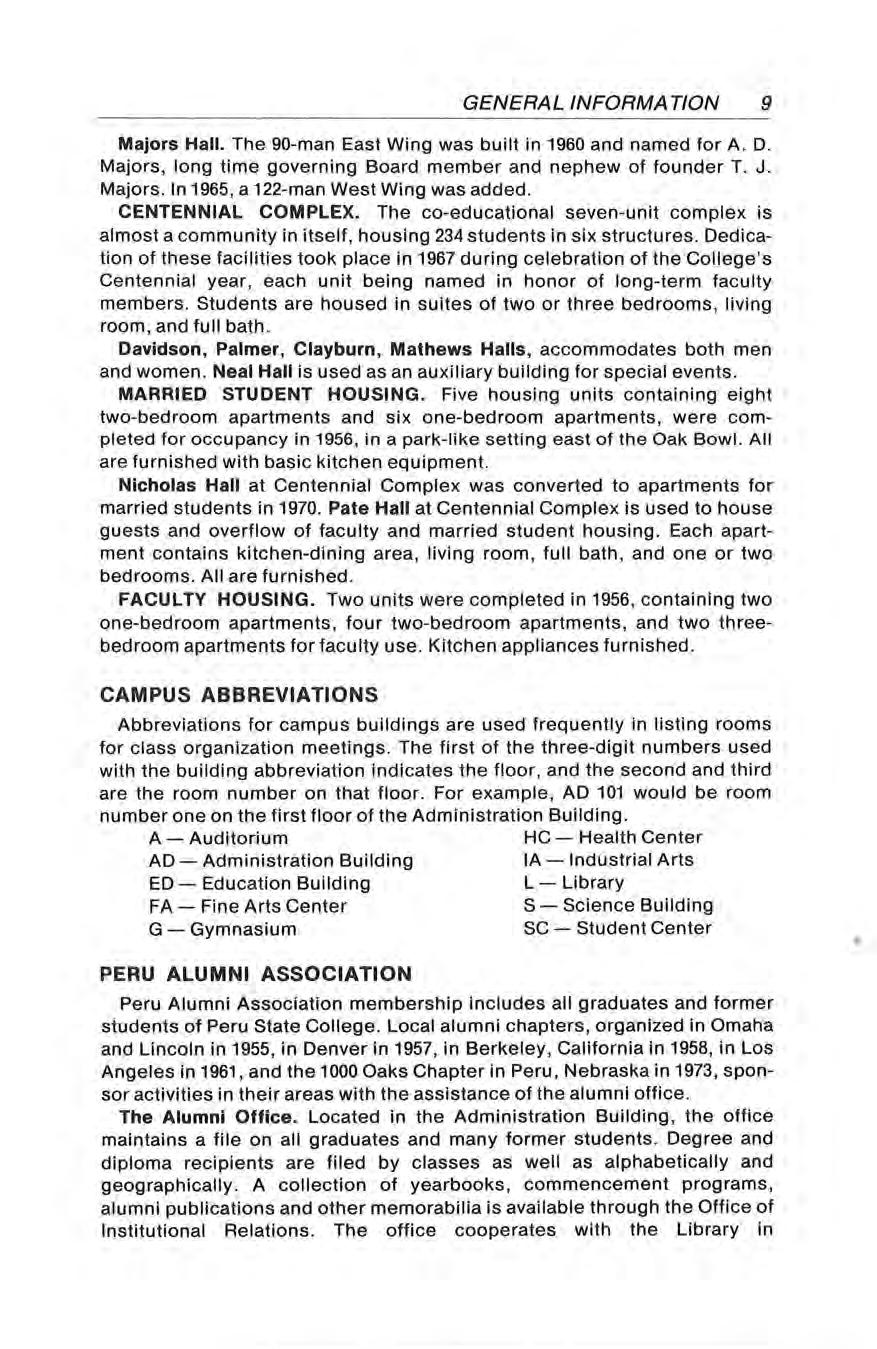
Abbreviations for campus buildings are used frequently in listing rooms for class organization meetings. The first of the three-digit numbers used with the building abbreviation indicates the floor, and the second and third are the room number on that floor. For example, AD 101 would be room number one on the first floor of the Administration Building.
A - Auditorium
AD - Administration Building
ED - Education Building
FA - Fine Arts Center
G - Gymnasium
HC - Health Center
IA - Industrial Arts
L - Library
S - Science Building
SC - Student Center
Peru Alumni Association membership includes all graduates and former students of Peru State College . Local alumni chapters, organized in Omaha and Lincoln in 1955, in Denver in 1957, in Berkeley, California in 1958, in Los Angeles in 1961, and the 1000 Oaks Chapter in Peru, Nebraska in 1973, sponsor activities in their areas with the assistance of the alumni office.
The Alumni Office. Located in the Administration Building, the office maintains a file on all graduates and many former students Degree and diploma recipients are filed by classes as well as alphabetically and geographically A collection of yearbooks, commencement programs, alumni publications and other memorabilia is available through the Office of Institutional Relations The office cooperates with the Library in
maintenance of archival materials in the special collection room of the Library
The Peru Stater , an alumni magazine, is distributed three times each year to alumni , former students, and friends of the College
As a result of the work of a group of alumni , the Peru Achievement Foundation was organized in June, 1955, and incorporated as a non-profit corporation for educational and charitable purposes on May 21, 1962
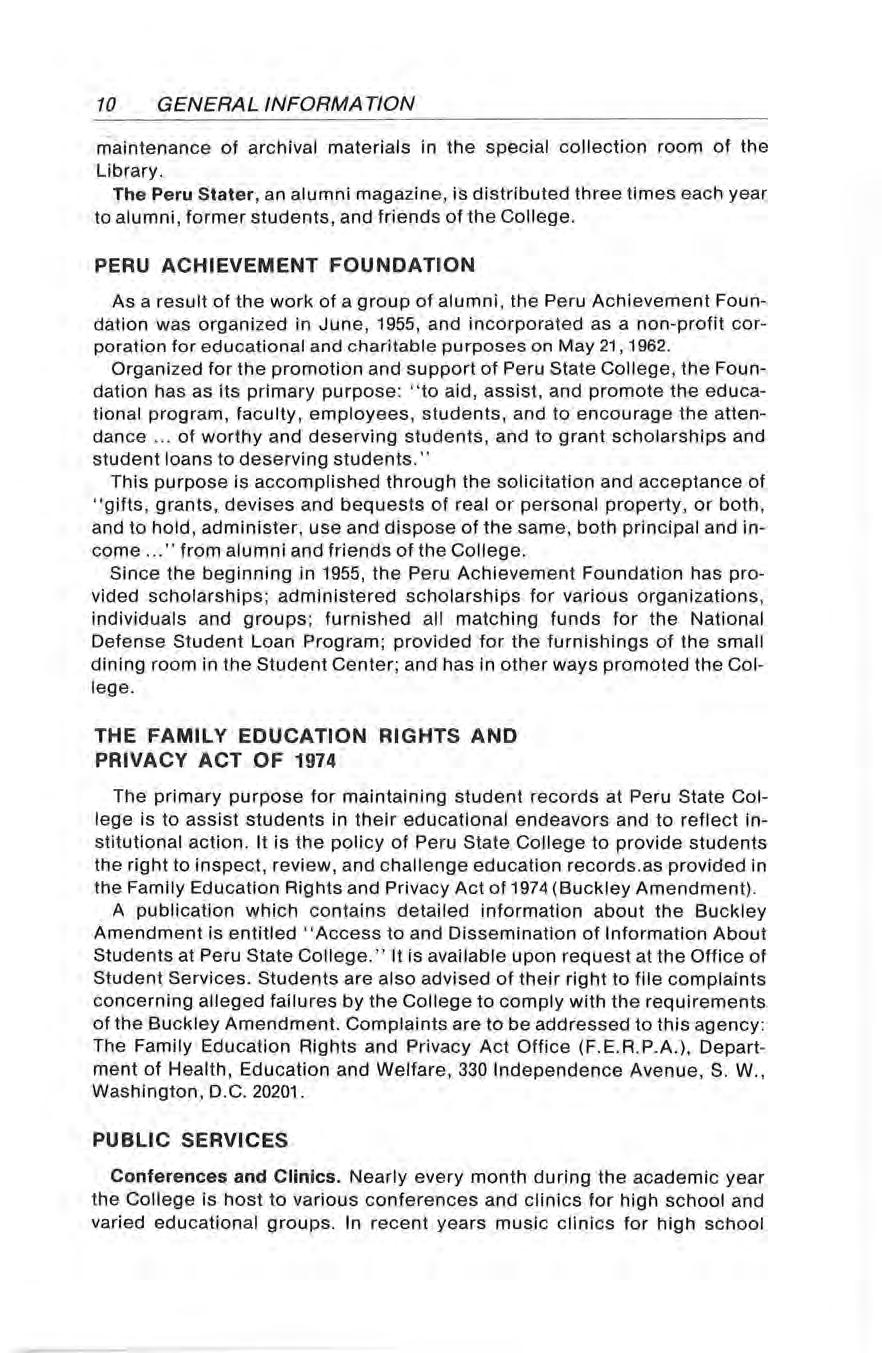
Organi zed for the promotion and support of Peru State College, the Foundation has as its primary purpose: " to aid, assist, and promote the educational program, faculty, employees, students, and to encourage the attendance . . . of worthy and deserving students, and to grant scholarships and student loans to deserving students ."
This purpose is accomplished through the solicitation and acceptance of "gifts, grants, devises and bequests of real or personal property, or both, and to hold, administer, use and dispose of the same, both principal and income . . . " from alumni and friends of the College .
Since the beginning in 1955, the Peru Achievement Foundation has provided scholarships; administered scholarships for various organizations , individuals and groups ; furnished all matching funds for the National Defense Student Loan Program; provided for the furnishings of the small dining room in the Student Center ; and has in other ways promoted the College
The primary purpose for maintaining student records at Peru State College is to assist students in their educational endeavors and to reflect institutional action. It is the policy of Pe r u State College to provide students the right to inspect, review, and challenge education records as provided in the Family Education Rights and Privacy Act of 1974 (Buckley Amendment).
A publication which contains detailed information about the Buckley Amendment is entitled " Access to and Dissemination of Information About Students at Peru State College. " It is available upon request at the Office of Student Services. Students are also advised of their right to file complaints concerning alleged failures by the College to comply with the requirements of the Buckley Amendment. Complaints are to be addressed to this agency : The Family Education Rights and Privacy Act Office (F . E . R.P . A . ), Department of Health, Education and Welfare, 330 Independence Avenue, S. W , Washington , D.C. 20201
Conferences and Clinics. Nearly every month during the academic year the College is host to various conferences and clinics for high school and varied educational groups In recent years music clinics for high school
choral groups, bands and individual instrumentalists, clinics in speech and dramatics , meetings of business and industrial conferences, and meetings of fraternal and civic groups, as well as special interest groups, have been held on campus.
Program of Continuing Education. This is a program designed to make the institution serve the educational needs of the entire region which the College serves Consequently , both credit and non-credit courses are taken to the public , both off - campus and on - campus , the purpose being to supply or update skills for employment or job advancement, to help working people obtain courses which will eventually lead to a degree , and to help people of the area attain additional skills or knowledge which can enrich their leisure hours. Peru State College supports the philosophy that education is a life - long process and should be pursued by an individual throughout his entire lifetime. Through this program, the College hopes to make it possible for citi z ens within our service area to participate in this endeavor
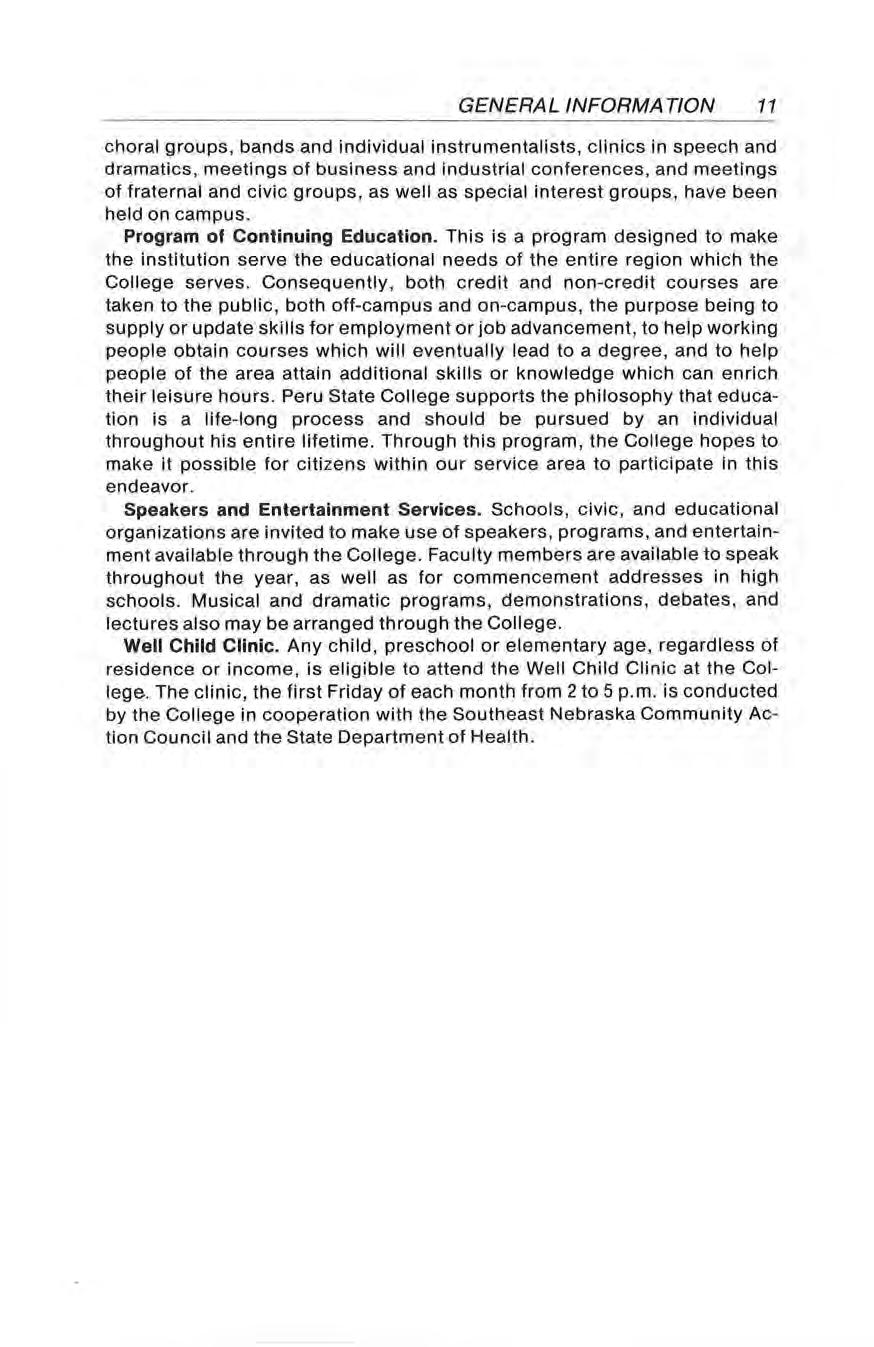
Speakers and Entertainment S ervi ces . Schools, civic , and educational organi zations are invited to make use of speakers, programs , and entertainment available through the College Faculty members are available to speak throughout the year, as well as for commencement addresses in high schools. Musical and dramatic programs, demonstrations, debates, and lectures also may be arranged through the College.
Well Child Clinic. Any child, preschool or elementary age, regardless of residence or income , is eligible to attend the Well Child Clinic at the College The clinic, the first Friday of each month from 2 to 5 p.m is conducted by the College in cooperation with the Southeast Nebraska Community Action Council and the State Department of Health
Admission to Peru State College is granted to any individual who has graduated from an accredited Nebraska high school and who has not previously attended college Out-of-state students who choose PSC generally have a good academic record in high school. The " open admissions " policy for Nebraska residents has proven time after time that highly motivated students can succeed at PSC although their academic performance in high school was below their capabilities If you are in doubt about the likelihood of your success at PSC, you are encouraged to discuss your qualifications, goals and motivation with the experienced counselors in the Office of Admissions. For advice or for information about specific programs, please feel free to write , call or visit the Office of Admissions, Peru State College, Peru, Nebraska 68421 (phone 402/872-3815, Ext 221 )
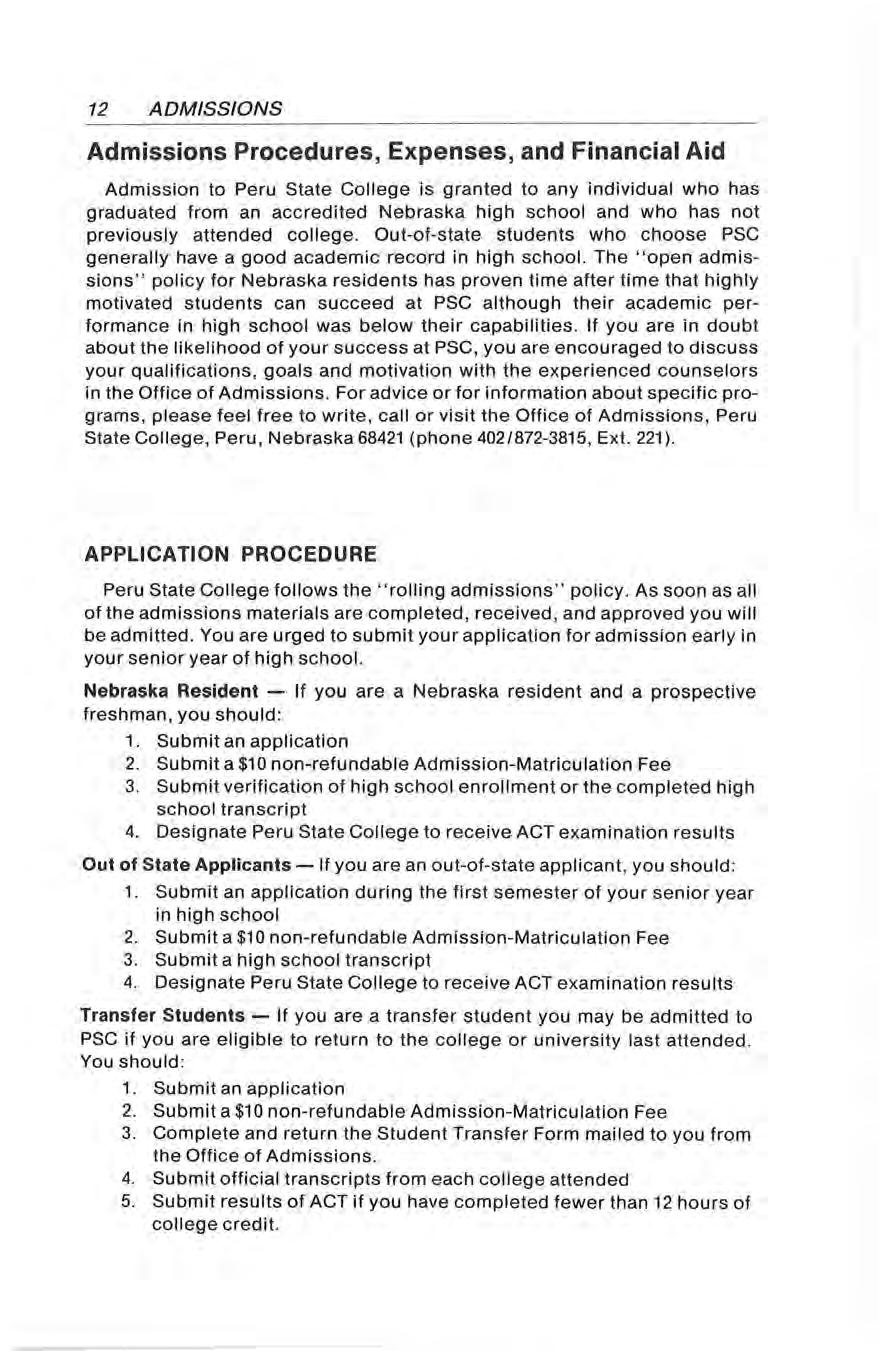
Peru State College follows the "rolling admissions " policy As soon as all of the admissions materials are completed, received, and approved you will be admitted . You are urged to submit your application for admission early in your senior year of high school.
Nebraska Resident - If you are a Nebraska resident and a prospective freshman, you should:
1. Submit an application
2. Submit a $10 non-refundable Admission-Matriculation Fee
3. Submit verification of high school enrollment or the completed high school transcript
4. Designate Peru State College to receive ACT examination results
Out of State Applicants - If you are an out - of - state applicant , you should:
1. Submit an application during the first semester of your senior year in high school
2. Submit a $10 non-refundable Admission-Matriculation Fee
3. Submit a high school transcript
4. Designate Peru State College to receive ACT examination results
Transfer Students - If you are a transfer student you may be admitted to PSC if you are eligible to return to the college or university last attended. You should :
1 . Submit an application
2 Submit a $10 non-refundable Admission - Matriculation Fee
3. Complete and return the Student Transfer Form mailed to you from the Office of Admissions
4. Submit official transcripts from each college attended
5. Submit results of ACT if you have completed fewer than 12 hours of college credit.
Applicants who have received an Associate of Arts degree or Associate of Science degree from an accredited community college will submit the same materials required of transfer applicants , as listed above . Associate of Arts programs are reviewed and approved by the Academic Affairs Commission of Peru State College .
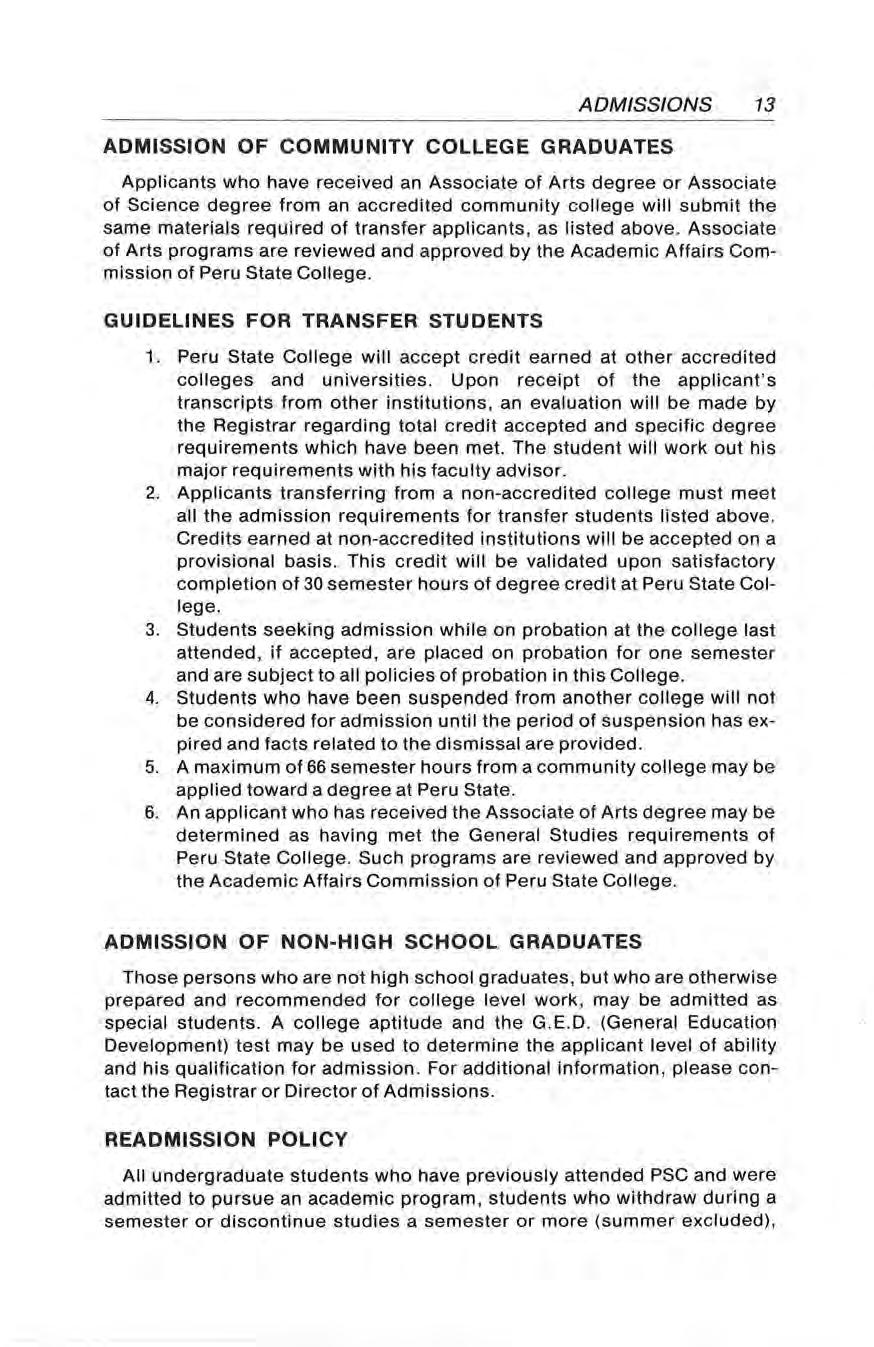
1 Peru State College will accept credit earned at other accredited colleges and universities . Upon receipt of the applicant's transcripts from other institutions , an evaluation will be made by the Registrar regarding total credit accepted and specific degree requirements which have been met. The student will work out his major requirements with his faculty advisor.
2 Applicants transferring from a non - accredited college must meet all the admission requirements for transfer students listed above Credits earned at non - accredited institutions will be accepted on a provisional basis. This credit will be validated upon satisfactory completion of 30 semester hours of degree credit at Peru State College .
3 Students seeking admission while on probation at the college last attended, if accepted , are placed on probation for one semester and are subject to all policies of probation in this College.
4 Students who have been suspended from another college will not be considered for admission until the period of suspension has expired and facts related to the dismissal are provided
5 A maximum of 66 semester hours from a community college may be applied toward a degree at Peru State.
6 An applicant who has r eceived the Associate of Arts degree may be determined as having met the General Studies requirements of Peru State College Such programs are reviewed and approved by the Academic Affairs Commission of Peru State College
Those persons who are not high school graduates , but who are otherwise prepared and recommended for college level work, may be admitted as special students. A college aptitude and the G E D (General Education Development) test may be used to determine the applicant level of ability and his qualification for admission For additional information , please contact the Registrar or Director of Admissions
All undergraduate students who have previously attended PSC and were admitted to pursue an academic program, students who withdraw during a semester or discontinue studies a semester or more (summer excluded),
and all post-graduates seeking an additional academic program must apply at the Office of Admissions for readmission .
Applicants should apply for readmission at least four weeks prior to the opening date of the semester or session for which they desire readmission.
Students are generally readmitted for the semester or summer term they wish to again commence their studies provided they left the college in good standing .
Students who interrupted their studies and were on academic probation will generally be readmitted for the semester or summer term they wish to reenter provided they are in good standing with regard to all other related concerns
Students who were academically suspended during a semester or summer term will not be considered for readmission until two semesters have elapsed (summer session excluded).
Previously suspended students who are readmitted will , in general, be subject to permanent suspension if they are suspended for a second time.
Students readmitted to the college can continue under the guidelines of their previous academic program as outlined in the general bulletin of the year of first entry provided they meet the normal progress policy . Some additional requirements may be expected because of possible changes within respective programs . In addition, readmitted students should not expect continuance in a program that has been or is being phased out of the curriculum.
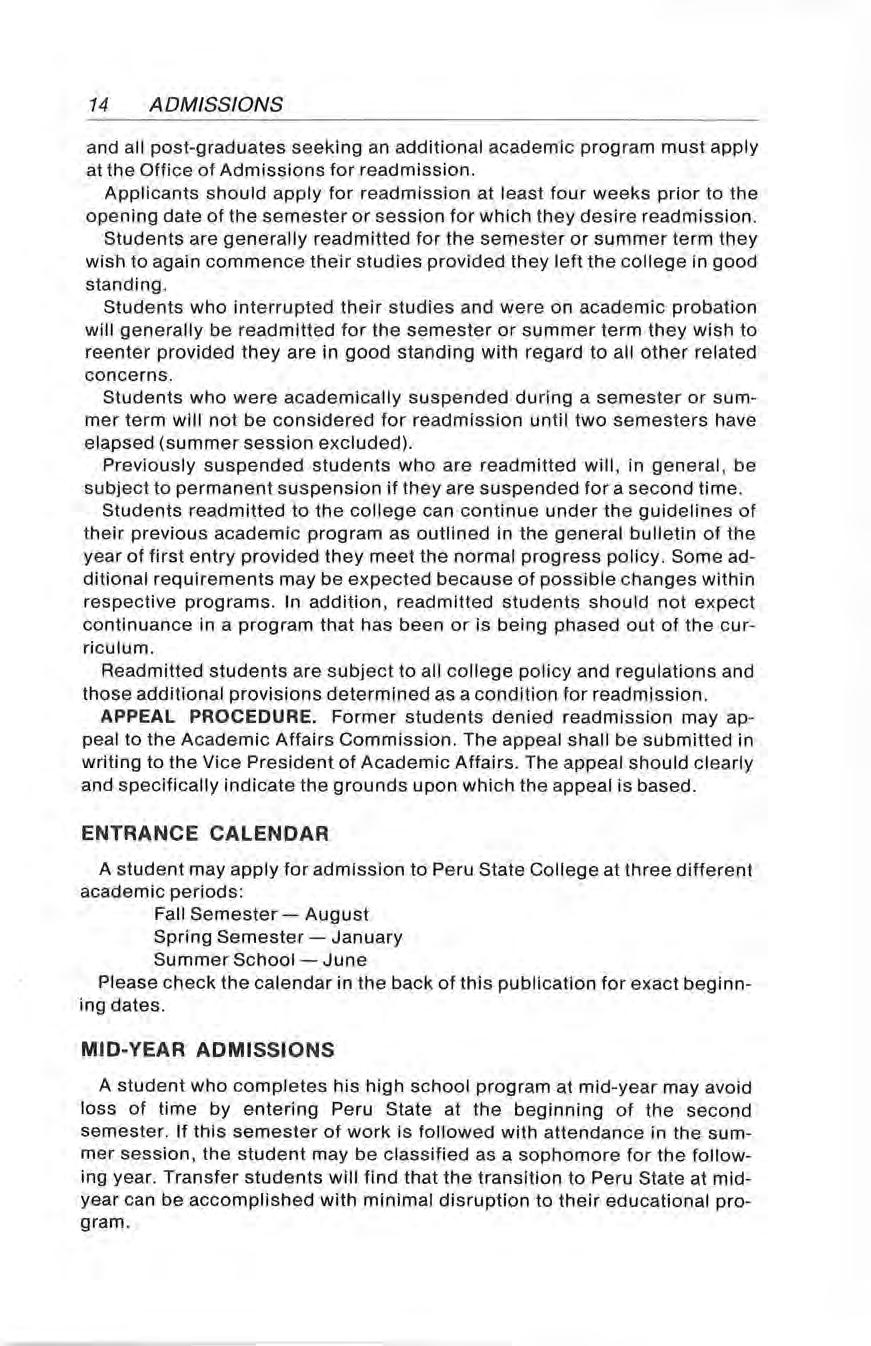
Readmitted students are subject to all college policy and regulations and those additional provisions determined as a condition for readmission
APPEAL PROCEDURE. Former students denied readmission may appeal to the Academic Affairs Commission. The appeal shall be submitted in writing to the Vice President of Academic Affairs. The appeal should clearly and specifically indicate the grounds upon which the appeal is based
A student may apply for admission to Peru State College at three different academic periods :
Fall Semester - August
Spring Semester - January
Summer School - June
Please check the calendar in the back of this publication for exact beginning dates
A student who completes his high school program at mid-year may avoid loss of time by entering Peru State at the beginning of the second semester. If this semester of work is followed with attendance in the summer session , the student may be classified as a sophomore for the following year. Transfer students will find that the transition to Peru State at midyear can be accomplished with minimal disruption to their educational program.
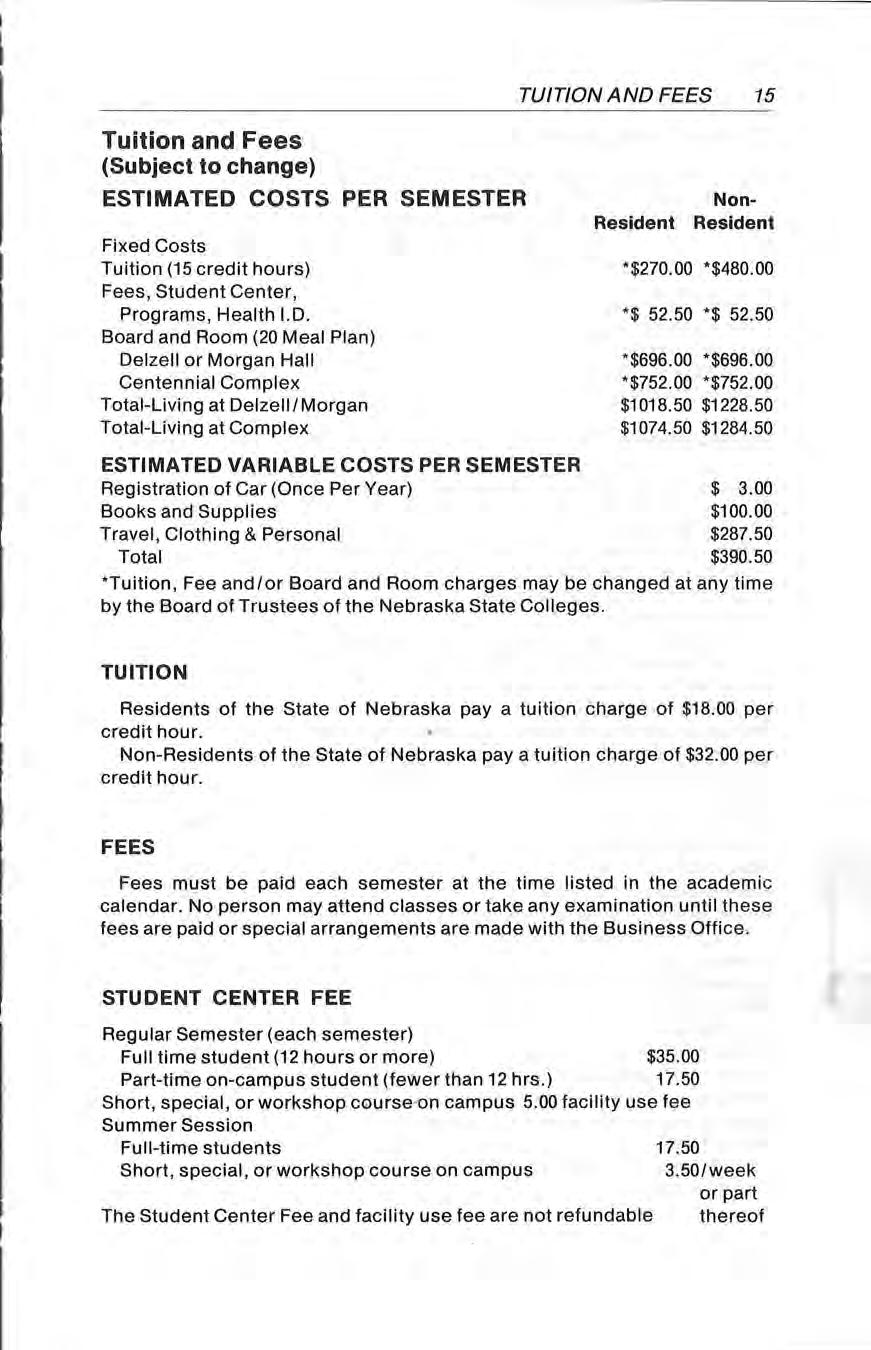
(Subject to change)
ESTIMATED COSTS PER SEMESTER Non-
Fixed Costs
Tuition (15 credit hours)
Fees, Student Center, Programs, Health I.D.
Board and Room (20 Meal Plan)
Delzell or Morgan Hall
Centennial Complex
Total-Living at Delzell/Morgan
Total-Living at Complex
ESTIMATED VARIABLE COSTS PER SEMESTER Registration of Car (Once Per Year)
*Tuition, Fee and/or Board and Room charges may be changed at any time by the Board of Trustees of the Nebraska State Colleges .
TUITION
Residents of the State of Nebraska pay a tuition charge of $18.00 per credit hour
Non-Residents of the State of Nebraska pay a tuition charge of $32.00 per credit hour.
Fees must be paid each semester at the time listed in the academic calendar. No person may attend classes or take any examination until these fees are paid or special arrangements are made with the Business Office
Regular Semester (each semester)
Full time student (12 hours or more) $35.00
on-campus student (fewer than 12 hrs.) 17.50 Short, special, or workshop c01,1rse'On campus 5.00 facility use fee
or part
The Student Center Fee and facility use fee are not refundable thereof
Regular semester (each semester)
(All students enrolled in seven or more hours) The Student Programs Fee is not refundable.
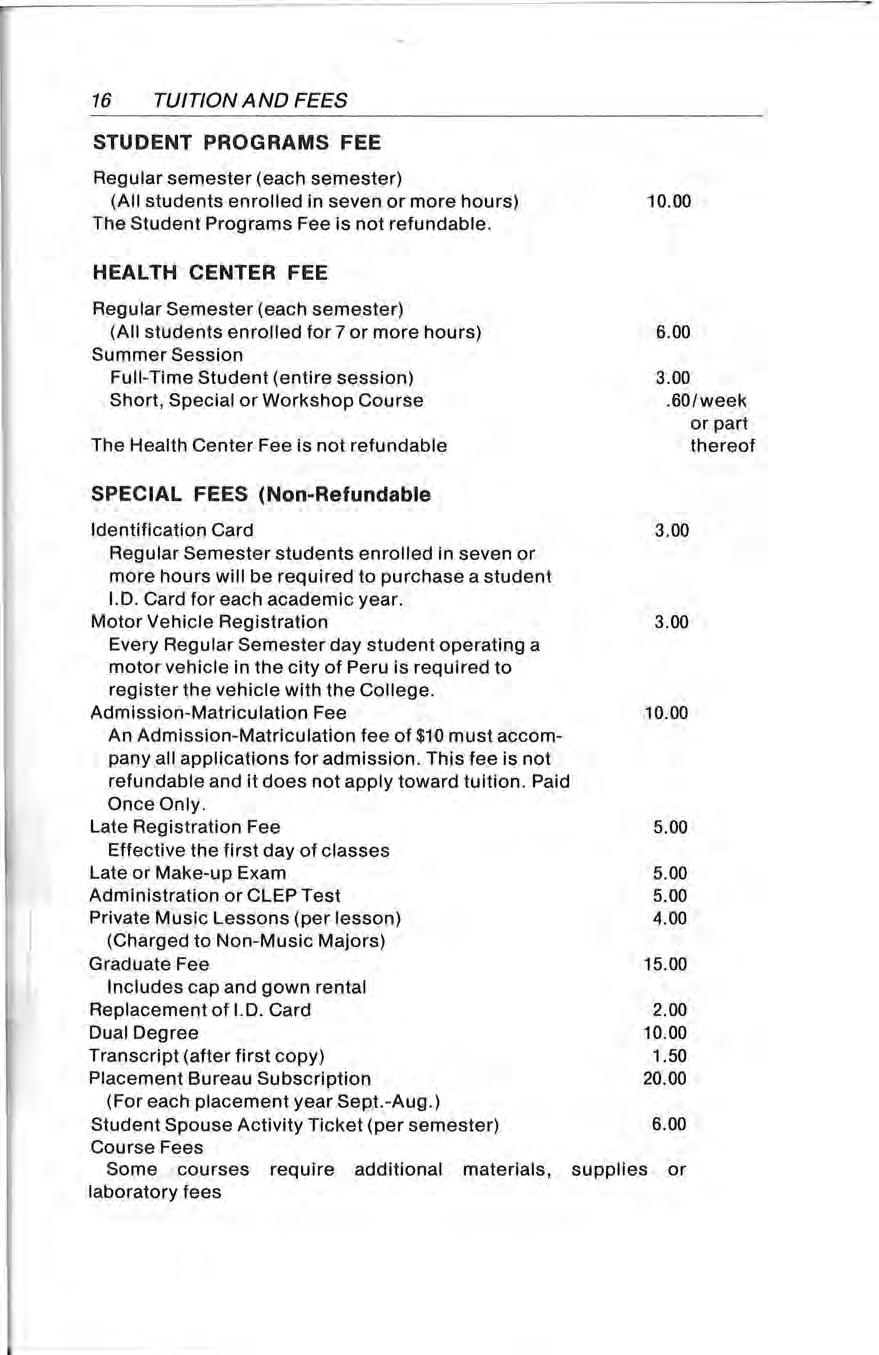
Regular Semester (each semester)
(All students enrolled for 7 or more hours)
An Admission-Matriculation fee of $1 •0 must accompany all applications for admission. This fee is not refundable and it does not apply toward tuition. Paid Once Only.
Some courses require additional materials, supplies or laboratory fees
Room and Board Rates
Room and Board: 20 Meal Plan
Delzell and Morgan Halls
Centennial Complex
Room and Board: 15 Meal Plan
Delzell and Morgan Halls
Centennial Complex
Room Only (juniors and seniors only)
· Delzell and Morgan Halls
Centennial Complex Private Room (optional)
1979 Summer Sessions (Per Session) (Room Only)
Room and Board Installment Plan
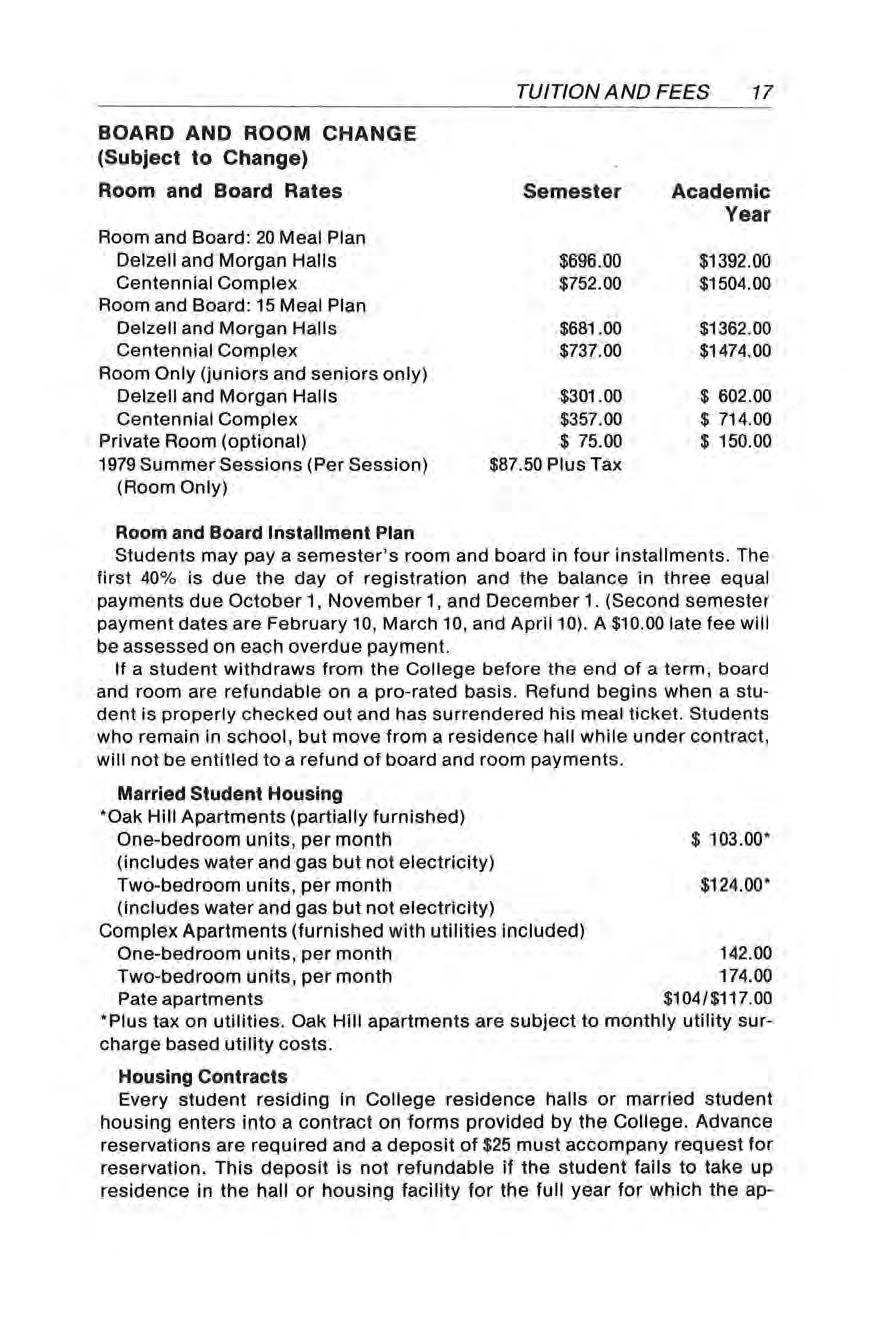
Students may pay a semester's room and board in four installments The first 40% is due the day of registration and the balance in three equal payments due October 1, November 1 , and December 1. (Second semester payment dates are February 10, March 10, and April 10). A $10 .00 late fee will be assessed on each overdue payment.
If a student withdraws from the College before the end of a term , board and room are refundable on a pro-rated basis. Refund begins when a student is properly checked out and has surrendered his meal ticket. Students who remain in school, but move from a residence hall while under contract, will not be entitled to a refund of board and room payments.
Married Student Housing
*Oak Hill Apartments (partially furnished)
One-bedroom units, per month $ 103.00*
(includes water and gas but not electricity)
Two-bedroom units, per month $124 00 * (includes water and gas but not electricity) Complex Apartments (furnished with utilities included)
One-bedroom units, per month 142.00
Two-bedroom units , per month 174.00
Pate apartments $104/$117.00
*Plus tax on utilities. Oak Hill apartments are subject to monthly utility surcharge based utility costs
Every student residing in College residence halls or married student housing enters into a contract on forms provided by the College. Advance reservations are required and a deposit of $25 must accompany request for reservation. This deposit is not refundable if the student fails to take up residence in the hall or housing facility for the full year for which the ap-
plication was made. It is refundable, less deduction for damage to the buildings and/or equipment , at the end of the year, provided the student is in residence for the full year , or the s tudent withdraws from the College because of reasons beyond his control , as determined by the College.
Refunds will be made only after required withdrawal procedures are completed. Refunds will be made as of date of approved withdrawal, from the College Tuition refunds may be made for a reduction in class hours through the final date for adding classes
Proportionate refunds will be made t o students totally withdrawing from College within a given period. Fees will not be refunded unless collected in error. The following schedule will be followed in refunding tuition :
The purpose of financial assistance is to provide students with sufficient funds to meet the costs of obtaining a college education beyond what they and their parents are expected to provide . Thus, financial aid enables many students from low and middle income families to attend college who could not otherwise afford that opportunity .
Most assistance granted is awarded according to the financial need of the applicant. (Financial need is the difference between the money a student and his parents can provide for an education and the costs of that education ) To be considered for assistance , the applicant must demonstrate financial need.
Financial assistance to qualified applicants is available in the form of loans, grants, scholarships, and college work. A student who qualified for one program of financial aid may not necessarily qualify for another
" Financial packaging" permits the Director of Financial Aid to tailor a program of financial assistance to meet the monetary needs of the individual student for one academic year A financial package is worked out on the basis of a careful estimate of the applicant's estimated resources and educational costs for the year.
A package usually cons i sts of two or more types of aid and normally is equal to the student ' s financial need A typical package , in which the need
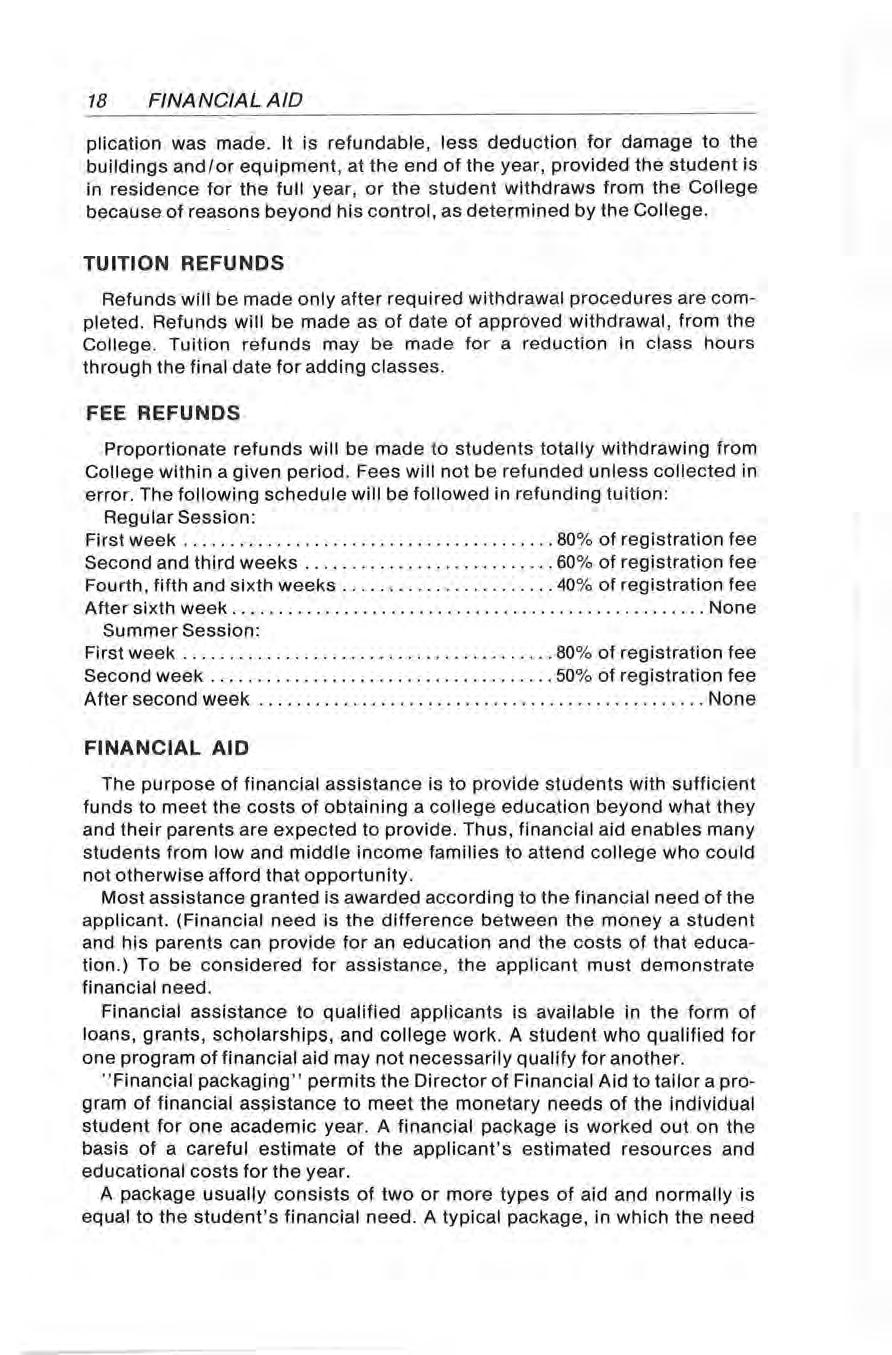
is $1000 might be as follows: National Direct Loan, $350; scholarship, $150; and College Work-Study , $500
Funds for the operation of the different financial aid programs are drawn from Federal and Institutional sources
Any student who needs financial assistance, or desires to apply for a scholarship, should contact the Director of Financial Aid Students are advised to begin the application procedure well before the deadline date, because establishing financial need is often a lengthy process. Applications for financial assistance for the coming year should be submitted to the Financial Aids office by April 15.
Basic Educational Opportunity Grant - BEOG. The Higher Education Amendments of 1972 established a Basic Educational Opportunity Grant. The size of the grant is determined after considering the cost of attending the college and the Student Eligibility Index This Index is determined from a Financial Statement which is a part of the Application.
1 Obtain a Financial Statement (either the ACT-Family Financial Statement or CSS-Financial Aid Form) from your high school counselor or the College Financial Aid Office.
2. Complete the Financial Statement as per instructions indicating that you are applying for the BEOG by marking yes to Item 92 of the ACT Form or Item 83 of the CSS form . Then mail the Form to the appropriate processing center.

3. The center will process your application and return to you a threecopy "Student Eligibility Report." SEA
4 Present this SEA to the College Financial Aid Office
5 The Financial Aid Office, using guidelines established by the U.S. Office of Education, will determine the size of your grant.
6 The BEOG funds will then be distributed to you through the college.
Supplementary Educational Opportunity Grants provide for the giving of grants to students who are determined to be of exceptional financial need. Students in this category will be of such need that they will be unable to attend college without financial aid of this type.
The SEOG amounts range from $200 to $1000 a year, and can be no more than one-half of the total assistance given a student. The grant is "matched" with other financial aid to meet the student's financial need. Grants are awarded on a yearly basis, with the maximum duration of a grant being eight semesters
Requirements for Maintaining Financial Eligibility . Every student receiving financial assistance from any Federally funded and/or college Ad-
ministered Financial Aid Program is required to maintain satisfactory academic standing and progress. The standards for satisfactory academic standing are published under "scholarship standards" in the academic information section of this catalog . The standards for Satisfactory Academic Progress as defined for Financial Assistance are published in the "College Student Handbook" and in the "Financial Aids Student Handbook."
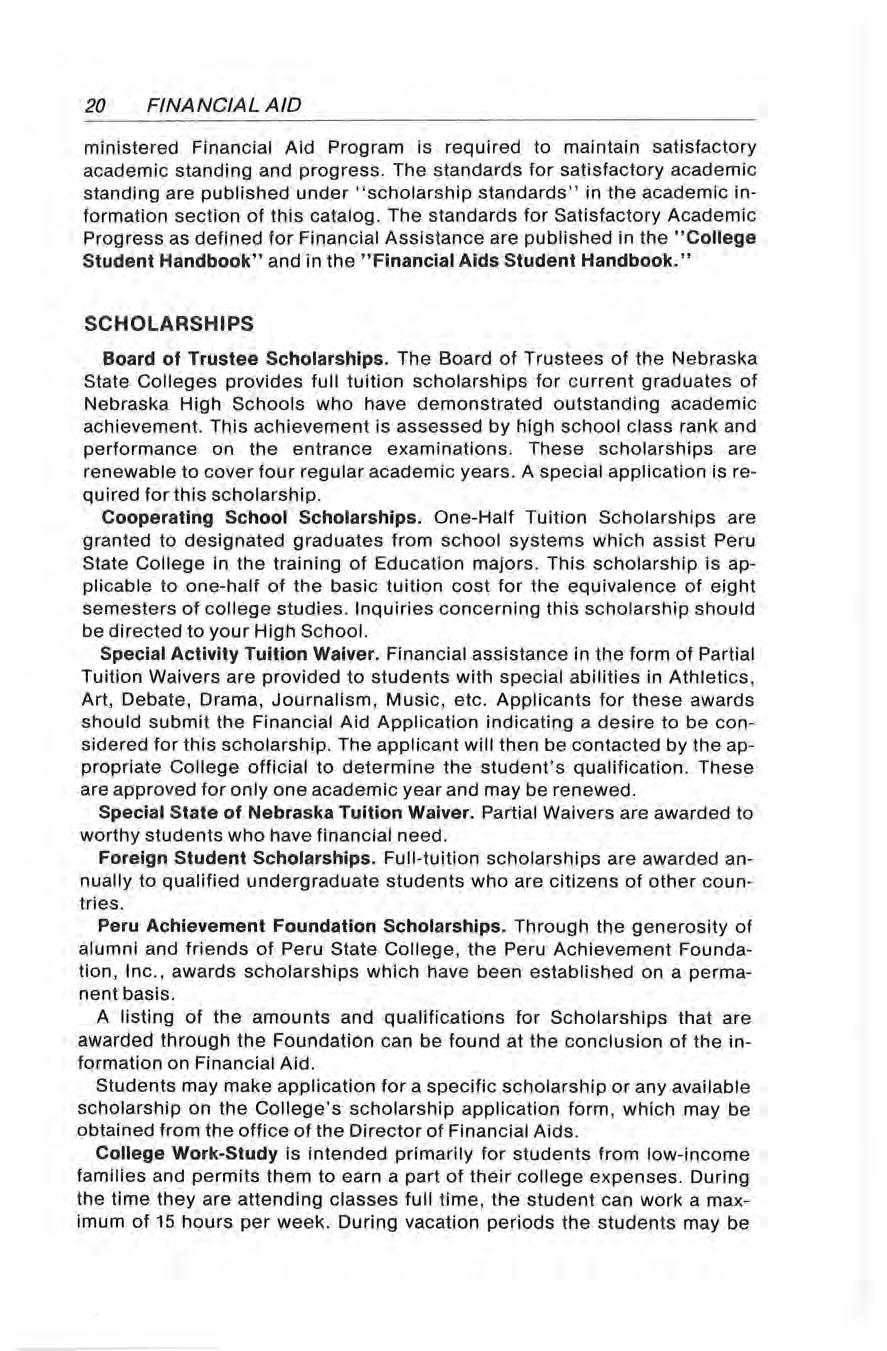
Board of Trustee Scholarships. The Board of Trustees of the Nebraska State Colleges provides full tuition scholarships for current graduates of Nebraska High Schools who have demonstrated outstanding academic achievement. This achievement is assessed by high school class rank and performance on the entrance exam i nations. These scholarships are renewable to cover four regular academic years. A special application is required for this scholarship.
Cooperating School Scholarships. One-Half Tuition Scholarships are granted to designated graduates from school systems which assist Peru State College in the training of Education majors . This scholarship is applicable to one-half of the basic tuition cost for the equivalence of eight semesters of college studies. Inquiries concerning this scho l arship should be directed to your High School.
Special Activity Tuition Waiver. Financial assistance in the form of Partial Tuition Waivers are provided to students with special abilities in Athletics , Art, Debate, Drama, Journalism, Music, etc. Applicants for these awards should submit the Financial Aid Application indicating a desire to be considered for this scholarship. The applicant will then be contacted by the appropriate College official to determine the student ' s qualification . These are approved for only one academic year and may be renewed .
Special State of Nebraska Tuition Waiver. Partial Waivers are awarded to worthy students who have financial need .
Foreign Student Scholarships. Full-tuition scholarships are awarded annually to qualified undergraduate students who are citizens of other countries
Peru Achievement Foundation Scholarships. Through the generosity of alumni and friends of Peru State College, the Peru Achievement Foundation, Inc . , awards scholarships which have been established on a permanent basis.
A listing of the amounts and qualifications for Scholarships that are awarded through the Foundation can be found at the conclusion of the information on Financial Aid
Students may make application for a specific scholarship or any available scholarship on the College ' s scholarship application form, which may be obtained from the office of the Director of Financial Aids.
College Work-Study is intended primarily for students from low-income families and permits them to earn a part of their college expenses During the time they are attending classes full time, the student can work a maximum of 15 hours per week. During vacation periods the students may be
allowed to work 40 hours per week . Work - Study jobs are usually oncampus, and are vital to the efficient operation of the College
National Direct Student Loans are low interest, long term loans made to students who need financial assistance in meeting educational expenses
To be eligible, the student must be in good standing and be registered as a half- time student
Federally Insured Student Loans are intended primarily for students who do not qualify for the other programs of financial assistance but who , nonetheless, need financial help.
College Work jobs are similar to the Work - Study jobs in pay scale, type of work performed , and hours worked .
Memorial Loan Funds established by various donors include: the $200 Willie Ethel Crone Loan Fund, established in 1943 by Miss Ruth Crone in memory of her mother ; the $300 Harriet Louise Lindstrom Loan Fund, established in 1946 by the late C. R. Lindstrom and Mrs. Lindstrom in memory of their daughter ; the Mrs Eva Fischer Loan Fund provided in 1962 by a $500 bequest by the late Mrs. Eva Fischer of Beatrice ; the Towne Loan Fund provided by a $1 ,4 11 .24 bequest by the late Norman L. Towne of Bozeman, Montana , husband of the late Lola Howe Towne, class of 1906; the $250 Patricia Buethe Loan Fund, established in 1962 by friends of the late Mrs. L. Chris Buethe .
Loans from the College Loan Fund and Memorial Loan Fund are generally made on a short- term basis.
Scholarships are granted by the Nebraska Congress of parents and Teachers to full-time students of the Nebraska State Colleges who are Nebraska residents training to become teachers. In order to be eligible for these scholarships - which vary in number with available funds - the student must have a pleasing personality, have high moral and social standards, and show an aptitude for teaching . Applications are sent to the College by the Nebraska Congress of Parents and Teachers shortly after the beginning of the fall semester.

Through the Division of Vocational Rehabilitation individuals with physical disabilities which constitute vocational handicaps are eligible for financial assistance in meeting costs of tuition , plus certain other financial help, depending upon the extent of their financial need
Students interested in receiving this aid should contact the Director of Financial Aid for additional information.
Peru State College is an approved institution under the provisions of Chapter 36, Title 38 of the U.S. Code. Thereby, any eligible Veteran or dependent may receive VA benefits while attending the college.
Any student receiving benefits through the Veteran's Administration is required to meet the Scholastic Standards as outlined in the catalog In addition students receiving benefits through the Veterans Administration are required to make normal progress toward their educational objectives as defined in the college catalog. For more information contact the Financial Aid office at Peru State College.
Alpha Mu Omega Freshman Award. Presented by Alpha Mu Omega, honorary mathematics fraternity, to a member of the freshman class for excellence in mathematics
A. V. and Wilhelmina Larson Memorial Industrial Arts Award. A $100 scholarship to be presented to a student completing his sohpomore year who demonstrates promise as a teacher in the area of industrial arts.
B. E. Swenson, Jr., Athletic Award. Established in 1925 by Bert E. and Stella Swenson in memory of their son, B. E., Jr., and their parents who made possible their early education at Peru . Juniors and seniors are eligible and no student shall receive the award more than once. Basis for judging: 100 points. General - Character and personality, 15, Scholarship, 15; Loyalty to school tradition, 20; Athletics - Must receive school letter in at least two different sports, including either major or minor sports, 50 points. The two letters need not be earned in any one year .

Business Club Award. Presented by the United Business Education Association to an outstanding student in Business Education.
Dramatic Club Awards. Presented each year to the senior man and senior woman who have contributed most to dramatics during the four years in the College
Kappa Delta Pi Educational Award. Presented by the Beta Mu Chapter of Kappa Delta Pi, national honorary educational fraternity, to the freshman whose scholarship and professional attitude are outstanding
Louise Mears Geographical Award. Presented to a student with high scholastic performance in the field of geography.
Neal S. Gomon Award. The Neal S Gomon Award is presented annually to the Pedagogian staff member who is voted most outstanding in his contributions to the paper.
John C. Christ Award. An award established in honor of Dr. John C. Christ, Professor of Biological Science. The award of fifty dollars is to be given to an outstanding high school senior who plans to major in the natural sciences at Peru State College.
Sigma Tau Delta Award. Students of high scholastic standing who have shown an outstanding interest in literature and have properly submitted samples of their original writings may be presented memberships in Sigma Tau Delta
Silas Summers Writing Award. The Sigma Tau Delta National honorary English fraternity, and the English Club present cash awards for the best original written contributions. Winning scripts may be published in the Sifting Sands.
Zelma R. Wonderly Award. An annual award of $50 to the outstanding second grade student teacher .
Pearl A. Kenton Language Arts Award. A $50 award is presented annually to an outstanding student majoring in the area of language arts
Helen E. Cole Pollard Founders Award. Presented at spring honors convocation to the senior who during his collegiate career has demonstrated loyalty and service to the College
Mac Dunning Industrial Arts Award. A $50 annual cash grant to an outstanding student in the area of industrial arts.
Bill Tynon Memorial Athletic Award. A $50 award is presented to a Nebraska resident for his senior year who has made an outstanding contribution to intercollegiate athletics.
A. B. Clayburn Memorial Award. A $100 award is for a junior in teaching education who is majoring in social sciences and has displayed the qualities of outstanding citizenship, progress, and potential.
Lura Hendricks Eichler Memorial Kindergarten Education Award. The $50 award is presented annually to a student who has demonstrated ab ility , aptitude, and interest in kindergarten education
A.V. Larson Award. Presented to the student contributing most to the College yearbook.
Chemistry Award. The Chemical Rubber Co. has made available the New 53rd Edition of the CRC Handbook of Chemistry and Physics and a scroll to be presented to the student ranking at the top in the freshman chemistry courses .
The Peru Achievement Foundation provides scholarships to Peru State students as recognition of their achievements in their academic pursuits . A partial listing of scholarships follow :

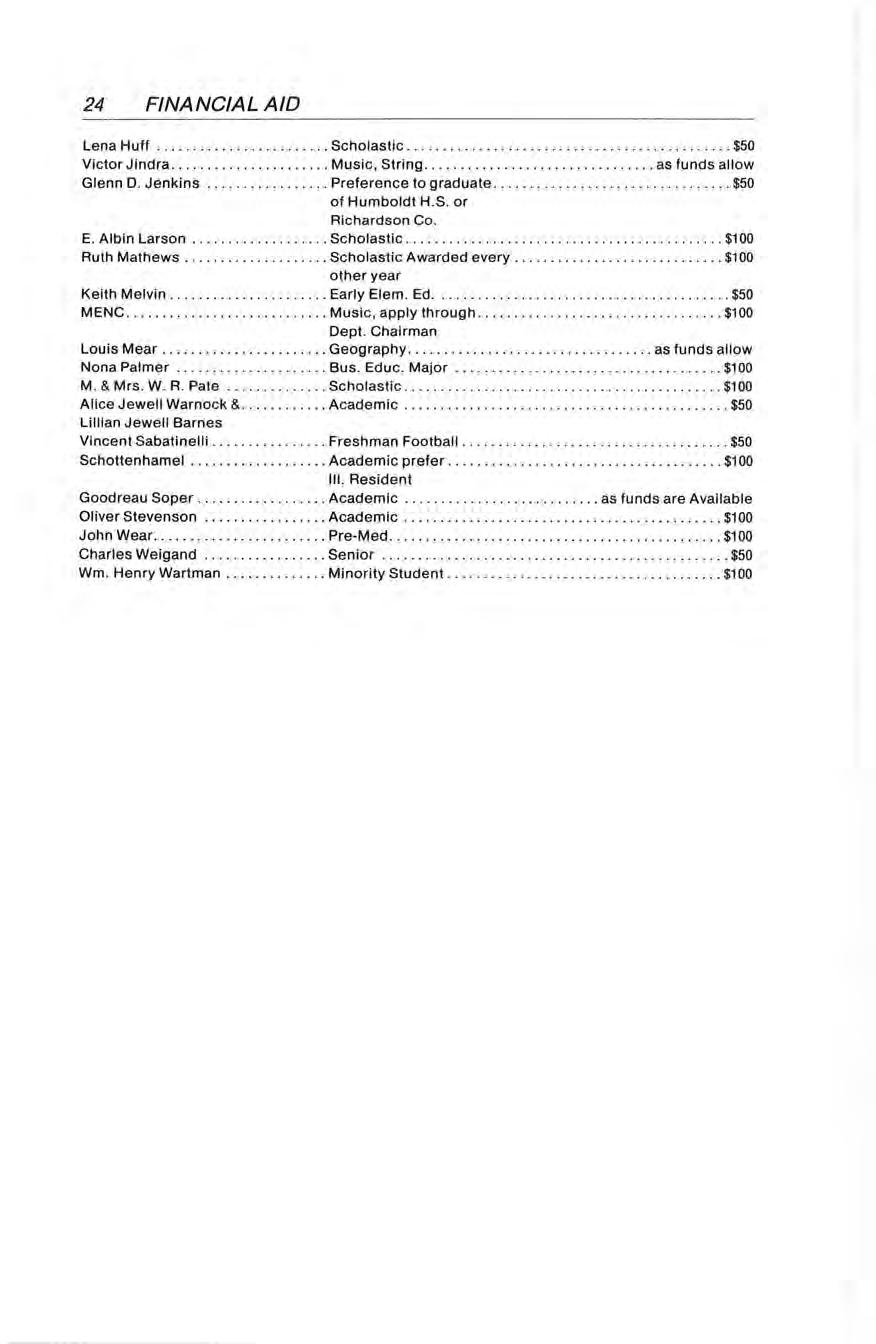
The College has as its constant goal the best possible adaptation of its educational opportunities to the interest , needs, and abilities of each student.
Each student is assigned to a faculty advisor who is qualified to advise him in his field. Students needing advice before the opening of the college year are invited to arrange a conference with the Admissions Office of the College by definite appointment.
Prior to the opening of classes, the College arranges a Welcome Week program, which is designed to give special attention to problems of students who are entering the College Both Freshmen and transfer students are to attend . The program acquaints the student with his new environment and offers him a helpful introduction to campus life. He completes tests and is assigned to a faculty advisor who is available to assist the student throughout his college career in defining goals to be reached in college and give information regarding appropriate curriculums and courses. Opportunity to meet members of the faculty and other members of the student body is afforded through social events
The Student Life Handbook is published in the late summer by the Office of Student Development. The publication serves as a guide to campus living. Included in the handbook is a calendar of events and a list of Policies and Procedures.
During the college experience, students sometimes feel the need for assistance in dealing with problems, whether they be personal, vocational, educational, or social. To aid students in coping with these concerns , a counseling psychologist within the Office of Student Development acts as an initial contact. Depending upon the nature of the difficulty, the student may be counseled by that office or referred to other campus services ,

The Office of Student Development handles cases involving vocational choice, educational planning, and cases which involve social or psychological problems. In some instances cases involving social or psychological dysfunction are referred to clinical psychologists or psychiatric social workers available through the Blue Valley Mental Health Association in Auburn, Nebraska
Students needing tutoring, study skills counseling, or help in developmental reading may be referred to the Teaching - Learning Center.
In addition to the above services, pastoral counseling is available through the auspices of the United Ministries of Higher Education.
Peru State routinely administers the American College Assessment Program, the College Level Examination Program , and the Teacher Education Program In addition, other tests are available on an individual basis in the areas of mental ability, personal adjustment, and interest in conjunction with the Office of Student Development.
The Placement Center at Peru State College offers a wide range of services available to all students and alumni in career preparation . It assists students in contacting employers through campus interviews, job referrals , job-seeking techniques and by supporting their job applications through documentation and records. The Center also provides informal assistance to students leaving the college to seek summer employment or part-time work, by helping them identify potential employers.
The career/occupational library in the Center provides s t udents with a background of general and specific information, related to their field of study, for interviewing purposes and graduate study programs. Also it includes assistance in the form of brochures and pamphlets in constructing resumes and letters of application.
Also, in cooperation with the Nebraska State Institutional Teacher Placement Association (NISPTA), there is available the Placement Vacancy Bulletin which is published and mailed to those registered for the service by a centralized program in Lincoln. This centralized service provides not only the vacancies reported to Peru State College but also those reported to other Colleges and Universities in Nebraska

The Center also participates in the NETCHE Cooperative Placement Program (CPS) out of Lincoln, Nebraska. This program assists those graduating students seeking positions in business industry and government by providing contacts with prospective employers.
The CPS periodically issues job vacancy bulletins and also hosts employer recruiting visits at its Lincoln office
There is a nominal fee for sending credentials and the mailing of vacancy lists. The fee includes services from September 1 to August 31 of the following year.
Required Health Examination. All students attending the College during the regular academic year are required to furnish evidence of being in good health as part of the application for admission .
Students participating in intercollegiate athletics such as football, basketball, baseball , track and field, softball, wrestling or volleyball must be certified as physically fit by a physician at the beginning of the activity.
Health Care. Any student may c onsu lt the nurse at the Health Center at any time during her regular office hours A doctor has regular hours at the Health Center. Visits with a doctor ou t side of the regular hours may be scheduled through the college nurse Aspirin, first aid , and dressings are provided from the Health Service free of charge The College's responsibility for medical expenses is limited to the services as listed above Health Insurance. Hospital and medical insurance may be purchased by students. It is recommended that students purchase some type of protection.
All requests for information concerning living accomodations and requests for room reservations in one of the residence halls should be directed to the Office of Residence Life A schedule of room and board rates is listed in the Financial Information Section.
Residence Halls - Living in a residence hall is not just like living at home. It is an experiment in group behavior where give and take must occur. Therefore, the residence halls have been developed to provide the best possible environment for all variables of student experiences
There are many advantages to living in the residence halls, the most obvious being the availability of educational and recreational facililities. The library, laboratories, music practice rooms, workrooms, and the recreational centers are only a five to ten minute walk from any residence hall.
Residence hall living affords considerable freedom for students . Parttime professional and para-professional staffing supervise and assist students in self-discipline and help with any need a student may encounter. Educational and social programs augment the academic program and help students learn how to live with other individuals. These programs provide the assistance that a student may need or desire, to adjust and to function at his/her maximum in the total College environment
Peru State College offers a variety of alternative living situations from which a student may choose. There are coeducational and noncoeducational halls, various visitation policies, and differences in the physical layout of the halls.
Students are responsible for supplying their own linen and bedding, including pillows and mattress pads. Residents are welcome to bring other personal belongings from home such as radios, stereos, etc. Hot plates for cooking are not allowed.
The lower level of each hall is equipped with kitchen facilities, washers and dryers, and recreation equipment such as pool and ping pong tables.
All unmarried freshman and sophomore students, except those living with parents or guardians, must live in college residence halls. Exceptions to this will be handled by the College on an individual basis with requests for exceptions to be submitted to the Director of Residence Life For details concerning specific terms and conditions of the residence hall contract refer to the Housing Handbook which may be obtained from the Office of Residence Life .

Centennial Complex - In the fall of 1967 a new coeducational residence hall facility was opened to commemorate Peru State ' s first hundred years of service to state and nation The Centennial Complex consists of three groups of two residence halls each, joined together by glass walkways. Davidson and Palmer Halls house men and women, Clayburn and Mathews Halls house men and women, and Nicholas and Pate Halls house married students and visitors to the campus
The rooms are arranged as suites . Each suite is complete with a living room, two or three bedrooms, and a bath. Each suite accommodates four to six people. Wall-to-wall carpeting in the living room is complemented by
color -coordi nated sofa, chairs, and draperies. A coffee table, end tables, lamps and a large picture window complete the room . Each bedroom features built-in desks, study lights, and bookcases, plus twi n beds with mattresses and box springs, dressers, chairs, drapes and closets with shelves, providing ample storage space .
Delzell Hall - Delzell Hall, an ivy-covered Gothic-styled structure, houses approximately 150 men. The spacious living room is furnished with comfortable sofas, chairs, a color television set, a fireplace, and a piano
There are four floors of rooms arranged as combination sleeping and study rooms . Each room houses two students. A built-in combination dresser and desk, a bookcase, and a bulletin board are furnished each student as well as a metal frame twin bed with box springs and innerspring mattress, draperies, and a waste basket . In addition to a large walk-in closet, a lavatory, and a medicine cabinet, which are shared with the roommate, each student is provided with an individual built - in wardrobe . There is a large shower room of ceramic tile and marble centrally located on each floor.
Eliza Morgan Hall - Eliza Morgan Hall, located in the northwest corner of the campus was opened in 1929 . The recently renovated "L " shaped building has four floors and houses approximately 170 women. The carpeted living room is furnished with comfortable sofas, chairs, and a piano.
All rooms are arranged as combination sleeping and study rooms for two students. Each student is furnished with a desk, dresser, bulletin board and waste basket as well as a metal frame twin bed with box springs and innerspring mattress and draperies. In addition , each student shares with her roommate a large walk-in closet , lavatory, and medicine cabinet. The room floors are wood and the corridors are carpeted. There is a larg e shower room centrally located on each floor
Married Student Housing - Unfurnished one and two bedroom units are avai labl e in Oak Hill Housing. Each unit is equipped with a stove and a refrigerator
Furnished one and two bedroom apartments are available at the Centennial Complex. Laundry facilities are centrally located for use by all residents
College operated housing for married students is leased on a semester basis, with the rent payable month ly in advance. A deposit is required and is refundable at the end of the lease period provided the property is left in good condition. Inquiries concern ing these facilities should be directed to the Housing Office
Food Service - A ir conditioned food service areas are located in the Student Center. The main dining room in the Student Center i s open Monday through Friday for regular meal service to residents of the halls, faculty, staff, guests, and visitors There are two meal plans for students (1) Mini Plan - This plan provides for fifteen (15) meals of your choice beginning with Breakfast on Monday and ending with dinner on Friday (2) Maxi Plan - This provides for twenty (20) meals, three (3) meals a day, Monday through Saturday, breakfast and dinner on Sunday.

All meals are nutritiously designed, keeping in mind that variety, appetite appeal and, most importantly, good taste are all key factors in a satisfactory meal.
Throughout the school year concerts, plays, lectures, and recitals are presented at the College by students, faculty members, and professional artists. Student-planned and student-directed productions are an important part of the College entertainment schedule
Besides recreational facilities of the College which are utilized in an intramural program for both men and women, Peru's location in the rolling wooded hills offers opportunities for hikes and outings. Laura Neal Memorial Park, a few blocks south of the campus, is the scene of many student, faculty, and alumni meetings. Other parks in the area where Peruvians gather are Coryell Park near Brock, the city parks at Auburn and Nebraska City, and the Arbor Lodge State Park, also in Nebraska City During the summer months many Peru Staters enjoy the outdoor municipal swimming pools in Auburn and Nebraska City.
The social season at the College centers around the following eventsHomecoming, Thanksgiving, Christmas, Valentine's Day and Spring Week - when all college dances are given. Other social activities are sponsored by various student organizations. These groups give dances, teas, parties, receptions, and picnics for their members and guests. Faculty organizations include the Faculty Women's Club and a branch of the American Association of University Women.
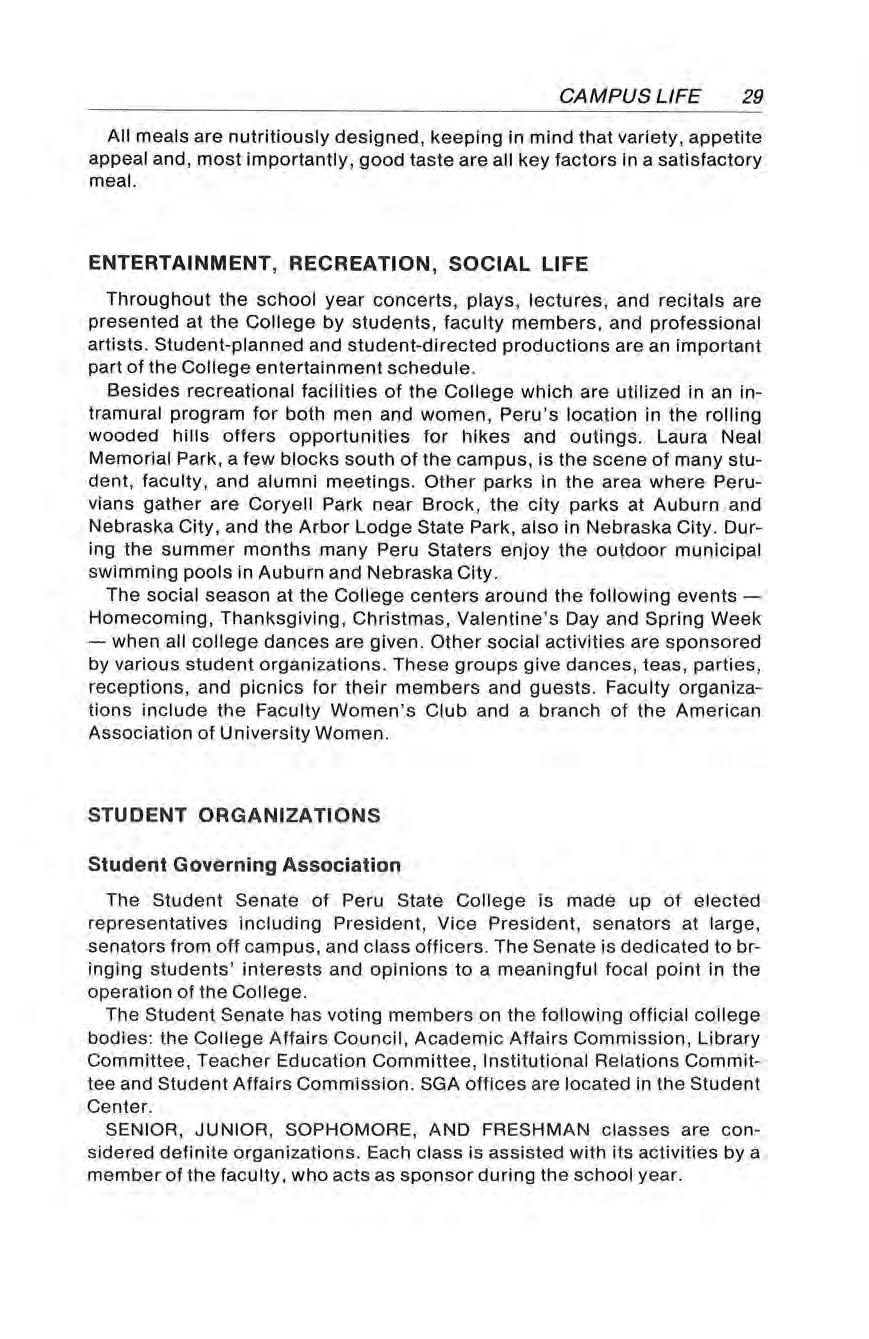
The Student Senate of Peru State College is made up of elected representatives including President, Vice President, senators at large, senators from off campus, and class officers The Senate is dedicated to bringing students' intere sts and opinions to a meaningful focal point in the operation of the College.
The Student Senate has voting members on the following official college bodies: the Col lege Affairs Council , Academic Affairs Commission, Library Committee, Teacher Education Committee, Institutional Relations Committee and Student Affairs Commission SGA offices are located in the Student Center.
SENIOR, JUNIOR, SOPHOMORE, AND FRESHMAN classes are considered definite organizations. Each class is assisted with its activities by a member of the faculty, who acts as sponsor during the school year.
MEN'S HALL COUNCILS AND WOMEN STUDENTS ASSOCIATION are representative councils selected by the residents of the men's and women's residence halls, respectively . The governing bodies of the halls handle problems and plan social activities for the residents.
The CONCERNED BLACK STUDENTS is open to all students interested in promoting the understanding of people.
The CIRCLE K CLUB is a Kiwanis-affiliated service organization which is dedicated toward the betterment and advancement of the campus and community
The DRAMATICS CLUB, one of the state's oldest dramatic organizations, throughout its existence has presented to the College community the best in drama.
The HOME ECONOMICS CLUB offers opportunities for development of personality and for stimulation of interest in homemaking and the professional field. It is affiliated with the American Home Economics Association, and the Nebraska Home Economics Association .
INDUSTRIAL ARTS CLUB is devoted to promoting interest in the Industrial Arts and Vocational Education
The PERU SOCIAL SCIENCE SOCIETY strives to provide an informal setting for socialization and discussion.
The KPSC RADIO CLUB programs and operates the campus radio station. Membership is open to all students who desire to actively assist in the total operation of the station
STUDENT ASSOCIATION FOR RETARDED CITIZENS is composed of Special Education majors and other students interested in the education of exceptional children
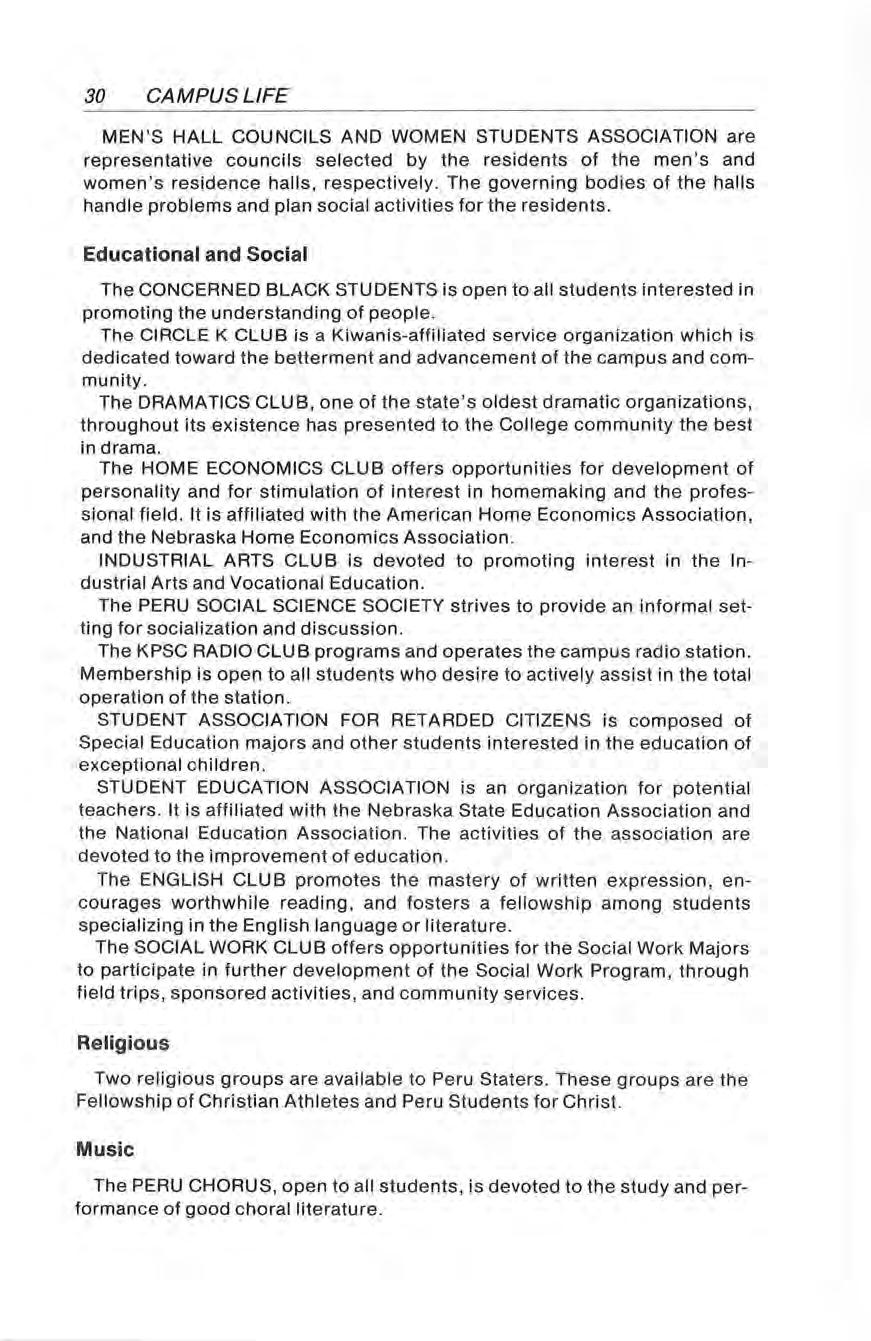
STUDENT EDUCATION ASSOCIATION is an organization for potential teachers It is affiliated with the Nebraska State Education Association and the National Education Association The activities of the association are devoted to the improvement of education.
The ENGLISH CLUB promotes the mastery of written expression, encourages worthwhile reading, and fosters a fellowship among students specializing in the English language or literature .
The SOCIAL WORK CLUB offers opportunities for the Social Work Majors to participate in further development of the Social Work Program, through field trips, sponsored activities , and community services.
Two religious groups are available to Peru Staters These groups are the Fellowship of Christian Athletes and Peru Students for Christ.
The PERU CHORUS, open to all students, is devoted to the study and performance of good choral literature.
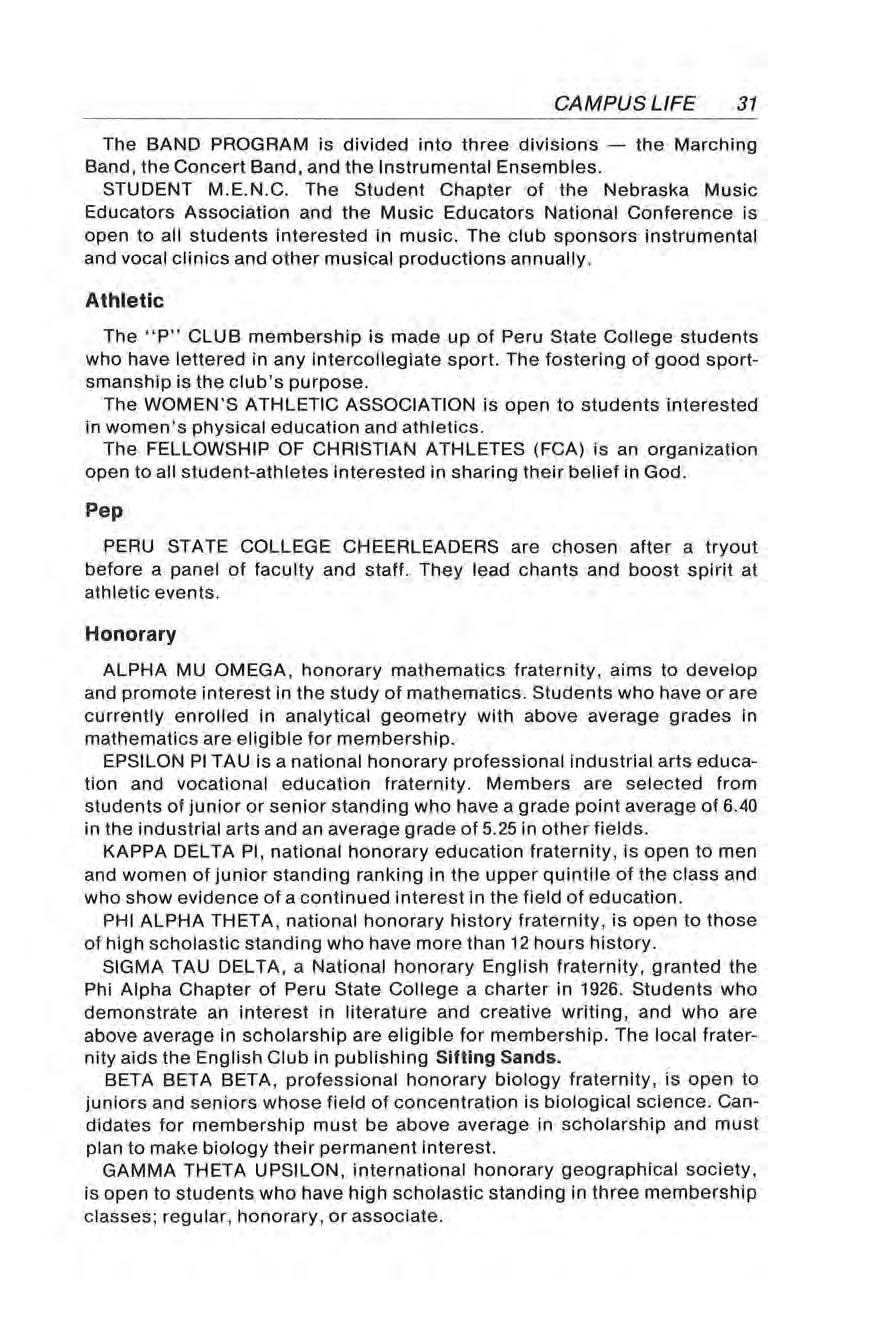
The BAND PROGRAM is divided into three divisions - the Marching Band, the Concert Band, and the Instrumental Ensembles.
STUDENT M.E . N.C. The Student Chapter of the Nebraska Music Educators Association and the Music Educators National Conference is open to all students interested in music. The club sponsors instrumental and vocal clinics and other musical productions annually.
The "P " CLUB membership is made up of Peru State College students who have lettered in any intercollegiate sport. The fostering of good sportsmanship is the club's purpose .
The WOMEN'S ATHLETIC ASSOCIATION is open to students interested in women's physical education and athletics .
The FELLOWSHIP OF CHRISTIAN ATHLETES (FCA) is an organization open to all student-athletes interested in sharing their belief in God.
PERU STATE COLLEGE CHEERLEADERS are chosen after a tryout before a panel of faculty and staff. They lead chants and boost spirit at athletic events.
ALPHA MU OMEGA , honorary mathematics fraternity, aims to develop and promote interest in the study of mathematics. Students who have or are currently enrolled in analytical geometry with above average grades in mathematics are eligible for membership.
EPSILON Pl TAU is a national honorary professional industrial arts education and vocational education fraternity. Members are selected from students of junior or senior standing who have a grade point average of 6.40 in the industrial arts and an average grade of 5.25 in other fields
KAPPA DELTA Pl, national honorary education fraternity, is open to men and women of junior standing ranking in the upper quintile of the class and who show evidence of a continued interest in the field of education.
PHI ALPHA THETA, national honorary history fraternity, is open to those of high scholastic standing who have more than 12 hours history.
SIGMA TAU DEL TA, a National honorary English fraternity, granted the Phi Alpha Chapter of Peru State College a charter in 1926. Students who demonstrate an interest in literature and creative writing, and who are above average in scholarship are eligible for membership The local fraternity aids the English Club in publishing Sifting Sands.
BETA BETA BETA, professional honorary biology fraternity, is open to juniors and seniors whose field of concentration is biological science. Candidates for membership must be above average in scholarship and must plan to make biology their permanent interest.
GAMMA THETA UPSILON, international honorary geographical society, is open to students who have high scholastic standing in three membership classes; regular, honorary, or associate .
PHI BETA LAMBDA. The local chapter, Epsilon Tau, is a business fraternity affiliated at both the state and national levels Membership is open to all students interested in business.
LAMBDA DEL TA LAMBDA is an honorary fraternity for all people who are interested in physical science.
WHO'S WHO Among Students in American Universities and Colleges annually determines the number of students with senior standing in the College who may be selected for this honor These honorees are selected by a committee of students and faculty on the basis of scholarship, leadership and participation in academic and extracurricular activities, citizenship and service to the College , and promise of future usefulness in business and society.
The Pedagogian is the official college newspaper. It is published during the academic year under the supervision of the journalism instructor . Although contributions are welcomed, the majority of the writing and editing is done by the students in journalism classes.

The Student Life Handbook is published in the late summer by the Office of Student Services . The publication serves as a guide to campus living for all students.
Sifting Sands is a maga z ine of student writing published each spring by the English Club and Sigma Tau Delta
KPSC is the call number for the Peru State College radio station. This station broadcasts to buildings on the campus, and serves as a laboratory for radio and speech classes
Each student is expected to conduct himself in accordance with the regulations of the college and such laws of the City, State, and Federal Governments as apply to matters of personal conduct
The College reserves the right to exclude at any time students whose conduct is deemed undesirable or injurious to the best interests of the College , or of the student.
For detailed information regarding student conduct, see the Peru State College Code of Student Conduct and the Student Life Handbook
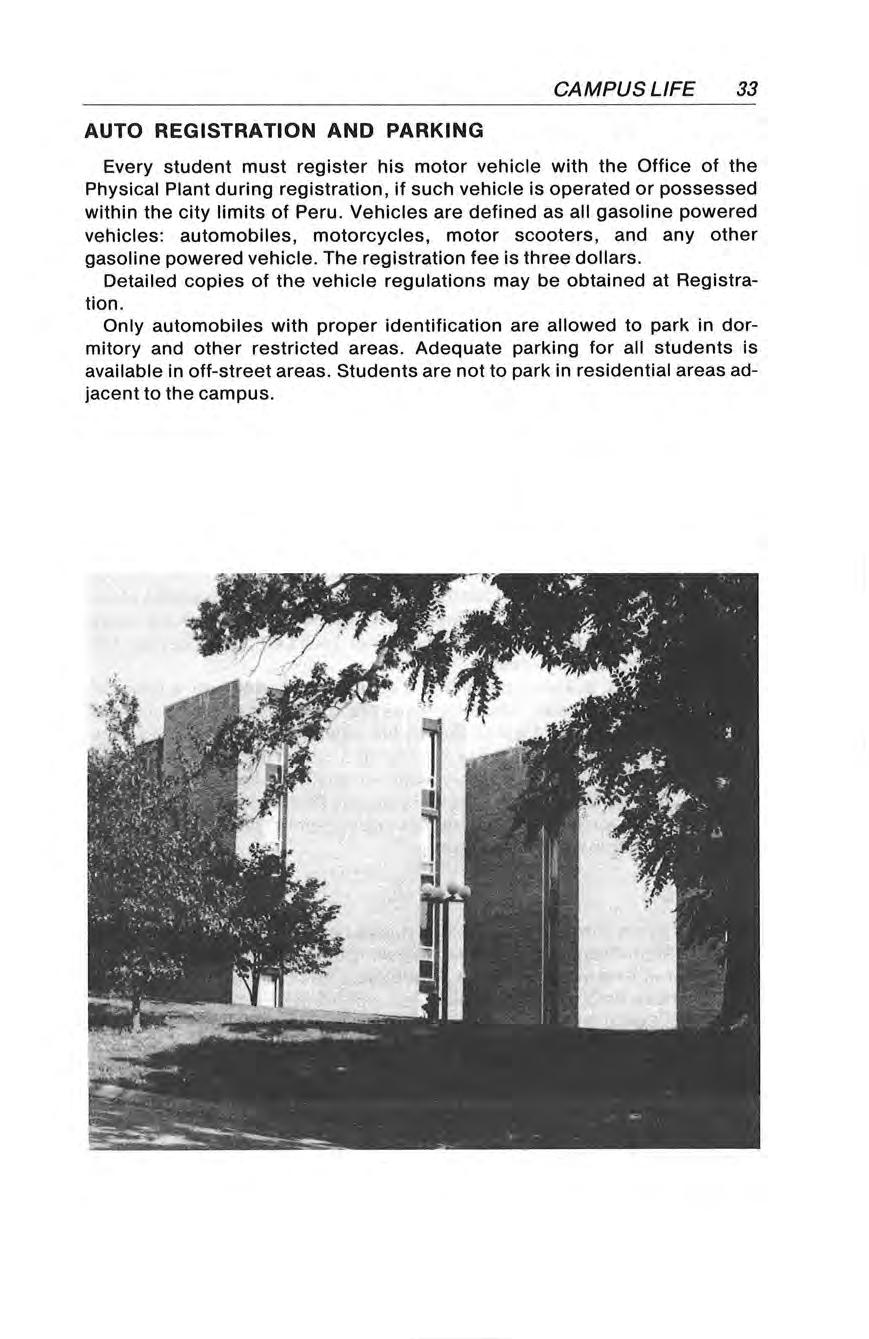
Every student must register his motor vehicle with the Office of the Physical Plant during registration, if such vehicle is operated or possessed within the city limits of Peru . Vehicles are defined as all gasoline powered vehicles: automobiles, motorcycles, motor scooters, and any other gasoline powered vehicle. The registration fee is three dollars
Detailed copies of the vehicle regulations may be obtained at Registration.
Only automobiles with proper identification are allowed to park in dormitory and other restricted areas. Adequate parking for all students is available in off- street areas. Students are not to park in residential areas adjacent to the campus.
The College is supported by the St ate of Nebraska for the purpose of meeting the educational needs at the college level of citi zens of the state The College is a multi-purpose regional institution with a broad variety of programs in general liberal arts, vocational - technical education , teacher education, and a variety of pre-professional or terminal vocational education programs culminating in a Bachelor of Arts , Bachelo r of Science , or a Bachelor of Technology degree and Associate of Arts degrees in certain vocational areas The College also provides programs of instruction for adults in learning centers throughout southeast Nebraska
The studies offered by the College include four - year professional curricula in elementary education and in secondary education; a four-year liberal arts program ; a bachelor of science program flexible enough to satisfy a variety of interests and objectives ; and a number of one-year and two-year terminal and pre - professional curricula .
In general , the various curricula offered by the College consist partly of general studies course and partly of speciali z ed courses The general studies courses are those set forth as important for all individuals for effective living, regardless of their vocation s The speciali zed courses are those that prepare specifically for teaching or other vocations , or satisfy special avocational or cultural interests .

Upon enrolling , a student chooses a vocational objective or a major of . principal cultural interest. This determines the curriculum that he will follow and the advisor who will guide him i n his educational e x periences The choice may be tentative and may be c hanged later. Students who desire special assistance in selecting a vocational goal may request vocational counseling from their academic adviso r s and the Director of Placement.
Students who are undecided i n rega r d to a vocational and/or educational 9oal may register in a general category.
The College is authorized by law and rules of the Board of Trustees of the Nebraska State Colleges to issue the following degrees :
Bachelor of Arts in Education (A.B . in Educ.) This degree is given to candidates whose field of concentration is in one of the following fields : Art, History and Social Science or Language Arts.
Bachelor of Fine Arts in Education ( B.F.A. in Educ.) Music
Bach e lor of Science in Education ( B.S. in Educ.) This degree is given to candidates whose field of concentration is in one of the following fields : Physical Education, Practical Arts, Mathematics and Science, Elementary Education or Library Science .
Bachelor of Arts (A.B.) This degree is given to candidates without regard to field of concentration and without the professional education requirements (See Additional Requirements)
Bachelor of Science (B.S.) Thisdegreeisgiventocandidateswithoutthe professionaleducationand/orthemodern languagerequirement.
Bachelor of Technology. Thisisanalternativedegreeforcandidateswho transferfromotherinstitutions, havingcompletedaprescribedoneortwoyear technical program. Students may elect to meet requirements for this degreeratherthantheusualrequirementsforthe B.A.or B.S. (Seespecial requirements)
Associate in Arts (A.A.) Thisdegreeisgivencandidateswhocompletea two year program approved by the college. Such programs at Peru State Collegeareofthecareerladdertype. Thestudentmaygotoschoolayear, stay out and work the following year or two, and return to complete his Associate of Arts degree. He may also apply his degree toward a baccalaureatedegreeinthesamemajorarea.
Total Hours. A candidate for a degree must earn 125 semester hours of coursecredits.
Upper-Division Credit. Thestudentmusthaveearnedatleast40hoursof upper-divisioncredit(300 and400series).
Grade Point Average. A gradeaverage of 5.25is requiredfor alldegrees inTeacherEducation. Anaverageof5.00isrequiredforotherdegrees.
Resident Credit. A minimum of 30 resident credits is required. The resident credit must be to the extent of 24 hours of the last 30 hours for a degree.Thisresidentrequirementmaybewaivedincaseswhereanyofthe requiredresidentcreditisearnedinaoyoneofthefourStateColleges.
Professional School Residence Credit. Under certain circumstances in which a pre-professional student has successfully completed three years of training at Peru State College in a specific approved program, he may transfer to an accredited professional school during his fourth year, and qualify for the baccalaureate degree, provided he meets all other graduationrequirements.
Correspondence and Extension Credit. Not more than one-fourth of the total requirements for a degree may be satisfied through correspondence studyandextensionclasses, andofthisnumberthecorrespondencestudy alone cannot exceed one-eighth of the total hours. Study center or offcampusclasseswillbehonoredasresidentcreditifconductedbythisCollege.
Major. Each degree candidate (except those in elementary education) must complete the general studies program, a major, and supporting coursesinkeepingwithhis�ducationalobjective.
Independent Study. A max\mum_of six (6) hours of Independent Study
r Ocountstowardgraduation.
Normal Progress. To maintain normal progress astudentmust complete the graduationrequirements as outlined in a catalog issued not morethan sevenyearsprevioustotheendoftheterminwhichthestudentexpectsto completehiswork. Incase normal progress is notmaintained, the student
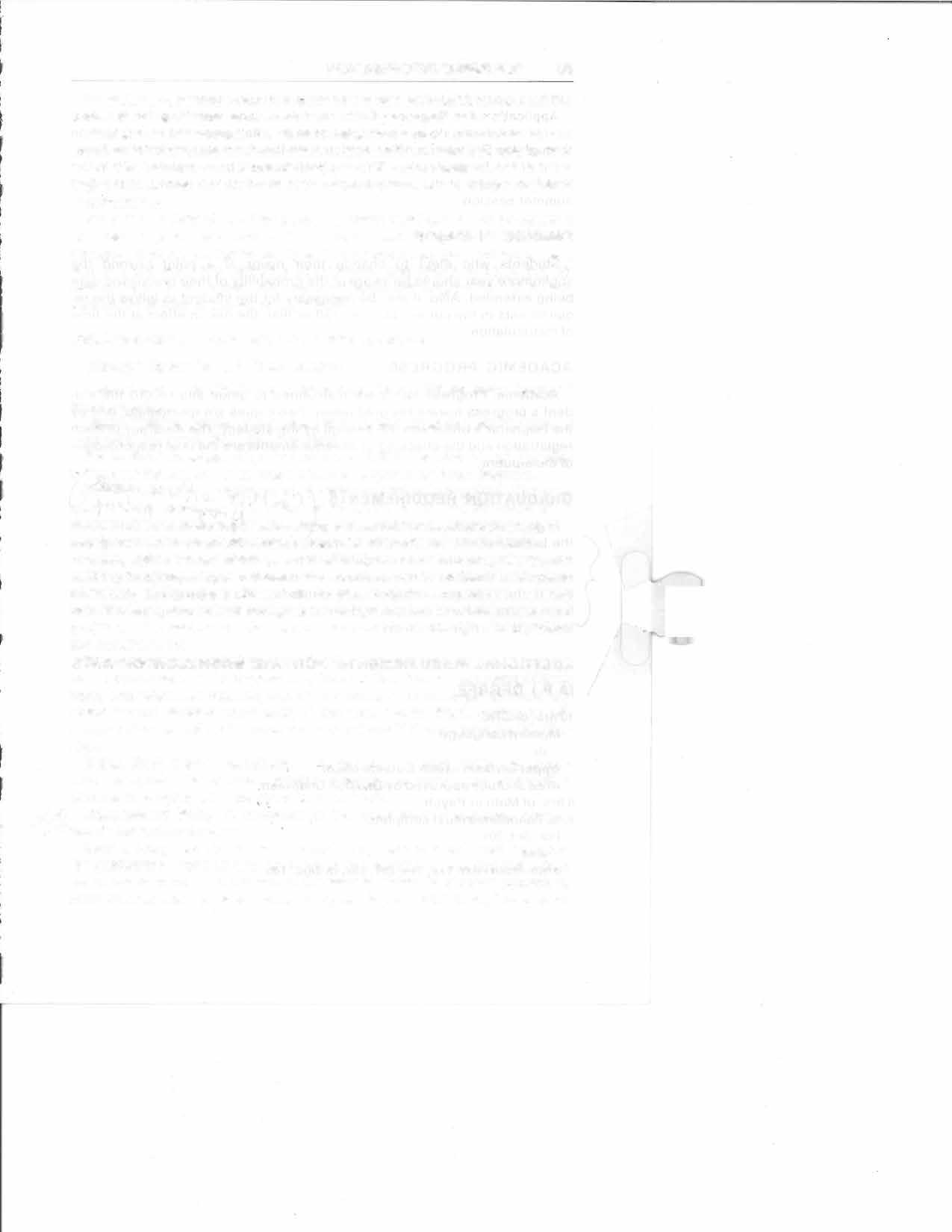
will be expected to follow requirements in the current catalog. Application for Degrees. Each candidate upon enrolling for the final course requirements in a semester or term, shall complete an application through the Registrar's office setting forth the degree(s) , major(s) and payment of fee for graduation. This application must be completed within the first five weeks of the semester or within the first two weeks of the first summer session.
Students who elect to change their major at a point beyond the sophomore year should be aware of the probability of their graduation date being extended. Also, it may be necessary for the student to follow the requirements in the current bulletin, rather than the one in effect at the time of matriculation
Academic Progress forms are maintained to guide and record the student ' s progress toward his graduation. Two copies are maintained, one by the Registrar ' s office and the second by the student. The accuracy of each registration and the checking of all requirements are the final responsibility of the student.
In general, students will follow the g duation rfqu~ents as outlined in toward a degree has been irregular or interrupted to a point of five years or more since the date of matriculation will meet the requirements of graduation in the most recent bulletin Students for whom a progress sheet has been made, and who are making normal progress toward a degree, will continue in their original bulletin.
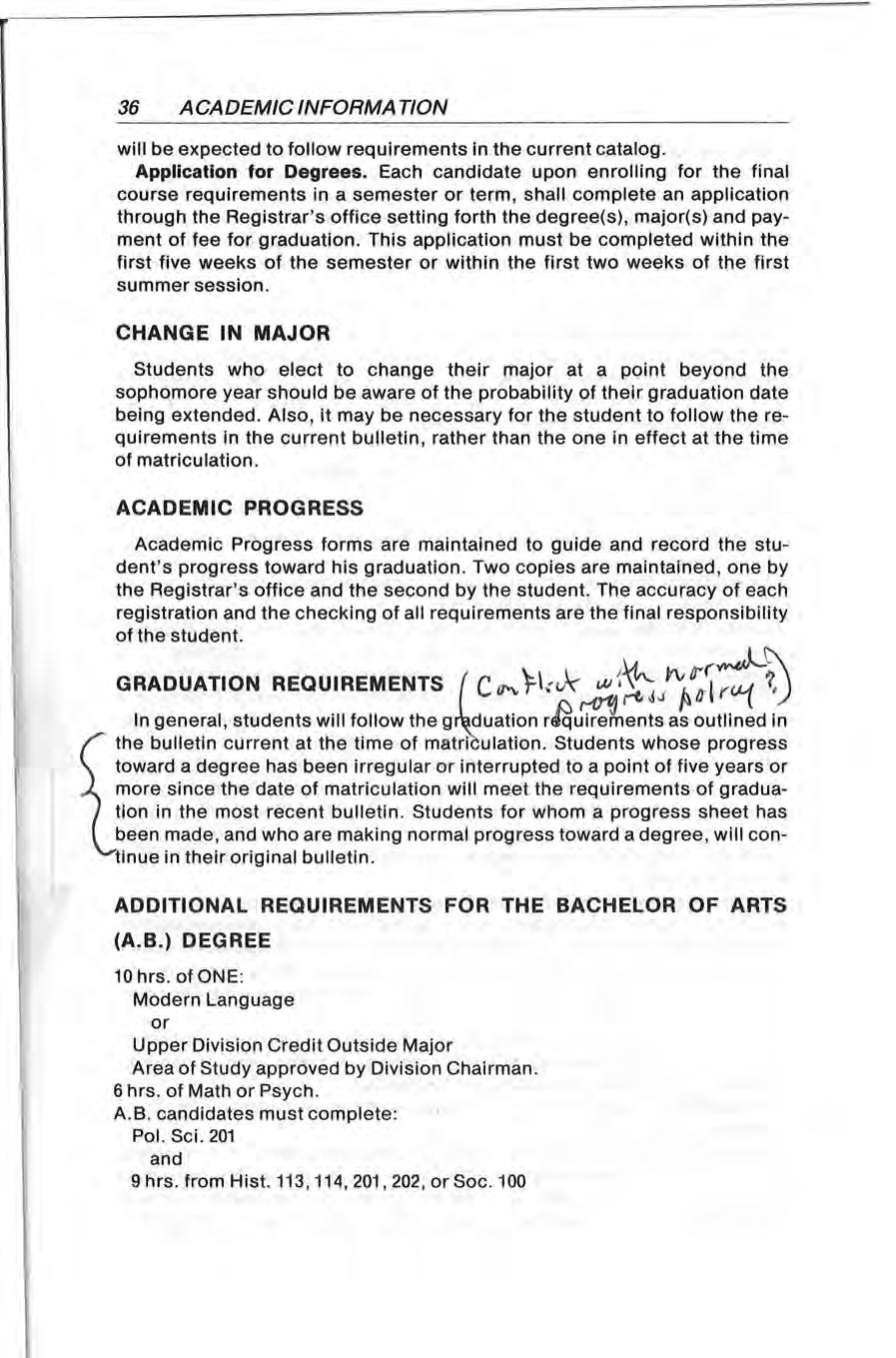
10 hrs. of ONE : · Modern Language or Upper Division Credit Outside Major Area of Study approved by Division Chairman .
6 hrs. of Math or Psych
A . B. candidates must complete : Pol. Sci. 201 and 9 hrs. from Hist.113, 114,201,202, or Soc 100
Students must have completed either a one or two year technical program at an institution accredited by a regional accrediting agency to be eligible for this degree.
GPA of 5 00 on all work done at Peru will be required. A minimum of 30 semester hours must be done in residence.
At least 20 hours of credit must be 300 (junior) level or higher.
Students who have completed their programs at a non-accredited technical institution are subject to the same probationary provisions as are students seeking the B.S and B.A. degrees who transfer from nonaccredited institutions.
The degree for successful candidates will read Bachelor of Technology in whatever the transfer major is with an additional emphasis in whatever the resident area of emphasis is.
EXAMPLE: Bachelor of Technology in Food Service with additional emphasis in Biology.
Program of Study at Peru State College For Transfer Students With An A.A. or A.S. Degree
General Studies: Thirty semester hours required exclusive of hours used to fulfill resident area of emphasis. At lea st 3 hours se l ected from each area listed below and no more than 9 hours of the 30 hour total in any one area:
English Composition
Mathematics/ Science
Communications Literature I Fine Arts
Social & Behavioral Science Health & Hygiene/P . E. Applied Arts
Resident Area of Emphasis: Minimum of 25 semester hours. Courses selected by student and advisor, but must be concentrated in one discipline. Composite grade average of "5" is required in courses making up this area of emphasis.
Transfer Technical Major: 60 semester hours maximum . This is the maximum number of hours from the A.A . or A.S. degree applicable toward the 125 hours required for the Bachelor of Technology Degree
Directed Electives To Total of 125 Hours : Hours may be selected from general studies beyond the required 30 hours; additional courses supportive of the resident area of emphasis or the transfer technical major, or others as directed by the advisor.
Program of Study at Peru State C o llege For Transf e r Stud e nts Who Have Completed A Designated One Year Program General Studies: Thirty semester hours required exclusive of hours used to fulfill resident area of emphasis. At least three hours selected from each area listed below and no

more than 9 hours of the 30 hour total in any one area .
English Composition
Communications
Social & Behavioral Science
Mathematics/ Science
Literature/Fine Arts
Health & Hygiene/P E
Applied Arts
Resident Area of Emphasis: Minimum of 35 semester hours. Courses to be selected by student and advisor, but must be concentrated in one discipline. Composite grade average of "5" is required in courses making up this area of emphasis.
Transfer Technical Major: Maximum of 30 semester hours. This is the maximum number of hours applicable toward the 125 hours required for the Bachelor of Technology degree.
Directed Electives To Total of 125 Hours: Hours may be selected from general studies beyond the required 30 hours ; additional courses supportive of the resident of emphasis or the transfer technical major, or others as directed by the advisor

The purpose of General Studies at Peru State is to provide undergraduates with the concepts, understandings, skills, and values necessary for living purposefully in modern society. These studies, emphasizing the relation and unity of basic ideas from the several disciplines, are selected for their usefulness in helping to solve the common problems in both an individual and social context. To establish the unity of knowledge and experience, the distinct courses in general studies share common goals in the sense that they all should promote a spirit of inquiry, relate knowledge from various fields, and encourage continued liberal education on the part of the student. Specific courses are held to a minimum, with the intent that students should be encouraged to select those courses most appropriate to their educational needs.
1 Promote the student's understanding of his rights, privileges and responsibilities of participation and leadership in a democratic society.
2. Encourage intellectual curiosity
3. Increase the student's ability to apply abstract knowledge to practical and concrete situations.
4. Provide the opportunity to understand his interaction with his environment.
5. Provide opportunity to develop physical, social and emotional maturity.
6. Increase the student's ability to read and listen with critical comprehension .
*
7. Increase his ability to convey ideas, feelings and/or experiences to others with clarity.
8. Provide the opportunity to establish educational and vocational goals .
9. Encourage the growth of desirable leisure time activities.
101(3)
302(3)
•Eng. 202(3)
323(3)
324(3)
325(3)
Communications Speh 152(3) Speh 254(3) M C 260(3) Fine Arts
English
Composition
Appreciation of Literature Neo-Classical Writers
Period
American
American
Art
318(3)
319(3)
311(2) Mus. 406 SOCIAL LEARNING Fundamentals of Speech
(No more than 6 hours in history)
Econ 333(3) Economic History of the U S.
Geog. 101(a) ~ ) Principles of Physical Geography
Geog 103(3) Cultural Geography
Hist 113(3) History of the U.S. to 1865
Hist 114(3) Hi story of the U S Since 1865
Hist. 201(3) World Civilization to 1500
Hist. 202(3) World Civilization Since 1500
Hist 455(3) Twentieth Century Russia
Hist. 303(3) The U S in the 20th Century
Hist 467 or
Pol. Sci. 467(3) Far East
Phil. 201(3) lntroductio n to Philosophy

Phil. 301(3) Philosophy & History of World Religions I
Pol. Sci. 201 (3) American N11tional Government
Psych. 121(3) General Psychology
Rec. 220(3) Recreation Leadership
Soc 201(3) Prin c iples of Sociology
Soc . 300(3) Contemporary Social Problems
~eleN\'\~
12hours
Health and Hygiene 2-3
Educ 415(2)
H .Ec. 332(3)
P E 205(3)
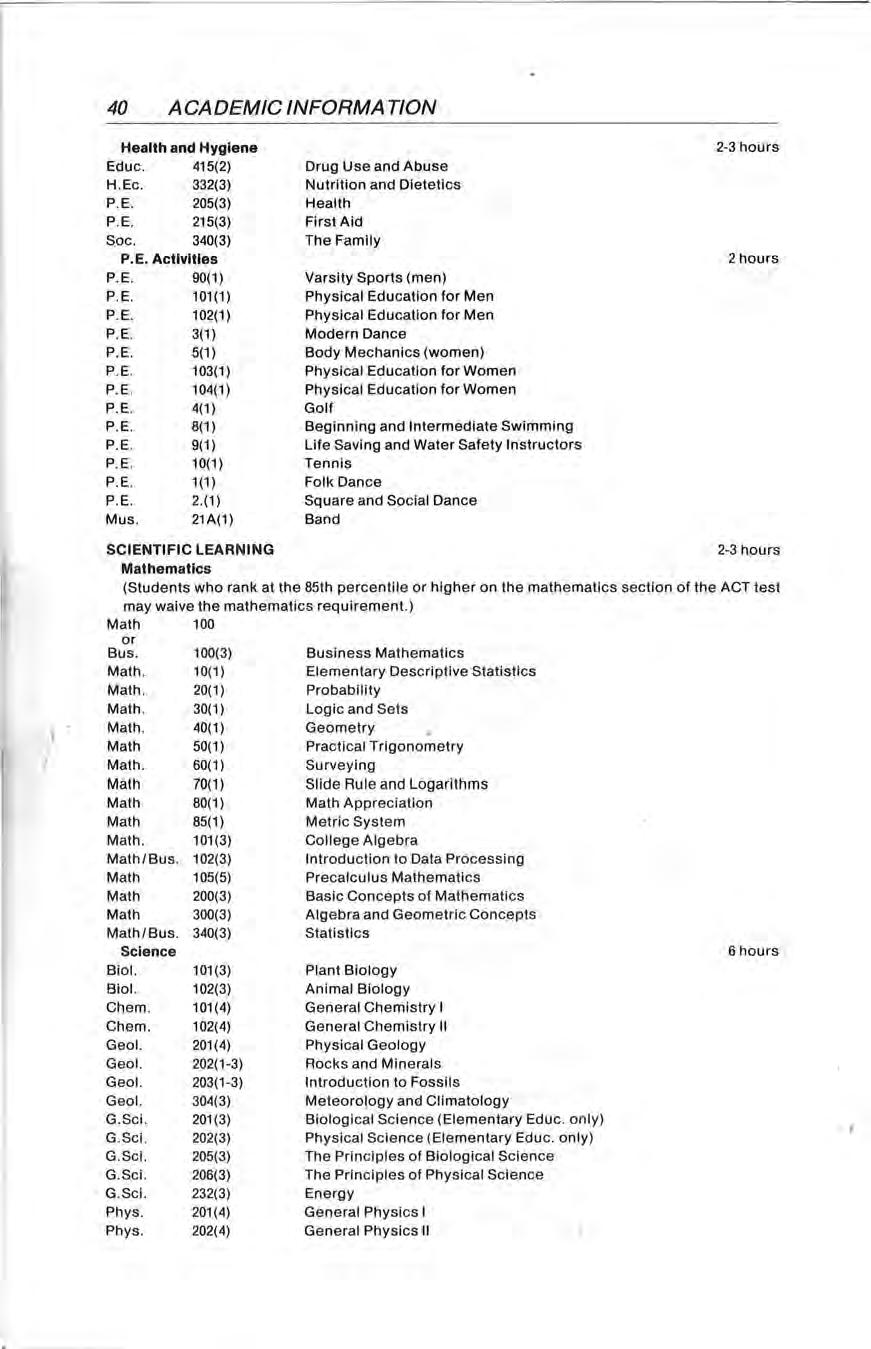
Use and Abuse
P E 215(3) First Aid
S,o c 340(3) The Family
P.E. Activities
P E 90(1) Varsity Sports (men)
P E. 101(1)
Education for Men
P E 102(1) Physical Education for Men
P.E 3(1) Modern Dance
P.E 5(1) Body Mechanics (women)
P E 103(1) Physical Education for Women
P E 104(1) Physical Education for Women
P E. 4(1) Golf
P E 8(1) Beginning and Intermediate Swimming
P E. 9(1) Life Saving and Water Safety Instru ctors
P E 10(1) Tennis
P E. 1(1) Folk Dance
P E. 2.(1) Square and Social Dance
Mus 21A(1) Band
SCIENTIFIC LEARNING
Mathematics (Students who rank at the 85th percentile or higher on the mathematics section of the ACT test may waive the mathematics requirement ) Math 100 or
TECHNICAL LEARNING 2-4 hours
Electives in business, technology, applied arts , or studio art *
Total
• studio Art is defined as those courses in Art that are oriented towards giving the student experiences in a particular media, process or technique. Courses in Art that are designated as having a primary purpose of presenting Art Teaching Methods , Art History or Art Appreciation would not fulfill the Technical Learning requirement.
Cooperative Graduate Program. Peru State College and the University of Nebraska work cooperatively to offer the Master ' s Degree in Elementary Education. Course work is taken on the Peru campus. The degree is granted through the University of Nebraska at Lincoln.
Evening College Courses. The College makes available an on-campus evening program of course offerings beneficial in meeting the educational needs of students. On-campus evening classes are offered each semester.
Continuing Education. The Continuing Education Division at Peru State College offers both credit and non -credit courses on campus and in surrounding communities Requests for information should be sent to the Director of Continuing Education.
Summer Session . A 10-week summer session is divided into two fiveweek terms which makes it possible for a student to earn a maximum of 12 semester hours of credit, six hours in each term. Courses are available which make it possible for a recent high school graduate to begin his post secondary education during the summer Request for information concerning the summer session and summer school bulletin should be directed to the Director of Summer Sessions.
This implies attainment beyond the minimum for admission to the College. The status may be acquired by (1) presenting work completed in another college ; (2) demonstrating proficiency in a certain field, thus removing the requirement of certain prerequisites . The latter may be with or without credit.
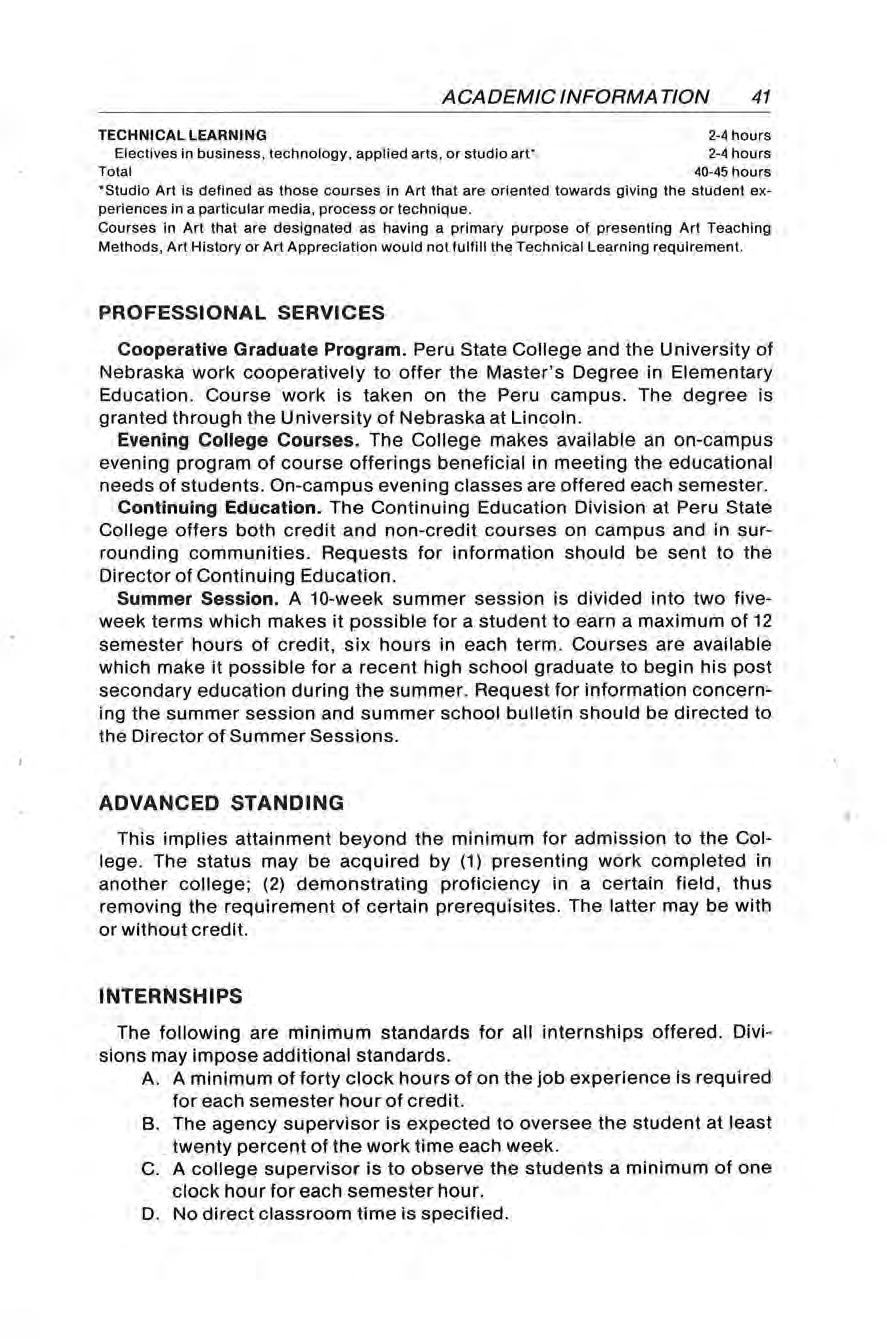
The following are minimum standards tor all internships offered Divisions may impose additional standards.
A. A minimum of forty clock hours of on the job experience is required for each semester hour of credit.
B. The agency supervisor is expected to oversee the student at least twenty percent of the work time each week.
C A college supervisor is to observe the students a minimum of one clock hour for each semester hour .
D. No direct classroom time is specified.
Peru State College will accept in transfer credit earned at another accredited college or university . This condition applies also to credit earned on an interim basis at another college while essentially a student at Peru State College.
A transfer student who has earned an Associate of Arts or Associate of Science degree will be regarded as having met the general studies program of Peru State provided the program of the college from which the individual i s transferring has been approved by the Academic Affairs Commission of this College . Special provisions apply to transfer students seeking a Bachelor of Technology Degree.

Applicants transferring to Peru State College from a non - accredited coll ege must meet all requirements of a first time student. Each application must be accompanied with an official t r anscript of all previous credit sent to the office of admission. Credits earned at non-accredited institutions will be accepted on a provisional basis. This credit is to be validated upon satisfactory completion of 30 semester hours of degree credit at Peru State Coll ege Satisfactory completion is defined as having obtained a cumulative grade point average of 5.00 or higher
A veteran of the armed forces who has received an honorable discharge from active duty will generally be granted credit for his military experiences in accordance with the recommendations of the Amf~ ic an Council on Education.
Institutional Exams. Students, due to experience and/or personal improvement, may qualify for credit in lower division courses through the procedure of an interview and a written examination provided the examination is made available by the respective academic divisions. The student must, through an interview, satisfy a faculty committee that he has had a formal or informal experience in which the course content may have been acquired. If the committee deems the above conditions have been met, the student will be given a written comprehensive examination
The amount of credit to be allowed, the course for which substitution, if any, is made, and the particular graduation requirements which may be satisfied, will be determined by the Chairperson of the division and will be subject to all general graduation requirements. The student must register for the course and pay the tuition charges before writing the examinations .
College Level Examination Program. A student may earn credit by examination through the College - Level Examination Program (CLEP) prepared by the College Entrance Examination Board Details of this pro -
cedure may be obtained from the Chairperson of the division representing the student's field. The following subject areas represent possible credit by examination through this program.

American Government
American History
American Literature II
Analysis and Interpretation of Literature
Biology - Plant
College Algebra
Computers and Data Processing
English Composition
Elementary Computer Programming - FORTRAN IV
General Chemistry
General Psychology
Introduction to Business Management
Introductory Accounting
Introductory Business Law
Economics
Introductory Marketing
Introductory Sociology
Statistics
Western Civilization
Money and Banking
1 No more than six (6) hours of Independent Study courses may be counted toward graduation.
2. No more than three (3) hours of Independent Study courses may be taken each semester.
3 Independent Study courses should not be used to replace required courses In hardship cases, the final decision will be made by the Division Chairman affected.
4 The title and a course outline for a specific Independent Study course must be submitted to the Division Head (with a copy to the Vice President for Academic Affairs) by the end of the third week of the semester. The course outline should be worked out in conjunction with the student(s)
5. Regardless of the type of course offered the student must meet with the instructor at least once a week.
6 At least a junior standing is required for a student to take an Independent Study course
College credit is expressed in terms of the semester hour, which represents the satisfactory completion of one hour of class attendance per week for one semester. The work may include any type of activity prescribed in the course - classroom work , preparation, laboratory or shop work, etc
Students having earned less than 30 semester hours of credit are classified as freshmen; 30 to 59 hours as sophomores; 60 to 89 hours as juniors; and 90 to 125 hours as seniors. Degree students earning additional undergraduate credit are classified as post graduate students.
The normal class load for a full time student is 12 to 16 semester hours. ~
The maximum load without special permission is 17 hours . Students with a
. grade point average of 7 00 for the previous semester may apply to the 1 Registrar for one additional hour, making a total of 18. An excess of 18 hours I~
up to and including the 21st hour must be approved by the chairperson of
the division in which the student is majoring. The maximum of 21 hours may
not be exceeded.
Veterans and other eligible persons attending this College under the
benefits of Chapter 34 and 35, Title 38, U .S.C . , as full time students must be
enrolled for at least 12 semester hours, or the equivalent.

Students are expected to attend classes regularly, arrive punctually, and do all assigned work in each class. The student agrees to this when he registers for a course. Attendance is a privilege and a responsibility represented not only by the student's investment, but also by a significant investment by the State
The individual instructor may determine attendance requirements for his own classes and has the right to base a portion of the student's grade on attendance These requirements will be presented to the class during the first week of the semester
Whenever absences or other elements of scholastic attitude reach the point of being detrimental (regardless of cause) to the student's standing in class and/or the success of the class as a whole, the instructor may confer with the student. The instructor and the student may mutually agree that the registration in the course should be cancelled or the instructor may issue the student a "scholastic alert" Future conferences for the same or related reasons may result in the instructor dropping the student from the class. If the student requests, the Vice President of Academic Affairs may be asked to participate in the decision.
A nine-point grading system is employed to evaluate the quality of the student's achievement.
The grades in numbers indicate the value of each semester hour of credit and also become the means of calculating the student's grade point average (GPA) to compare with scholarship standards Students are urged to calculate their own GPA from time to time and realize their own status The following two examples will be valuable in understanding the calculations :
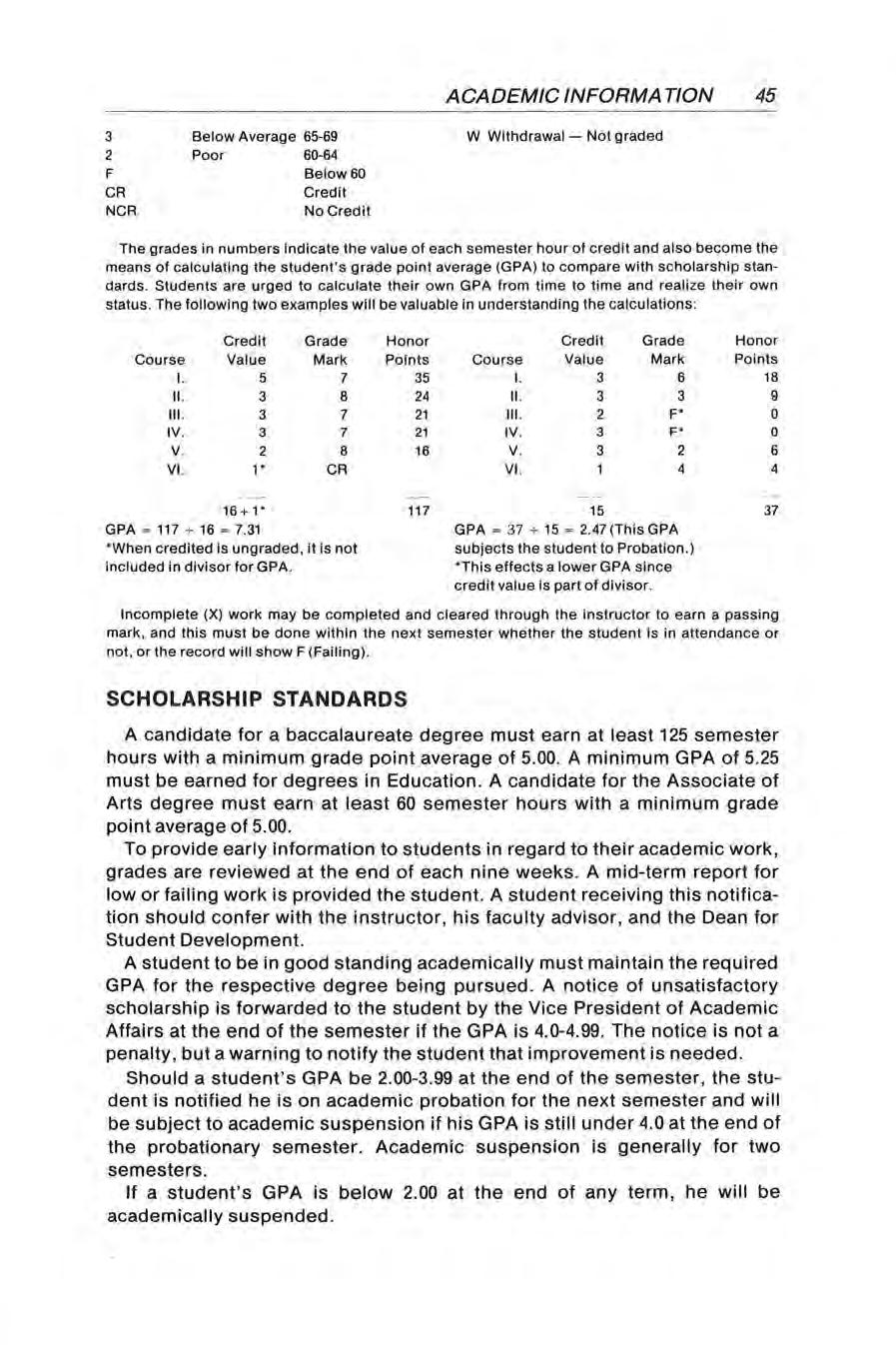
GPA = 117 + 16 = 7 31
GPA = 3 7 + 15 = 2 47 (This GPA when credited is ungraded, it is not subjects the student to Probation ) included in divisor for GPA.
•This effects a lower GPA since credit value is part of divisor
Incomplete (X) work may be completed and cleared through the instructor to earn a passing mark, and this must be done within the next semester whether the student is in attendance or not, or the record will show F (Failing)
A candidate for a baccalaureate degree must earn at least 125 semester hours with a minimum grade point average of 5.00. A minimum GPA of 5.25 must be earned for degrees in Education. A candidate for the Associate of Arts degree must earn at least 60 semester hours with a minimum grade point average of 5.00.
To provide early information to students in regard to their academic work, grades are reviewed at the end of each nine weeks. A mid-term report for low or failing work is provided the student. A student receiving this notification should confer with the instructor, his faculty advisor, and the Dean for Student Development.
A student to be in good standing academically must maintain the required GPA for the respective degree being pursued. A notice of unsatisfactory scholarship is forwarded to the student by the Vice President of Academic Affairs at the end of the semester if the GPA is 4.0-4.99. The notice is not a penalty, but a warning to notify the student that improvement is needed .
Should a student's GPA be 2.00-3 99 at the end of the semester, the student is notified he is on academic probation for the next semester and will be subject to academic suspension if his GPA is still under 4 0 at the end of the probationary semester. Academic suspension is generally for two semesters.
If a student's GPA is below 2.00 at the end of any term, he will be academically suspended.
A student who has been academically suspended at the close of a semester may attend the subsequent summer session at Peru State If the appropriate cumulative GPA (4 00 or higher) is achieved the student may enroll for the next semester.
Students suspended for academic or social reasons are to apply at the Office of Admissions for readmission.
Students readmitted following academic suspension must maintain an average of 5.0 or higher for all course work taken for the term of re - entry and each following term until the required composite G.P A. o f 4 00 has been achieved . Failure to meet the above condition for a term will result in academic suspension . A student who has been suspended twice is generally not considered for readmission..
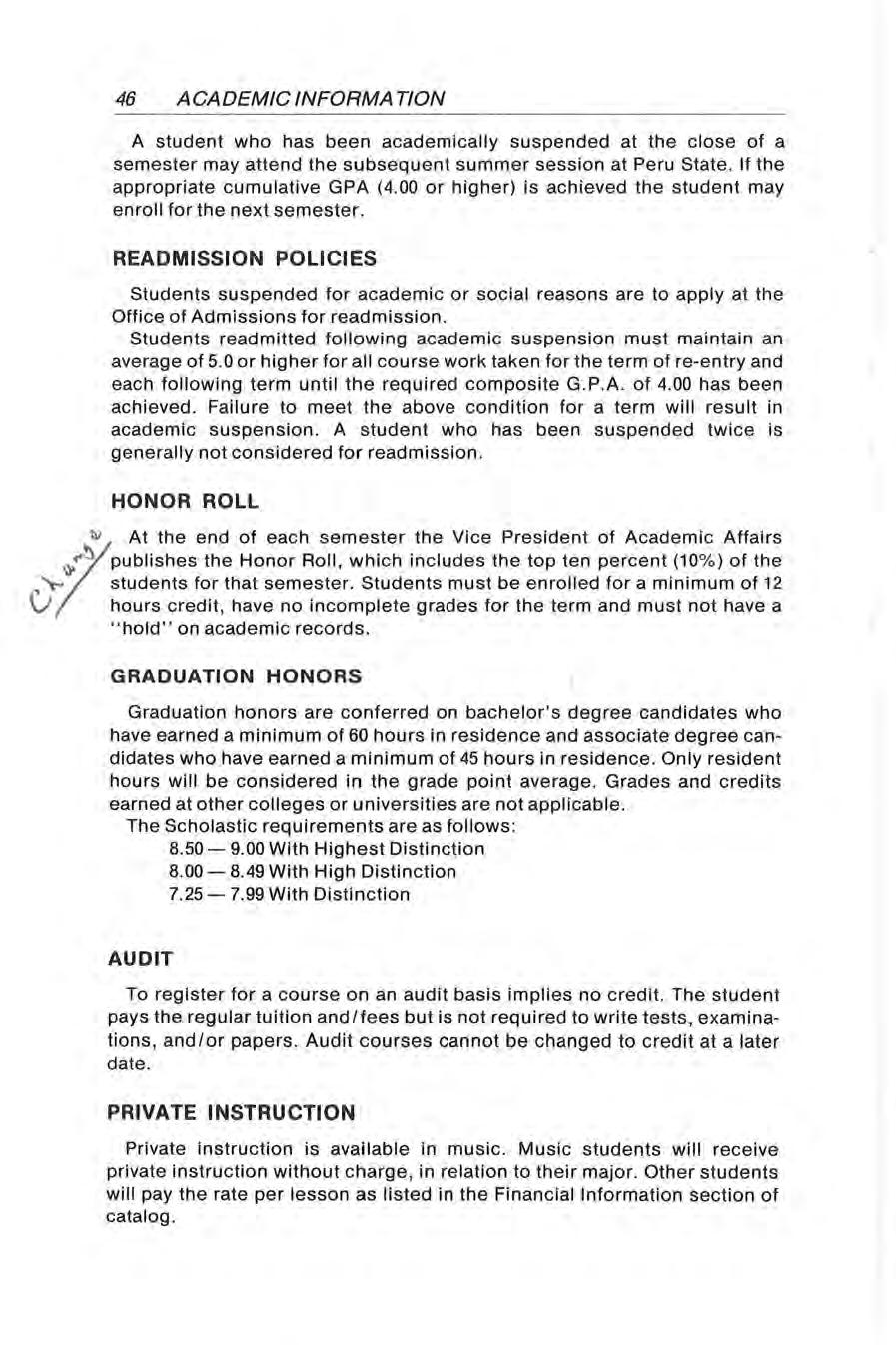
publishes the Honor Roll, which includes the top ten percent (10 % ) of the "'- students for that semeste r. Students must be enrolled for a minimum of 12
hours credit, have no incomplete grades for the term and must not have a " hold " on academic records .
GRADUATION HONORS
8.50 - 9.00 With Highest Distinction
8.00 - 8 49 With High Distinction
7 25 - 7 99 With Distinction
AUDIT
PRIVATE INSTRUCTION
A student may and is urged to repeat any course in which he has failed. There may be occasions when a student chooses to repeat a course purely for review, to be taken on an audit basis, without a change of grade.
The college maintains this center in Room 202 of the Education Building. Professional staff members are available to assist students and faculty members
The accuracy of each registration as related to class periods , sections, days and other possible conflicts is the responsibility of the student. Also, the ultimate responsibility for the meeting of all requirements rests with the student. In the event a change in program is unavoidable following a registration , the student must secure the approval of the advisor and the instructor. No courses may be added after the first two weeks of a semester When applicable, a tuition refund will be made during the first two weeks of a semester.
A student finding it necessary to withdraw from a class at any time must notify his advisor and the instructor and must officially withdraw at the Registrar's Office Students withdrawing without official approval will be graded " F "
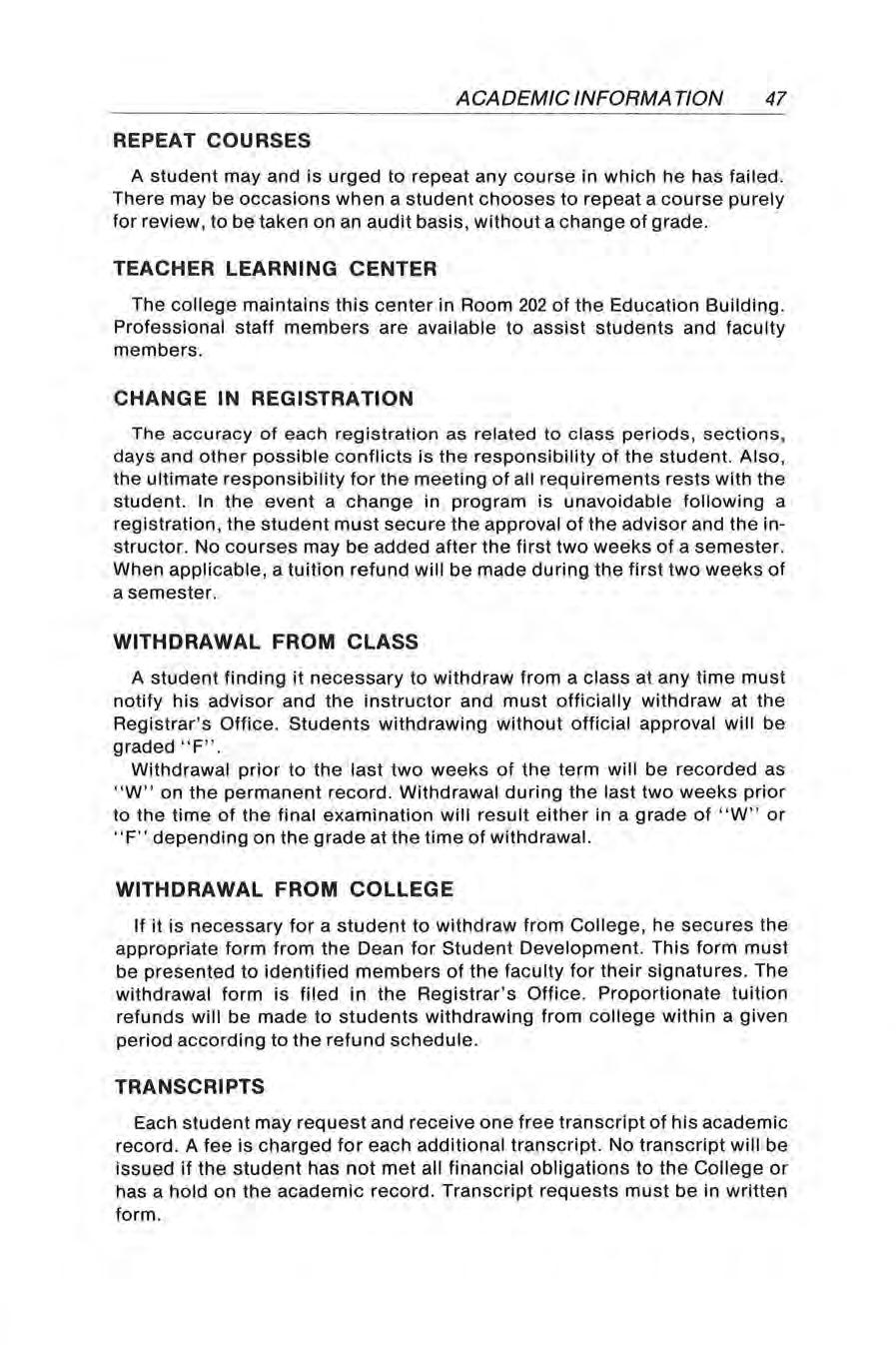
Withdrawal prior to the last two weeks of the term will be recorded as "W " on the permanent record Withdrawal during the last two weeks prior to the time of the final examination will result either in a grade of " W" or "F" depending on the grade at the time of withdrawal.
If it is necessary for a student to withdraw from College, he secures the appropriate form from the Dean for Student Development. This form must be presented to identified members of the faculty for their signatures The withdrawal form is filed in the Registrar ' s Office. Proportionate tuition refunds will be made to students withdrawing from college within a given period according to the refund schedule .
Each student may request and receive one free transcript of his academic record A fee is charged for each additional transcript. No transcript will be issued if the student has not met all financial obligations to the College or has a hold on the academic record. Transcript requests must be in written form

Most professional schools require for entrance two or more years of college credit in general education or basic liberal arts courses which vary only slightly from one profession to another Since such work i s required for the professional curricula in training teachers , this College offers a variety of courses that serve as pre-professional education. Suggested among these are those for prospective doctors, dentists , pharmacists, optometrists, nurses , veterinarians , lawyers , engineers, agriculturists, foresters, morticians , business executives , journalists and others. A student following a pre-professional progra m is urged to secure a bulletin from the institution to which he intends to transfer in order that specific requirements will be met. The various pre - professional programs are described under the appropriate school.
Students who are unable to attend college four years or more and wish to prepare for vocations requiring less time in preparation will find a variety of educational opportunities in this College. There are increasing opportunities today for young people in the occupational area classified as semi-professional. A student interested in an occupation in the above classification should know the requirements of the particula r professional or technical school to which he will transfer. It will then be possible for a counselor to assist him in making a parallel program of the required formal college courses. Examples are noted in the appropriate schools
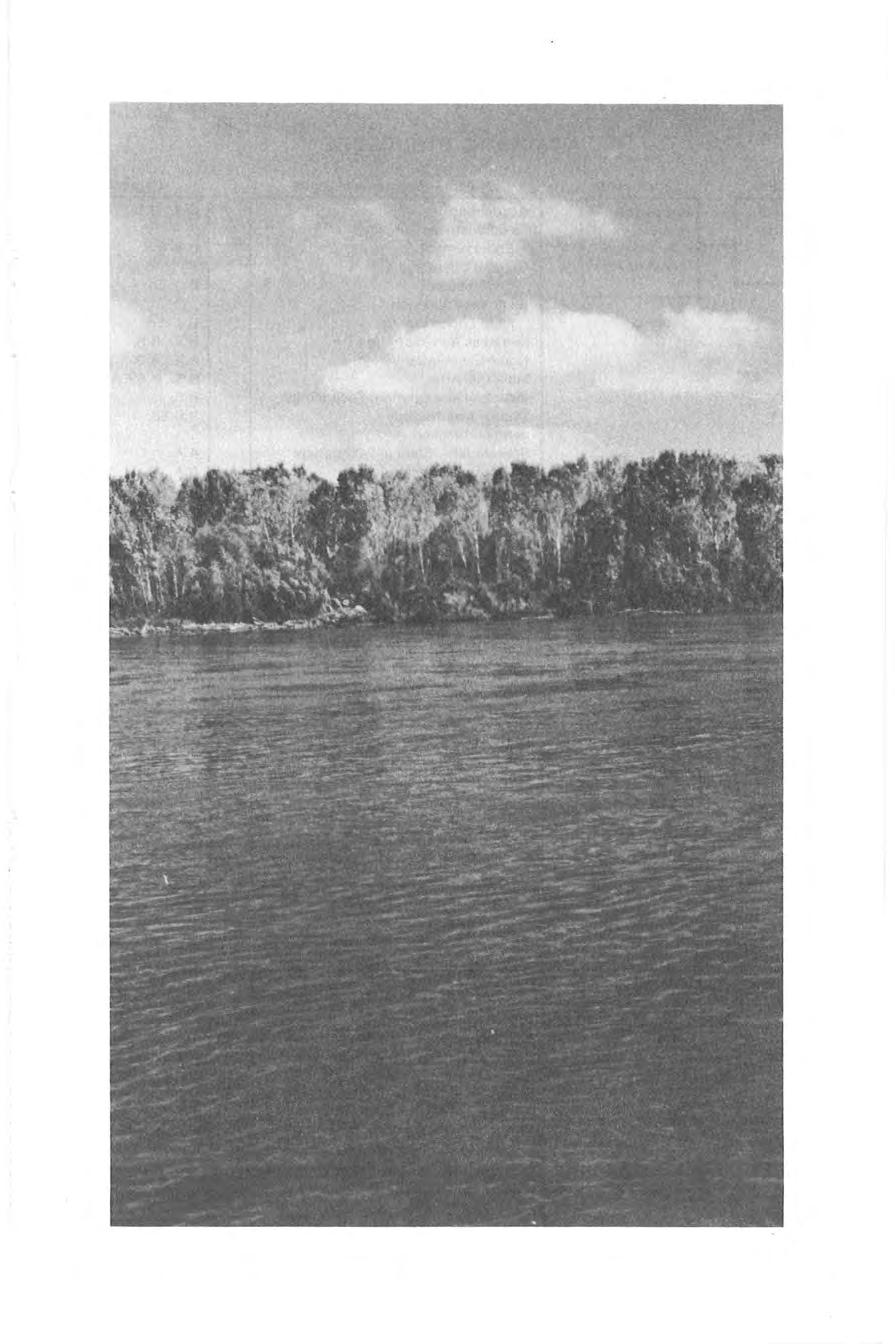

Pr
ional (Agriculture, Engineering, Forestry , Medicine, Dentistry , Mortuary , Nursing, Pharmacy, Phy sica l Therapy, Medical Technology, Vete r inari a n , X-Ray

The Division of Applied Arts offers programs emphasizing practical activities and understanding typified by Industrial Arts , Business, Home Economics, and Technical Education . The major objective is to enable individuals to prepare for personal living needs through practical activities. Courses are designed to give students the knowledge, habits and skills necessary to provide sufficient preparation for vocational use and/ or teaching.
The Business Department offers B . A. and B.S. programs in Accounting and Business Administration A Business Education degree is offered with subject endorsements in Basic Business and General Office A Field Endorsement is offered in Business Education.

·students who score at the 85th percentile or above on the mathematical section of the ACT test may waive Business Math 100 If Business Math 100 Is waived the student must elect an additional 3 hours in Business.

The Business Department offers A ssociate of Arts degree programs in Accounting Technology, Computer Programming, General-Clerical Technology , Medical Secretarial Technology, and Secretarial - Science Technology Students majoring in Accounting Technology are prepared for basic record keeping, report writing, tax and cost accounting , auditing procedures, use of business machines, and operation of electronic data processing machines . Computer programming majors are prepared for positions in data processing. Majors in General-Clerical Technology and Secretarial-Science Technology are trained for employment in general business offices as well as for work in offices of lawyers, accountants, etc. The Medical Secretarial Technology prepares the student for work with doctors, pharmacists, or other personnel in health fields .
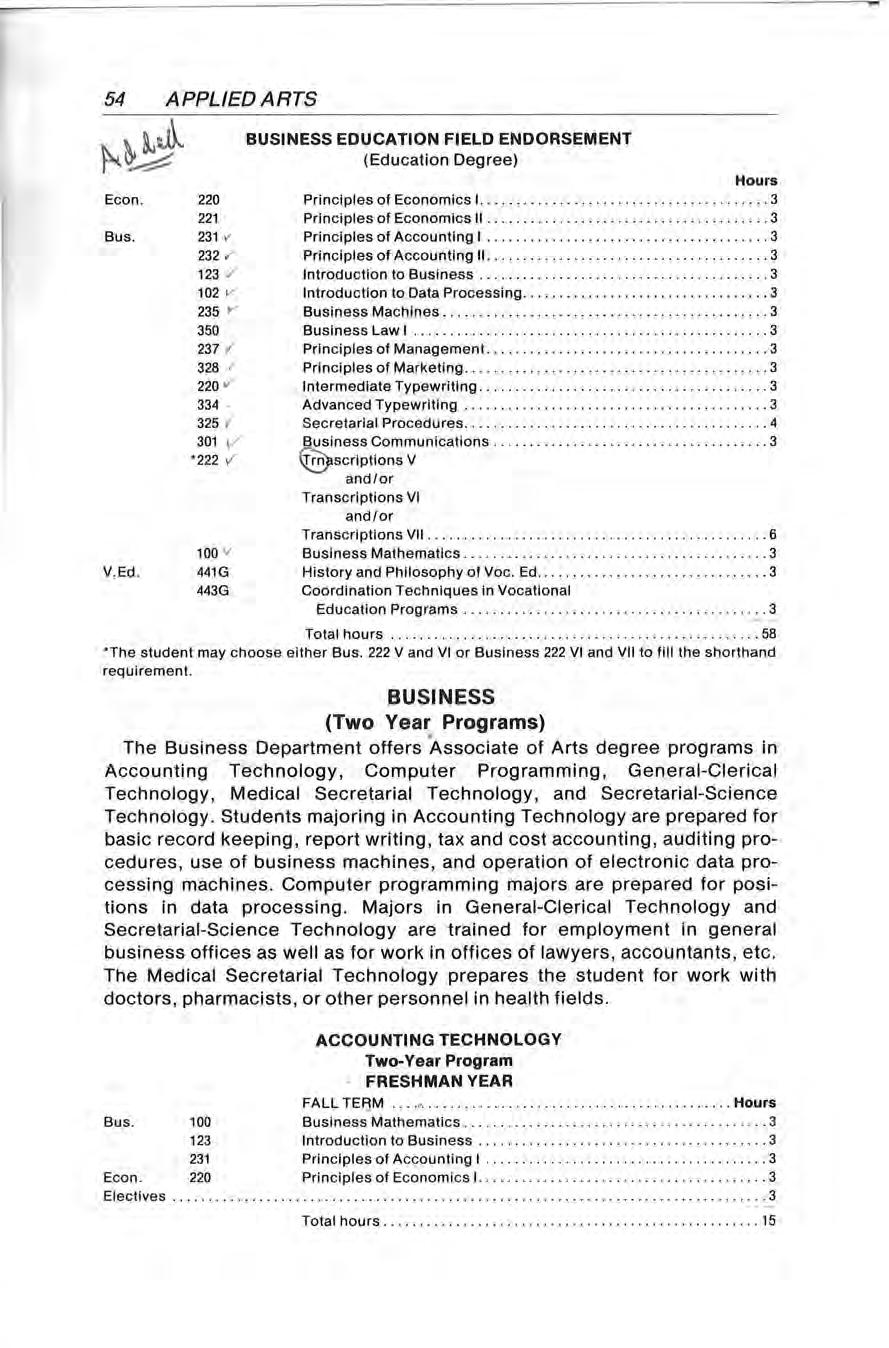

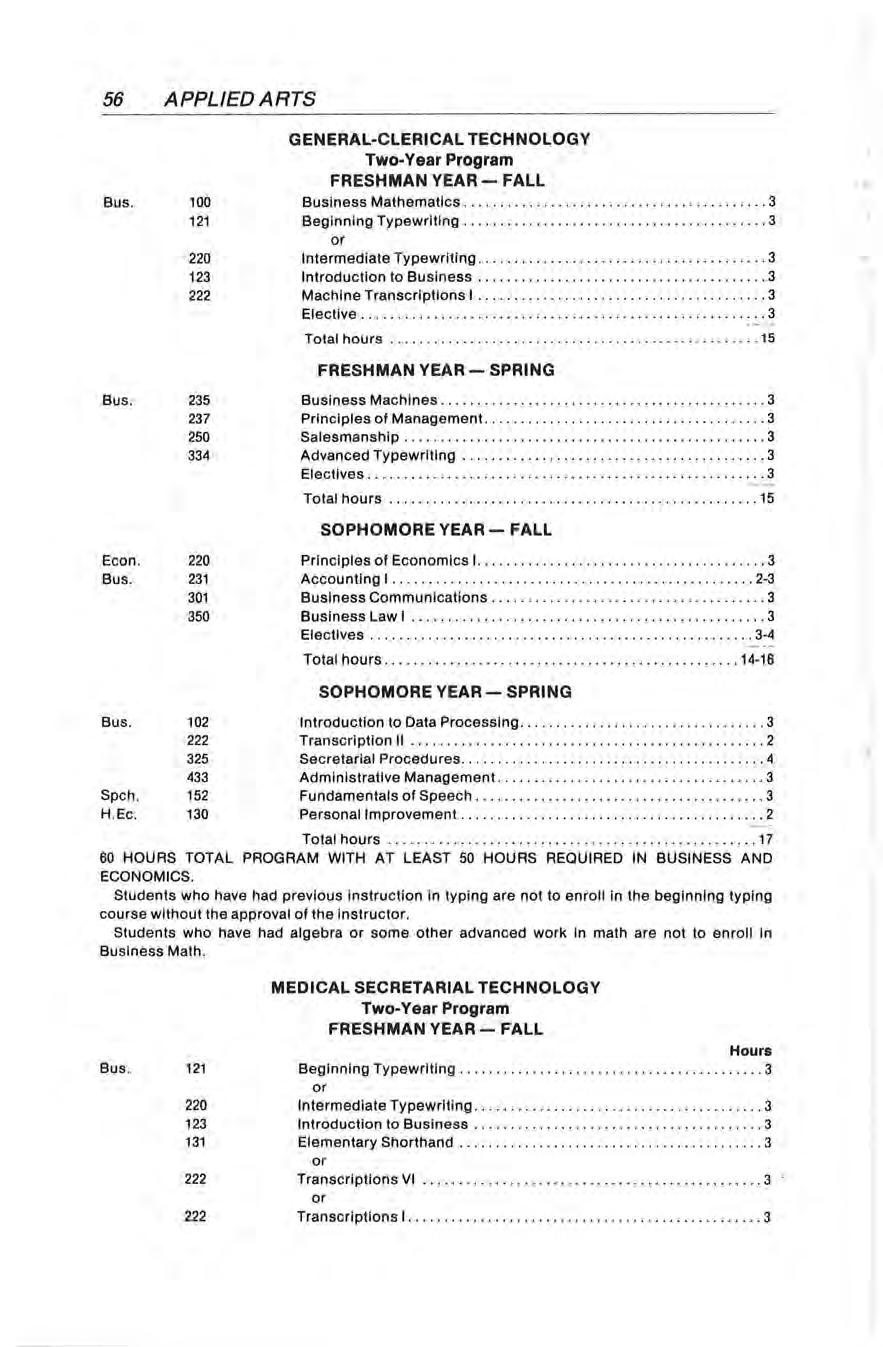

·student s with previous ins tr uct ion in typing sho ul d not e nroll without the approval of the instructor.
Students who have had algebra or other advanced work in math should not e nroll in Business Math.
Students who are not eligible to take the above courses in the sequence s ugg ested should se lect subs ti t ut e business req uirem ents or elect ives.
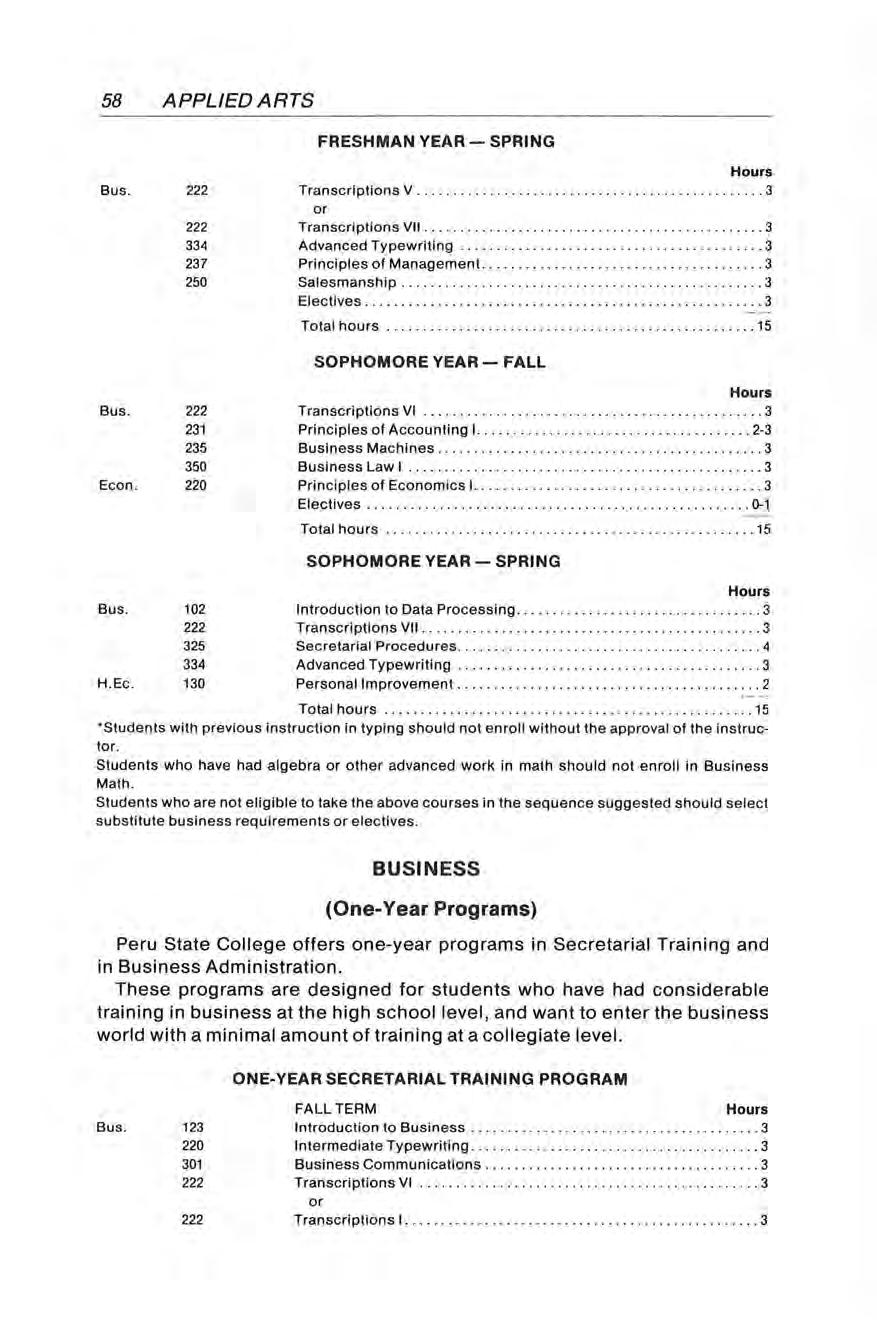
Peru State College offers one-year programs in Secretarial Training and in Business Administration
These programs are designed for students who have had considerable training in business at the high school level , and want to enter the business world with a minimal amount of training at a collegiate level.
Upon successfully completing the above program, the business department will offer acertificate of completion to all students who achieve a 5 00 cumulative grade point average in all courses taken in the business department, and who receive a grade of no less than a 4 in a specifically requ
skill co
a student's major.
" If ACT score in Mathemati cs is above the 85th percentile, this course may be waived Sele ct another course from among the electives
The Business Department will offer a cert ificate of completion to those who successfully complete the above program.
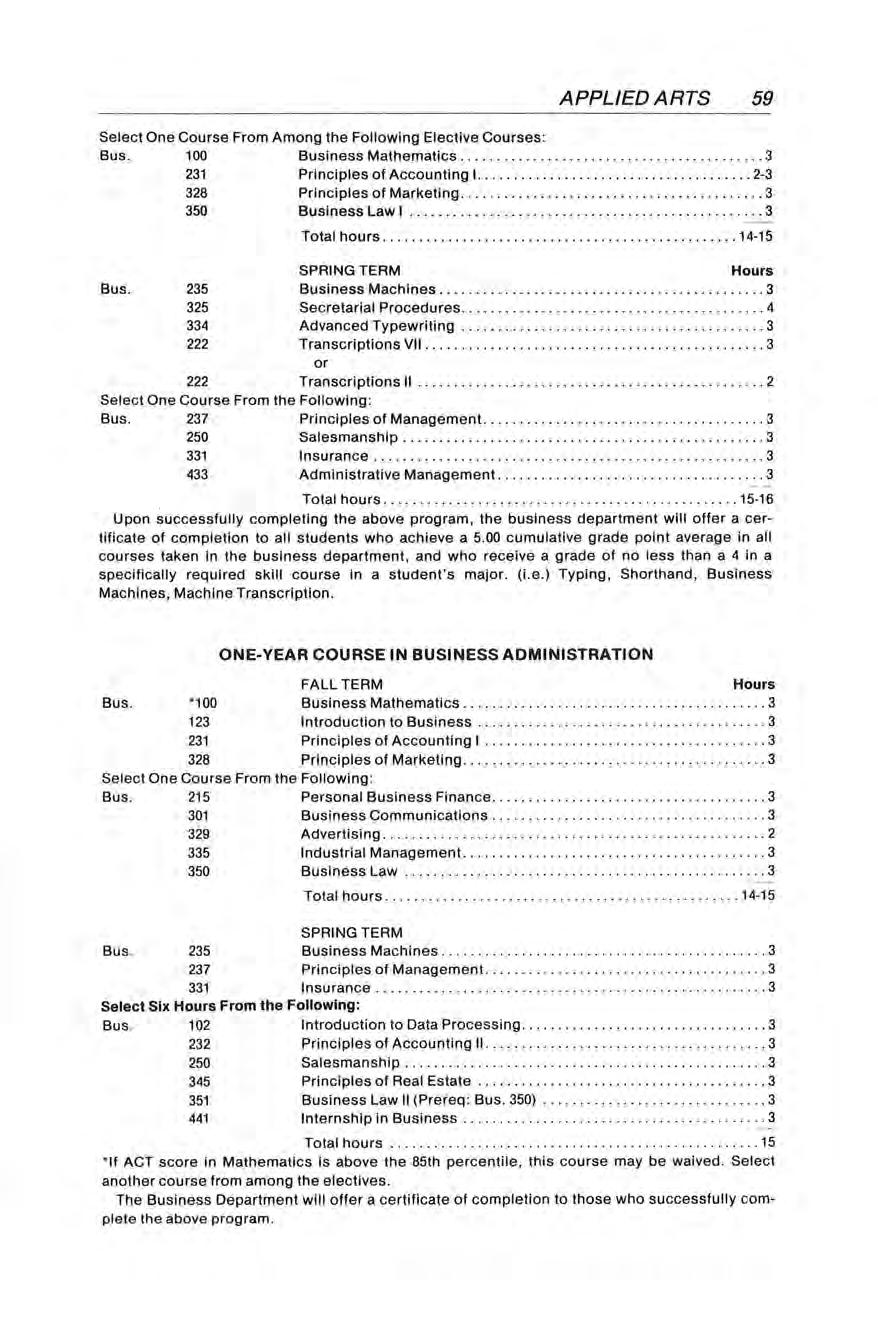
For those seeking approval in Vocational Office Occupation Education, the following is required in addition to the general degree requirements :
1. A comprehensive major of 45 semester hours .
2. Six hours of vocational courses:
a . Vocational Education 441 G
b Vocational Education 443G
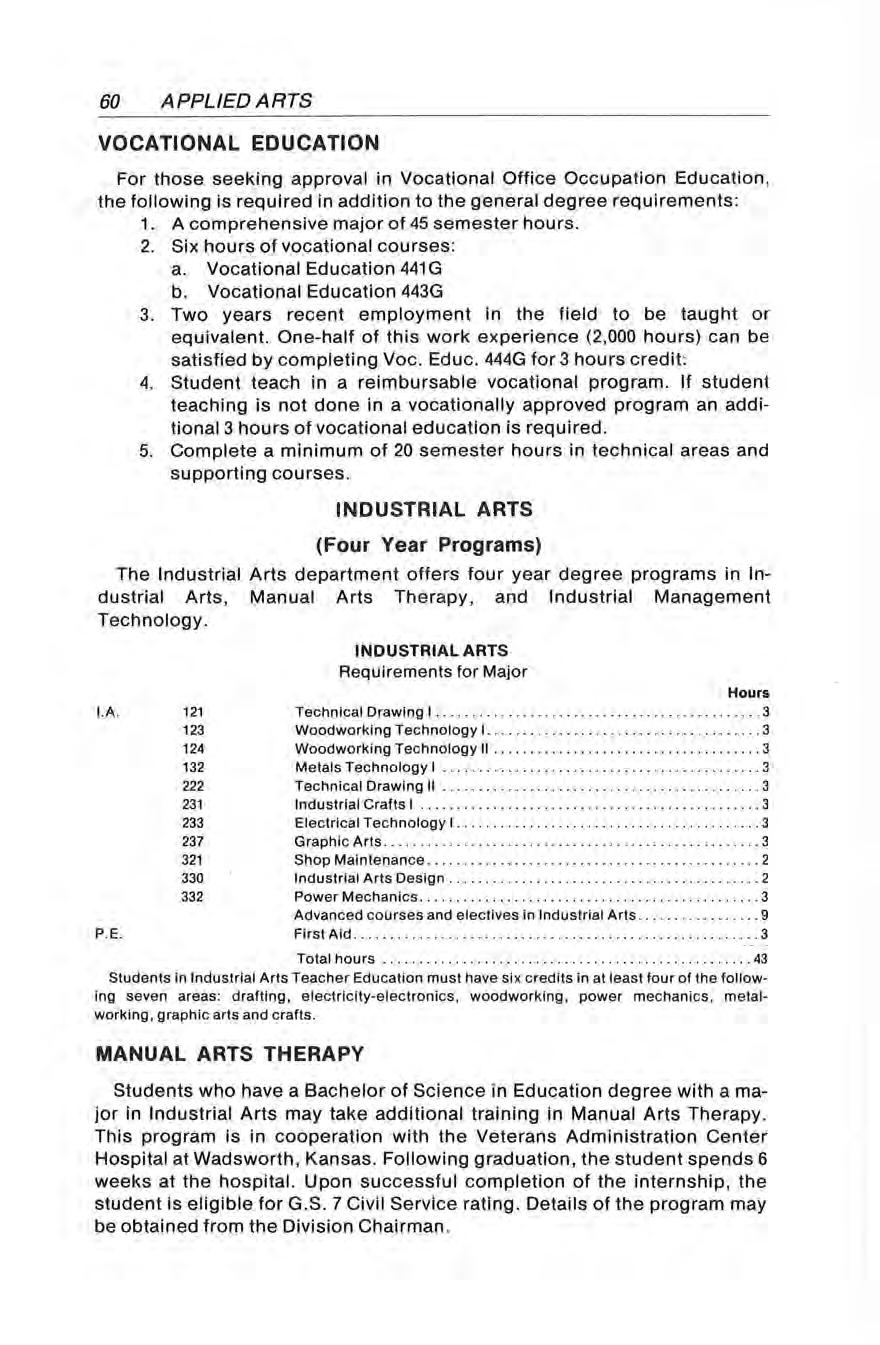
3. Two years recent employment in the field to be taught or equivalent. One-half of this work experience (2,000 hours) can be satisfied by completing Voe. Educ 444G for 3 hours credit :
4. Student teach in a reimbursable vocational program. If student teaching is not done in a vocationally approved program an additional 3 hours of vocational education is required.
5. Complete a minimum of 20 semester hours in technical areas and supporting courses.
The Industrial Arts department offers four year degree programs in Industrial
and Industrial Management Technology.
Students who have a Bachelor of Science in Education degree with a major in Industrial Arts may take additional training in Manual Arts Therapy. This program is in cooperation with the Veterans Administration Center Hospital at Wadsworth, Kansas. Following graduation, the student spends 6 weeks at the hospital. Upon successful completion of the internship, the student is eligible for G S. 7 Civil Service rating. Details of the program may be obtained from the Division Chairman.
Must hold a Nebraska driver "s license.
Must have a minimum driving record of two years and 20 ,000 miles (state and local) free from c hargeable accidents and moving traffic violations. A teaching certificate with a teaching major or endorsement, in addition to driver education is required INDUSTRIAL ARTS (Two Year Program)
The Industrial Arts department offers Associate in Arts degree programs in Construction Technology, Drafting Technology, Electrical Technology,
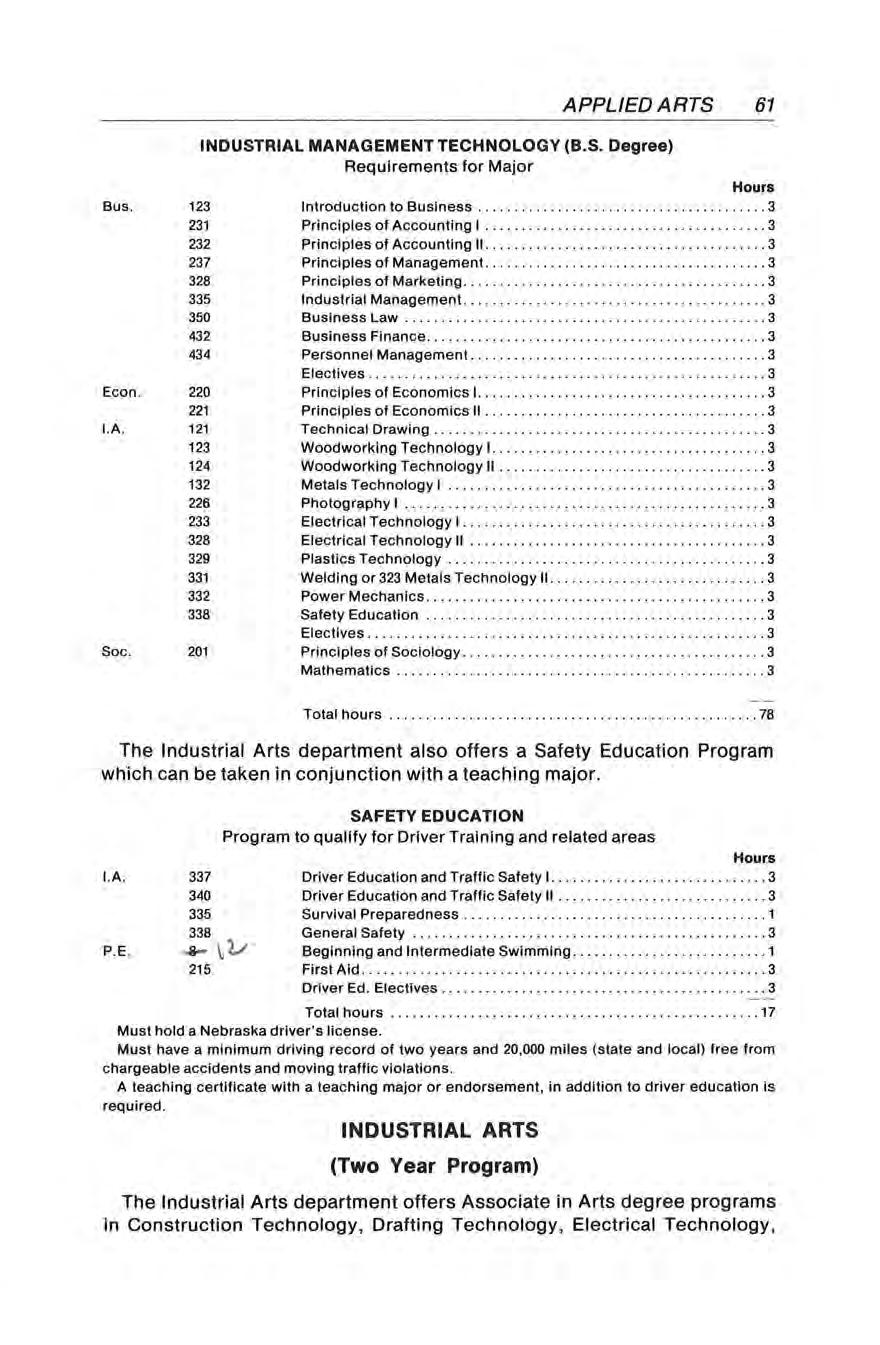
and Metals Technology. Students who complete the Associate of Arts degree may continue to study for the four year degree with a major in Industrial Arts.
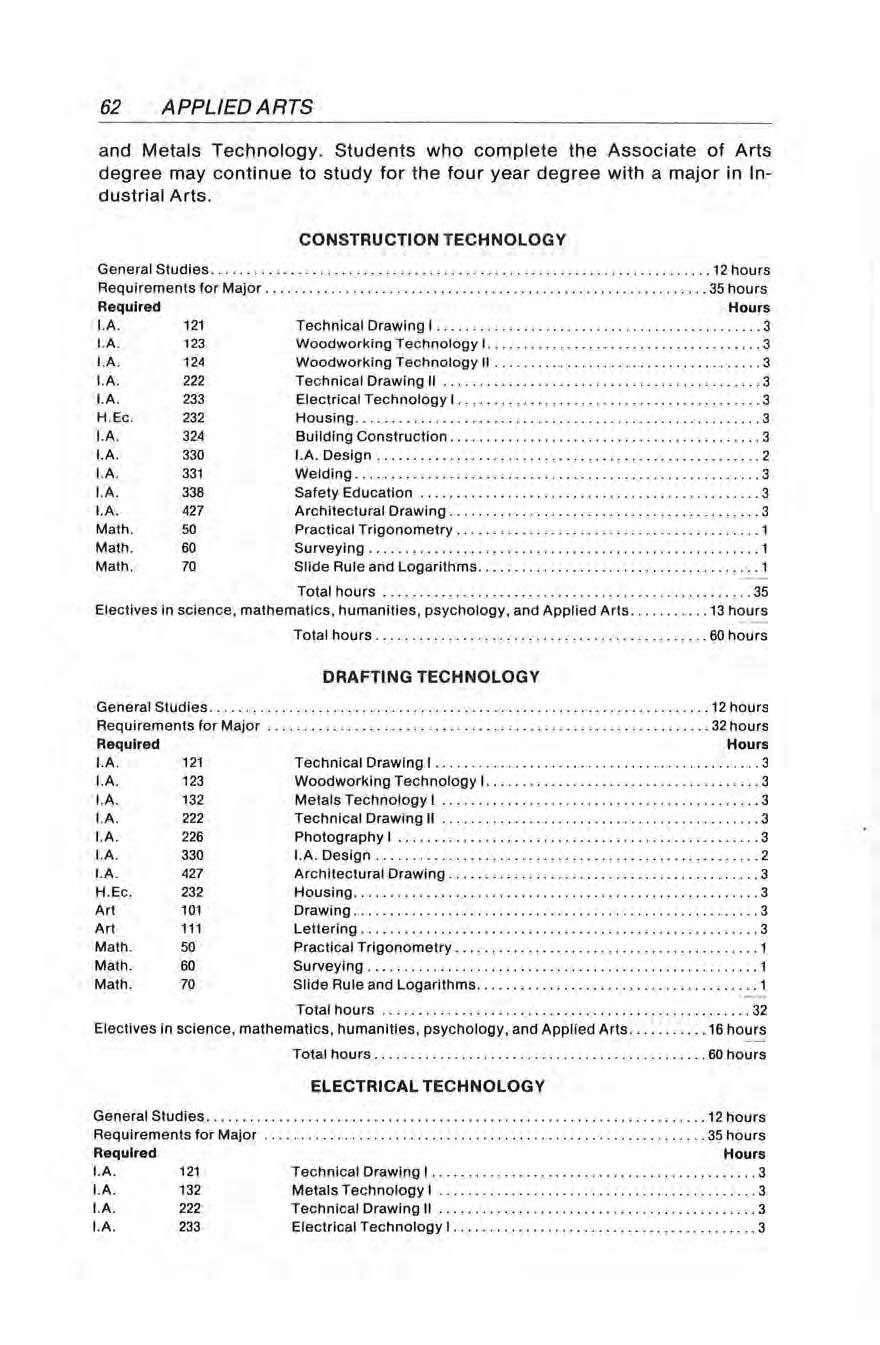
For those seeking approval in Vocational Trades and Industrial Education, the following is required in addition to the general degree program.
1. A comprehensive major of 45 semester hours
2 Six hours from the following Vocational Courses:
a Vocational Education 441G
b. Vocational Education 442G

c. Vocational Education 443G
3 Two years recent employment in the field to be taught or equivalent. One-half of this work experience (2 ,000 hours) can be satisfied by completing Voe. Educ . 444G for 3 hours credit.
4 Student teach in a reimbursable vocational program If student teaching is not done in a vocationally approved program an addi ~ tional 3 hours of vocational education is required
5 Complete a minimum of 15 semester hours of technical course work directly related to the area of specialization to be taught
This four year degree in home economics is offered for those students wishing to pursue a career in consumer-related aspects of horne economics and business .
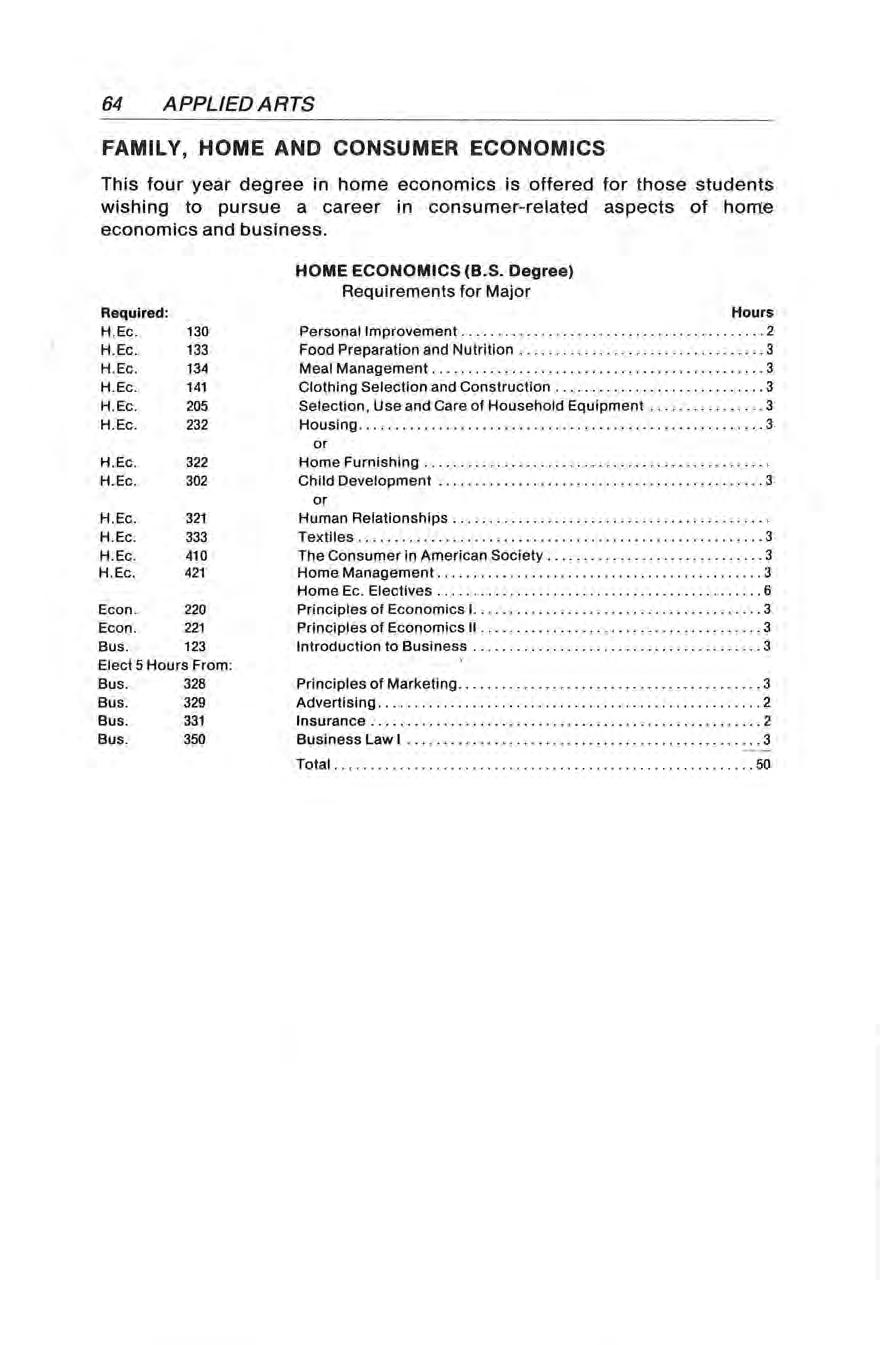
The Division of Education otters programs in Psychology and Teacher Education. The Division has as its primary responsibility the preparation of effective teachers. The focus, then, of the teacher education curriculum is upon the acquisition and development of effective instructional skills by each student in the program.
Each teacher should be able to demonstrate behaviors which will help the learner to:
1. Acquire the greatest possible understanding of himself and an appreciation of his worthiness as a member of society
2. Acquire understanding and appreciation of persons belonging to socio-economic groups different from his own.
3 Achieve the fullest development of his academic potential.
4. Acquire a positive attitude for developing knowledge through the learning process.
5. Acquire health habits and an understanding of the conditions necessary for the maintenance of physical and emotional wellbeing.
6. Acquire the habits and attitudes associated with responsible citizenship. •
7. Receive opportunity and encouragement to become competent in one or more fields of endeavor.
8. Understand and appreciate human achievement and the interdisciplinary nature of the natural sciences, the social sciences, the humanities and the arts.
9. Understand the opportunities tor preparing himself tor a productive . life and encourage him to participate in these opportunities .
10 .. Prepare tor a world of rapid change and unforeseeable demands in which continuing education becomes a part of his adult way of life.
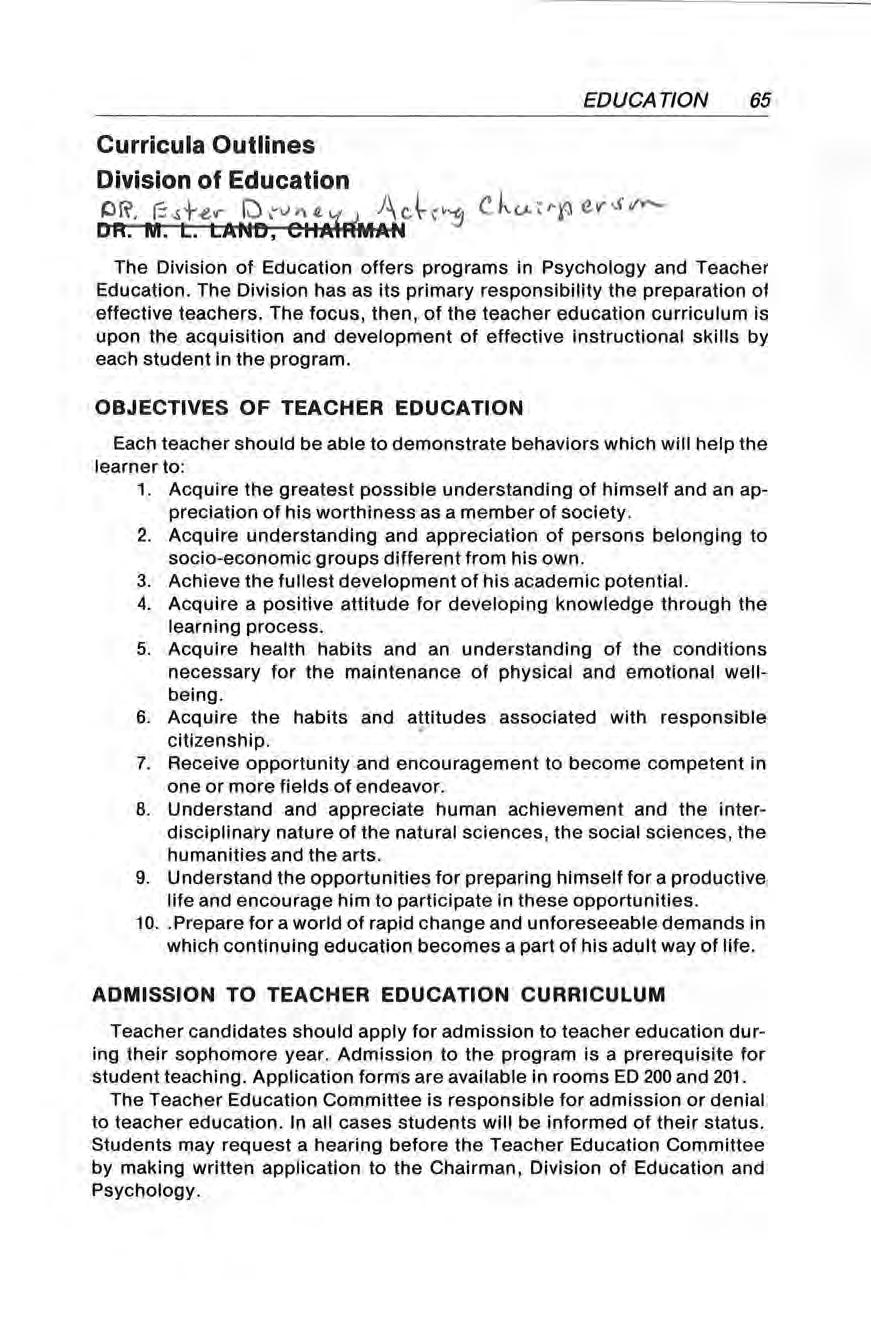
Teacher candidates should apply for admission to teacher education during their sophomore year. Admission to the program is a prerequisite tor student teaching. Applicatior:1 forms are available in rooms ED 200 and 201 .
The Teacher Education Com mittee is responsible tor admission or denial to teacher education. In all cases students will be informed of their status. Students may request a hearing before the Teacher Education Committee by making written application to the Chairman, Division of Education and Psychology.
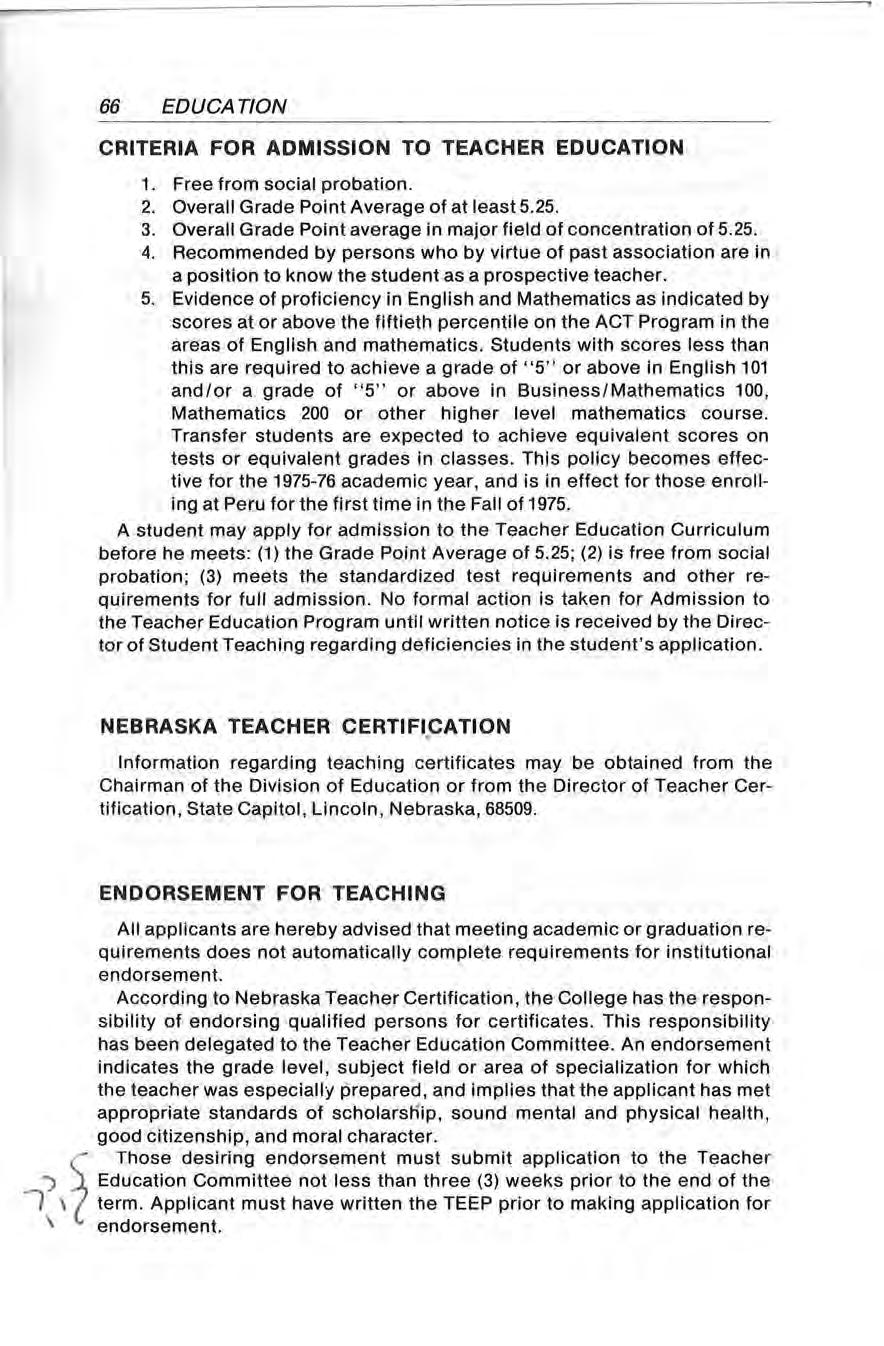
1. Free from social probation.
2. Overall Grade Point Average of at least 5.25
3. Overall Grade Point average in major field of concentration of 5 25.
4. Recommended by persons who by virtue of past association are in a position to know the student as a prospective teacher.
5. Evidence of proficiency in English and Mathematics as indicated by scores at or above the fiftieth percentile on the ACT Program in the areas of English and mathematics. Students with scores less than this are required to achieve a grade of "5" or above in English 101 and/or a grade of " 5 " or above in Business/Mathematics 100 , Mathematics 200 or other higher level mathematics course . Transfer students are expected to achieve equivalent scores on tests or equivalent grades in classes. This policy becomes effective for the 1975- 76 academic year, and is in effect for those enrolling at Peru for the first time in the Fall of 1975
A student may apply for admission to the Teacher Education Curriculum before he meets: (1) the Grade Point Average of 5.25; (2) is free from social probation; (3) meets the standardized test requirements and other requirements for full admission No formal action is taken for Admission to the Teacher Education Program until written notice is received by the Director of Student Teaching regarding deficiencies in the student ' s application.
Information regarding teaching certificates may be obtained from the Chairman of the Division of Education or from the Director of Teacher Certification , State Capitol, Lincoln , Nebraska , 68509.
All applicants are hereby advised that meeting academic or graduation requirements does not automatically complete requirements for institutional endorsement.
, Those desiring endorsement must submit application to the Teacher
":) Education Committee not less than three (3) weeks prior to the end of the
According to Nebraska Teacher Certification, the College has the responsibility of endorsing qualified persons for certificates. This responsibility has been delegated to the Teacher Education Committee. An endorsement indicates the grade level, subject field or area of specialization for which the teacher was especially prepared, and implies that the applicant has met appropriate standards of scholarstiip, sound mental and physical health , good citizenship, and moral character. ~
term Applicant must have written the TEEP prior to making application for \ endorsement.
Candidates must submit application for the Professional Semester before the end of the junior year.
To be eligible for assignment to student teaching, the student must meet the following requirements.
1. The student must have been accepted to the teacher education curriculum.
2. The student must maintain all minimum criteria for admission to teacher education as a prerequisite to the professional semester.
3. The student must present evidence that he will have sufficient credits for the degree, one calendar year from the date of entry into the Professional semester.
4. The student must have completed the following:
Elementary Secondary
Psych 121 Gen Psych Psych 121 Gen Psych
Educ 201 Fund of Teaching Educ 201 Fund of Teaching
Educ 300 Models of Teaching Educ 400 Classroom Mang.
Educ 400 Classroom Manag 6 hours of electives
Educ 401 Diagnosis and Assess. Special Methods
Educ 409 Synthesis of Teaching Competencies
5. Each application for the professional semester must be approved by:
(1) Member of the Teacher Education Committee
(2) Division Chairman for each major
(3) Chairman, Division of Education and Psychology
(4) Director of Student Teaching
The Division of Education is responsible for offering the required professional education courses, exclusive of Special Methods, for all elementary and secondary majors. For additional information, see Teacher Education
Educ 405
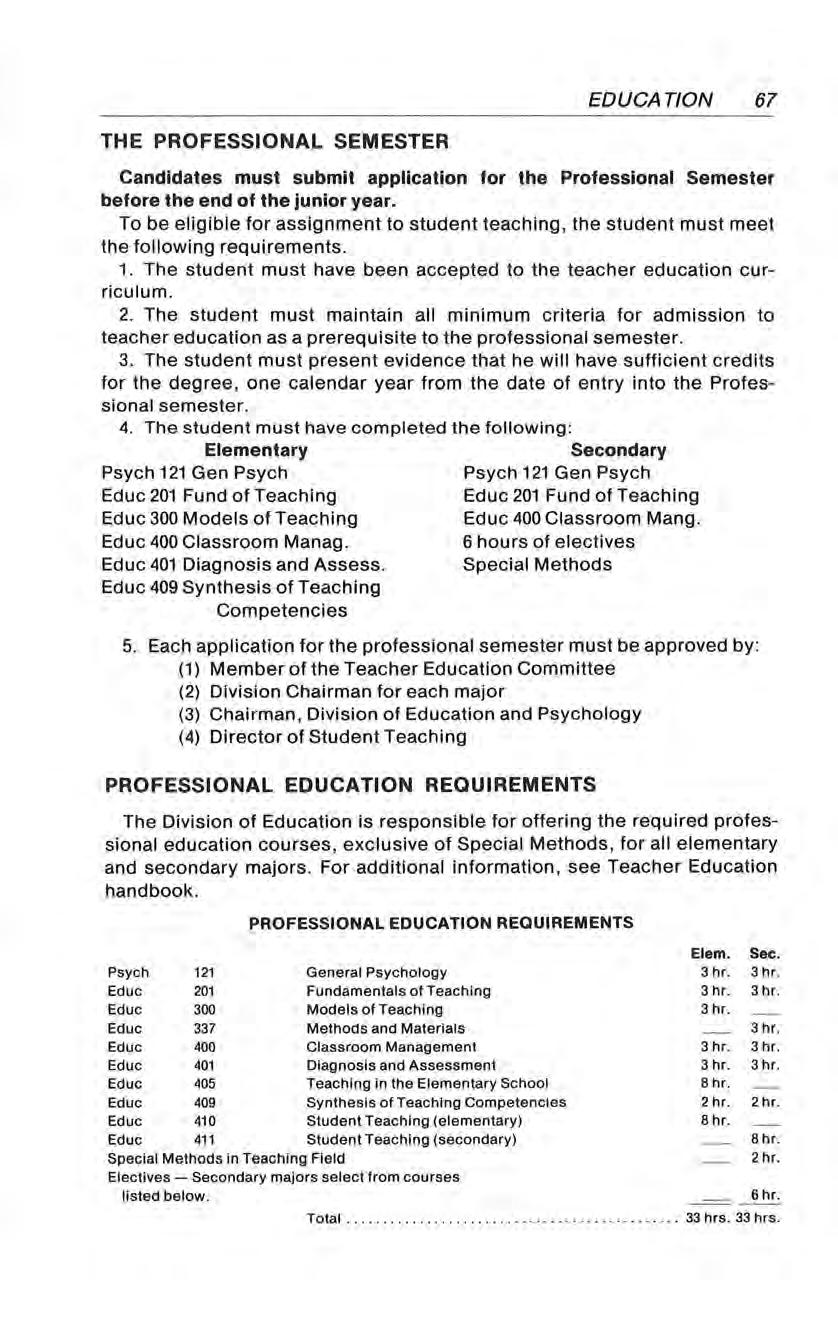
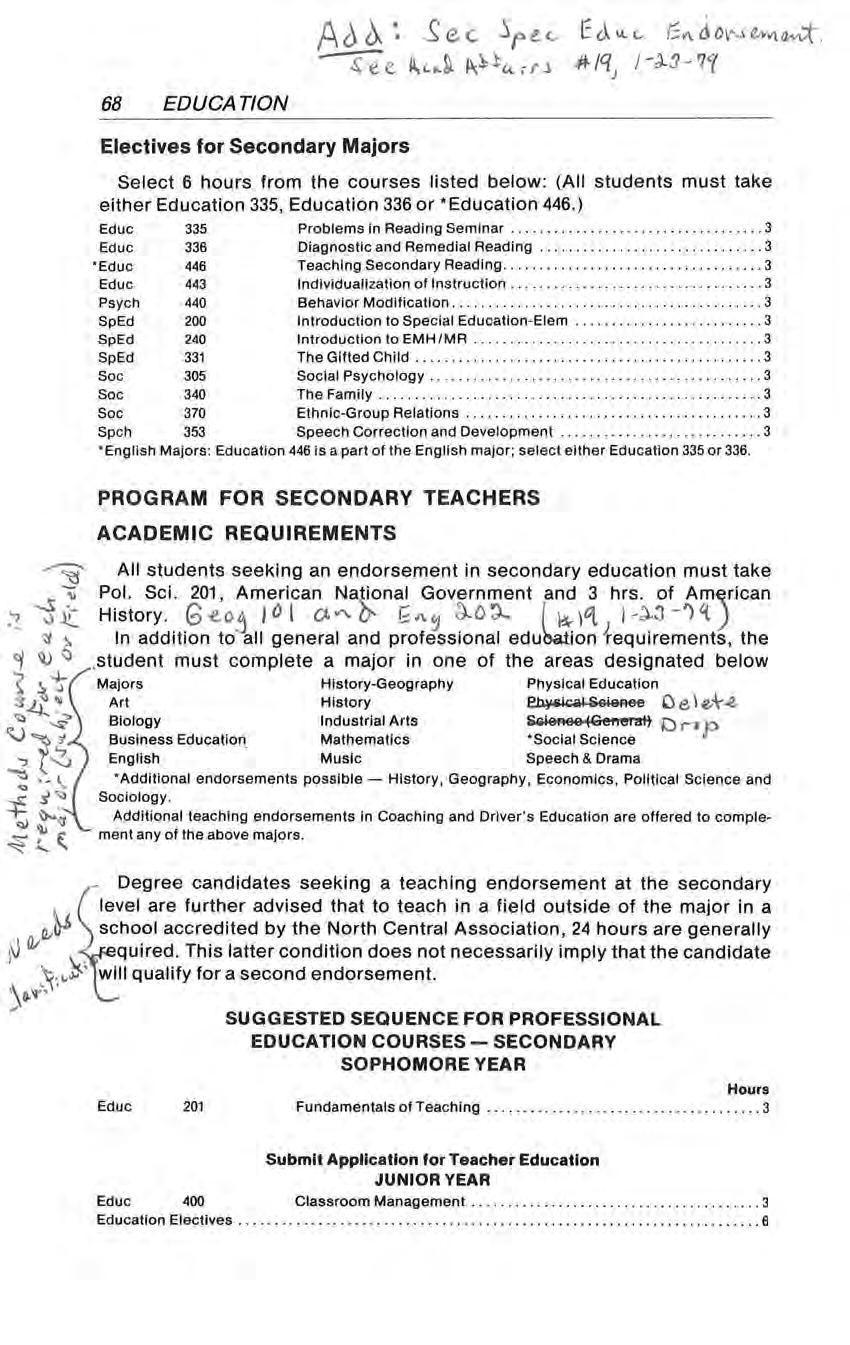
All students seeking an endorsement in secondary education must take Pol.
JOI ().11"\.(J'
In addition to all general and professional edu~ion tequirements, the ,student must complete a major in one of the areas designated below
Additional teaching endorsements in Coaching and Driver ' s Education are offered to complement any of the above majors.
Degree candidates seeking a teaching endorsement at the secondary vel are further advised that to teach in a field outside of the major in a a,~ hoof accredited by the North Central Association, 24 hours are generally
quired This latter condition does not necessarily imply that the candidate
II qualify for a second endorsement.
(Four Year Programs)
The Department of Education offers four year degree programs in Elementary Education, Elementary Education with an endorsement in Early Childhood Education, Elementary Education with an endorsement in Special Education, and a Psychology-Sociology B.S. degree program.
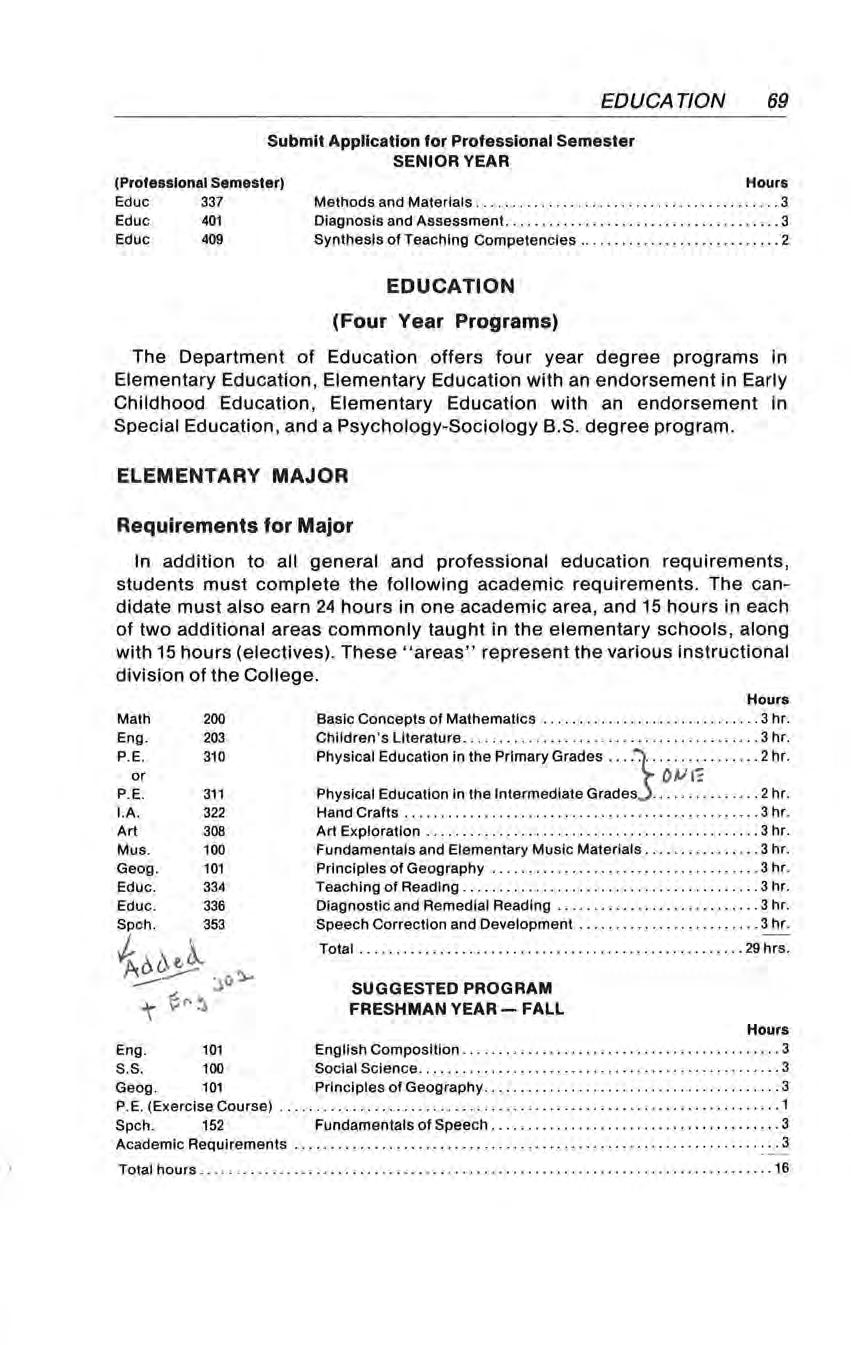
In addition to all general and professional education requirements, students must complete the following academic requirements The candidate must also earn 24 hours in one academic area, and 15 hours in each of two additional areas commonly taught in the elementary schools , along with 15 hours (electives). These "areas" represent the various instructional division of the College
PROGRAM
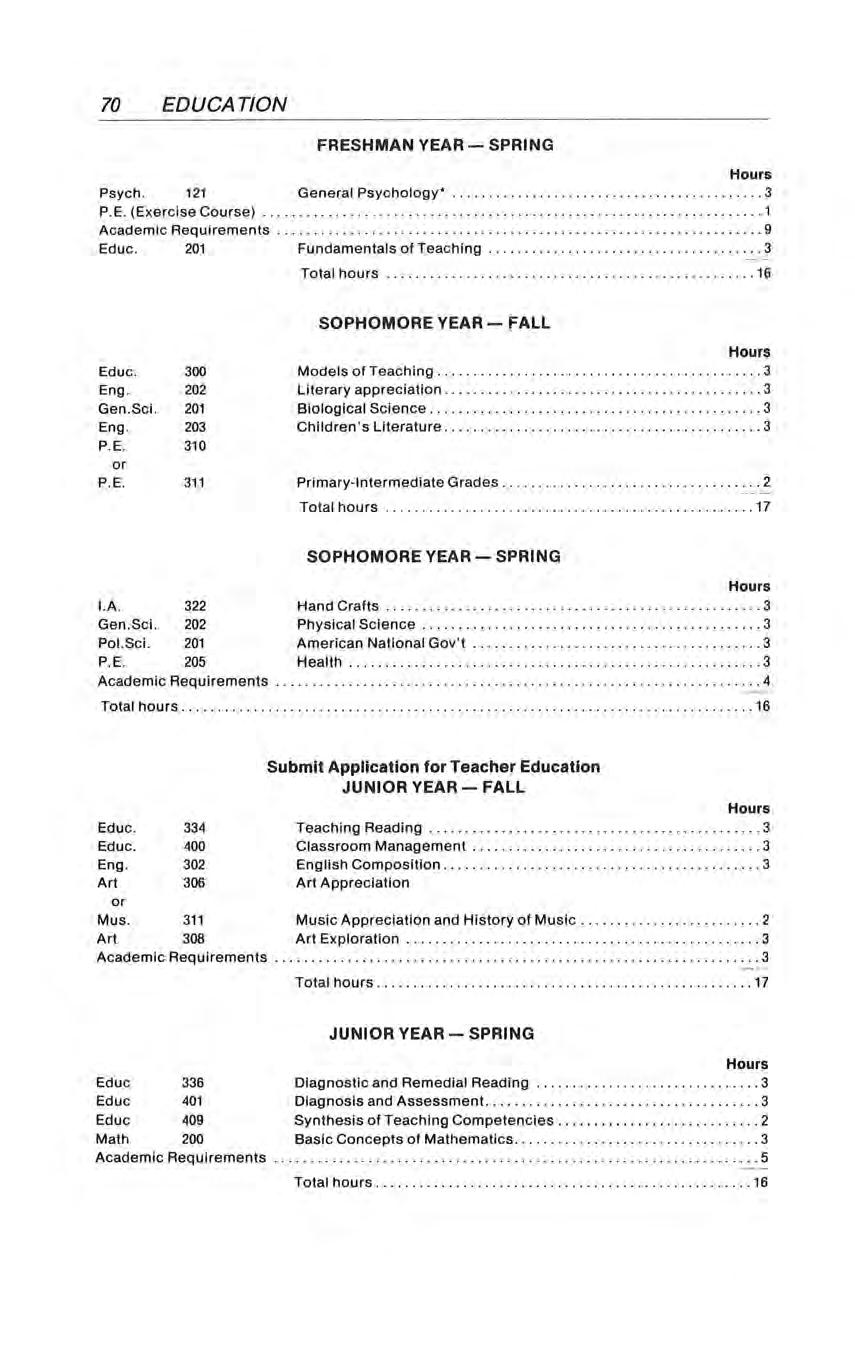
The curriculum leading directly to a Bachelor of Science in Education degree for elementary majors with an endorsement in early childhood education is designed for those who wish to prepare for teaching in day care , preschool or kindergarten programs. The Curriculum follows the program for elementary teachers (which meets the academic requirements for elementary teaching certification) and requires the following sequence of courses which may be used in lieu of the 24 hour block ordinarily required in

The curriculum leading to a Bachelor of Science in Educa t ion degree for elementary education majors with an endorsement in special education is designed for those who (1) wish to prepare for teaching the educable or trainable mentally handicapped; and , (2) wish to prepare as a resource and itinerant teacher The Curriculum follows the program for elementary teachers (which meets the academic requirements for elementary teaching certification) and requires the following sequence of courses which may be used in lieu of the 24 hour-block ordinarily required in elementary education


(Two Year Program)
The Department of Education offers an Associate of Arts degree program in Early Childhood Education. The curriculum is designed to prepare paraprofessionals for positions in early childhood education.
All courses carry full credit toward the Bachelor of Science degree and may be applied to a regular four-year program. Students are encouraged to ultimately pursue the baccalaureate degree.
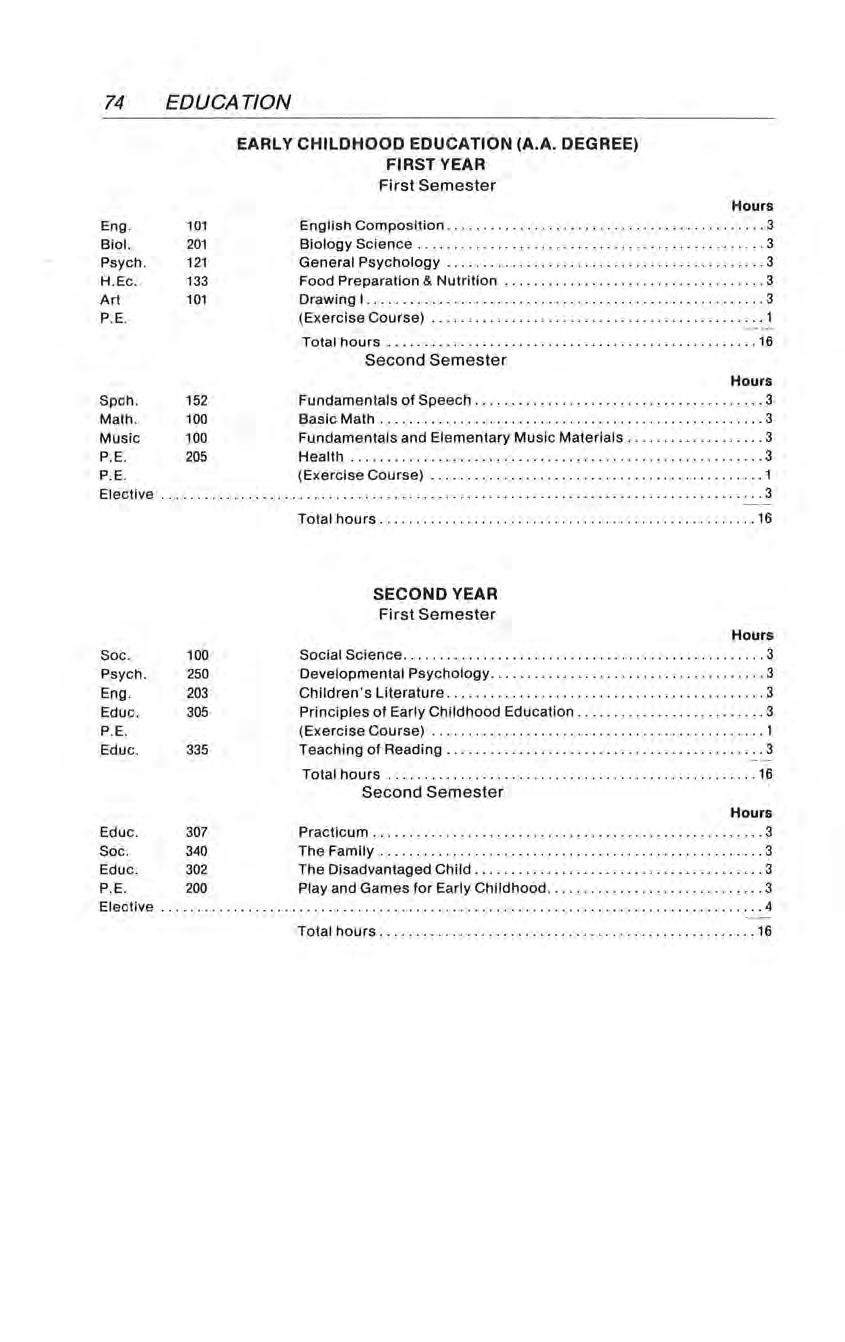
The Division of Humanities offers programs in Language Arts , English, Geography, History, Journalism, Mass Communications, Social Science, Social Work, and Speech and Drama. Each discipline is structured and designed to provide background for a variety of professional careers All programs offer the students the opportunity for enrichment and breadth of understanding.
The Department of Language Arts offers four year degree programs in teacher education in Language Arts, English and Speech and Drama. Four year non-teaching degree programs are offered in Journalism and Mass
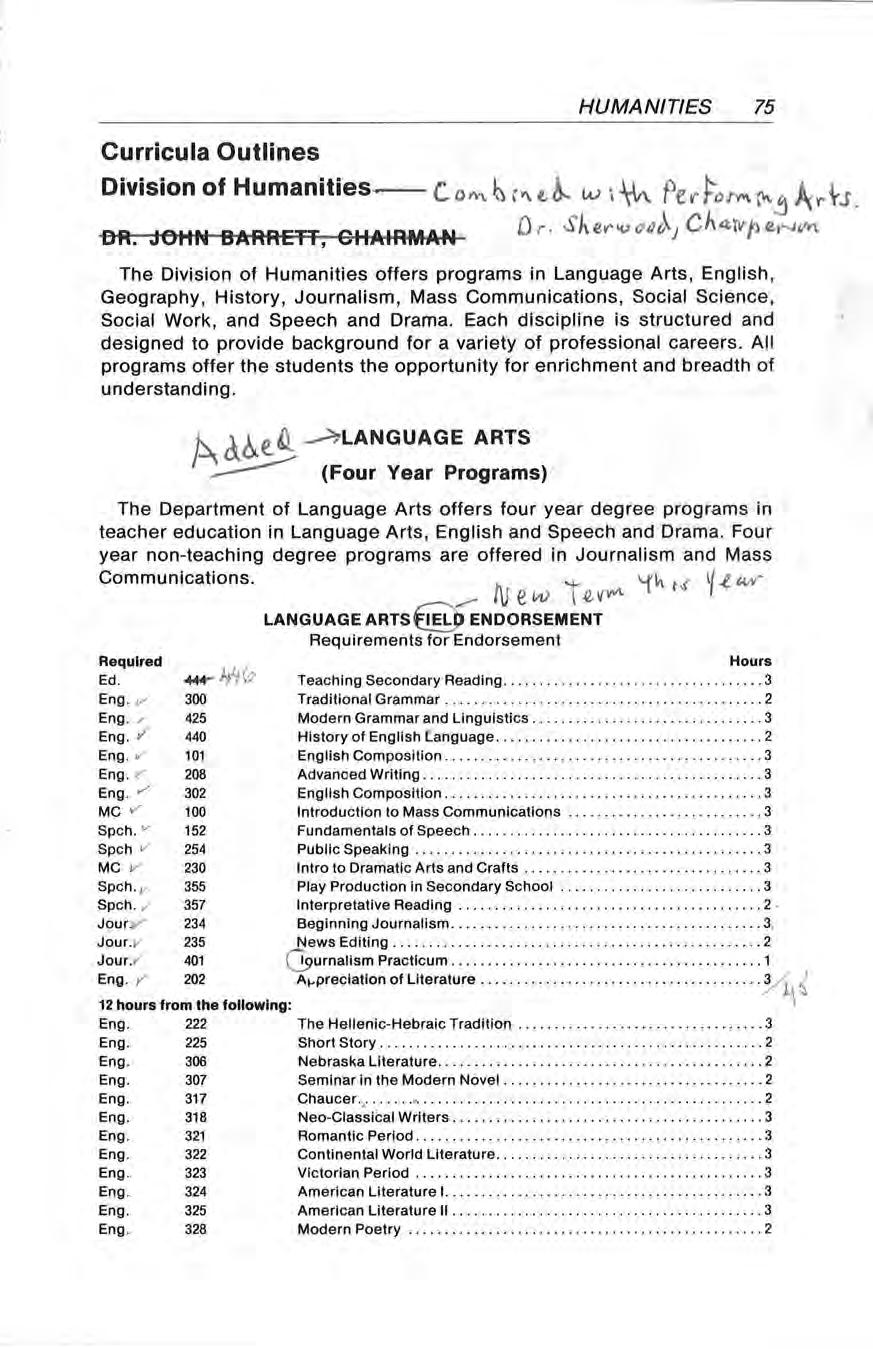
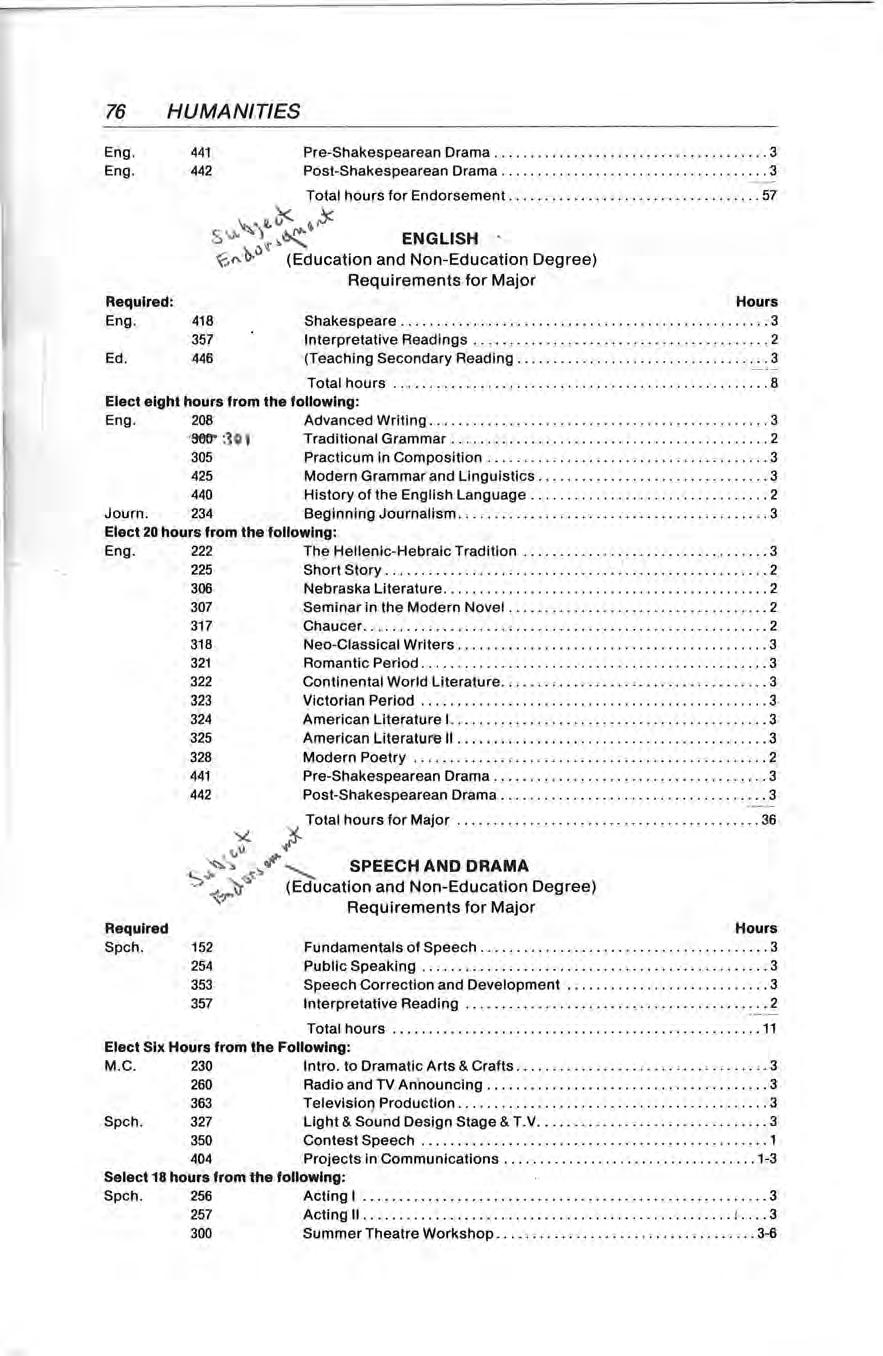
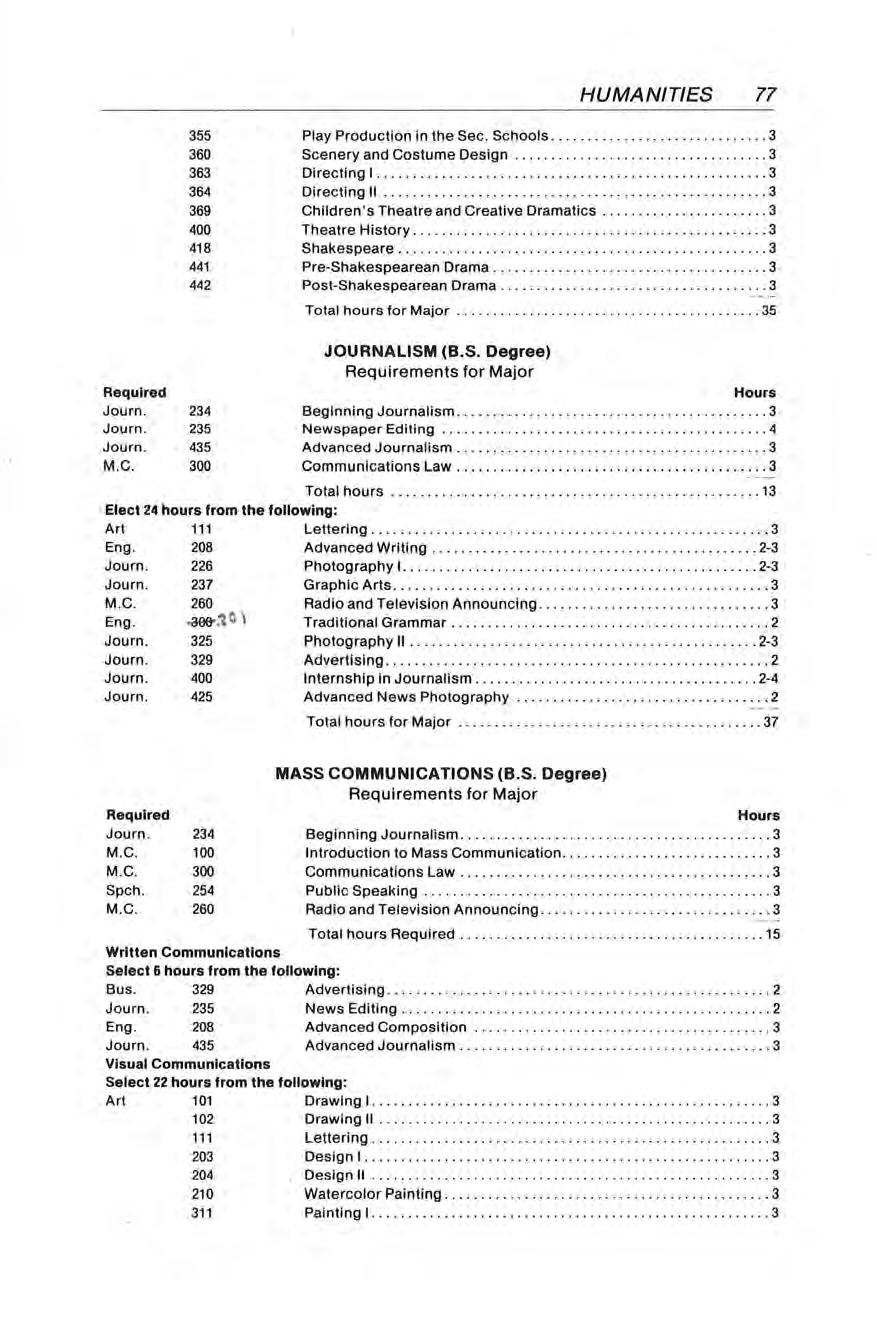
The Social Science department offers four year degree programs in teacher education in History, History-Geography, and Social Sciences.
degree programs are offered
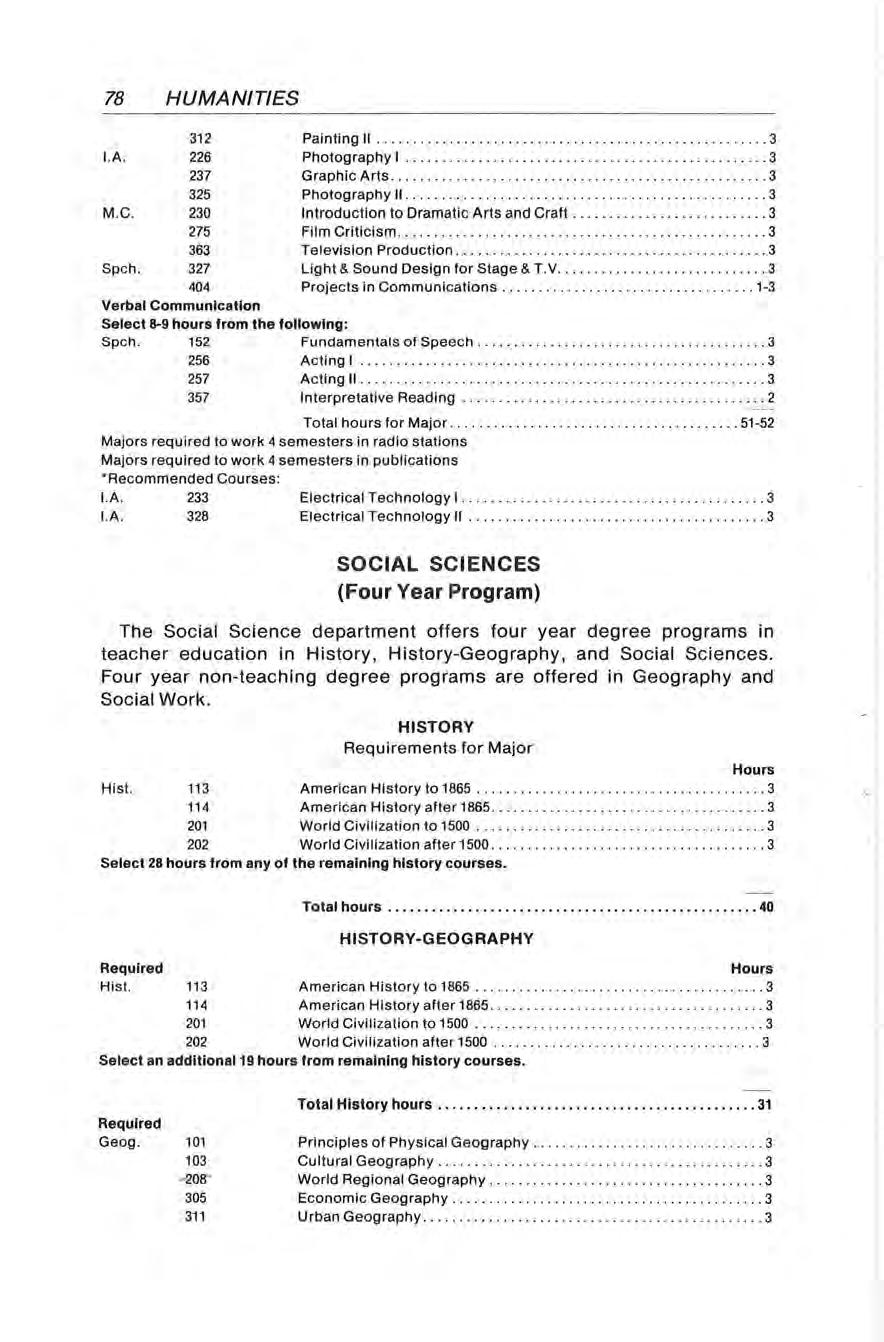
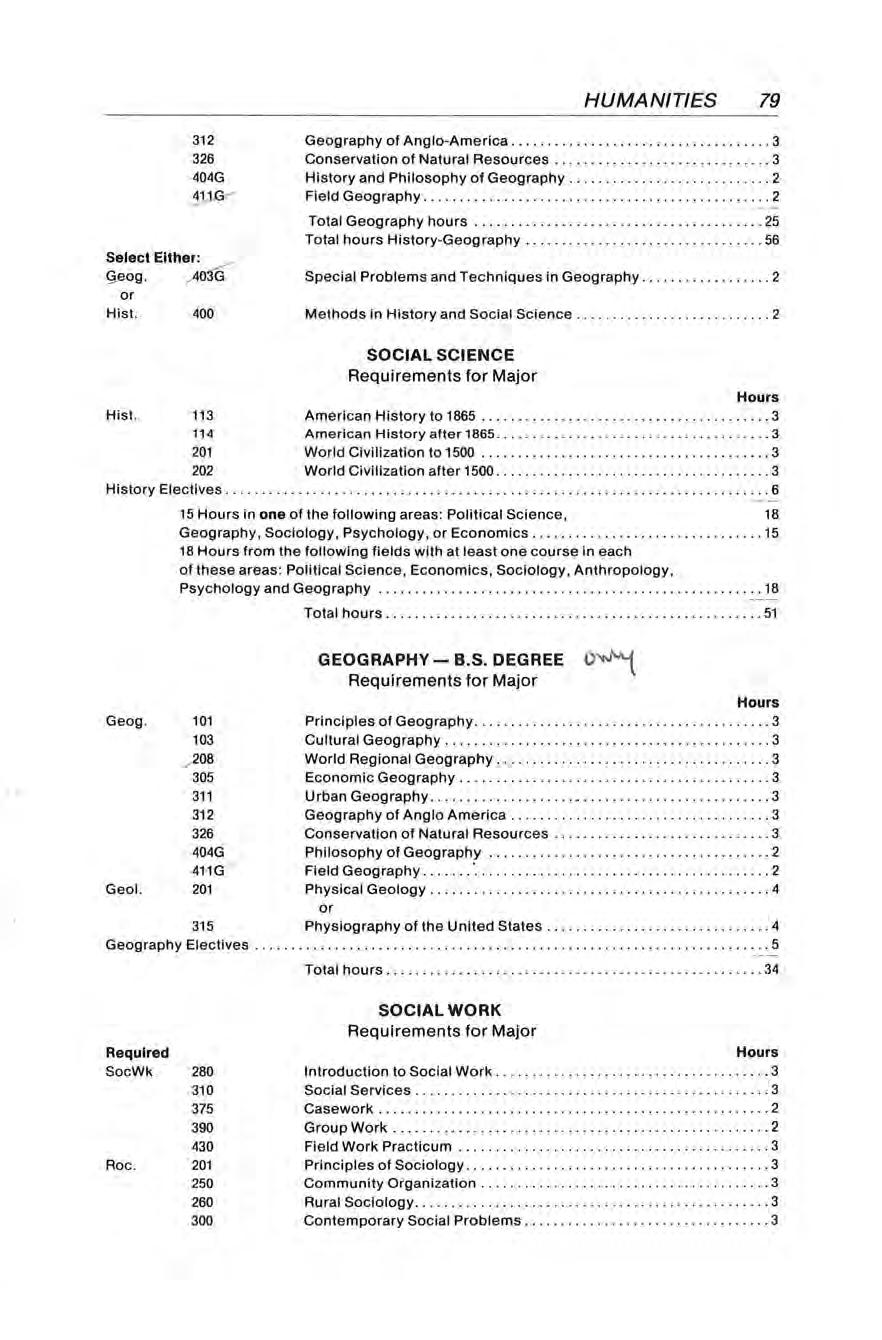
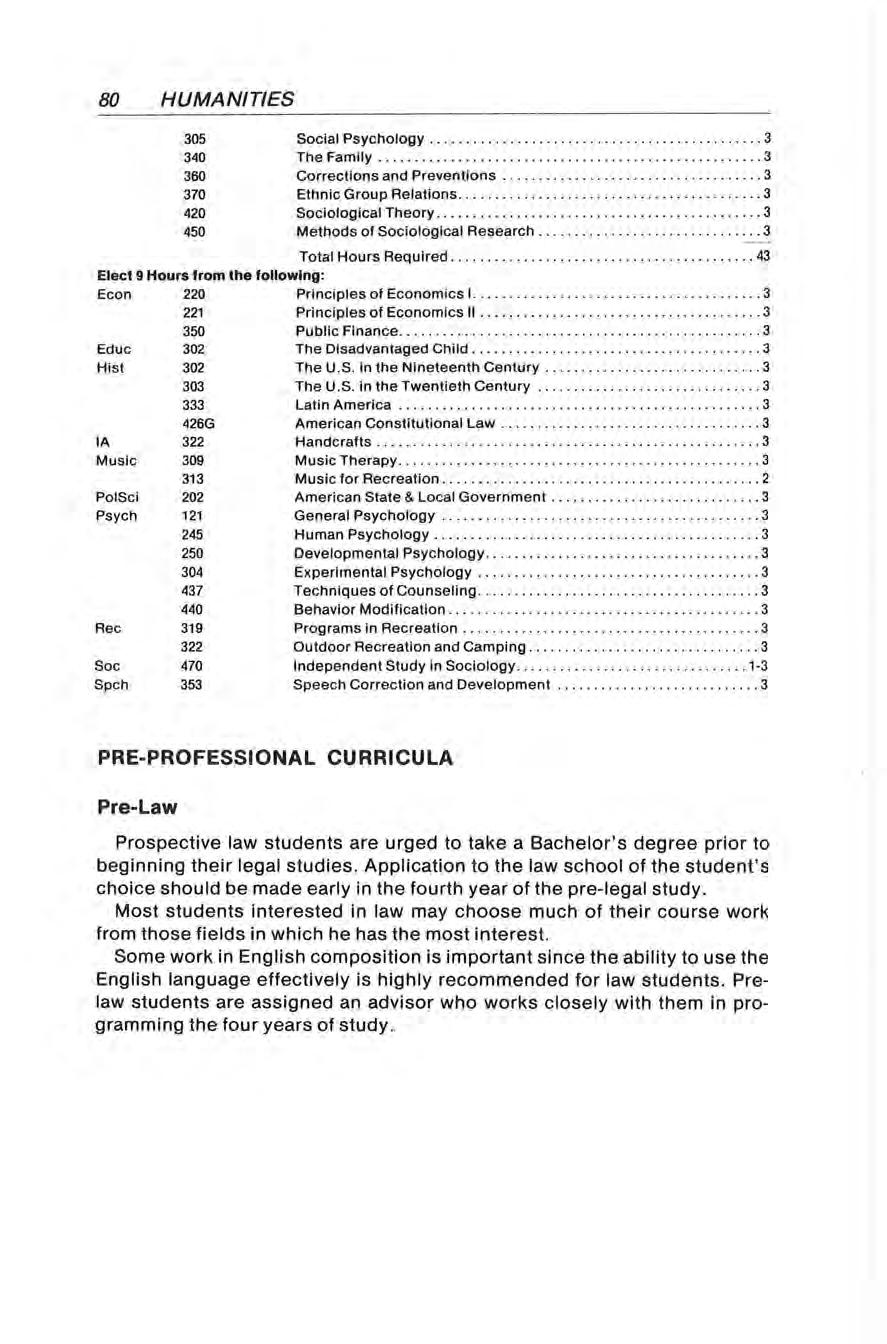
Prospective law students are urged to take a Bachelor's degree prior to beginning their legal studies Application to the law school of the student's choice should be made early in the fourth year of the pre-legal study.
Most students interested in law may choose much of their course work from those fields in which he has the most interest
Some work in English composition is important since the ability to use the English language effectively is highly recommended for law students. Prelaw students are assigned an advisor who works closely with them in programming the four years of study.
The Division of Natural Science offers course work in Biological Science, Chemistry, General Science, Geology, Mathematics, and Physics. Programs in these areas are designed to provide an adequate background for teaching at the secondary level, provide a background for graduate study , and provide for individual enrichment. A wide variety of pre-professional programs are offered for students needing preliminary instruction prior to entry in a professional school.
The Natural Sciences Division offers B.A . and B.S, degrees in Biological Science , Mathematics, and Natural Science. Teacher Education programs for endorsement in Biology, Mathematics, and Natural Science are also available. The subject endorsement in Biology does not satisfy the requirements for a major unless a second subject endorsement is obtained.

Those who have taken mathematics courses equivalent to Math 105 and 106 may begin the math major with Math 309. In such cases 30 hour s@needed for the major. Consent of Division Chairman required.


The following program is suggested for pre-agriculture students:
Below is a suggested outline for both programs. The student is advised to secure a catalog from the professional school he expects to attend, as individual schools vary in requirements for pre-dental
The requirements for different forestry schools vary. Early in the pre-forestry program the student should cons ult the catalo g of the co llege he plans to attend later. Grades of below average will probably not transfer The plan below is suggested outline :
The following program is suggested as prerequisite for entering a co ll ege of mortuary science:
Some colleges of nursing require two years (60 semester hours) of pre-nursing , others require less Students following a pre-nursing curriculum should know the requirements of the particular school of nursing to which they will transfer.
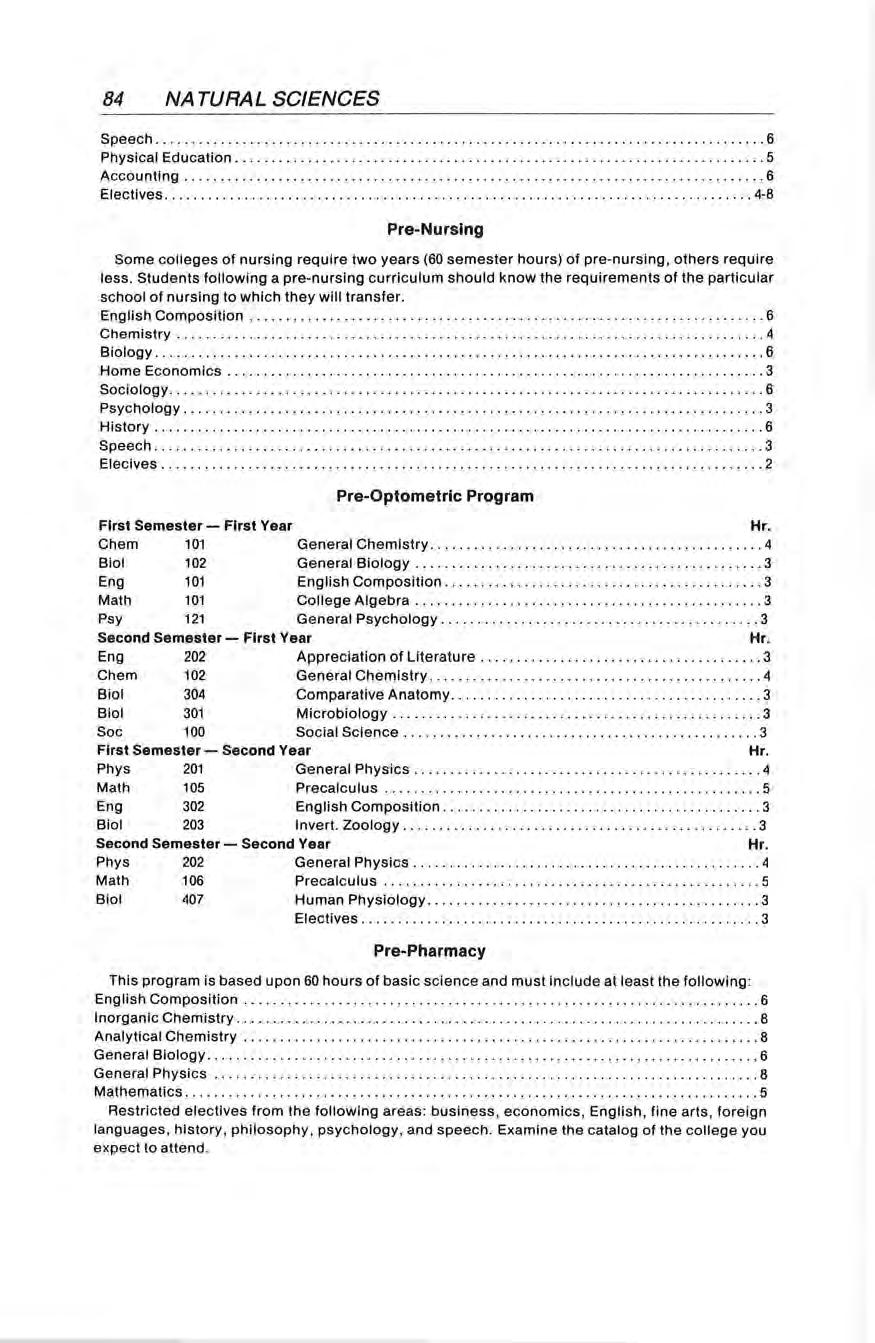
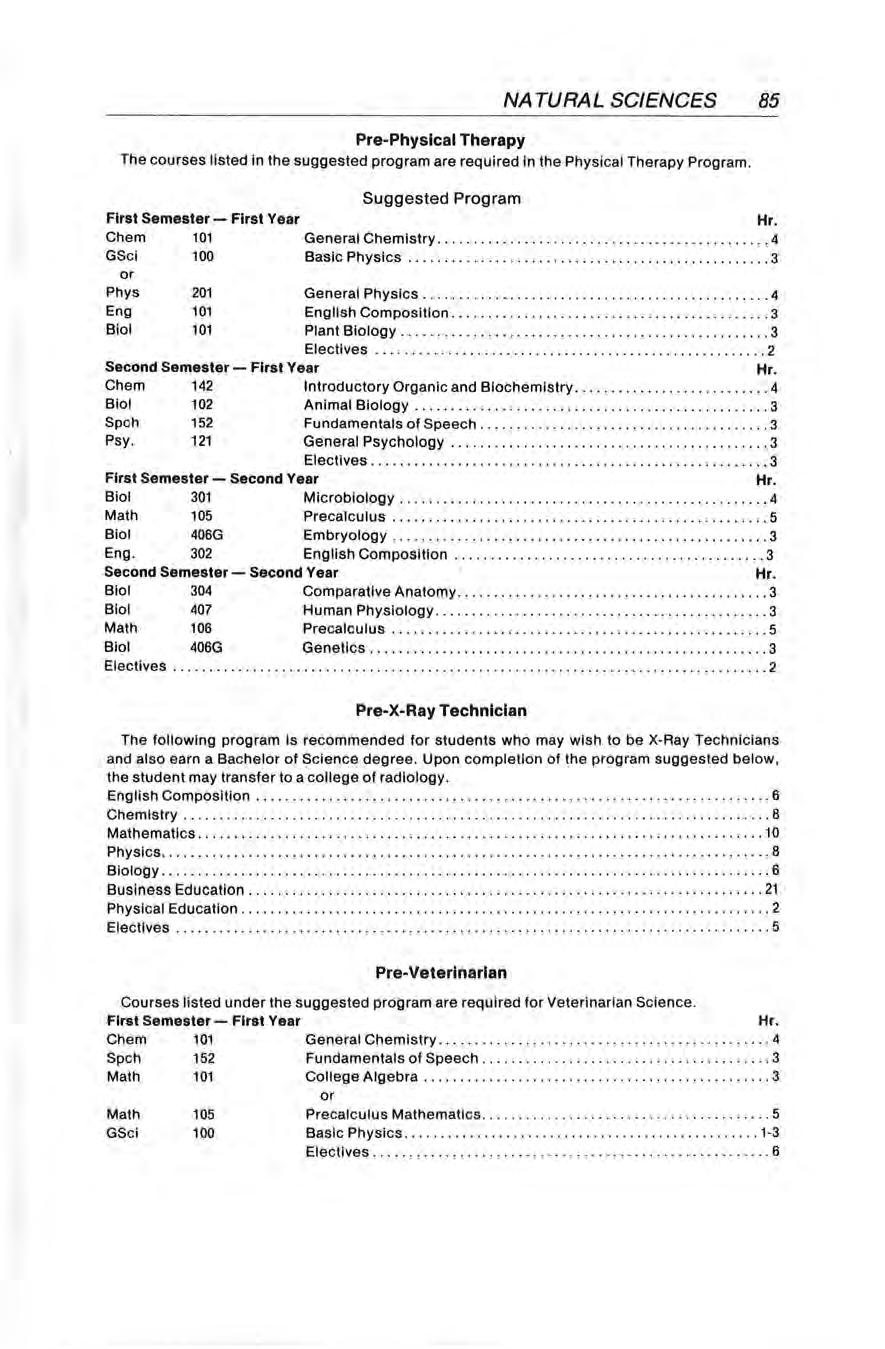
The courses listed in the suggested program are required in the Physical Therapy Program
The fo llowi ng program is recommended for students who may wish to be X-Ray Techni c ians and also earn a Bachelor of Sdence degree Upon comp letion of the program suggested below, the
to a co lleg e of radiology.
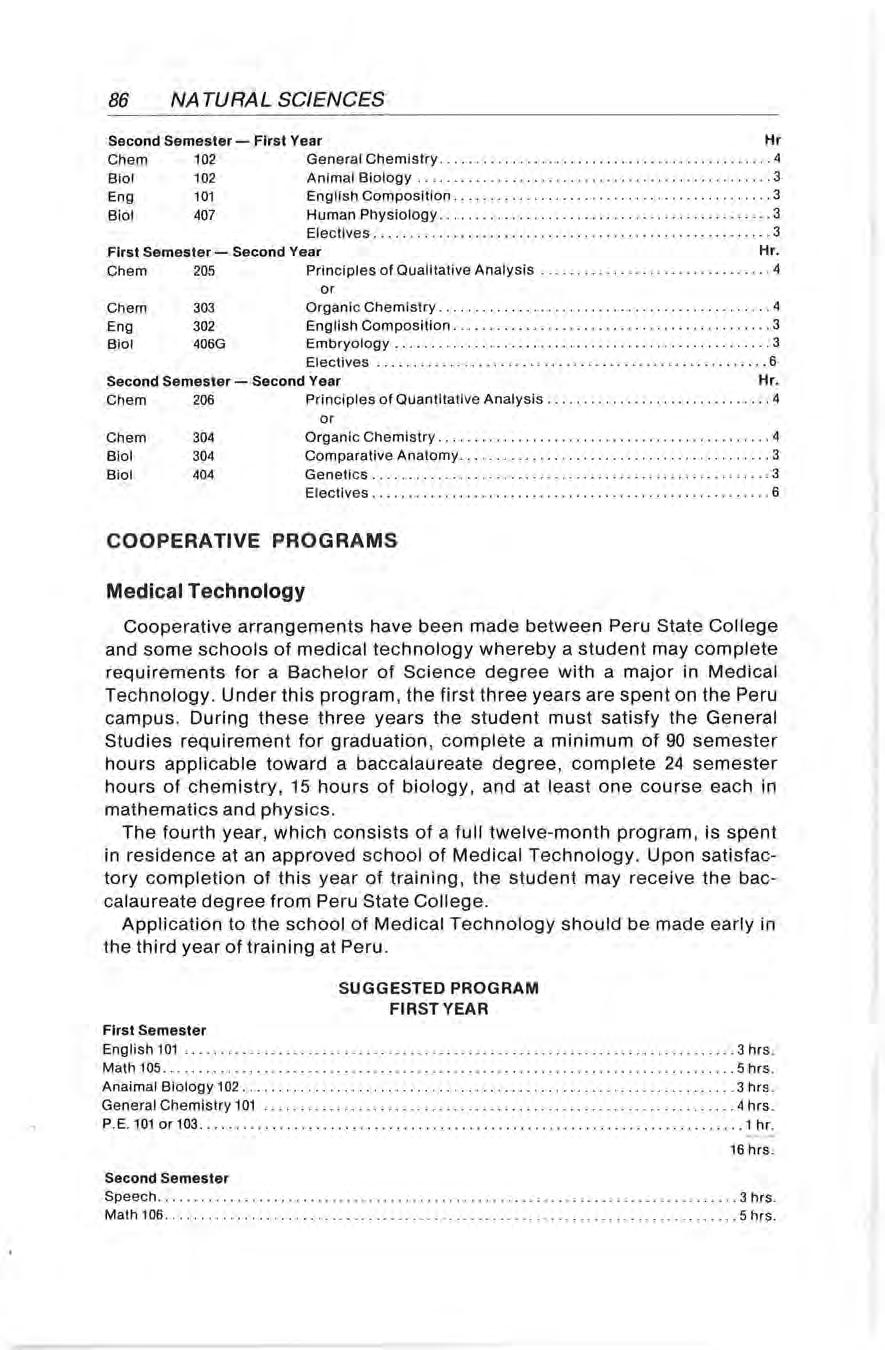
Cooperative arrangements have been made between Peru State College and some schools of medical technology whereby a student may complete requirements for a Bachelor of Science degree with a major in Medical Technology Under this program, the first three years are spent on the Peru campus. During these three years the student must satisfy the General Studies requirement for graduation, complete a minimum of 90 semester hours applicable toward a baccalaureate degree, complete 24 semester hours of chemistry, 15 hours of biology , and at least one course each in mathematics and physics
The fourth year, which consists of a full twelve-month program, is spent in residence at an approved school of Medical Technology Upon satisfactory completion of this year of training , the student may receive the baccalaureate degree from Peru State College
Application to the school of Medical Technology should be made early in the third year of training at Peru
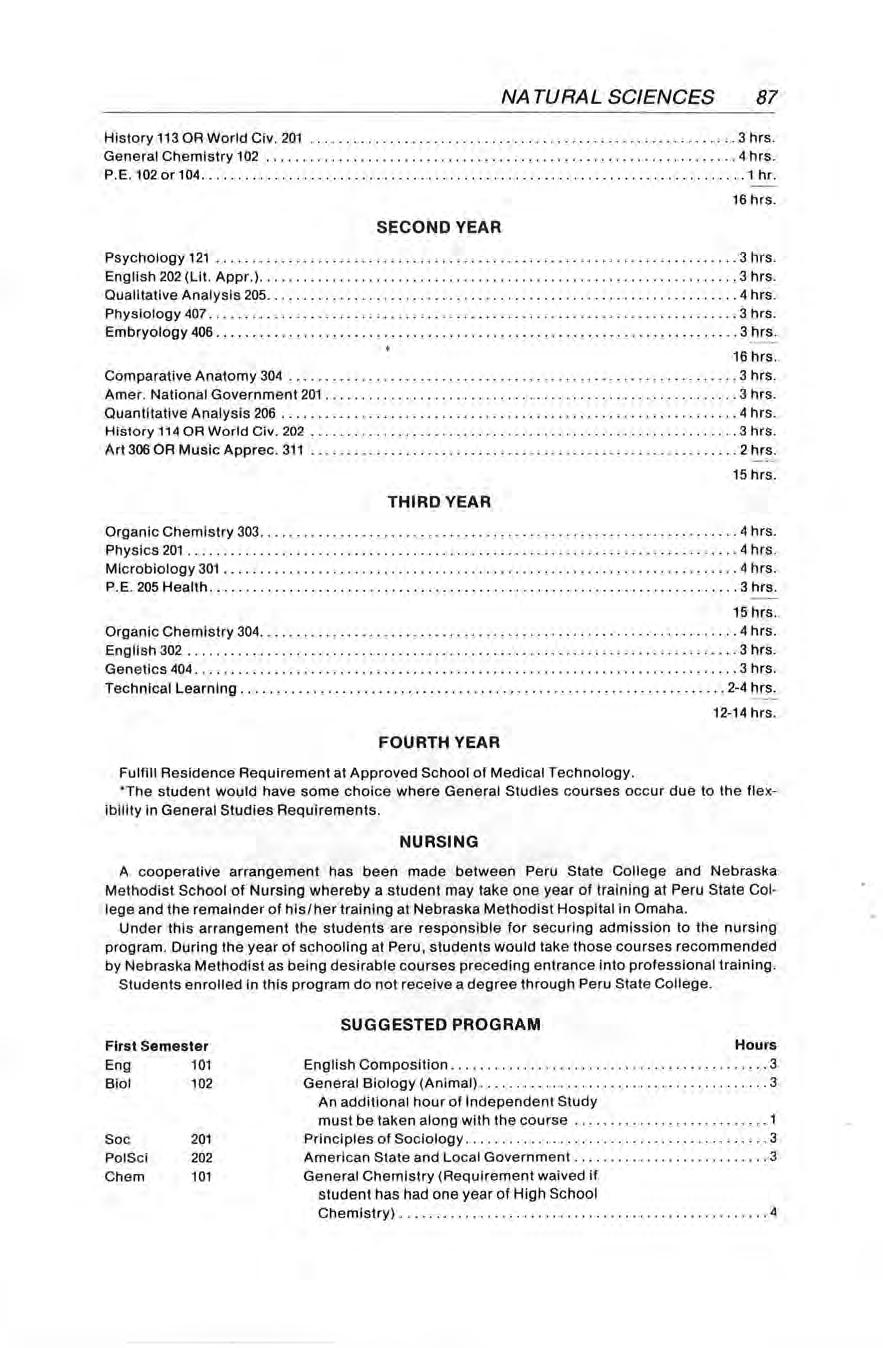
Fulfill Residence Requirement at Approved School of Medical Tech nol ogy
•The student would have some choice where General Studi e s courses oc c ur due to th e fle xibility in General Studies Requirements.
A c ooperative ar r angeme nt ha s been made between Peru State Coll e ge and N e braska Methodist School of Nursing whereby a student may take one year of training at Peru Stat e Coll ege and the remainder of his/her training at Nebraska Methodist Hospital in Omaha.
Und er this arrangement the stude nts are responsible for securing admission to the nursing program. During the year of schooling at Peru, students would take those courses recommended by Nebraska Methodist as being desirable courses pr e ceding entrance into professional training
Students e n rol l ed in this program do not recei ve a degree through Per u State Co ll ege
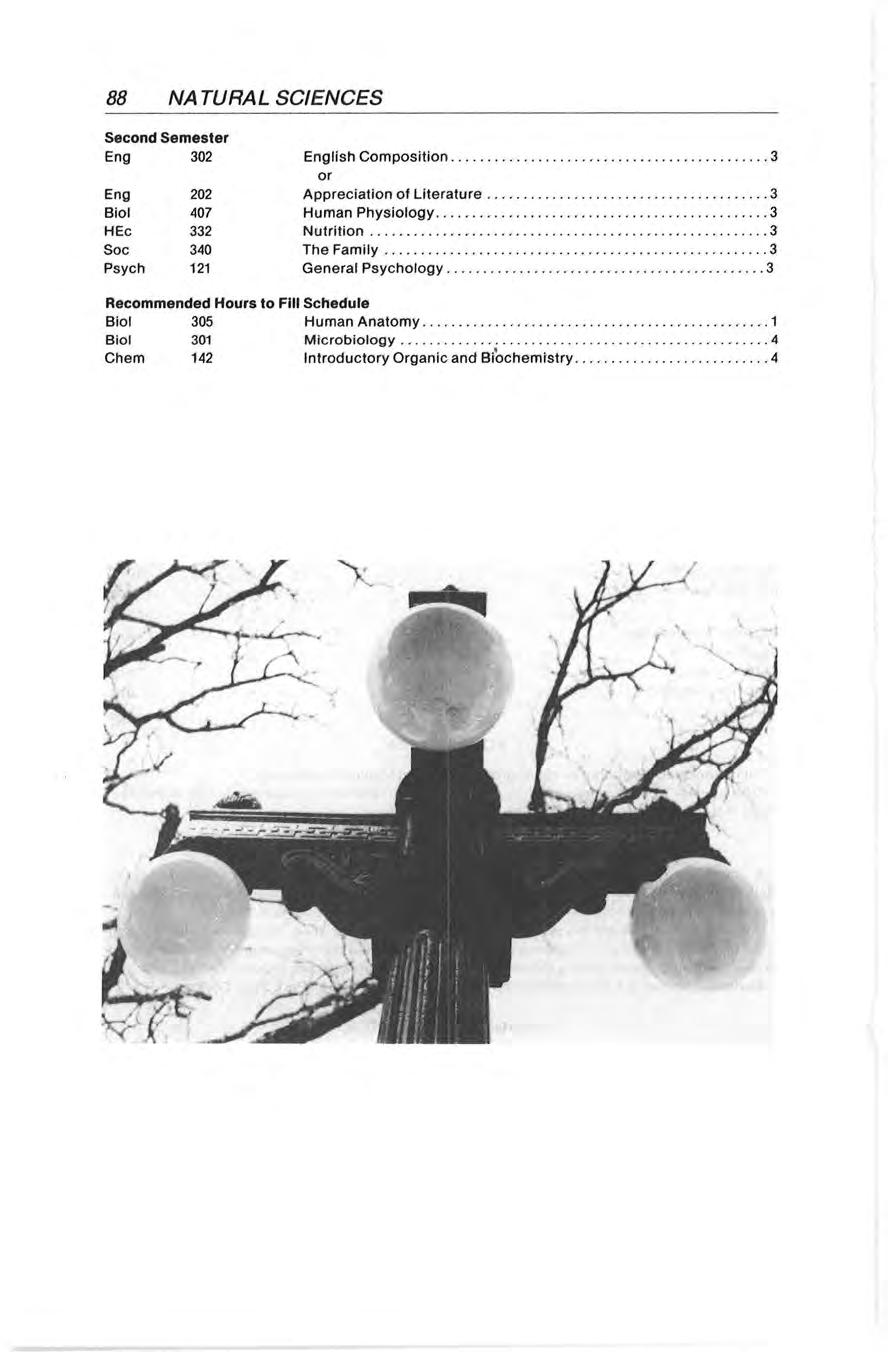
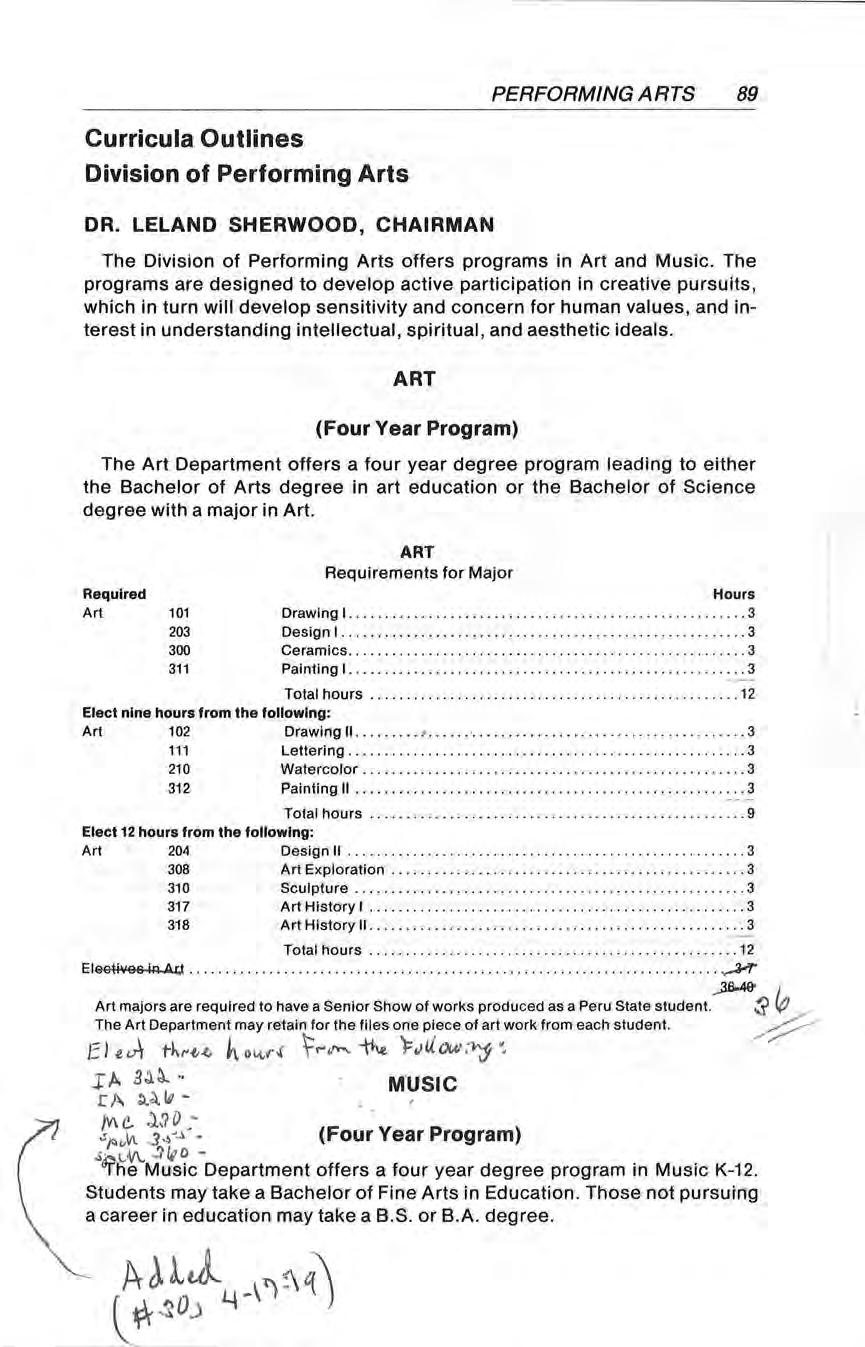
The Division of Performing Arts offers programs in Art and Music The programs are designed to develop active participation in creative pursuits, which in turn will develop sensitivity and concern for human values, and interest in understanding intellectual, spiritual, and aesthetic ideals.
The Art Department offers a four year degree program leading to either the Bachelor of Arts degree in art education or the Bachelor of Science degree with a major in Art.
i red to ha~e a Senior Show of :"orks produced as' a Peru State student.
Art Department may retain for tlrle flle-s o ne piece o f art work from each·student
'The Mwsic Department offers a four year degree program in Music K-12. Students may take a Bachelor of Firte Arts in Education . Those not pursuirtg a career in education may take a B . S-. or B .A. degree .
NOTE : It is the policy of the Music Department that all musi c majors should parti c ipate in band and choir ea c h semester as this is a very important part of the stud e nt's training. During the semester in which the student presents his or her senior recital , a djustments can be made Music students are required to attend recitals and concerts as a partial fulfillment of the graduation requirement. Music majors working toward a Bachelor of Fine Arts degree in Education are required to give a full recital.
Applied Music Private instruction is provided in voi ce , piano , organ , strings , woodwinds , brass and percussion. There is no charge for private lessons to students within the department. Those outside th e department may register for lessons at the rate as indicated in the Financial Section Music students a re requir e d to show a proficien c y in piano to m ee t the demands of their c lassroom activities At least one s emester o f private voice instruction is re quired of majors
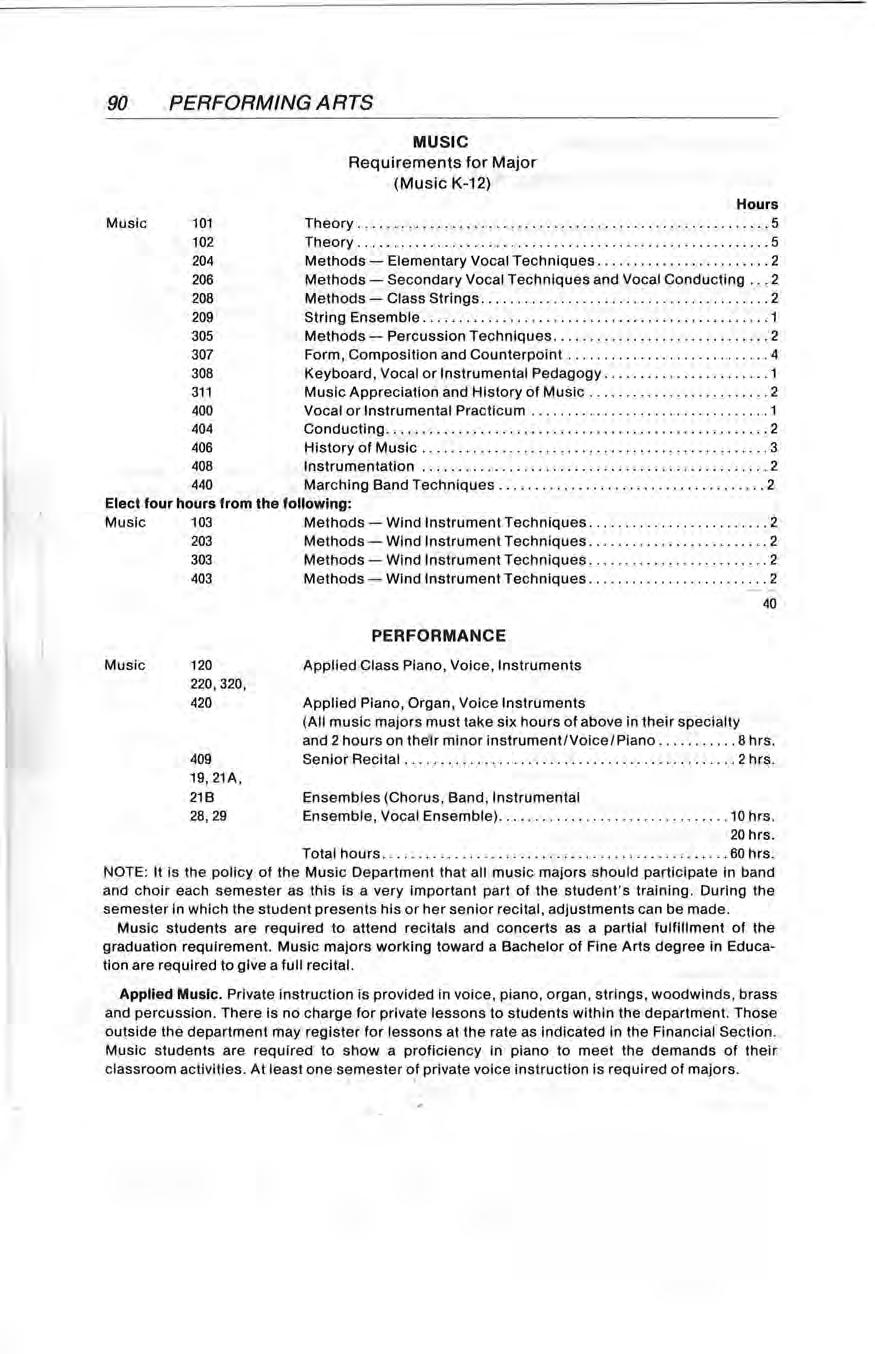
The Division of Physical Education offers programs to prepare students to teach physical education, to coach, and to effectively manage organized activities. The programs are designed to develop active participation in physical activites now, and to encourage continued participation to appropriate activities in later years.
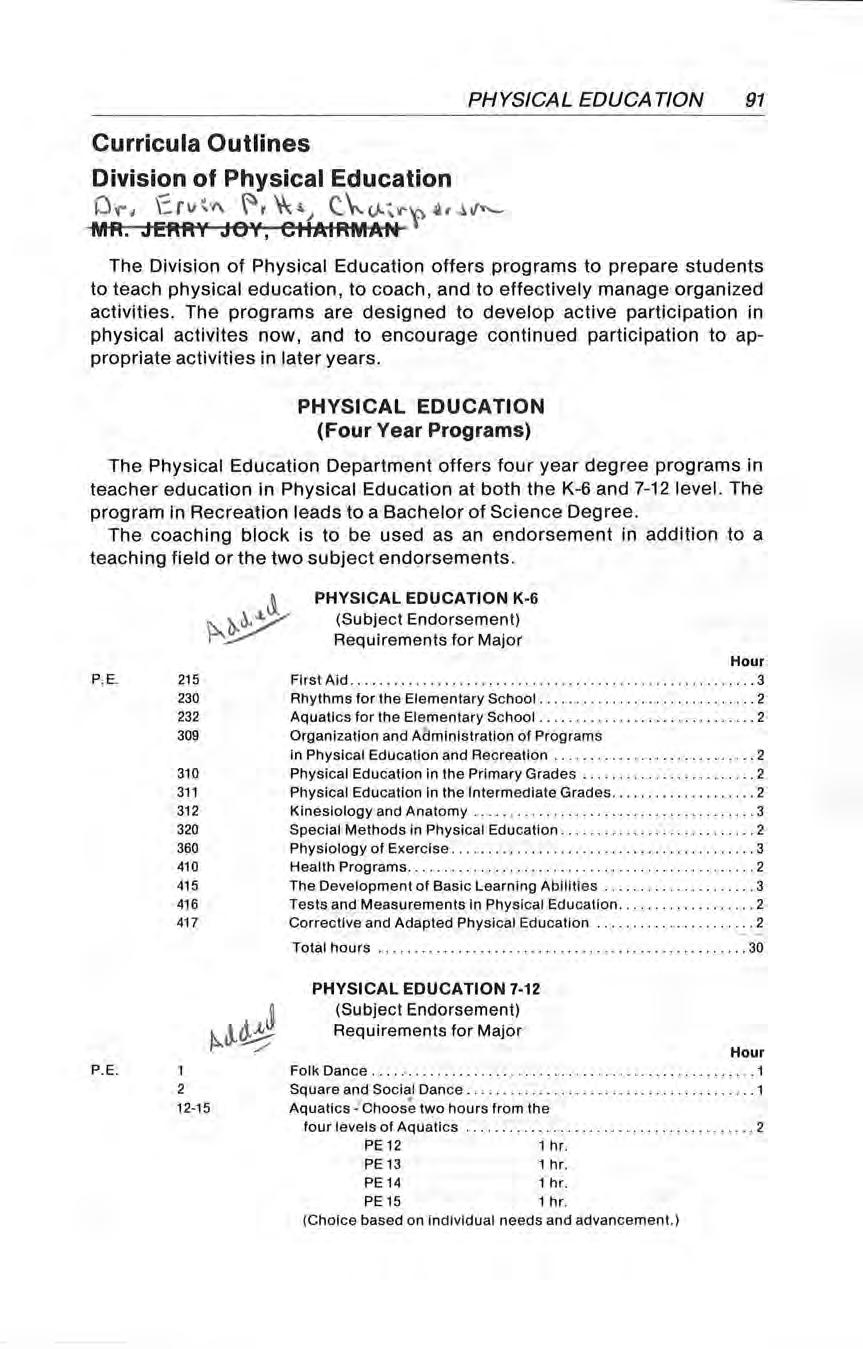
The Physical Education Department offers four year degree programs in teacher education in Physical Education at both the K-6 and 7-12 level. The program in Recreation leads to a Bachelor of Science Degree
The coaching block is to be used as an endorsement in addition to a teaching field or the two subject endorsements.
o'("., E.rvi:.V\ ~! C.\.-.u-~"''f ~'~"''MR. JeRRY JOY, CHAIRMAN
f The following program is provided for those students Interested in the coaching of in-
ters c holastic sports It Is designated to fit the needs of the high school coac h and leads to institutional recommendation for endorsement. Students completing this program are required to have amajorina-lher,a,ea('.¼ ~c.u.l /t:;!f &- f\ e,~ )
Students desiring the coaching block endorsement should select a minimum of three of the 58-llen ,theory courses listed below

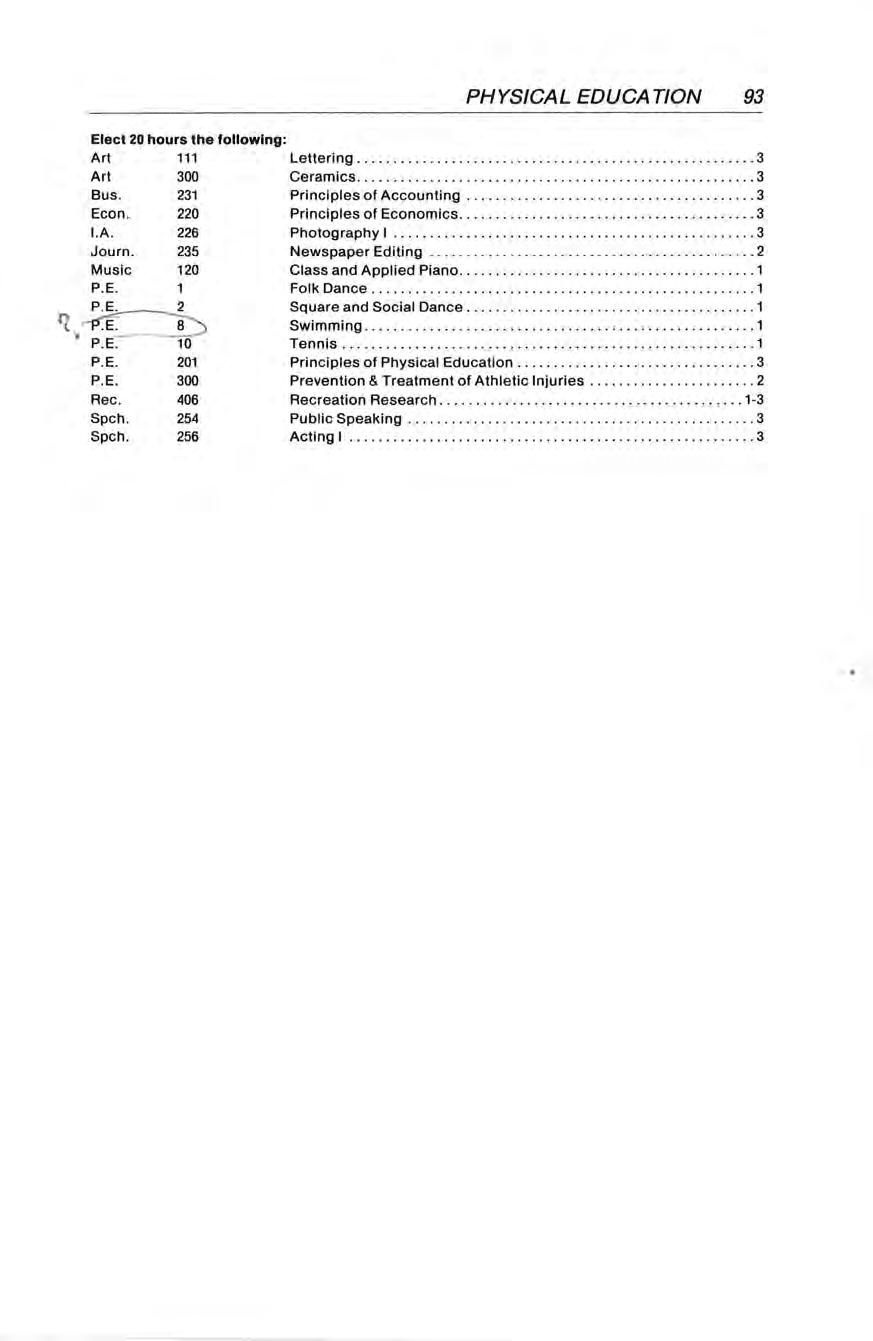
100 Business Mathematics
3 hr.
A review of the four fundamental operations of arithmetic applied to whole numbers , fractions , and decimals; applications of percentage; computing interest and discounting notes; consumer credit; cash and trade discount; computing markup , retail and commission; marking goods; the arithmetic of payrolls.

102 Introduction to Data Processing
3 hr.
An introduction to the concepts and basic features of electronic computers. An overview of the makeup of computer systems and of the st r ucture and usage of computer languages is presented. FORTRAN IV is used to illustrate the course and give the student direct computing experience
3 hr.
Permission of the Business Department. Five hours attendance. Development of a working knowledge of typewriting for personal and vocational use A student having one unit of high school credit in typewriting will not be allowed to take this course for credit.
Introduction to Business
3 hr.
A study of business and the environment in which it is conducted; types of business firms , functions they perform, problems confronting them and possible solutions for these problems are considered. Elementary Shorthand
3 hr.
Prerequisite: Bus. 121 or equivalent or being enrolled in Bus 121. Five hours attendance. A study of reading and writing shorthand , and an introduction to dictation and transcription. A student having one unit of high school credit in shorthand will not be allowed to take this course for credit.
COBOL Programming
3 hr.
Prerequisite : Bus. 102 or Math 102. A general introduction to the ANS COBOL Programming Language and its application to business computing. The student's work will include analyzing problems and developing, testing, debugging, running , and documenting COBOL programs to solve these problems
FORTRAN Programming
3 hr.
Prerequisite : Bus. 102 or consent of instructor. The FORTRAN IV language and its application to problems solving is discussed in detail. The student's work includes analyzing a problem and developing a program relative to his field of interest.
Personal Business Finance
3 hr
Fundamentals of personal finance. Budgeting ; banking ; life insurance; accident , health , and casualty insurance; investments ; trusts ; taxes; income ta x es and social security.
Intermediate Typewriting
3 hr.
Prerequisite: Bus 121 or one unit of high school credit in typewriting. Stresses speed and accuracy in typewriting letters , manuscripts, tabulations and other forms.
it Transcriptions I O\ i "'- J. ~a-\.
3 hr.
Prerequisite: Bus 220 or equivalent. Development skills in operating the transcribing unit. Meets five hours a week
..,._ Transcriptions II (-. \ B-, ,
2 hr.
Prerequisite : Bus. 220 or equivalent and permission. Further development of skills on the transcribing units. This course includes vocabularies for special employment areas. Meets four hours a week.
.> Transcriptions Ill
2 hr.
Prerequisite: Bus 220 or equivalent and permission. Further development of the skills on the transcribing machine specializing in the area of medical terms and correspondence Meets four hours a week.
lt Transcriptions IV
2 hr.
Prerequisite: Bus. 220 or equivalent and permission . Further development of the skills on the transcribing machine specializing in the area of legal terms , documents and correspondence. Meets four hours a week
Transcriptions V (j'\ J. 13 c<1'-,1 , / :J
3 hr.
Prerequisite: Business 131 or equivalent. Five hours attendance A continuation of Business 131 , emphasizing the development of skill in dictation and transcriptions
.,,. Transcriptions VI lw Q, 13 ..,,..5 2. t 2. .ll) 0 )J -,1l{,.<..( .J"JJJ
3 hr. '
Prerequisite: Bus 132 and 220 or two units High School shorthand. Four hours attendance Emphasis is placed on increasing skills in taking dictation and transcribing it into mailable form
.:,t- Transcriptions VII (_ W a..s {311, .1 J.. :l.
O) cf., {ju,l lf/).,ftl
3 hr.
Prerequisite : Bus 222 V ' Four hours attendance Greater increase in the speed and accuracy in taking timed dictation
Principles of Accounting I

2-3 hr
Four hours of attendance per week. An introduction to the processes of recording financial data and preparing periodic financial statements The complete accounting cycle will be studied. One and two year secretarial majors may register for the 2 hrs credit and will attend the first 10 weeks of the course Those completing only the 2 hr. program are not eligible to enroll in Bus 232
Principles of Accounting II
3 hr.
Prerequisite: Bus. 231 Four hours attendance. A c ontinuation of Bus 231, considering the accounting process in the corporation; the student is introduced to accounting theory, financial statement analysis and cost accounting.
Business Machines
3 hr .
Three hours attendance with individual laboratory work arranged. Basic calculating machine operations , care of the machines and business application problems are stressed
237 Principles of Management
3 hr.
Prerequisite: Bus. 123 A study of the functions of management with an introduction to such areas as organization theory , decision making, leadership, and motivation as they apply to all organized groups , but geared primarily toward the e x isting business organization.
250 Salesmanship
301
3 hr.
A study of the skills and techniques used in selling and persuasion. The course is designed to help the student learn t q sell pr.oducts and ideas through a study of proven techniques used by succ essful saiesm'en.
Business Communications
3 hr.
Prerequisite : Ability to type A study of Business English and communication as well as learning how to compose and produce the various kinds of letters used in the business world
325
Secretarial Procedures
4hr.
Prerequisites : Bus. 123 , 220. Five hours of attendance per week This course is designed to develop competencies in both operational and managerial functions performed by the top-level secretary. Operational functions involve an in - depth study of office and secretarial procedures This will include records management, magnetic card typewriter , duplicating machines, and transcribing machines Managerial functions involve the development of a high degree of competency in administrative secretarial skills
Principles of Marketing
3 hr.
A study of the buying , selling , transporting and storing functions involved in marketing; the student is introduced to retailing, wholesaling and marketing management.
Advertising
2 hr.
Prerequisite : Bus 328 A study of advertisements and media from three viewpoints: management-marketing, communications-creativity, and consumer-citizen
Insurance f W IU l l~~-4)
3 hr.
Prerequisite : ~us 123 A study of the major types of business r isks and the insurance available for the covering of these risks . Personal insurance will also be studied including: Life, Health and Accident Property , Public Liability, and Social Insurance.
Investment
3 hr.
Prerequisite : Bus. 232. A study of the major uses of investment funds , including saving accounts in banks and other financial institutions, government bonds , corporate stocks and bonds , annuities and real estate.
334 Advanced Typewriting
3 hr.
Prerequisite : Bus 220 Three hours attendance Stresses the development of a high degree of proficiency in composition, machine dictation and production typewriting
335 Industrial Management
3 hr.
Prerequisite: Bus . 237. A study of the management of an industrial plant ; location, construction , layout, equipment , supplies a d personnel are considered
337 Intermediate Accounting I
3 hr.
Prerequisite: Bus 232 A study of the problems involved in establishing sound valuations fo r asset , liability and net worth items; proper reporting of financial position and net income is stressed.
338 Intermediate Accounting II
3 hr.
Prerequisite : Bus 337 An in-depth continuation of Bus 337 with special emphasis on long-term liabilities, intangible assets , statement analysis ; stockholders' equity , application of funds, and present value
339 Cost Accounting
3 hr.
Prerequisite : Bus 232. A study of manufacturing cost under process and job-order cost systems; determination and application of standard cost , analysis of cost behavior and cost budgeting to aid management in making decisions are stressed.
340
Statistics
3 hr.
A study of the methods of summarizin"g and interpreting data , elementary probability and its relation to distributions The meanin.gs, importance , and applications of the normal and binomical distributions . The (nethods of random sampling , testing of hypotheses , analysis of varied data, and interpretation of standardized test scores

341 Income Tax Accounting
3 hr.
Prerequisite : Bus 232 The Federal Income Ta x laws and regulations concerning taxable income, inclusions and exclusions , allowable deductions , and basis of determining gain or loss of reporting purposes for individuals , businesses, and corporations
342 Application of Data Processing
3 hr.
A study of the applications of data processing concepts uses of computer systems, system design, management in formation systems , simulation, and management problem solving.
345 Real Estate Principles and Practice
3 hr.
Prerequisite: Bus. 123. A study of real estate law as it affects marketing, ownership , interests, sales , leases and agencies. Financing institution, financial aspects of ownership and marketing will be covered, as well as managerial aspects of brokerage , property valuation, and real estate appraising.
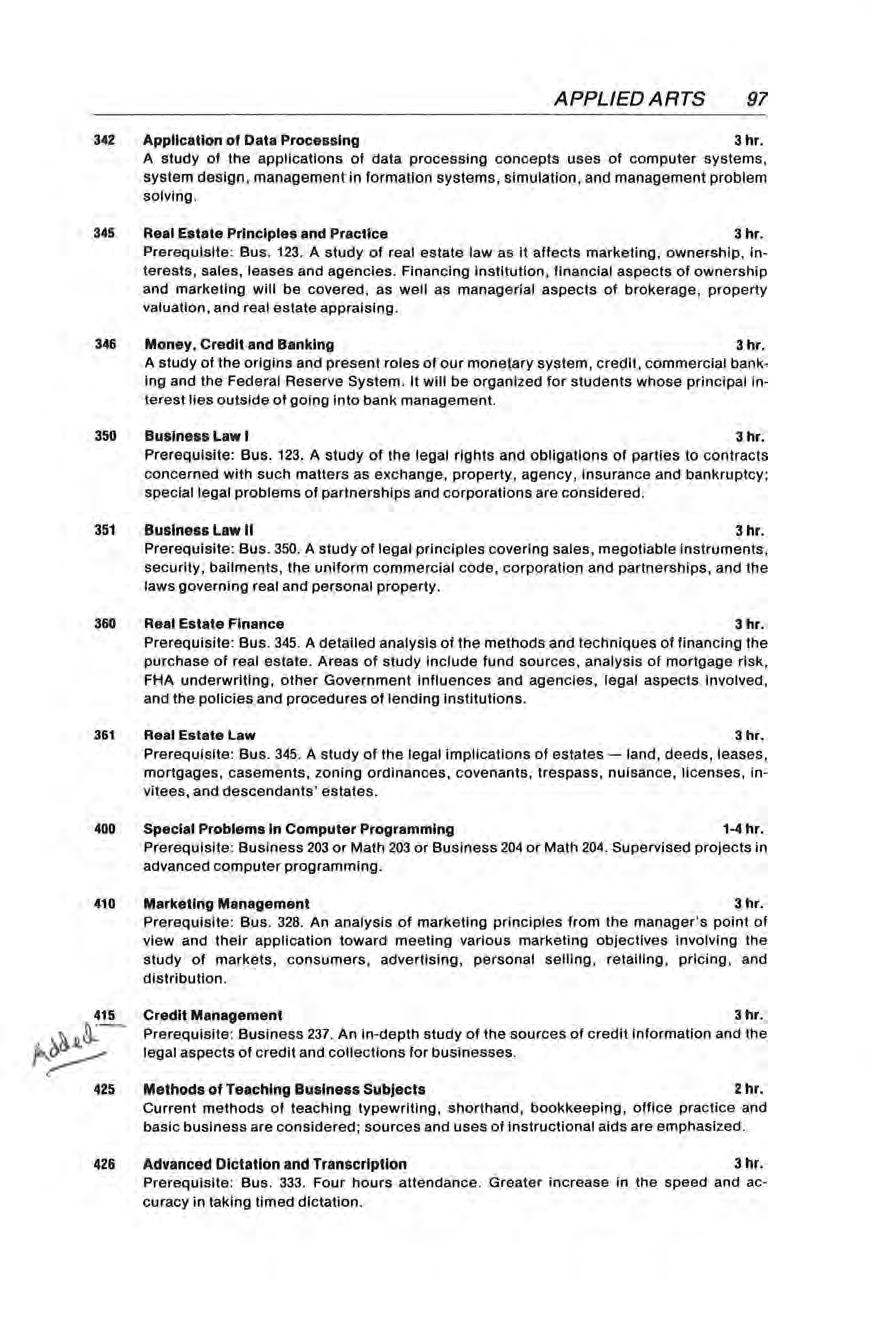
Money, Credit and Banking
3 hr
A study of the origins and present roles of our monetary system , credit, commercial banking and the Federal Reserve System It will be organized for students whose principal interest lies outside of going into bank management
Business Law I
3 hr.
Prerequisite : Bus 123 A study of the legal rights and obligations of parties to contracts concerned with such matters as exchange, property, agency, insurance and bankruptcy; special legal problems ol partnerships and corporations are considered.
Business Law II
3hr.
Prerequisite : Bus 350 A study of legal principles covering sales, megotiable instruments, security, bailments, the uniform commercial code , corporation and partnerships, and the laws governing real and personal property
Real Estate Finance
3 hr.
Prerequisite : Bus. 345. A detailed analysis of the methods and techniques of financing the purchase of real estate Areas of study include fund sources, analysis of mortgage risk , FHA underwriting , other Government influences and agencies , legal aspects involved , and the policies and procedures of lending institutions.
Real Estate Law
3 hr.
Prerequisite : Bus 345. A study of the legal implications of estates - land, deeds, leases, mortgages, casements, zoning ordinances, covenants, trespass, nuisance, licenses , invitees, and descendants ' estates
Special Problems in Computer Programming
1-4 hr.
Prerequisite : Business 203 or Math 203 or Business 204 or Math 204 Supervised projects in advanced computer programming
Marketing Management
3 hr.
Prerequisite: Bus 328. An analysis of marketing principles from the manager ' s point of view and their application toward meeting various marketing objectives involving the study of markets, consumers, advertising, personal selling, retailing, pricing, and distribution
Credit Management
3 hr.
Prerequisite : Business 237. An in-depth study of the sources of credit information and the legal aspects of credit and collections for businesses
Methods of Teaching Business Subjects
2 hr. Current methods of teaching typewriting, shorthand, bookkeeping, office practice and basic business are cons i dered; sources and uses of instructional aids are emphasized.
Advanced Dictation and Transcription
3 hr.
Prerequisite: Bus. 333 Four hours attendance Greater increase in the speed and accuracy in taking timed dictation
Business Finance
3 hr.
Prerequisite : Bus. 232 and Econ 220. A study of the uses of funds to fin a nce assets , internal and external sources of funds and the cost of funds obtained from alternative sources under various conditions.
Administrative Management ( \,IJ 11, 0 ft i <- e. Ju. {J f - 2. ~.,.;;
3 hr.
Prerequisite: Business 237 A study of the management of an office. Areas of study include location, layout , equipment , supplies, automation, controlling expenses, measuring efficiency of operation, establishing quantity and quality production standards, and the adminstration of personnel.
Personnel Management
3 hr.
Prerequisite: Bus 237. A case study approach to the management of labor; selection, training , compensation and supervision are considered.
Projects in Typewriting
1-4 hr.
Prere quisites: Senior standing and permission of the instructor Designed for a student to do advanced projects in typewriting based upon his individual needs and interests.
Analysis of Financial Statements
3 hr
Prerequisite : Bus. 338. A course based on the study of Corporation Financial Statements and their interpretation Statements of corporations will be used and the emphasis will be on the report analyzing the financial position and earnings of various companies.
Independent Study in Business
Prerequisites : Permission of the instructor.
441 Internship in Business
1- 4 hr.
1-4 hr.
On -the-job training with a business firm or industry. To be taken near the ending of formal
college courses by students in the areas of management , marketing , accounting, and
secretarial. A student must intern in the area of his vocational career interest One hour of
college credit will be given for 115 hours of internship work The student must attend a two
hour seminar each month . Busin es s majors only.
442 Managerial Accounting
3 hr.
Prerequisite : Bus. 232. Designed to study the uses of accounting information for managerial decisions and internal management purposes. Focus will be on cost controls, budgeting , performance e valuation , and financial information for planning and decision making
443 Quantitative Management
3 hr.
The study of the methods of systems and management science Th e co urse includes a development of analytical reasoning and logic and set concepts, as well as such topics as decision processes , linear programming, waiting lines, stochastic processes, forecasting methods, inventory control, input/output analysis, and general modeling

450 Advanced Accounting
3 hr.
Prerequisite: Bus 338 A detailed study of problems arising out of partnerships, combinations, installment sales, and the preparation of consolidated financial statements. Also included is home office and branch accounting.
470 Auditing Principles
3 hr
Prerequisites : Bus 337 and 339 or by permission Generally accepted auditing standards and procedures with philosophy supporting them Auditing techniques available to the independent public accountant.
CPA Review
3 hr.
Prerequisite: Bus 450 Intensive presentation of overall accounting and related materials summarizing CPA examinations and solutions. An in-depth study of APB opinions and financial research bulletins
220 Principles of Economics I

3 hr.
Elementary concepts with emphasis on money , banking , savings , insurance , production , distribution , taxation , value , price , capital , and labor.
221 Principles of Economics II
3 hr.
Prerequisite: Economics 220 Consideration of wages, interest , rent and profits ; personal distribution of income ; consumption; monopolies ; agriculture ; government ta xation and expenditures; international trade; and comparative economic systems.
222 Contemporary Economic Problems
3 hr.
Prerequisites: Economics 220 and 221. Analysis of major economic problems relating to wage and income distribution, money and credit , business cycles , domestic and int e rnational trade and tariffs
380
Economic History of United States
3hr. U S. economic history from colonial times to the pres e nt.
Public Finance
3 hr.
Prerequisites : Econ 220 and 221. A critical analysis of the capitalistic economic systems followed by a survey and critical analysis of socialism and communism
Labor and Industrial Relations
3hr. Econ 220 and 221 Labor, management and government as they are interrelated involving collective bargaining, labor laws, and wage theories.
Environmental Economics
3hr .
Prerequisites : Econ. 220-221. An e c onomic analysis of the environmental crisis and possible solutions The role of the market system and its failure to compensate for the suffering generated by a highly advanced society.
470G Special Problems in Economics
1-4 hr.
Prerequisites : Econ. 220 and 221 Designed to provide an opportunity for a student to do advanced independent study in economics based upon his individual needs and interests.
130 Personal Improvement
2 hr.
Improvement of the personal image for business and social -success Professional , visual (personal appearance), and social aspects of self improvement are emphasized.
133 Food Purchasing and Preparation
3 hr. Two hours lecture and discussion ; three hours laboratory. Fundamental principles of food selection, purchasing and preparation. The course also includes a study of the nutritional value of foods
134 Meal Management
141
3 hr
Principles of food purchasing, preservation and management procedures as related to family service in the changing American Society. Application of the principle of meal management in a basic study and preparation of different world and American regional cuisines
Clothing Selection and Construction
3 hr . Selection of wearing apparel based on the significance of clothing in American society , and the principles of design as applied to personal appearance Constructing apparel through the use of a basic pattern and fundamental pattern methods ; application of principles of design , basic construction techniques , and good management.
205 Selection, Use and Care of Household Equipment
3 hr. Working principles of large and small ele c trical appliances and housewares in terms of the application of mechanics, heat, and electricity Methods of determining performance and an understanding of common repair problems.
215 Nutrition for the Elementary School
A course including basic principles of nutri tion with focus on nutritional needs of children and on methods of teaching children about foods and health Designed for the elementary education student; includes pi anning classroom activities for children Housing
3 hr. 232
3 hr.
Social , physical, aesthetic and economic aspects of housing as it concerns the family during stages of the family life cycle. Principles of buying, building or remodeling to meet family needs
302 \c J fhud Development
3 hr.
, c.r~ The study of child development from prenatal to adolescence, involving the child in rela-
e.~ tionship with his (her) family , physical growth and child psychology- cognitive, language, c, creative, social , and emotional development
310 321
Methods and Media In Home Economics Demonstration 2 hr
Prerequisites : H Ec 133 and 141. Selection and application of methods and media for use in presentation of programs in home economics by the teacher, home economics agent and commercial demonstrator

Relationships 1-3 hr. Readings in current literature on human relationships. 322 Home Furnishings
The selection, arrangement and care of furnishings from the standpoint of comfort, beauty , economy and family needs. Includes laboratory experience in furniture refinishing. Nutrition
3 hr.
Fundamental principles of human nutrition , its development through research as related to the needs of individuals according to their age, sex , and occupation Course requirements include readings in latest developments of nutrition.
Textiles
3 hr.
A study of fabric construction , yarns, fibers and finishes as they affect the selection , use and care of fabrics for clothing and for the home
334 Tailoring
3 hr. A course designed to meet the student ' s need for the more difficult construction problems which are encountered in tailoring.
400 Special Problems in Home Economics
1, 2 or 3 hr Special research or study as needed by the individual. Home economics majors only.
410 The Consumer In American Society
3 hr. Study of the economic problems and responsibilities of consumers. Basic definitions and analyses of economics judged to be helpful in the activities of consumer or household buying
421 Home Management
3 hr
Emphasis on present day decisions and management problems of families Application of management techniques for household activities and family living
121 Technical Drawing I
3 hr.
A course concerned with the fundamentals of graphic language The course includes proper use and care of instruments , geometric construction , lettering, sketching and shape description, multi-view projection, sectional views and auxiliary views
123 Woodworking Technology I
3 hr
The development of basic skills in the use of both hand tools and woodworking machines
124 Woodworking Technology II
3 hr.
Prerequisite : I.A . 123 . Advanced techniques and instructi on in industrial wood processes.
132 Metals Technology I
3 hr.
Fundamental instruction in the areas of sheet metal , bench metal , forging and heat t reatment, foundry , welding and elementary machining
222 Technical Drawing II
3 hr
Prerequisite : IA 121. The course includes shop processes , dimensioning , threads and fasteners , design and working drawings , axonmetric projection , oblique projection , perspective projection, intersections and developments , gearing and cams, welding representation , graphs and the use of drafting machines
226 Photography I
231
232
2-3 hr
Theory and practice in the basic fundamentals of photography including composition, e xposure , lighting, developing, conta c t printing and enlarging The third hour credit gained by additional assignments Each student must have a camera
Industrial Craft s I
3hr .
Open to all students Basic e x periences in working with a variety of craft media ; including plastics , art metal, ceramics , and leather
Leatherwork
Ex periences in the tooling, carving, and fabrication of leather
233 Electrical Technology I
2 hr.
3 hr.
Basic theory, principles , and applications of electricity in industry and the home Areas of instruction include the production of electricity , magnetism, theory and basic circuits, residential wiring , motors and generators, automotive electricity , appliance repair, electro -chemist r y
237 Graphic Arts
3 hr.
Study and practice in basic processes of printing and allied industries, including work in letterpress , silkscreen printing , bookbinding, rubberstamp making and goldleaf stamping. Also beneficial for those interested in journalism
318 Finishing Technology
3 hr
Instruction in surface preparation , materials , and finishing applications and processes
Primary concentration on wood finishing Refinishing , airbrush work , and spot finishing will also be studied '
320 Motor and Appliance Repair and Servicing
3 hr.
Prerequisite: I.A 233. Study and practice in techniques of testing , trouble shooting , repairing , and maintaining electrical motors and appliances.
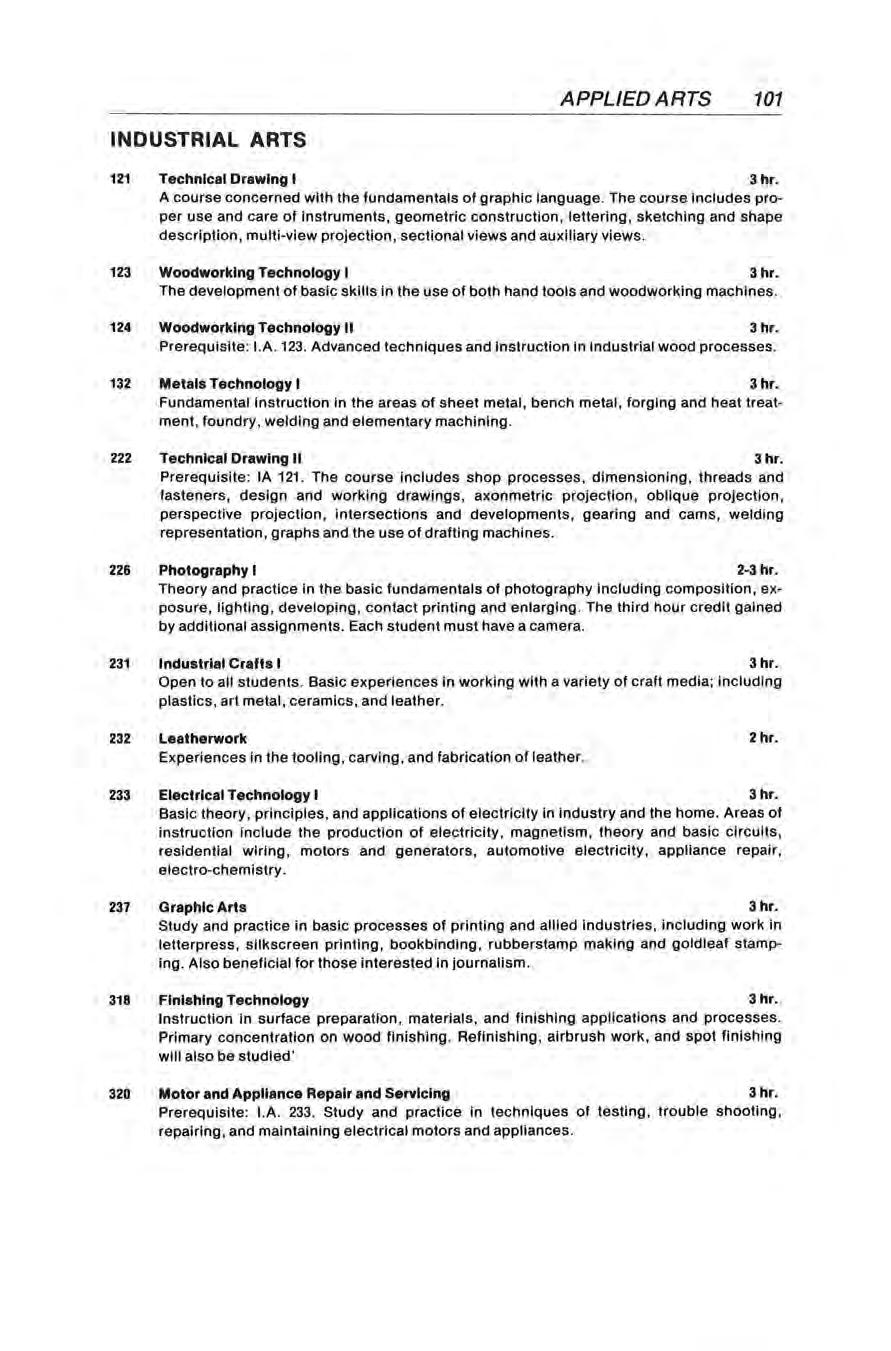
321 322
Shop Maintenance
2 hr.
Instruction in the use and ca re of equipment commonly found in the industrial arts laboratory, and shop planning as it relates to the proper functioning of industrial arts fac iliti es Practice will be given in the conditioning and repair of hand and power tools and equipment.
Handcrafts
3 hr.
A course designed to develop skills and knowledge in working with ceramics, metals , plastics, wood and other craft materials In struction will include specifying and purchasing craft supplies and methods of incorporating these activities into schoo l and community programs Recommended for elementary school teachers, recreation majors, and for people interested in leisure time craft activities.
323 Metals Technology II
3 hr.
Prerequisite : I.A 132. A second course in metalwork with emphasis on foundry and machine technology, and a study of metallurgy as it relates to the foundry , machine shop , and heat treating processes.
324 Building Construction
3 hr.
Prerequisite : I.A 124 Fundamentals of wood frame building construction. Basic plumbing, e l ectricity, masonry , and related areas will be studied
325 Photography II
326
2-3 hr.
Prerequisite : I.A. 226. Lens testing, infra-red photography , high speed photography , portraiture , use of negative and positive color films, color printing and movie making.
Upholstery
3 hr.
Prerequisite : I.A. 124 or by special permission Designed to give experience in and information about various methods of construction in upholstery both with and without use of springs.
327 Furniture Making
3 hr.
Prerequisite: I.A 123. The design and construction of a contemporary piece of furniture
328 Electrical Technology II
3 hr.
Prerequisite : I.A 233 or Phys. 202 or by special permission. A study of the principles of application of electronics and their app li cations in circu its , test equipment, vacuum tubes, transistors , radio, and television
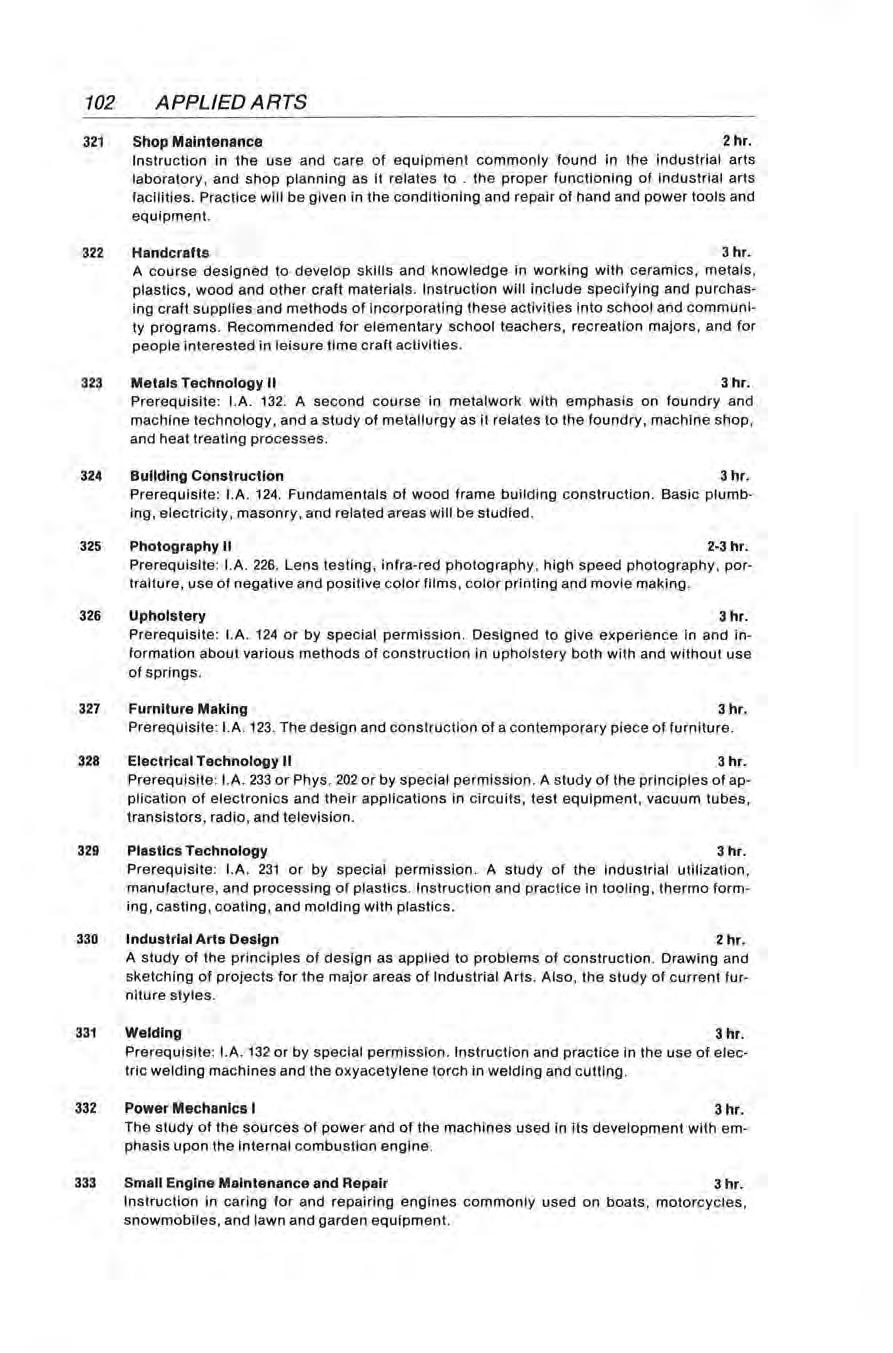
329 Plastics Technology
3 hr.
Prerequisite : I.A 231 or by specia l permission. A study of the industrial utilization, manufacture , and processing of plastics In s truction and practice in tooling, thermo forming , casting, coating, and molding with plastics.
330 Industrial Arts Design
331
332
2 hr
A study of the principles of design as applied to problems of construction. Drawing and sketching of projects for the major areas of Industrial Arts Also , the study of current furniture styles.
Welding
3 hr.
Prerequisite : I.A 132 or by special permission. Instruction and practice in the use of electric welding machines and the o x yacetylene torch in welding and cutting.
Power Mechanics I
3 hr.
The study of the sources of power and of the machines used in its development with emphasis upon the internal combustion eng ine.
333 Small Engine Maintenance and Repair
3 hr.
Instruction in caring for and repairing engines commonly used on boats , motorcy c l es, snowmobiles, and lawn and garden equipment.
334 Automotive Maintenance and Tune-up
A course in which students will gain technical information, analyze automotive functional problems and make necessary adjustments and repairs to maintain economic operation of the automobile.
Survival Preparedness
A study of facts related to survival in time of local , state or national disaster.
1 hr .
3 hr. 335
337 Driver Education and Traffic Study I
Prerequisite : Twenty thousand miles or two years of driving experience free of repeated chargeab l e accidents and moving violations This course will include presentation of materials and methods of traffic safety and driver training with emphasis upon attitude, development , organization and administration , driving regulations and safe motor care operation
General Safety
3 hr.
3 hr. 338
This course is designed to familiari ze the student with problems of accident prevention and conservation of human life and limb. Emphasis will be placed in the following areas : occupational, farm and home transportation, and school. Instructional materials will be developed and studied.
340 Driver Education and Traffic Safety II
This course will provide an opportunity to construct materials relating to and experiment with methods of presenting lessons in traffic safety and behind-the-wheel driving. Each student will be expected to teach a beginning driver.
Individual Studies In Industrial Arts
1. 3 hr.
Prerequisite: Approval by department. Independent study of Industrial Arts to meet the needs of the student. For majors only
Career Education
3 hr.
3 hr. 400 401
A study providing students from K-12 the direction to acquire the skills which will allow him to make a livelihood for himself and for his future family, no matter at which step of the ladder of the educational system he leaves
405 Electrical Technology II
3 hr.
Prerequisite : I.A. 328 A study of solid state devices and e lectronic circuits in communication and industrial applications
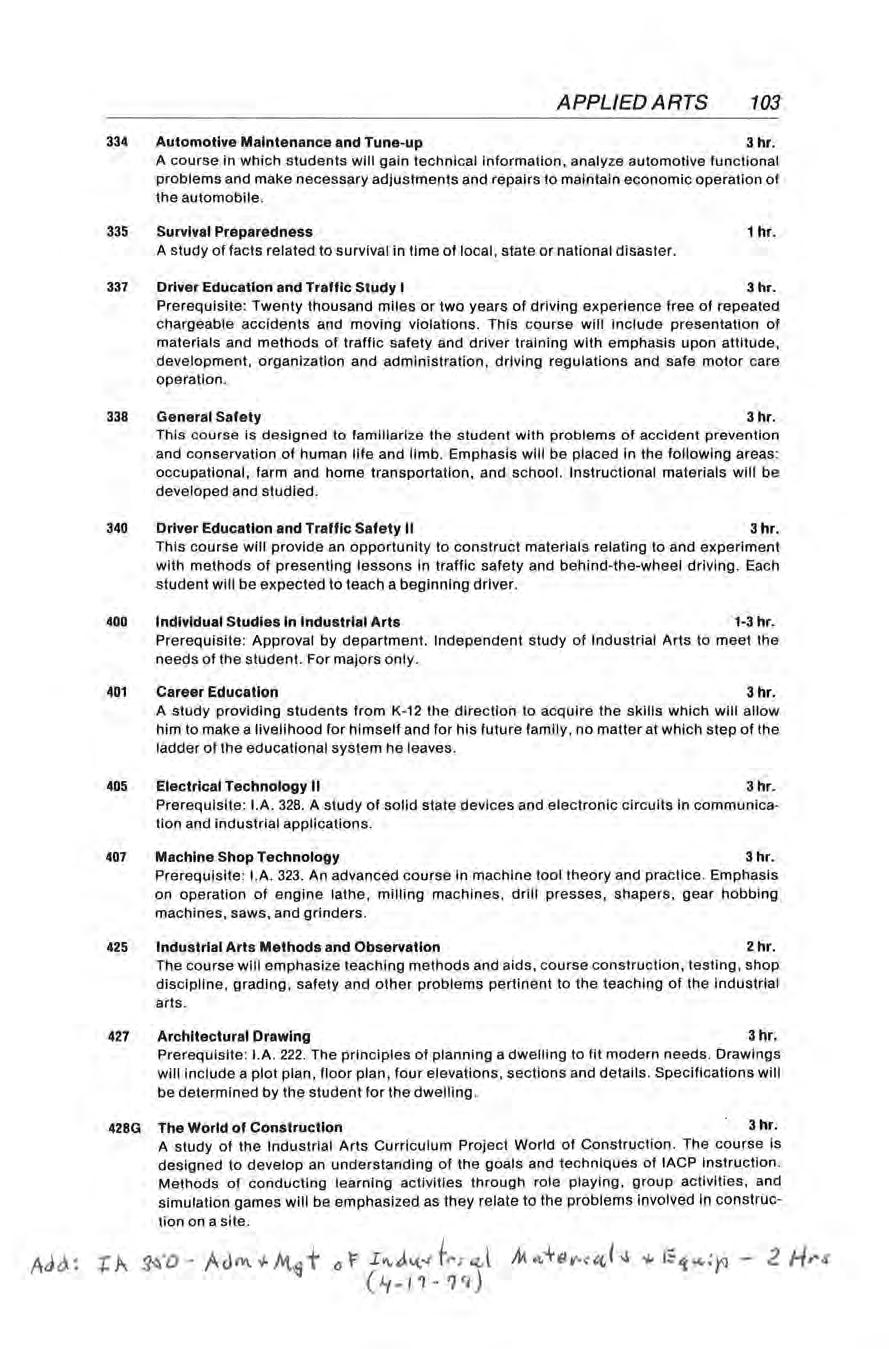
407 Machine Shop Technology
425
3 hr.
Prerequisite : I.A. 323. An advanced course in machine tool theory and practice. Emphasis on operation of engine lathe , milling machines, drill presses, shapers , gear hobbing machines , saws , and grinders
Industrial Arts Methods and Observation
2 hr
The course will emphasize teaching methods and aids , c ourse construction, te s ting , shop discipline , grading , safety and other problems pertinent to the teaching of the industrial arts
427 Architectural Drawing
3 hr.
Prerequisite : I.A. 222 The principles of planning a dwelling to fit modern needs Drawings will include a plot plan, floor plan , four elevations, sections and details. Specifications will be determined by the student for the dwelling.
428G The World of Construction
3 hr.
A study of the Industrial Arts Curriculum Project World of Construction. The course is designed to develop an understanding of the goals and techniques of IACP instruction. Methods of conducting learning act iviti es through role playing, group activities , and simulation games will be emphasized as they relate to the problems involved in construction on a site
429G The World of Manufacture
3 hr.
A study of the Industrial Arts Curriculum , Project World of Manufacturing. The course is designed to develop an understanding of the goals and techniques of IACP instruction. Methods of conducting learning activities through role playing , group activities , and simulation games will be emphasized as they relate to the problems involved in manufacturing products in a plant.
431 Welding II
3 hr.
Prerequisite : I.A . 331 . An advanced course in welding with emphasis on shielded metal arc , metal inert gas , tungsten inert gas and other modern welding techniques.
432 Auto Mechanics
3 hr.
Prerequisite: I.A. 332 A study of the basic mechanical operations of the automobile Emphasis will be placed on principles and theories of operation of components including overhaul procedures and maintenance.
440 Research in Alternative Technology
3 hr.
Prerequisite : Junior or Senior majors The study of the major concepts of current technology. Conceptualization and fabrication combining several technological spe cia lizations
441 G History and Philosophy of Vocstlonal Education
3 hr.
Origins and philosophy of vocational education and the relationship to the school curriculum. Required for vocational certification and recommended as an elective for school administrators.
442G Organization and Administration of Vocational Education
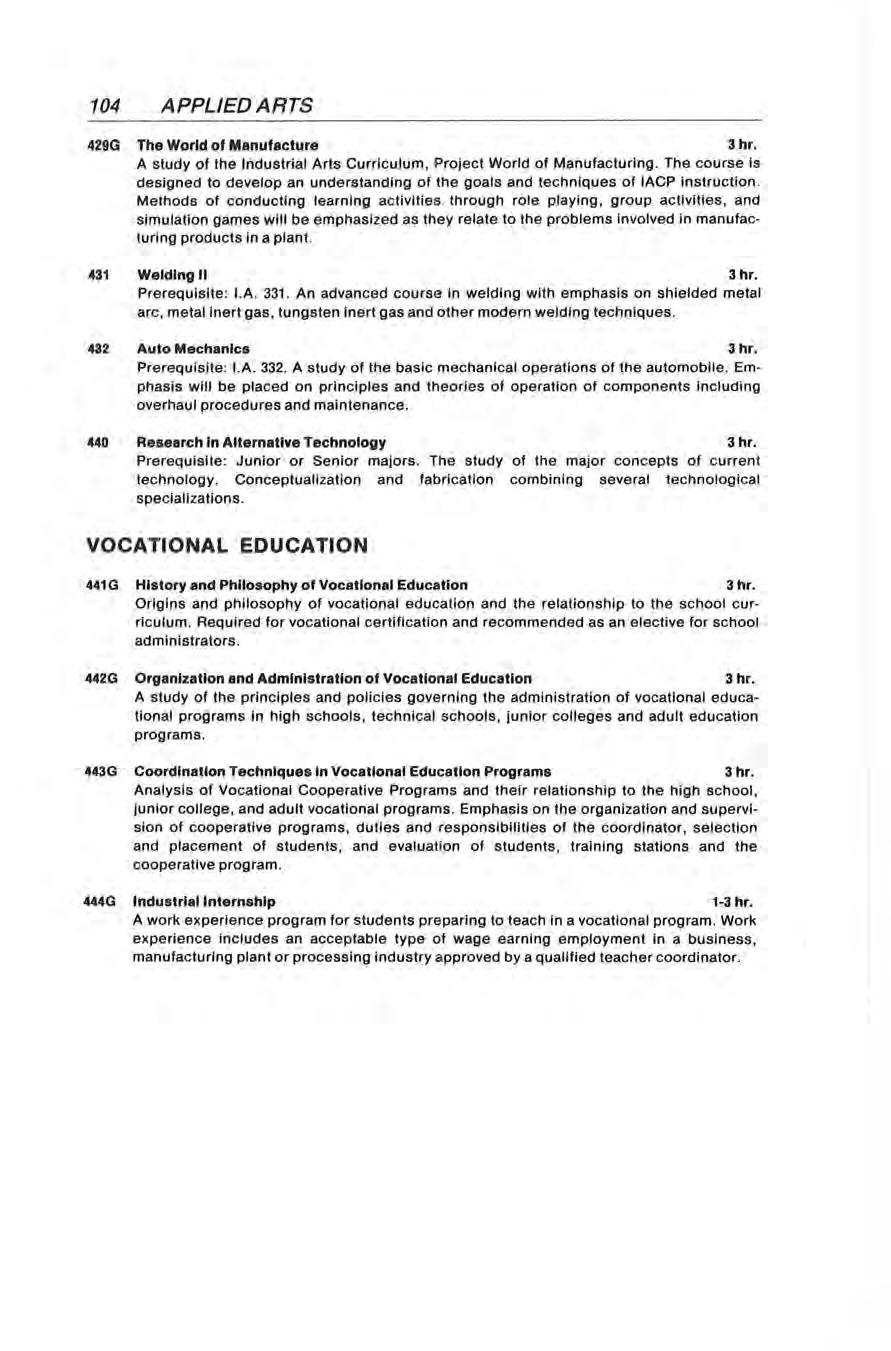
3 hr .
A study of the principles and policies governing the administration of vocational educational programs in high schools, technical schools, junior colleges and adult education programs
443G Coordination Techniques In Vocational Education Programs
3 hr.
Analysis of Vocational Cooperative Programs and their relationship to the high school, junior college , and adult vocational programs Emphasis on the organization and supervision of cooperative programs , duties and responsibilities of the coordinator, selection and placement of students , and evaluation of students , training stations and the cooperative program
444G Industrial Internship
1, 3 hr
A work experience program for students preparing to teach in a vocational program. Work experience includes an acceptable type of wage earning employment in a business , manufacturing plant or processing industry approved by a qualified teacher coordinator.
201 Fundamentals of Teaching
3 hr
Basic psychological and instructional principles of tea c hing and their application. Content includes identifying and specifying goals/object i ves ; teaching of concepts and skills ; giving directions; use of basic AV equipment and materials ; basic motivational and reforcement techniques ; microteaching .
300 Models of Teaching
3 hr.
Practice and application of the basic models of teaching such as synetics , inquiry training , etc
302 The Disadvantaged Child
3 hr .
Prerequisites : Psych . 121 and 301 . An interdisciplinary seminar designed to interpret the influences of culture in regard to the institution of family, school , government, and religion
304 Child, School and Family Relationships
3 hr.
A study of the relationships between the individual in the school and family, the art of living cooperatively with others and the responsibility of each person in the school and home in the development of satisfactory relationships
305 Principles of Early Childhood Education
3 hr
Prerequisite: Psych. 300 Theory and practice of early childhood education in the nursery school and primary grades The course deals with curriculum, program planning, use of materials and equipment , role of teacher , techniques of classroom management , and meeting the needs of individual children in the group situation
307
Practicum
1-8 hr.
Approval. Laboratory based experiences with teaching and nontea c hing responsibilities
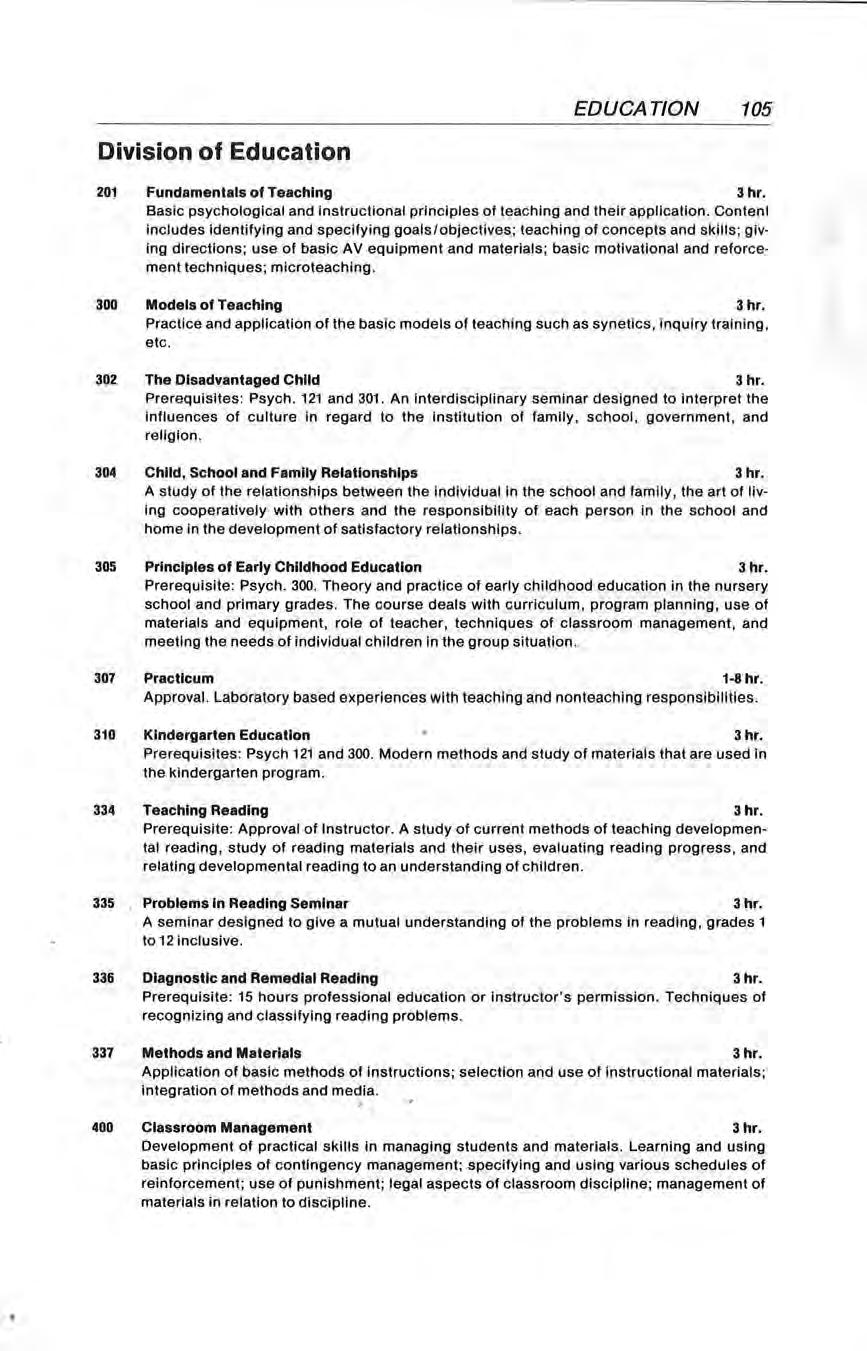
310 Kindergarten Education
3 hr.
Prerequisites : Psych 121 and 300 Modern methods and study of materials that are used in the kindergarten program
334 Teaching Reading
3 hr.
Prerequisite : Approval of instructor. A study of current methods of teaching developmental reading, study of reading materials and their uses , evaluating reading progress, and relating developmental reading to an understanding of children
335 Problems in Reading Seminar
3 hr.
A seminar designed to give a mutual understanding of the problems in reading, grades 1 to 12 inclusive .
336 Diagnostic and Remedial Reading
3 hr.
Prerequisite: 15 hours professional education or instructor ' s permission Techniques of recognizing and classifying reading problems
337
Methods and Materials
3 hr.
Application of basic methods of instructions; selection and use of instructional materials ; integration of methods and me dia.
400 Classroom Management
3 hr.
Development of practical skills in managing students and materials Learning and using basic principles of contingency management; specifying and using various schedules of reinforcement ; use of punishment; legal aspects of classroom discipline ; management of materials in relation to discipline
401 Diagnosis and Assessment
3 hr. Identification, construction, and use of diagnostic and assessment devices appropriate to the classroom.
405 Teaching In the Elementary School
8 hr.
Prerequisite : Approval for professional semester Students will have an opportunity to consider approaches to instruction Including most subjects commonly taught in the elementary school and participation in the clinical teaching laboratory
409 Synthesis of Teaching Competencies
2 hr.
An individualized approach in which each student must demonstrate that he is prepared to student tea c h. Appropriate activities will be planned by the student and by the faculty team.
410 Student Teaching (Elementary)
4 hr., 8 hr
Prerequisite : Psych 121, 201 , and 401; Educ. 300 and 405 A practical application of principles of learning in the classroom. Progressive induction into full teaching responsibility at the elementary level. Students teach full-time for nine weeks Application for student teaching must be made at the end of the junior year
411 Student Teaching (Secondary)
8 hr.
Prerequisite: Approval for professional semester. Experience in the application of sound educational theory by actually teaching students in the secondary school. All students who intend to be certified as secondary teachers are cautioned that the courses in the professional semester are integrated with student teaching and should not be taken in previous semesters Application for student teaching must be made at the end of the junior year

412
Student Teaching (Early Childhood)
4 hr.
Prerequisite : Approval for professional semester. Observation, laboratory and teaching experience in directing the learning activities of children in K-3 classes. During the eight weeks of teaching, the student applies the theories and principles of learning and instruction
415 Workshop
1 to 6 hr.
Work on practical educational problems of spe c ial interest to the students The individual or group is expected to make a written report to his finished project which will be duplicated and made available to other members of the Workshop.
443
Individualization of Instruction
3 hr. Several models for individualization are investigated. The student will design a topic of instruction following one of the models The student's experience t his individualized design by the way the course is managed
446 Teaching Secondary Reading
3 hr.
Prerequisite : Educ 200 and Jr standing A study of the current trends and practices in · developmental, corrective, and remedial reading in the secondary schools Adolescent literature and reading needs wiJI be related to the instructional demands in bolh reading improvement skills and using reading as a tool for learning in the content fields.
450 Directed Study In Education and Psychology
1-3 hr
Prerequisite : Junior or senior standing with permission of the instructor. Individual study and research in depth on a topic jointly approved by the instructor and student '
121 General Psychology
3 hr.
A general education course which provides an introduction to the field of Psychology. Initial course for those preparing as teachers or professionals in the field.
245 Human Psychology
3 hr.
A study of conflicts, fears, anxieties, frustrations and stress occurring in most life situations. Healthy and unhealthy modes of adjustments are considered with the aim of building emotional stability, personality improvement , and preventi ng mental illness.
250 Developmental Psychology
3 hr.
A presentation of an analysis of behavioral development and changes occurring during the life span from birth through adolescence.
304 Experimental Psychology
3 hr .
Prerequisites: Psy 121, Math 340. Lectures, demonstrations, and experiences designed to · assist the student in the comprehension and use of experimental methods , basic statistical analyses, and experimental literature.
305 Social Psychology
3 hr.
Prerequisite: Soc. 201 Analysis of processes involved in the interaction between person and group, including dynamics of group influence of personal behavior and the impact of personal variables on the functioning of primary and secondary g roups in the contemporary society.
420 Theories of Learning
3 hr.
Prerequisites: Psy 121 Evaluation of current theories in terms of their success in accounting for the observed phenom e na of complex learning; the problems of integrating learning theory into a systematic theory of behavior.
431 Psychological Tests and M e asurements .
3 hr.
Prerequisite : Psy 121 Construction and characteristics of tests and measurement scales ; survey of individual and group tests in psychological, educational and clinical settings.
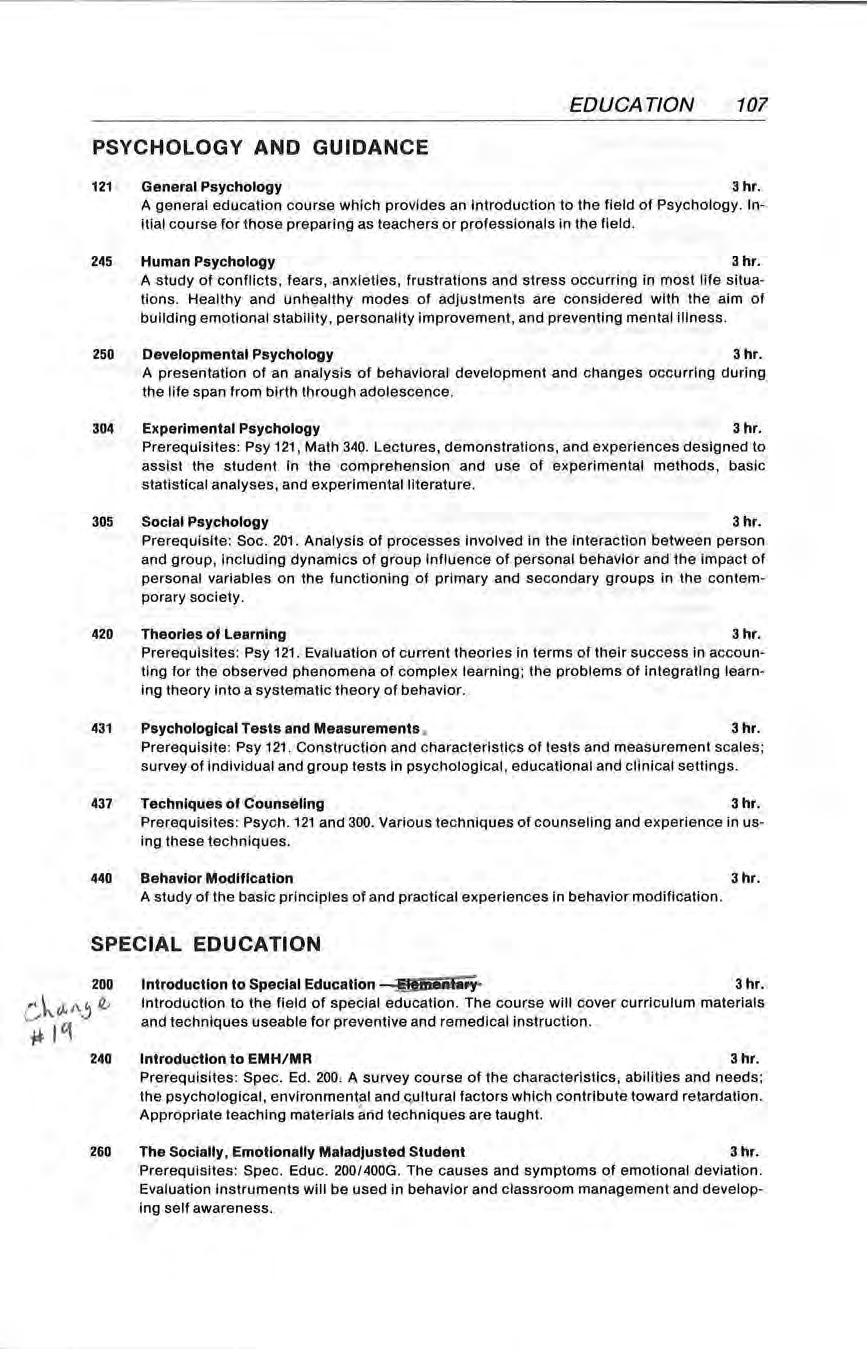
437 Techniques of Counseling
3 hr
Prerequisites: Psych 121 and 300. Various techniques of counseling and experience in using these techniques.
440 _
Behavior Modification
A study of the basic principles of and practical experiences in behavior modification
Introduction to Special Education
240
3 hr.
3 hr.
Introduction to the field of special education. The course will cover curriculum materials and techniques useable for preventive and remedlcal instruction.
Introduction to EMH/MR
3 hr.
Prerequisites: Spec Ed. 200, A survey course of the characteristics, abilities and needs; the psychological , environmen\al and c;,u ltural factors which contribute toward retardation. Appropriate teaching mater i als rid techniques are taught.
260 The Socially , Emotionally Mal adjusted Student
3 hr.
Prerequisites : Spec. Educ 2001400G The causes and symptoms of emotional deviation. Evaluation instruments will be used in behavior and classroom management and developing self awareness
331 The Gifted Child
3 hr.
Prerequisite : SpEd 240. Introduction to materials and techniques for identifying and helping to understand the specific developmental needs of gifted pupils and understand types of learning tasks and how to evaluate achievement with them.
350 Diagnosis and Remediation
3 hr.
Prerequisites: Spec. Ed 200/400. A survey course of diagnostic instruments and their uses for appropriate placement and remediation. The student will use and administer the instruments
420 Special Learning Dlsabllitles
3 hr.
Designed to prepare teachers to adjust instructional strategies and to use teachermaterials in order to overcome social, emotional , psychological, physiological and educational deficiencies of children In the academic area
Methods and Materials In Special Education f \,t, ""'-
3 hr.
Prerequisite : Sp Ed 240. A course in developing appropriate materials in the major area of academic study. Emphasis will be on developing knowledge, skills and techniques for successfully teaching in the special education classroom
Student Teaching (Exceptional Children) - el e, l'V\.
4 hr.
Prerequisite : Approval. Observation, laboratory and teaching experience in the special education classroom The student assumes full teaching responsibility
436 Student Teaching (Resource Room)
4, 8 hrs.
Prerequisite : Approval and completion of Special Education program. Observation , laboratory, and teaching experience in the resource room. The student assumes full teaching responsibility for four or eight weeks - experiences the problems involved in the teaching of the special education child assigned to the resource room
J-8 ~rJ ( 4 /tr.f j? €r',1.;l'tJ)
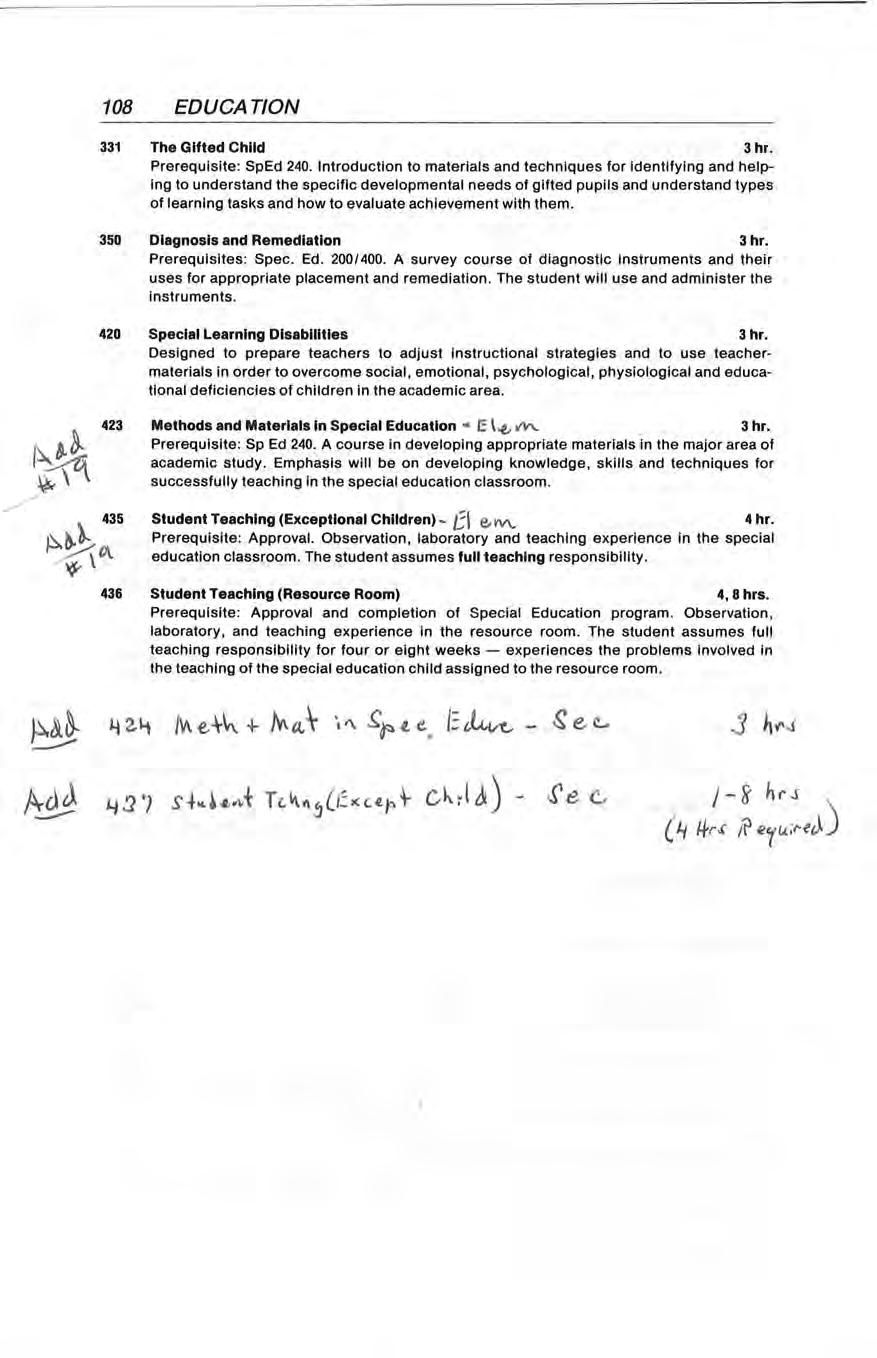
A study of the principles of clear and effective expression as applied to the sentence, paragraph , and the whole composition. A review of grammar, mechanics, and correct usage Training in organization, and the writing of short and long papers Required course for all freshmen. (Note : Students who rank at the 85th percentile or higher on the English portion of the ACT may be excused from Eng. 101.)

3 hr .
General education requirement designed to increase the student's appreciation with emphasis on modern forms.
Children's Literature
3 hr.
A survey of children's literature tracing the history from earliest times to modern literature.
Advanced Writing --::ffi r.
Special project for third hour Study of description, narration, exposition, and poetry as rhetorical forms with extensive practice in writing.
The Hellenic-Hebraic Tradition
3 hr.
Prerequisite: English 202. An introduction to the roots of English Literature in Greek, Roman, and Hebrew literature.
Short Story 2 hr.
Major emphasis on the development of the short story in America .
Traditional Grammar
2 hr. Designed to provide students with a sound and comprehensive knowledge of traditional grammar : nomenclature, punctuation, sentence , and analysis
302 English Composition
3 hr.
Prerequisite: Eng 101 and junior standing. Further training in theme writing, with emphasis on organization and research, practice in the use of logic, and evidence to support generalizations. Required course for all juniors.
3 hr.
A study in the relationship of such factors as the study of grammar, reading level, and listening skills to a student ' s ability to write effectively Nebraska Literature
Prerequisite: Consent of the department An introduction to the works of Nebraska writers and literature about Nebraska.
Seminar In the Modern Novel 2 hr.
The study of modern fiction as it mirrors the philosophical, sociological, psychological, and scientific thought of the tw i mtieth entury
Chaucer 2 hr.
The Fourteenth Century as revealed by Chaucer and his contemporaries.
Neo-Classlcal Writers
The philosophy and esthetics of the eighteenth century as reflected in the major writers.
321 322
Romantic Period
3 hr.
Characteristics of Romantic Period writers, as reflected in Pre-Romantics, such as Blake and Burns Chief emphasis is on the major Romantic poets, with some attention to the novel and the Ballard Revival.
Continental World Literature
323 324 325
3 hr.
Emphasis on a few major pieces of continental literature (chiefly novel) from the Renaissance to the present. A study of the writer as thinker and the literature as a mirror of the times Dostoevsky, Tolstoy , Flaubert , Voltaire, Mann, and Cervantes are among the authors studied.
Victorian Period
3 hr.
Nineteenth century England as seen by her major poets and novelists; some attention given to prose writers.
American Literature I
3 hr.
An historical survey of significant American writing from the Colonial Period to 1865 Major writers receive chief emphasis
American Literature II
A continuation of English 324 from 1865 to the present
328 Modern Poetry
3 hr.
2 hr.
A study of British and American poetry of this century and its relevance to contemporary literature and life
405 Teaching English and Speech
2 hr.
This course is a study of the aims, objectives , and scope of English and speech in the curriculum Resources such as textbooks, film lists, special equipment , records , charts, and tests are examined and evaluated Recent teaching techniques are explored.
418 Shakespeare
A study of representative plays and son /l ets. (Credited as either English or Speech )

425 Modern Grammar and Linguistics
3 hr.
3 hr.
An introduction to historical, descriptive, and structural linguistics as an aid to the understand i ng of modern concepts and philosophies of grammar.
440 History of the English Language
2 hr.
A study of the growth of modern English through examination of changes in the sounds , forms and syntax that have occurred in the language and the development of vocabulary.
441 Pre-Shakespearean Drama
3 hr.
The development of drama and theatre through classical and native channels to their culmination in Elizabethan drama (Credited as either English or Speech.)
442 Post-Shakespearean Drama
3 hr. Focus is on the major dramatists since Shakespeare. (Credited as either English or Speech )
450 Directed Studies in English
1-3 hr. Open to juniors and seniors Designed to enable the student to independently investigate a particular area of interest, esp eciall y when the area is not covered by one of the formal courses.
226 Photography I
234
2-3 hr
Two hours classwork and two hours of laboratory per week Theory and practice in the basic fundamentals of photography including composition , exposure , lighting, developing , contract printing, and enlarging The third hour credit gained by additional assignments. Each student must have a camera.
Beginning Journallsm
3 hr.
Prerequisite : Ability to type. The fundamental pr i nciples of gathering and writing news; practice in reporting campus news; work on The Pedagoglan, College newspaper.
235 Newspaper Editing
2 hr.
Prerequisite: Journ 234. Credit not to e xceed a total of four hours An intensive course in journalistic desk work that includes copy preparation , headline writing , page layout ; extensive work on The Pedagogian desk.
237 G raphlc Arts
325
3 hr.
Six hours laboratory Study and practice in basic processes of printing and allied industries , including work in letterpress, silkscreen printing , bookbinding, rubberstamp making, and goldleaf stamping
Photography II
2-3 hr.
Lens, testing, infra-red photography , high speed photography , portraiture , use of negative land positive color films , color printing , and oil coloring of prints
329 Advertising
2 hr.
A study of advertisements and media from three viewpoints : management-marketing, communications-creativity , and consumer-citizen.
400 Internship In Journallsm
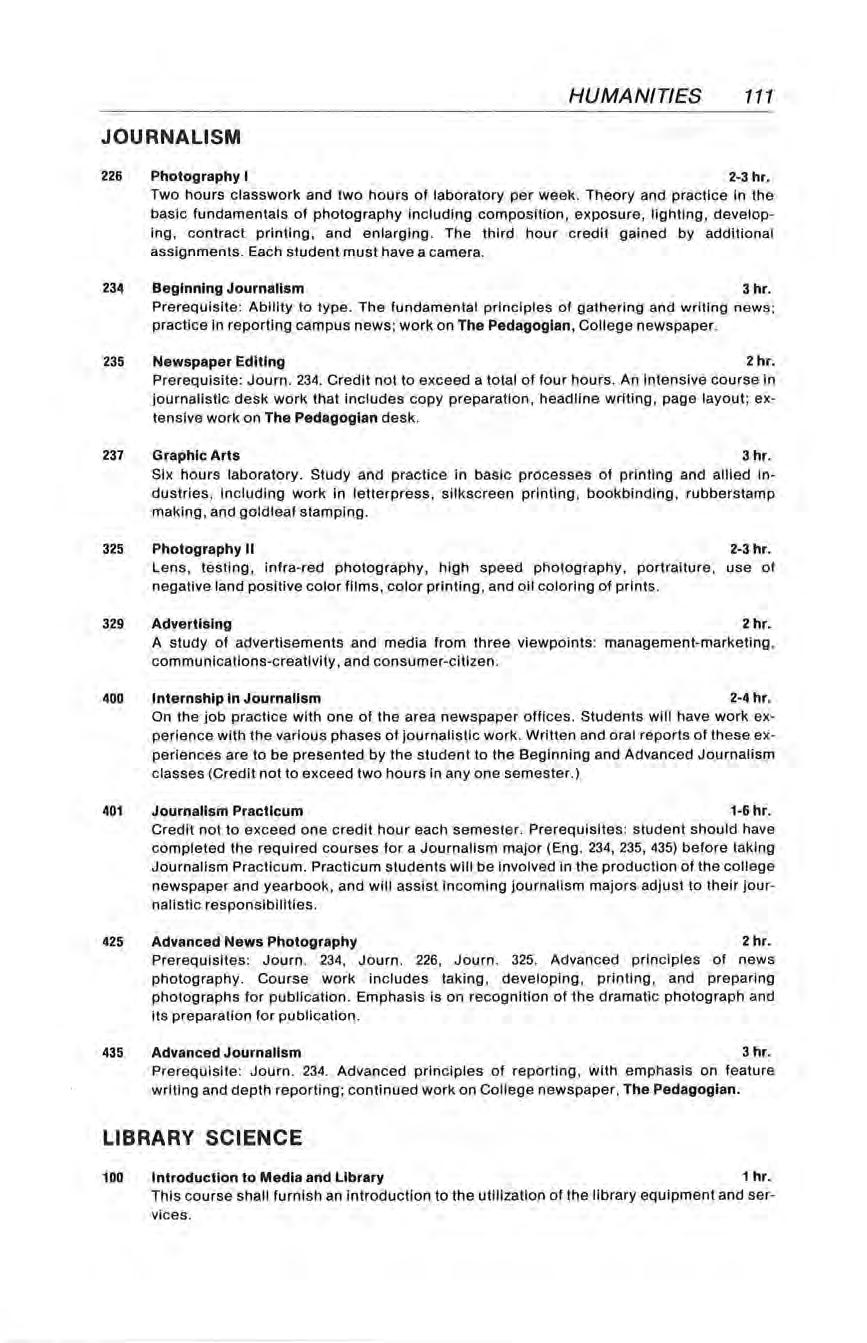
2-4 hr.
On the job practice with one of the area newspaper offi ce s. Students will have work e xpe rience with the various phases of journalistic work Written and oral reports of these e xperiences are to be presented by the student to the Beginning and Advanced Journalism classes (Credit not to exceed two hours in any one semester.)
401
Journallsm Practicum
1-6 hr. Credit not to e xc eed one credit hour each semester. Prerequisites: student should have completed the required courses for a Journalism major (Eng. 234 , 235 , 435) before taking Journalism Practicum Practicum students will be involved in the produ c tion of the college newspaper and yearbook, and will assist incoming journalism majors adjust to their journalistic responsibilities
425 Advanced News Photography
435
2 hr.
Prerequisites: Journ 234 , Journ. 226 , Journ 325. Advanced principles of news photography Course work includes taking, developing , printing , and preparing photographs for publication Emphasis is on recognition of the dramatic photograph and its preparation for publication.
Advanced Journallsm
3 hr.
Prerequisite: Journ 234 Advanced principles of reporting , with emphasis on feature writing and depth reporting; continued work on College newspaper, The Pedagogian .
100 Introduction to Media and Library
1 hr. This course shall furnish an introduction to the utilization of the library equipment and services
100 230
Introduction to Mass Communications
The nature , function, and responsibilities of communications agencies , including newspapers , radio and television, film, and advertising ; the services that the mass media perform for society and the role of the media in censorship , persuasion , and propaganda
Introduction to Dramatic Arts and Crafts
3 hr
An introduction to the types and forms and styles of dramatic production combined with a practical application of production techniques as a means of developing the student's independent appreciation and critical knowledge of the dramatic arts from stage to television.
260 Radio and TV Announcing
275 300 363
3 hr.
An introduction to radio and television as communication media Introduction to modern facilities and practices. Laboratory projects related to both media
FIim Criticism
3 hr.
Prerequisite : Eng 202 or Permission of Instructor. An e xamination of the several points of view from which film may be criticized with emphasis on authorship and techniques of the film-maker
Communications Law
3 hr.
The laws regarding media responsibility , placing the legal problems of media work in a practical context; libel , contempt , constitutional guarantees , access to public records; the invasion of privacy, criticism, and copyright.
Television Production
3 hr.
Prerequisite : MC 261 An individual approach to television production which allows the student to produce and direct his own productions
152 Fundamentals of Speech
3 hr . Each semester and summer
The principles of speech Development of bodily freedom , distinct utterance , and improved oral communication Includes fundamental process of speech c orrection and development , with emphasis on the development of e x cellent speech habits and the diagnosis and treatment of elementary speech defect s
254 Public Speaking
3 hr.
Training in effectiv e methods of adapting composition and delivery of various types of audiences. A study is made of the forms of address, impelling motives, speech e nds , spee c h organization , composition , and delivery Practice is given in gathering , choosing, working and mastering speech materials
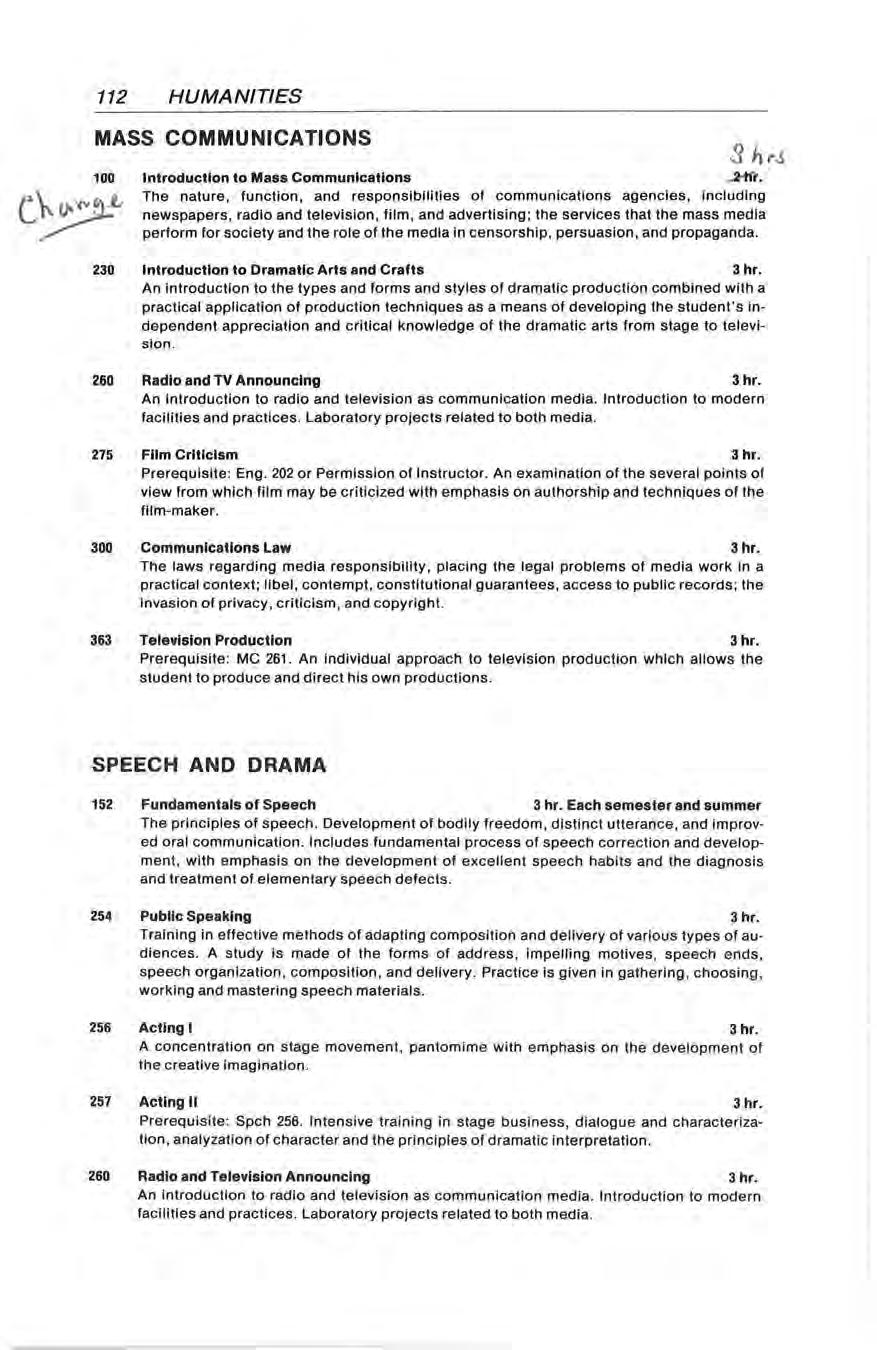
256 Acting I
3 hr
A concentration on stage movement, pantomim e with emphasis on the development of the creative imagination .
257 Acting II
260
3 hr
Prerequisite : Speh 256 Inten s ive t raining in stage busin e s s, dialogu e and characteri zation, analyzation of character and the principles of dramati c interpretation.
Radio and Television Announc i ng
3 hr.
An introduction to radio and television as communication m e dia Introduction to mod e rn facilities and practices Laboratory projects relat e d to both media
300 Summer Theatre Workshop .
3 hrs. credit per s·esslon
Practical training in all aspects of theatre production ; acting set design, lighting, costuming , make-up, improvisation , music, and dancing. Public performance every weekend Offered both sessions , no prerequisites, may be taken· either or both sessions for a total of six hours cre-dit.
327 Light and Sound Design for Stage and Television
3 hr.
Prerequisite : MC 230. Theory an d practice of stage and terevision lighting and sound systems Study of instruments and c·ontrol sys t ems employed in light and sound in various media situations. Study of color in light, its effec-t upon costumes, s c enery and make-up , Acoustical problems analyzed. Planning of fighl and sound plots
350 Contest Speech
1 hr.
Course designed lo prepare students to coach speech contestants , judge· contestants, and manage contests.
353 Speech Correction and Devefopment
3 hr ,
Prerequisites: Spec . Educ , 200 for Education majors only, A survey course emphasizing the unique educatlonal problems and techniques relating to children with sight , sound and speech' deficiencies. The focus is on identification and supporting remediation

355 Pl·ay Production in the Secondary School
3 hr .
A course for the director of dramatics fn schools and communities It arrswers the fundamental questions pertaining to play selection, casting, directing, steps in rehearsal, scenery , lighting, costume , make-up, and busine ss o rganfzation.
357 Interpretative Reading
2 hr. Designed to emphasize meaningful oral reading of worthwhile literature in group and solo situations. The course will includ e close, critical analysis of the practice selections, as well as study and practice of the basic techniques•involved in delivery
360 Scenery an d Costume Design
3 hr.
Prerequisite: MC 230 Theory and practice o f Costume and Scenery Design. Application of the principfes of design as they apply to Scenery and Costumes and the interrelationship of the two design areas. Deve lopment of the scenery and costume design'S through drawings , Sket'ches, color plates and models•
363 Directing I
3 hr
P'rerequisite: Speh. 256 . This course an swers the· fundamental questions pertaining to· play selection, casting, directing , sc enery , lighting costume, and make-up
364 Dire cting II
369
3 hr.
Prerequisite : Speh 256 and 363. Further stuOy in the historica l interpretations of action , and an fnJense practical application of the fundamentals learned in Directirrg· I.
Children's Theatre and Creative Dramatics
3 hr. The study and active participation in the two different concepts of dram a for young people·: Creative Dramatics , in which children with the guidance of an imagi'native reader create scenes or plays and pe rform them using improvised dialogu e and action with personal development as the goal, and Children's Theatre which utilizes· written scripts directed and performed as·a complete· production for child audiences.
400 Theatre· History
3 hr.
This course will examine th'e nature , practice function, and literature of the theatre from its beginnings to the present day The' al!)proach' will' consist of a study of each of the major periods i'n theatre history an' d representative plays of that period.
404 Projects In Communications
1-
3 hr.
Prerequisite: Speh 152 or Speh 2'54. Open io /oniors and senfors for indivicjualiz•ed study projects in speech, Mass Communications or Theatre
101 Prlncfples of Physical Geography
3 hr. An introductory study of the relationships of man and environment, with emphasis placed upon climatic regions of th e world. Two hours lecture , two-hour laboratory.
103 Cultural Geography
3 hr.
The study of the c ultural elements of the landscape , with emphasis on the origin of man, migration , settlement , and the economics of man.
206 Geography of Nebraska and the Great Plains
3 hr.
Prerequisite: Geog. 101. A correlation of the physical and historical base of the state's present agriculture , manufacturing , and service industries
208 World Regional Geography
3 hr.
Prerequisites : Geog 101 and 103 A study of the major regions of the world , with particular attention to how man has utili zed the earth ' s resources from area to area. This co urse is particularly designed for the teacher who ca nnot enroll in a complete geography program. Lecture and lab
300 Geography of Asia
3 hr.
Prerequisites: Geog. 101. A regional study of the major countries of Asia, with emphasis on relief, climate, resources, government , and industrial development.
305 Economic Geography
3 hr.
Prerequisites: Geog. 101 and 103. An analysis of world land resources, agricultural products, forest and marine resources, basic mining industries , manufacturing , trade patterns, and transportation routes.
310 Geography of Africa
3 hr.
Prerequisites: Geog 101 A geographi ca l analysis of the continent. Emphasis is placed upon recent spirit of nationalism and the economic and physical base of selected nations
311 Urban Geography
3 hr. Study of the origin, distribution , internal structure and functions of urban developments, with emphasis on location features of economics and cultural phenomena.
312 Geography of Anglo-America
3 hr.
Prerequisite: Geog. 101 or senior standing. A study of the United States and Canada by natural regions. In each case an evaluation of the physical a nd economic base will be made in the light of present economic development.
313 Geography of South America
326
3 hr.
Prerequisite: Geog 101. The geographic regions of South America analyzed in their natural, political and economic settings. The economic relations between South America and lhe United States.
Conservation of Natural Resources
3 hr.
An evaluation of soil, water, mineral , forestry , fish , air , a nd recreation resources in order to develop an appreciation of their importan ce and the seriousness of the problem
304G Special Problems and Techniques in Geography
2 hr. Designed to provide an opportunity for students to experiment with and learn new techniques in geography instruction based upon individual needs and interest of each student. For teacher education candidates.
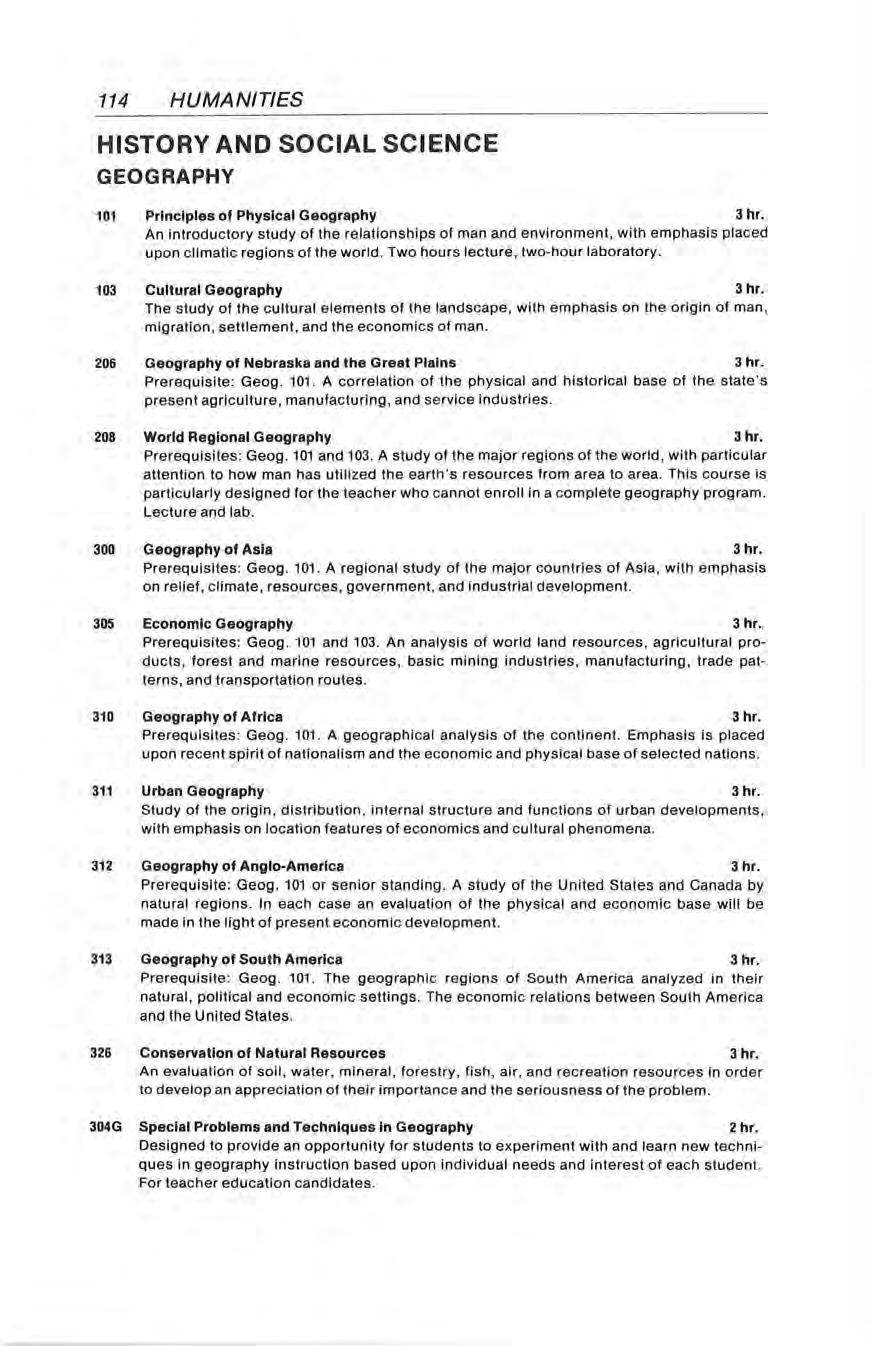
404G History and Philosophy of Geography
2 hr.
Prerequisites: Geog. 101 and 103. A study of the basic philosophies of geography including the study of the history of geographic thought from ancient to modern times
411G Field Geography
2 hr
Prerequisite: Geog. 101. An intensive course of training in the geographic field methods and in the direct application of geographic principles to important problems in selected districts. Two hours lecture , laboratory by arrangeme nt.
470 Independent Study Geography/Geology

1 to 3 hr.
Prerequisite: junior or senior standing, with adequate preparation in the field and the instructor's permission Individual instruction in the techniques of research, with either extensive readings and reports or a term paper required.
494 Current Topics In Geography
3 hr.
A geographic study of current topics generally involving such subjects as pollution , space geography, agricultural geography, geography of transportation , geography of primary production, and rocks and minerals.
495 Regional Topics In Geography
3 hr.
A study of world areas by physical division , with emphasis on the interrelationships between cultural and physical features of each region Course topics selected from the following regions : Middle East, Southeast Asia, U.S.S.R., Asia, Middle America , South America, Australia, and the islands, Eastern Europe and Western Europe.
499G Political Geography
3 hr.
Prerequisites: Geog. 101 and 102. Geography as a factor in the differentiation of political phenomena in various parts of the world. The modern state in relation to its environment and the interrelationship of nations as a result of their geographical strengths and weaknesses
113 American History to 1865
3 hr
Discovery and exploration, colonization , the Revolution, and the U.S. and its problems until the end of the Civil War.
114 American History After 1865
201 202
3 hr.
Reconstruction, the last frontiers , the rise of big business , imperialism, and the role of the U.S. in two World Wars and their aftermaths.
World Civilization to 1500
3 hr.
A survey of the beginnings of civilizations in the great river valleys and their diffusion to later civilizations in the Middle East and Europe. Particular attention will be given to the cultural and political institutions of the West, which furnish our own cultural heritage.
World Civilization After 1500
3 hr. The rise and decline of European predominance will be analyzed, with emphasis upon the major social, political, and economic ideologies and institutions that evolved.
299 Historiography
3 hrs.
Techniques of Historical Research This course deals with the following : Distinguishing between primary and secondary source material , the art of collecting historical evidence , and the writing of the paper.
301 Colonial America
3 hr.
Colonial rivalry between the Spanish, French, English , and Dutch in North America, the Revolution, and U S. history to 1823.
302 U.S. In the Nineteenth Century
3 hr. The U.S. from 1823 through Manifest Destiny and the Civil War down to the War with Spain.
303 U.S. in the Twentieth Century
3 hr. The U.S. in modern times, with emphasis upon the changing social and economic theories of the period, and the internal forces that influenced its development.
329 History of Nebraska
333
2-3 hr.
A survey of the political , economic, social , and constitutional development of Nebraska from prehistoric times to the present Latin America
3 hr.
The evolution of the states of modern Latin America following their independence, their political and economic development and their international relations.
343 English History from 1688
2 hr.
A survey of the social, political, and economic development of England since the Glorious Revolution. Covers the social and religious impact on the development of the English Parliamentary system , the effects of the Industrial Revolution upon the British Empire, and the prospects of the modern welfare state of contemporary England.
344 Social and Cultural Europe 1500-1815
3 hr.
An historical description and analysis of European Society and culture from the Renaissance to the Congress of Vienna. Particular attention will be given to correlate the fine arts and literature to the rise of national states , absolutism, and religious developments.
345 Modern Europe
361 400
3 hr.
A comparative historical analysis of the ongoing process of modernization in Europe. Emphasis on movements and institutions such as Liberalism, Conservatism , Romanticism, Socialism , Imperialism, and Totalitarianism.
Non-Western Civilizations
3 hr.
A broad survey of the Soviet Union and of the principal areas of the Middle East, Asia, and Africa , with particular emphasis on contemporary social, political and economic developments
Methods In History and Social Science
Instruction in the methods of teaching high school history and social sciences.
411G American Frontier
2 hr.
3 hr.
The importance of the frontier in American history from colonial times to the 20th Century
426G American Constitutional Law
3 hr.
Prerequisite: Pol. Sci. 201 or 202 or instructor ' s permission. A study of the historical and political context of the cases Traces constitutional doctrine through major decisions. Emphasis on constitutional growth that relates closely to the fundamental structure of the American government and social order.
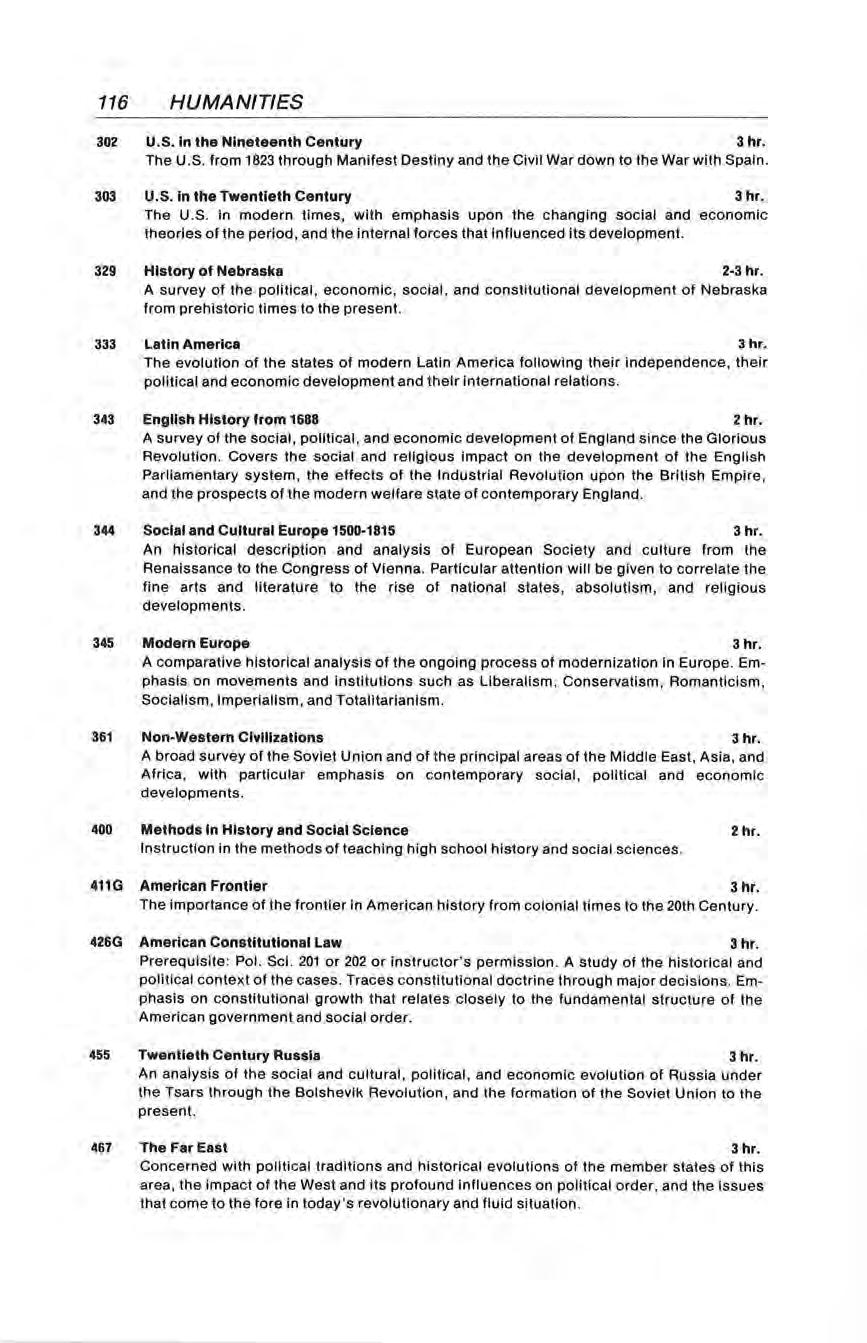
455 Twentieth Century Russia
3 hr.
An analysis of the social and cultural, political, and economic evolution of Russia under the Tsars through the Bolshevik Revolution, and the formation of the Soviet Union to the present.
467
The Far East
3 hr .
Concerned with political traditions and historical evoluiions of the member States of this area , the impact of the West and its profound influences on political order , and the issues that come to the fore in today ' s revo lutionary and iluid situation
470 Independent Study In History
1 to 3 hr.
Prerequisite: junior or senior standing, with adequate preparation in the field and instructor ' s permission Individual instruction in the techniques of historical research , with either extensive readings and reports or a term paper required
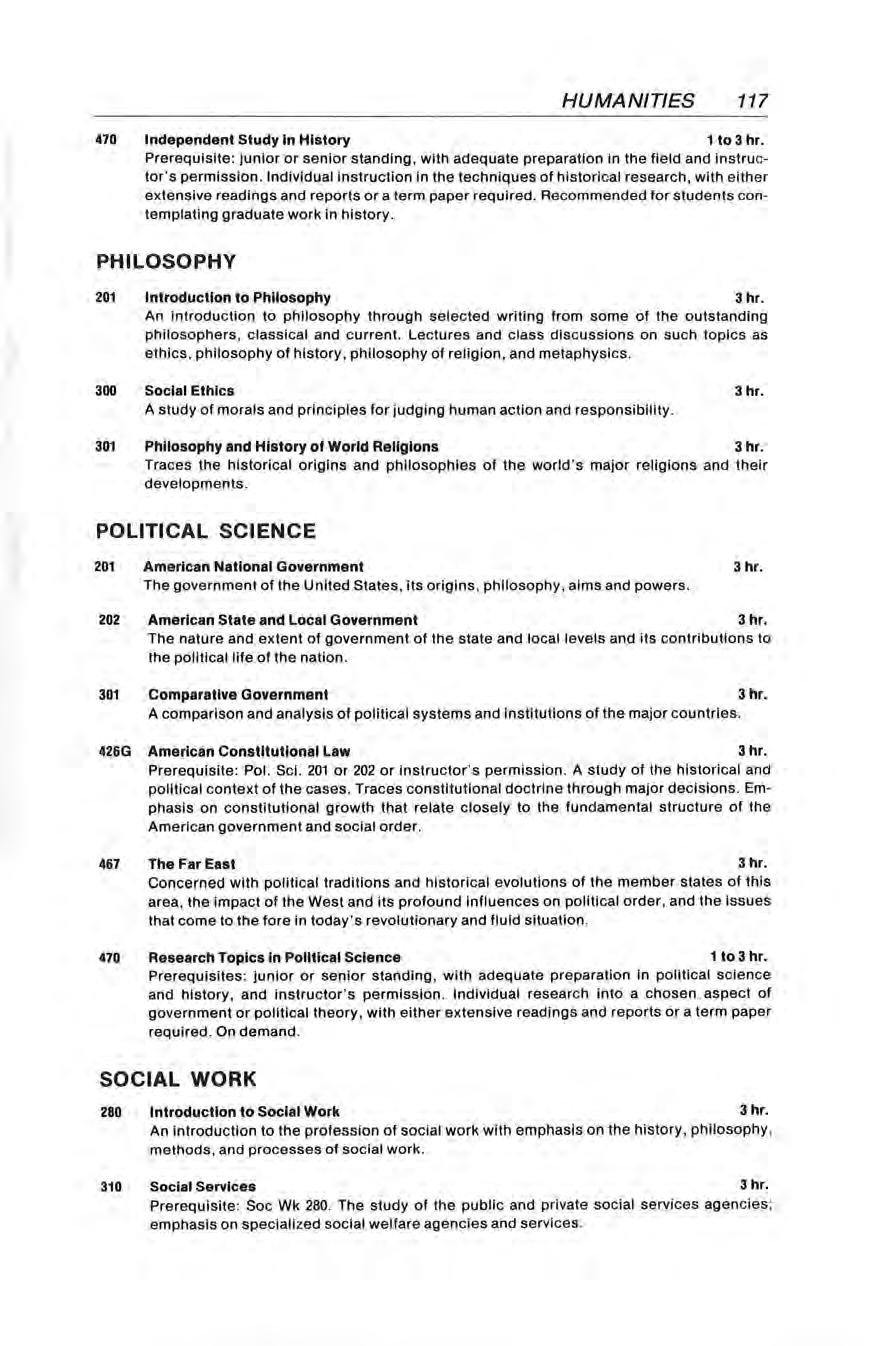
Recommended for students contemplating graduate work in history .
201 Introduction to Philosophy
3 hr.
An introduction to philosophy through selected writing from some of the outstanding philosophers , classical and current. Lectures and class discussions on such topics as ethics, philosophy of history, philosophy of religion, and metaphysics.
300
Social Ethics
A study of morals and principles for judging human action and responsibility.
301 Philosophy and History of World Religions
3 hr.
3 hr.
Traces the historical origins and philosophies of the world's major religions and their developments.
201 202
American National Government
The government of the United States, its origins, philosophy , aims and powers
American State and Local Government
3 hr.
3 hr.
The nature and extent of government of the state and local levels and its contributions to the political life of the nation
301 Comparative Government
A comparison and analysis of political systems and institutions of the major countries
3 hr.
426G American Constitutional Law
Prerequisite: Pol. Sci. 201 or 202 or instructor's permission
A study of the historical and political context of the cases. Traces constitutional doctrine through major decisions. Emphasis on constitutional growth that relate closely to the fundamental structure of the American government and social order
The Far East
3 hr.
3 hr. 467
Concerned with political traditions and historical evolutions of the member states of this area, the impact of the West and its profound influences on political order, and the issues that come to the fore in today's revoluti'onary and fluid situation
470 Research Topics In Political Science
1 to 3 hr.
Prerequisites: junior or senior standing , with adequate preparation in- political science and history, and instructor's permission Individual research into a chosen aspect of government or political theory, with either extensive readings and reports or a term paper required. On demand.
280 310
Introduction to Social Work
3 hr.
An introduction to the profession of social work with emphasis on the history, philosophy, methods, and processes of social work
Social Services
3 hr.
Prerequisite : Soc Wk 280. The study of the public and private social services agencies; emphasis on specialized social welfare agencies and services.
375 Casework
2 hr.
Prerequisite : Soc Wk 280. The art, theory , and practice of the dynami cs of casework with emphasis on current social work techniques us e d in m eet ing group and individual n eeds.

390 Group Work
430
2 hr.
Prerequisite : Soc Wk 280. The theory and practice of the dynamics of group work , with emphasis on techniques used in meeting group and individual needs
Field Work Practicum
Prerequisite : 10 hours Soc Wk and permission . Supervised experience in social work .
100 Social Science
3 hr.
3 hr.
An integrated, interdisciplinary survey course in the social sciences designed to cover c urrent topics from different social science perspectives. The course will be team-taught by the history and social science instru cto rs
201 Principles of Sociology
3 hr.
Culture and its rela)ions to specific social problems. The social institutions of American life in relation to population c hanges , ethnic groups and major problems of social policy. The social consequences of social control in the metropolitan world .
225 Introduction to Anthropology
3 hr.
The nature and scope of anthropology : origins of man and the concept of man as a cultural being Parti c ular emphasis is placed upon fossil man and pre -h istory
250 Community Organization
3 hr .
Prerequisite : Soc. 201. Major differentiating characteristics, with s pe c ial e mphasis on the urban community , basic patterns of soci a l and ecological organization , and factor s contributing to co mmunity integration and disorganization
260 Rural Sociology
3 hr.
Pr ere quisite : Soc 201. An examination of rural societies, rural background and c haracteristics; an analysis of rural groups, institutions and changes and problems of rural-urban relations .
300 Contemporary Social Problems
3 hr.
A seminar in which a student selects a specific contemporary social issue for research and analysis. Res ea r c h reports are pr ese nted to and discussed by the members of the seminar
305
Social Psychology
3 hr.
Prerequisite : Soc. 201 . Analysis of pro cesses involved i n the int e ra ct ion between p erso n and group, including the dynamics of group influence on personal behavior and the impact of personal variables on the functioning of primary and secondary groups in co ntemporary society.
340 The Family
360
3 hr.
Prerequisite : Soc 201 The role of the family in contemporary society, factors influencing trends in family structure, functions , roles, stability, and their impli ca tions for both the co mmunity and individuals at varying stages of the family life cycle.
Corrections & Preventions
3 hr. Theory and methods of dealing with c riminal s and juvenile delinquents; analysis of c urrent correctional programs.
370
Ethnic-Group Relations
3 hr.
Prerequisite : Soc. 201 The nature of minority groups and their distribution in American society; and an examination of the melting pot co ncept vs the pluralisti c society.
420 History and Introduction to Modern Sociological Theory
3 hr.
Prerequisite: Soc 201. and permission An overview of the earlier sociological theorists and their contributions to current sociological theories.
450 Methods of Sociological Research
3 hr .
Prerequis ite: Soc. 201. Analysis and applications of methods of sociological research with emphasis on nonparametric statistics.
470 Independent Study In Sociology

1-3 hr.
Prerequisite: Soc. 201 and permission. Topics to be c hosen and investigated in co nsultation.with individual instructor.
101 General Biology (Plant)
Two hours classwork Two or three hours laboratory A basic course in botany.
102 General Biology (Animal)

Two hours classwork. Two or three hours laboratory A basic course in zool ogy
103 Care and Use of House Plants
Slipping , planting , caring for , cutting , and arranging house plants
203 Invertebrate Zoology
3 hr.
3 hr.
1 hr.
3 hr.
Prerequisite : Biology 102. Two hours classwork and two or three hours laboratory Structure, classification, and relationship of the invertebrate animals
301 Microbiology
4 hr.
Prerequisite : Biology 101, Chemistry 101 and 102. Two hours classwork and four hours of laboratory per week An introduction to microbiology
304 Comparative Anatomy
3 hr.
Prerequisites : Biology 102 and 203 or permission Two hours classwork and two to three hours of laboratory per week The anatomy of the shark , salamander, and cat.
305 Human Anatomy
A study of the digestive tracts , nervous , circulatory , skeletal, and respiratory systems.
306 Morphology of the Lower Plants
1 hr
3 hr.
Prerequisite : Biology 101 Two hours classwork, two or th r ee hours laboratory Structure , anatomy and form of the lower plants, and t heir effects on man.
307 Morphology of the Seed Plants
3 hr.
Prerequisites : Biology 101 and 306 Two hours classwork , two to three hours laboratory Form and structure of the seed plants and their economic value.
Human Environment
3 hr.
A study of man ' s significant achievements in his struggle against the environment , his multifaceted pollution problems brought on by crowded cities, depletion of natural resources , and his genetic origin.
Evolutionary Theory
1-2 hr
A cou rse designed to acq uain t the student with the various theories regarding evolution.
Histological Techniques
3 hr.
Prerequisite : Biol 405. Two hours classwork/laboratory per week Course designed to acquaint the student with staining techniques Animals will be dissected, slides made from their tissue and studied
404G Genetics
Prerequisite : 15 hours of biology. Three hours c l asswork The principles of heredity.
405G Histology
3 hr.
3 hr.
Prerequisite : 15 hours of biology One hour classwork and at l east four hours of laboratory per week. A detailed study of the micros copic anatomy of mammalian organs.
406G Embryology
3 hr.
Prerequisite : 15 hours of selected biology courses Two hours c lasswork and three or more hours of laboratory Embryology as exe mp lified by t h e frog , the chick , the pig, and man .
407 Human Physiology
3 hr
Prerequisite : At least two courses in animal biology. A detailed study of functions of human organs
408G Modern Biology
Three hours classwork and demonstrations
409 Plan t Phys lo logy
3 hr.
Prerequisite: 15 semester hours of biology
3 hr .
Study of the function and structure of the different living plant cells, their control mechanisms , and how they operate under the chemical and physical laws .
417G Ecology
Three hours classwork A study of organisms in relation to their environments.
450 Environmental Biology
3 hr
3 hr.
A study of the effects of population growth on the earth's resources and environment. An overview of the needs of man to adapt to changes resulting from biotic and abiotic factors.
General Chemistry
4 hr
Three hours of classwork and two hours of laboratory per week An introduction to the fundamentals of chemistry, including atomic theory , c hemical bonding, stoichiometry , solutions and pH
General Chemistry
4 hr.
Prerequisite : Chem 101. Three hours of classwork and two hours of laboratory per week. Application of the fundamentals of chemistry , including states of matter , oxidationreduction, thermochemist r y , chemical equilibrium , kinetics , nuclear chemistry , descriptive inorganic chemistry.
142 Introductory Organic and Biochemistry
4 hr.
Three hours classwork, two hours laboratory. A terminal course in organic and bio c hemistry.
205 Principles of Qualitative Analysis

4 hr.
Prerequisite: Chem i stry 102. Two hours classwork, si x hours laboratory. Principles of qualitative analysis and their application in the laboratory.
206 Principles of Quantitative Analysis
4 hr .
Prerequisite: Chemistry 205 Two hours classwork , si x hours laboratory Principles of quantitative analysis and their application in the laboratory.
303 Organic Chemistry
4 hr.
Prerequisite: Chemistry 102 Three hours c lasswork, thr e e hours laboratory Compounds of the aliphatic series
304 Organic Chemistry
4 hr
Prerequisite: Chemistry 303 Three hours of classwork , three hours of laboratory. A continuation of Chemistry 303 with further intensive study of aromatic series, dyes , hormones , vitamins and drugs
310 History and Lit e rature of Chemist r y
1-4 hr.
Prerequisite: 13 hours of approved chemistry. The work to be done under guidance of the instructor through a series of conferences and reports
312 Physical Chemistry
3 hr.
Prerequisite : Physics 201 and 202. Chemistry 102 and 206 Physical laws of chemistry and their application in the laboratory. Three hours classwork
431 Biochemistry
3 hr.
Prerequisite: Chem 304. Three hours classwork. The chemical foundations of molecular biology with emphasis on the molecular aspects of intermediary metabolism
100 Physics
3 hr.
A study of optics, light and sound, and the mechanics of simple machines Designed for biology , medical technology, and pre - nursing.
201 Biological Science
3 hr.
Two hours classwork and two to three hours of laboratory per week. An integrated course covering the various phases of natural science.
202 Physical Science
3 hr.
Two hours of classwork and two or three hours of laboratory per week. An integrated course covering the various phases of physi ca l science.
205 The Principles of Biological Sciences
3 hr.
An integrated course specifically designed for the non -sc ience student, covering the various phases of man's biotic world , by a variety of learning experiences in demonstrations, experimentation and visual aids Does not apply on the major or support in biology.
206 The Principles of Physical Science
3 hr.
An integrated course specifically designed for the non-science student , covering the various phases of man ' s physical and chemical world Ex periences in a variety of learning situations, such as demonstrations, experiments, instructional television , and other visual aids. Does not apply on the major or support in physical science.
207 The Inquiry Science of Middle School Teachers
3 hr.
M e thods , techniques, and academic information employed by teachers in carrying out a lab - learning situation in the middle sch q ol.
232 Energy
301
3 hr
A study of energy resources. Attention will be focused on both nuclear and conventional power stations, design operation, cost, governmental regulations, safety and environmental effects Field trips to nuclear and conventional generation stations are required
Earth Science
3 hr.
Prerequisite: Junior or senior standing , 6 hours of laboratory science. A course dealing with the physical aspects of our environment, including astronomy, climatology, meterology , geology , and oceanography
421 Independent Study In General Science
1 hr
Permit students to do advanced work in the various fields of science and math , thus promoting extensive individual study. Permission must be given by the instructor.
430G Environmental Science
3 hr.
A workshop designed to provide an understanding of the ecological problems of confronting modern man and proprosed techniques for their solution
'
476 ~ Methods of Teaching Science arid Mathematics
2 hr. Objectives, content and methods of classroom and laboratory teaching techniques Class st"" taught by team of instructors in science and mathematics
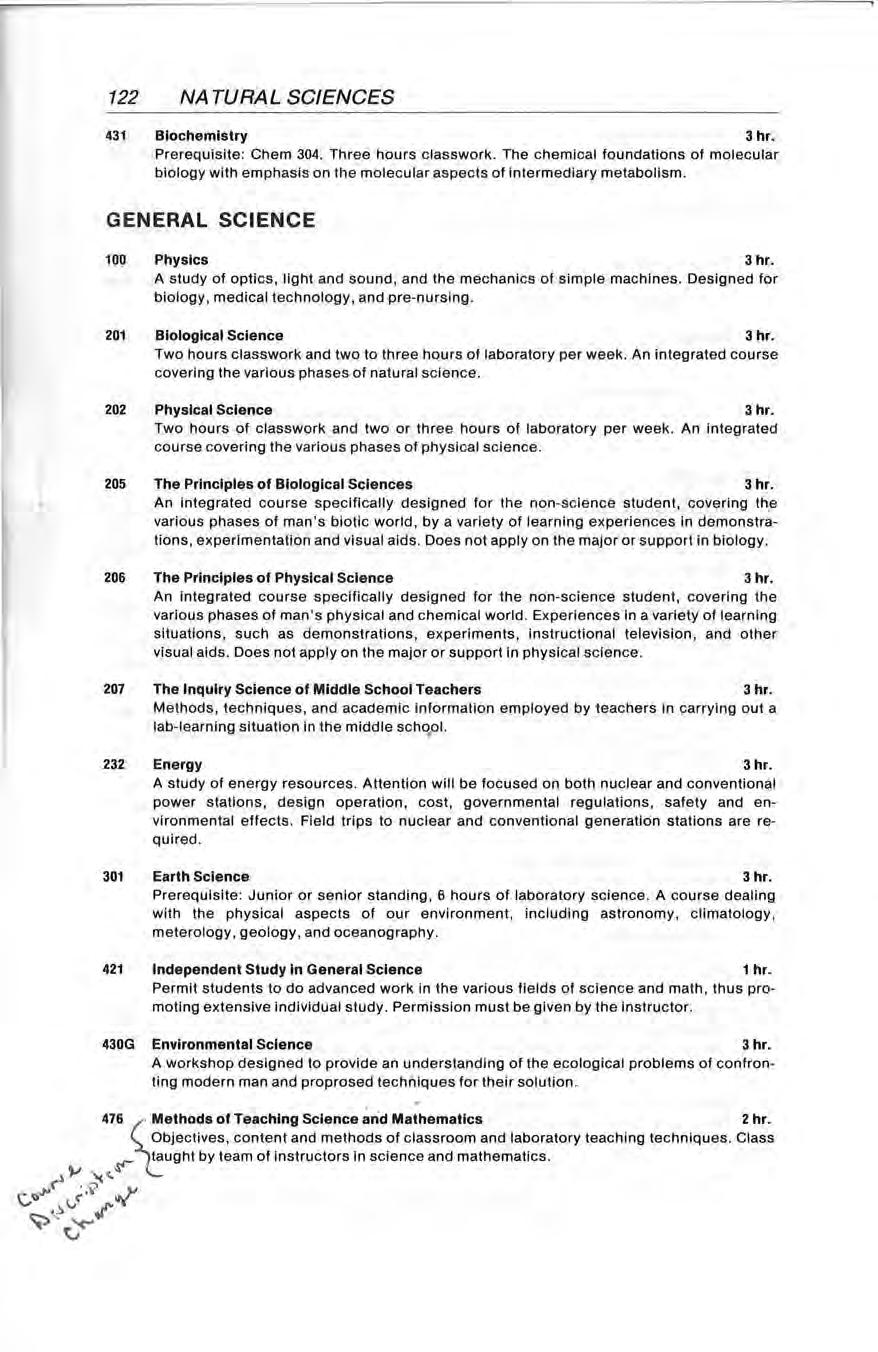
499G Aerospace Science
3 or 4 hr.
A workshop designed to provide an understanding of aerospace developments which are vital to our social, economic, and political environment. The fourth hour consists of oral instruction, briefing, and dual flight instruction
201 Physical Geology
202
203
4 hr.
An introduction to the theories of the earth's origin, the study of the earth ' s structure and materials with special emphasis on rocks, minerals, an'd landforms. Two hours lecture , Four hours laboratory.
Rock and Minerals
1-3 hr.
An introductory course to the study of the physical properties of rocks and minerals; stressing field work at mineral and rock localities in S E Nebraska

Introduction to Fossils
1-3 hr.
An introductory course to methods of interpreting the fossil record; fossils as evidence of the history of life; evolution of form structure, mainly in the study of invertebrate species; through actual field work at fossil localities in S E Nebraska.
301 Historical Geology
4 hr.
Geological history of the earth and the evolution of its animal and plant inhabitants Will include work at fossil localities in S. E. Nebraska, utilizing stratigraphic methods. Three lecture periods, one two-hour lab.
304 Meteorology and Climatology
3 hr
The physical factors influencing the climate with practical work in interpreting meteorological records and forecasting. Two hours lecture, two hours laboratory.
315 Physiography of the United States
4 hr.
Prerequisites: Geog. 101 and 103. A regional study of landform provinces , with special emphasis on the relationship between landforms, climate, soils, vegetation, and mineral resources. Three hours lecture, two hours laboratory.
10 Elementary Descriptive Statistics
20
1 hr.
Organization and representation of data. Normal distribution, measures of central tendency, and variation Prerequisite: Non-mathematics major or minor.
Probability
1 hr.
Permutations, combinations , probability , odds , and games of chance. Prerequisite : Nonmathematics major or minor.
30 Logic and Sets
1 hr.
Statements truth tables , connectives, symbolic proofs, and relationship of logic and sets.
Prerequisite: Non-mathematics major or minor
40 Geometry
1 hr.
Prerequisite: Non-mathematics major or minor. The study of geomet ric concepts from an intuitive approach
50 Practical Trigonometry
1 hr
Prerequisite : Non-mathematics major or minor. Right triangle trigonometry , law of sines , law of cosines, and applied problems.
60 Surveying
1 hr.
Prerequisite : Math 50 or equivalent Fundamental theory and practice , use of transit, U .S. Public Land Surveys and field office work. Will be co unted toward a mat h major or minor 70 Slide Rule and Logarithms
1 hr. This course gives the student skill in the use of the slide rule and logarithms Recommended for science majors. Can be used on a math minor or major
1 hr.
Prerequisite : Non-mathematics major or minor. A co urse of mathematical reasoning , sequences, functions, and graphs Metric System
1 hr. A study of the development, advantages, and us e of the metri c system.
3 hr.
A review of the four fundamental operations of arithmetic applied to whole numbers , fractions, and decimals; applications of percentage; computing interest and discounting notes ; consumer credit; cash and trade discount; computing markup, retail and commission; marking goods; the arithmetic of payrolls.
3 hr.
Prerequisite : one year of high school algebra For terminal students or those who specifically need algebra in certain pre-professional programs. Fundamental algebraic principles and subsequence algebraic processes This course not to be taken for credit by students who have completed Math. 105.

3 hr.
An introduction to the concepts and basic features of electronic computers. An overview of the makeup of computer systems and of the structure and usage of compute r languages is presented. FORTRAN IV is used to illustrate the course and give the student direct computer experience.
Precalculus Mathematics
5 hr.
A course intended for the student who plans to pursue a college program requiring a substantial amount of training in mathemati cs. The content of this course includes an introduction to symbolic logi c and set theory of applications, a study of the number system, elementary theory of groups and fields, an introduction to the function concert, and study of algebraic functions
Precalculus Mathematics
5 hr.
Prerequisite : Math 105. Content includes the study of trigonometric, exponential and logarithmic functions, and introduction to analytic geometry, and some calculus.
Basic Concepts of Mathematics
3 hr.
An introdu ctio n to the various numb er bases and the development of co ncepts fundamental to each. Other topics included are : elementary set theory, algebra, geometry , and problems related to the field of business; does not appy on the mathematics major.
204 FORTRAN Programming
3 hr.
Prerequisite : Math 102 or consent of instructor. The FORTRAN IV Language and its ap-· plication to problem solving is discussed in detail. The student's work includes analyzing a problem and developing a program relative to this field of interest. Second semester
300 Algebraic and Geometrical Concepts
3 hr
Prerequisite: Math 200 or permission. A course dealing with algebraic and geometrical concepts Specific topics include logic , sets , positive and negative numbers, equations and inequalities. Geometric phrases include measurements , space , plane, line and properties of such closed curves as the triangle, rectangle, and circle, as well as other figures with their properties developed intuitively; does not apply on the mathematics major.
304 Modern Geometry
3 hr
Prerequisite : 10 hours of mathematics. A course designed primarily to prepare mathematics teachers for dealing with a modern high school mathematics program A point set approach to geometry
309 Calculus with Analytic Geometry
5 hr .
Prerequisite : Math 105 and 106 or equivalent. The course includes the study of analytic geometry , functions, limits, continuity, velocity , differentiation , inverse or differentiation, second derivatives , maxima and minima , as well as other related topics
310 Calculus with Analytic Geometry
312
340
5 hr.
Prerequisite : Math 309 or equivalent Topics include trigonometric functions , antiderivatives, the definite integral, three-dimensional figures, integration , polar coordinates, and related topics .
Calculus Ill
3hr.
Prerequisites : Math 309 and 310 or equivalent Designed to give the student a review of calculus and applying it for complex problems in mathematics
Statistics
3 hr.
A study of the methods of summarizing and interpreting data, elementary probability, and its relation to distributions. The meanings, importance , and applications of the normal and binomical distributions The methods of random sampling, testing of hypotheses , analysis of paired data, and interpretation of standardized test scores
406 Modern Algebra
3 hr.
Prerequisites: Math 105 , 106, 309, and 310 or equivalent. A study of various algebraic systems arising in modern mathematical computations Control includes a study of sets, mappings and operations, relations, development of real numbers systems , integral domains and fields, polynomial domains, and complex number field

407 Modern Algebra
3 hr.
Continuation of Math 406. A study of groups, vector spaces, linear transformations and matrices , linear equations and determinants, linear algebras, rings and Boolean algebras
416 Differential Equations
3 hr.
Formation of differential equations , equations of high order, linear equation with constant and variable co-efficients , partial differentiation, application of geometry, mechanics, and physics. Students must have proficiency in calculus .
417G Introduction to Real Analysis
3 hr.
Prerequisite : Math 310. Topics included are number , limits, convergence , continuity differentiability, the Reimann integral, sequences, series, and special functions of the Real Calculus.
418G Linear Algebra
3 hr.
The theory of linear transformations in vector spaces, the representation of linear spaces in matrices, linear functionals , and the application of these concepts .
419G Topology
3 hr .
A modern treatment of topology with emphasis on fundamental concepts and principal results of homology theory, topological spaces, linear graphs , set theory, metri c interpretation , as well as other related topics.
201 General Physics
4 hr
Prerequisite : Mathemati cs 105. Three hours classwork, two hours laboratory. Mechanics , sound, and h ea t.
202 General Physics
4 hr
Prerequisite : Physics 201 or permission Three hours classwork, two hour laboratory. Light , electricity, and magnetism.
302 Analytical Mechanics
3 hr.
Prerequisite : Physi cs 202 and Math 310 The development of the prin c iples of mechanics by the use of calculus and vector analysis.
304 Elements of Optics
306
4 hr.
Prerequisite: Physics 202 Three hours classwork, two hours laboratory. Geometrical optics, physical optics, quantum op tics, optical instruments, and polarization
Astronomy
3 hr .
A basic course dealing with a study of the heavenly bodies , the solar system, and the universe Telescopic observation is a part of this co urse
307 Introduction to Modern Physics
310
4 hr.
Prerequisites: Physics 202 and Chemist ry 101. Three hours classwork, two hours laboratory , Atomic and nuclear relativity Bohr theory , quantum theory, X-rays, nuclear instruments, radioa ct ivity, nuclear reactions, a nd elementary particles
History and Literature of Physics
1-2 hr. Work to be done under the guidance of the instructor through a series of reports and conferences. Each semester and summer.
328 Electrical Technology II
3 hr
A study of the principles of application of electronics and their application in circuits, test equipment vacuum tubes , transistors , radio , and television
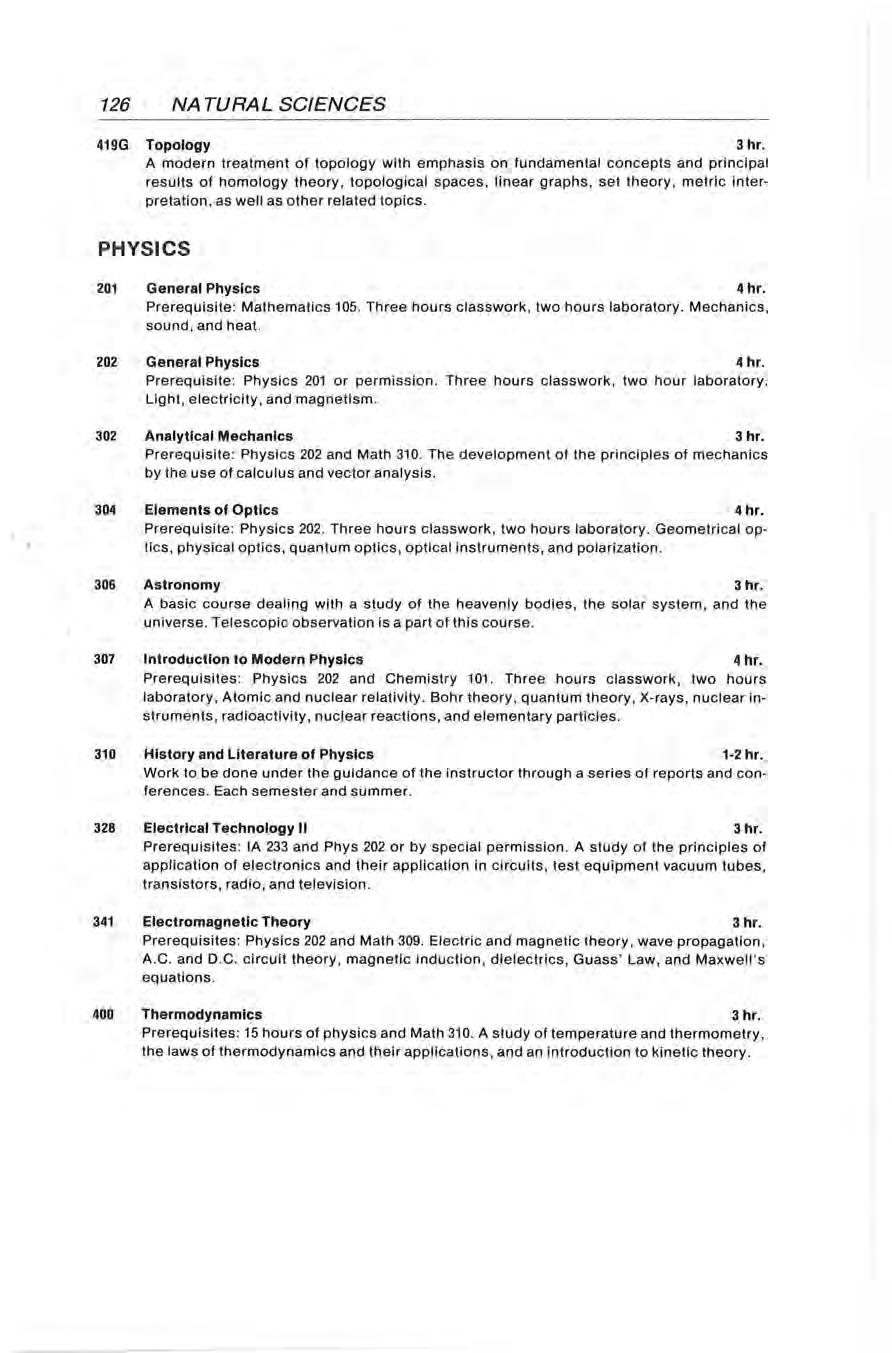
Prerequisites : IA 233 and Phys 202 or by special permission
341 Electromagnetic Theory
3 hr
Prerequisites : Physics 202 and Math 309. Electric and magnetic theory, wave propagation, A G and D C circuit theory , magnetic indu c tion , die lect ri cs, Guass' Law, and Ma x well ' s equations.
400 Thermodynamics
3 hr.
Prerequisites: 15 hours of physics and Math 310. A study of temperature and thermometry , the laws of thermodynamics and their applications, and an introduction to kinetic theory
101 Drawing I
A study of basic drawing techniques using a variety of drawing m e dia
102 Drawing II
3 hr
3 hr
Pr e requisit e: Art 101. Continuation of Drawing I with emphasis on figure drawing and improving of te c hniques
111 Lettering
203
204
3 hr.
Single stroke Gothi c Roman and manu sc ript alphabets, poster d e sign , and c ommerc ial techniques
Design I
A study of two-dimensional design with emphasis on color theory
Design II
A study of three -dimensional design using a variety of media.
210 Water Colo r Painting
3 hr.
3 hr.
3 hr.
Prerequisites: Art 101, 102 , 203 Compositions in c olor , using opaque , and transparent water c olor
221 Printing Processes
3 hr
History of the graphic arts of block printing , e tching , lithography , and silk sc reen printing Reading on the techniqu e s of e a ch proce s s , follow e d by th e making of prints in three or more of the methods
300
Ceramics
3 hr.
Ex periences in hand built and thrown projects Includes a basic study of glaze preparation and clay analysis .
305 Methods and Supervision
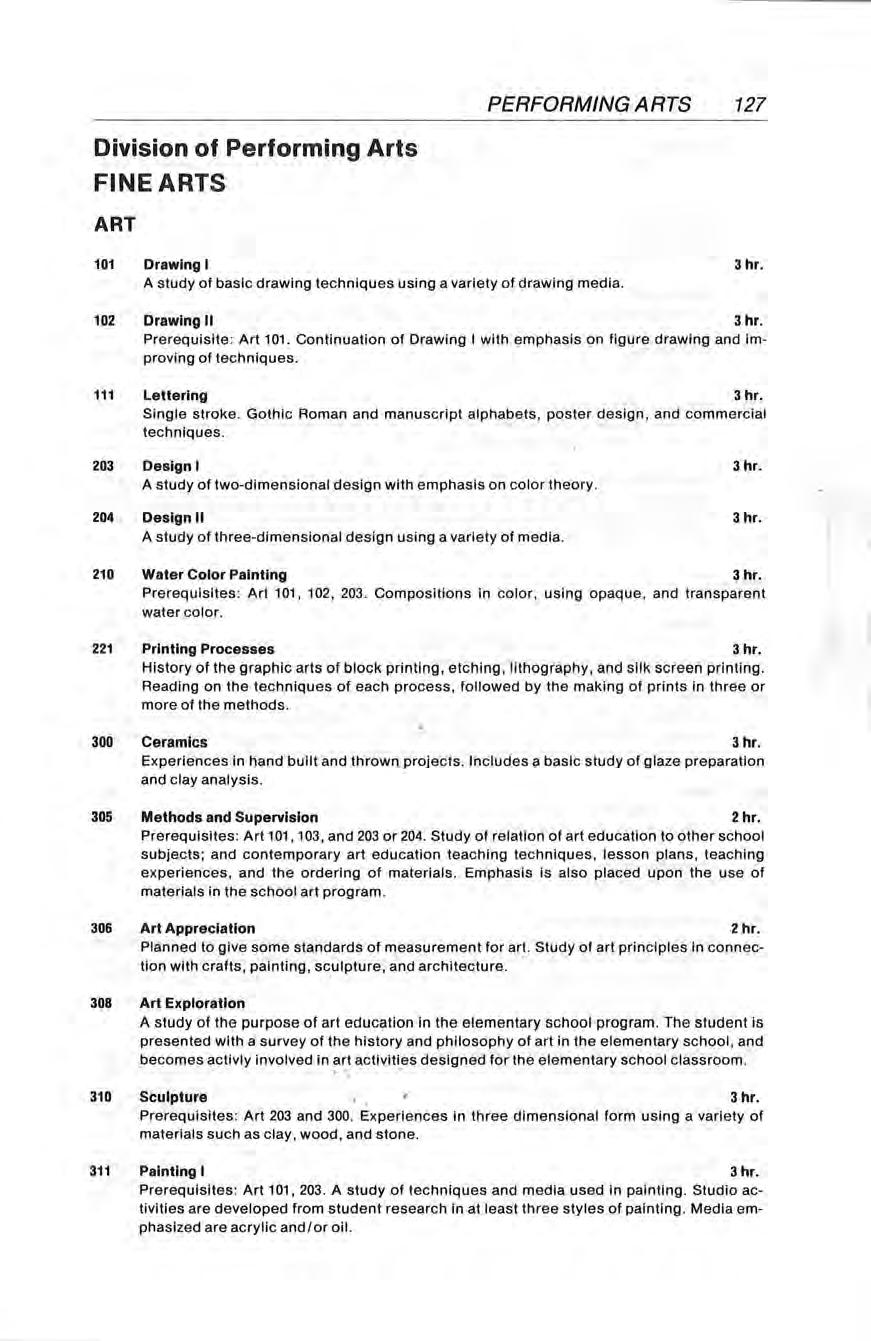
2 hr .
Prerequisites : Art 101,103, and 203 or 204. Study of re lation o f a r t education to oth e r school subjects; and contemporary art edu c ation teaching te c hniques , lesson plans , teaching e x periences , and the ordering of materials Emphasis is also placed upon the use of materials in the school art program.
306 Art Appreciation
2 hr.
Planned to give some standards of measurement for art. Study of art prin c iples in c onnection with crafts , painting , sculpture , and architecture
308 Art Exploration
A study of the purpose of art edu c ation in the elementary school program. The student is pr e sented with a survey of the history and philosophy of art in the elementary school , and be c omes activly involved in ? ri ac tiviti es designed for the el e mentary school Classroom
310 Sculpture
3 hr.
Prerequisites: Art 203 and 300. Ex periences in thr e e dimensional form using a vari e ty of materials su c h as clay , wood, and stone
311 Painting I
3 hr .
Prerequisites : Art 101 , 203 A study of techniques and media us e d in painting Studio activities are developed from student res e arch in at least three styles of painting Media e mphasi zed are acrylic and I or oil
312 Painting II
3 hr.
Prerequisite : Art 311 Continuation of Painting I with emphasis on development of a personal style 313 Mural Painting 3 hr
Study of the history and procedures used in mural production. Group projects in the execution of murals.
Art History I
A study of painting, sculpture, and architecture from ancient times to the Renaissance
Art History II
A study of art in the West since the Renaissance.
3 hr.
3hr
Midwestern Museums of Art 3 hr.
A survey of some of the major museums in the midwest, including field trips designed to promote on-site analysis of art collections
Studio Activities
1-6 hr.
Prerequisite: Consent of instructor . Suggested for advanced art students wanting to gain additional competence in a particular area The student may choose to do additional work in this area of interest.
19 Chorus
1 hr.
Open to all college students with consent of the instructor. Performance and study of representative choral works of all periods.
21A Band
1 hr.
(Fall Semester) This organization is pri "!ar i ly a marching band It functions at Pep Rallies, Parades, and Football Games during the Fall semester The General Studies P E. Activity Requirement can be fulfilled by participating in Mus 21A. 4 hours attendance.
Band
1 hr
This organization is primarily a Concert Band. During the semester concerts are presented both on and off campus. 3 hours attendance
Choral Ensemble
A select membership for the study and performance of choral work for small groups.
1 hr.
1 hr. (Brass Choir) A select membership for the study and performance of brass compositions for small ensemble. 1 hr. (Woodwind Choir) A select membership for the study and performance of woodwind compositions for small ensemble. 1 hr. (State and Pep Band) This organization functions primarily as a pep band and for the performance and study of popular music
Instrumental Ensembles
100 Fundamentals and Elementary Music Materials
3 hr.
The rudiments of music, including letter and syllable names of notes , time values of notes and rest, time, and key signatures, cl],romatic, intervals, chords , keyboard experience, and the writing of original melodies. Study of children's musical literature and of their tonal and rhythmic problems
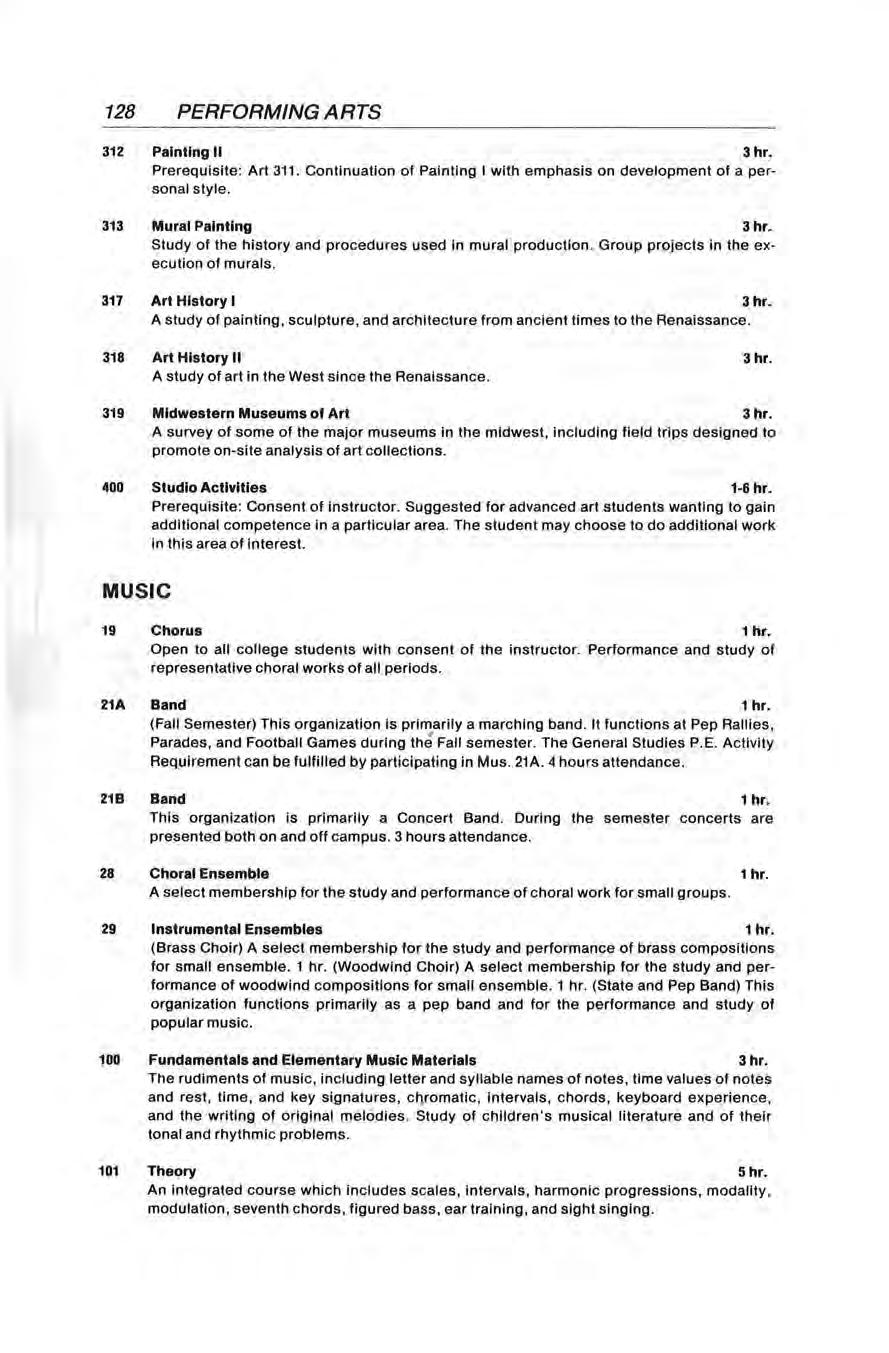
101 Theory
5 hr.
An integrated course which i ncludes scales, intervals, harmonic progressions, modality, modulation, seventh chords, figured bass, ear training, and sight singing.
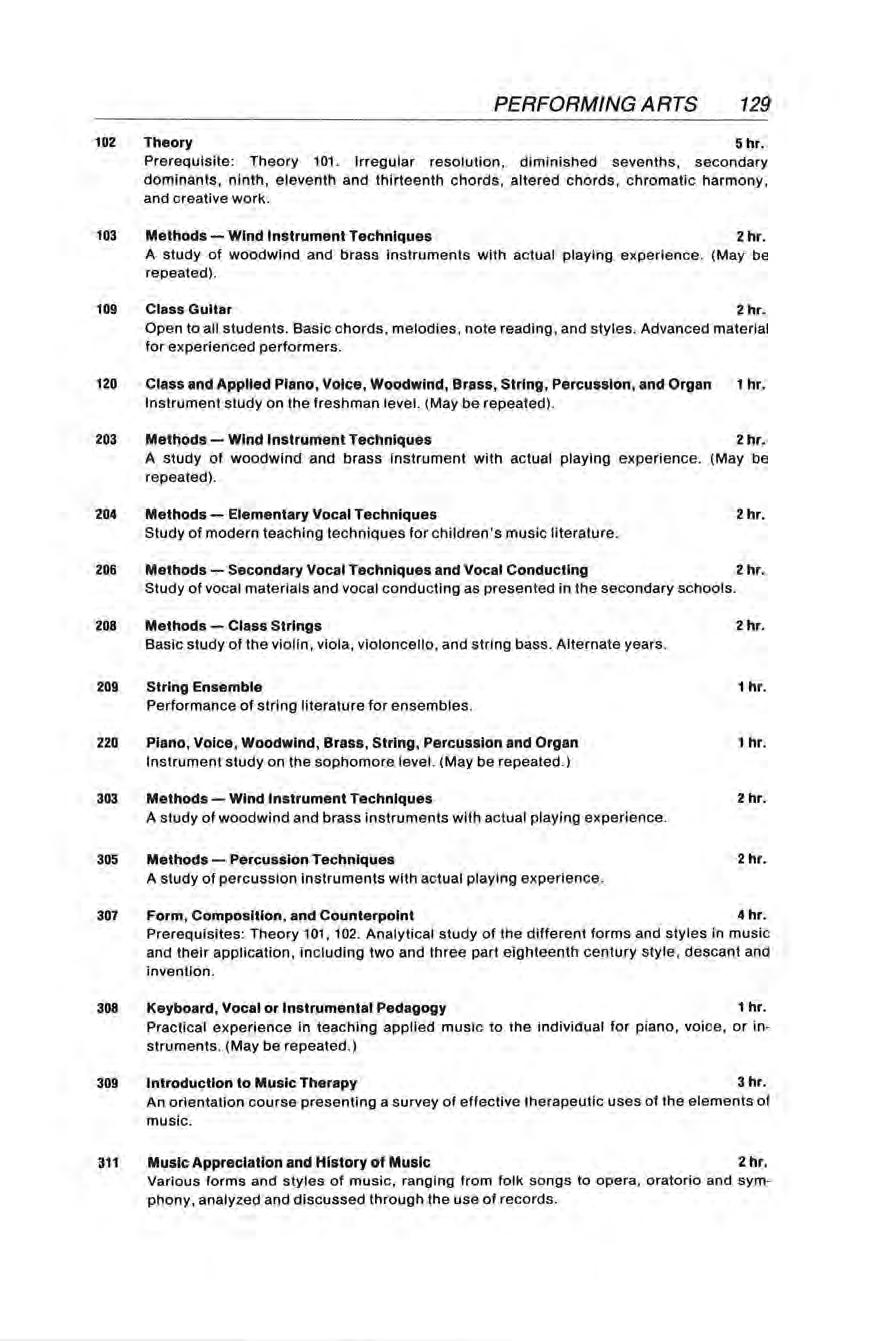
Prerequisite: Theory 101. Irregular resolution, diminished sevenths, secondary dominants, ninth, eleventh and thirteenth chords, altered chords, chromatic harmony , and creative work.
two and three part
for Recreation 2 hr. Practical guide for the planning and execution of music programs for community recreation , camping, correctional and clinical institutions , senior citizens, industry and the armed services.
Piano, Voice, Woodwind , Brass, String , Percussion, and Organ Instrument study on the junior level. (May be repeated.)
Vocal or Instrument Practicum
hr. Practical experience in teaching the small and large vocal and instrumental ensemble. (May be repeated .)
A study of woodwind and brass instruments with actual playing experience. (May be repeated.)
Knowledge of baton technique , reading and interpretation of a musical score and the presentation of te c hniques in rehearing instrument a l organizations.
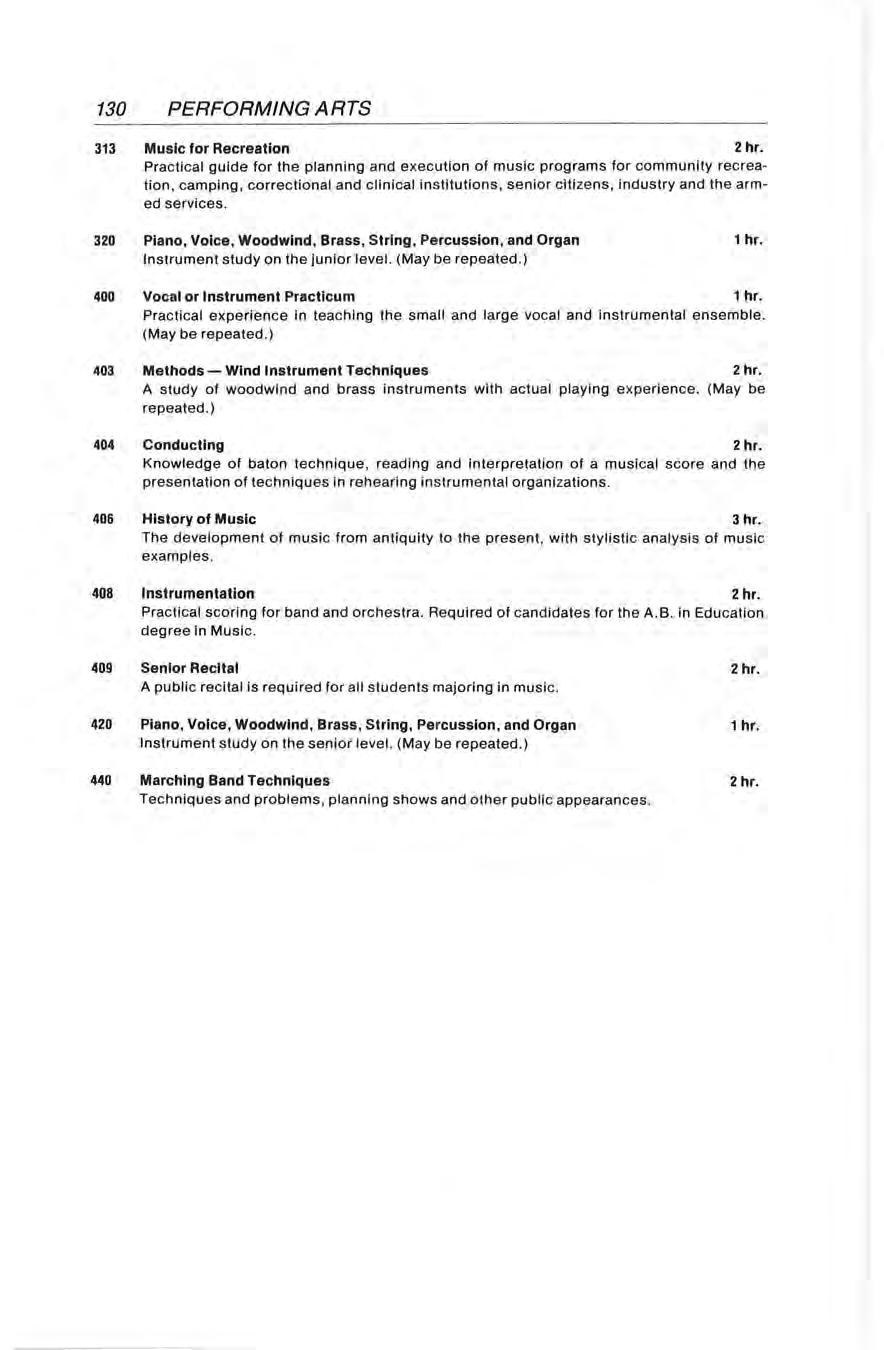
The development of musi c from antiquity to the present , with stylistic analysis of music examples. Instrumentation 2 hr. Practical scoring for band and orchestra. Required of candidates for the A B. in Education degree in Music.
Senior Recital
A public recital is required for all students majoring in musi c.
Piano, Voice, Woodwind, Brass , String, Percussion , and Organ Instrument study on the senior level. (May be repeated )
Marching Band Techniques Techniques and problems, planning shows and oth e r public appearances.
A maximum of four credits of varsity sports may be included to meet the 125 semester hours of course credit required for degree purposes.
Folk Dance
Two hours attendance.
2 3 4
Square and Social Dance
Two hours attendance.
Modern Dance Fundamental rhythmic techniques and their application in creative dance
Golf
1 hr 1 hr. 1 hr.
1 hr.
Five hours attendance. Fundamentals of grip, stance and swing Factors in putting Each student to furnish own equipment. Membership in Auburn Country Club required.
5 Body Mechanics
Tumbling, apparatus , trampoline and posture. Emphasis on efficient use of body in all movements.
Tennis
•13 *14 *15
1 hr
Fundamentals of stroke, rules and sirategy Student must furnish tennis racket and three new balls.
Beginning Bowling
Two hours attendance. Fundamental skills and techniques are emphasize(!.
1 hr.
1 hr 10 11
Beginning, Advanced Beginning Swimming, and Basic Water Safety
1 hr. No prerequisites. Equips the individual ~ ith basic swimming skills and basic water safety information to help insure reasonable safety in, on, and around the water. 'Certificates will be issued to those who complete Red Cross requirements.
Intermediate and Swimmer Level and Basic Rescue
1 hr.
Prerequisites: Advanced Beginner and Basic Water safety certificates. Teaches the elements of good swimming Increases endurance by the coordination of whole strokes and skills versatility by mastery of the basic strokes. Enables individuals to acquire correct responses in aquatic emergencies. Certificates issued to ihose who complete Red Cross requirements.
Advanced Swimming Lifesaving " 1 hr
Prerequisites: Swimmer Certificate. ves t e individual with additional strokes and skills that make an all-round swimmer import lifesaving skills needed to save one ' s own life or that of another person Certificates~ssued to those who complete Red Cross requirements.
Water Safety Instructor 1 hr .
Prerequisites: Advanced Life~aving certificates (current). The course will follow the requirements of the American Red Cross for Water Safety Instructor certification. General content to cover physical laws l iovern i ng body movements in the water , stroke analysis, practice teaching , content of ARC water safety courses, ARC records reporting. Instruction certificate issued to those who meet ARC standards
*Swimming and Water Safety courses are conducted in accordance with requirements and procedures established by the American National Red Cross and are subject to change by the Red Cross at any time. The Red Cross does n6t charge or receive fees for instruction
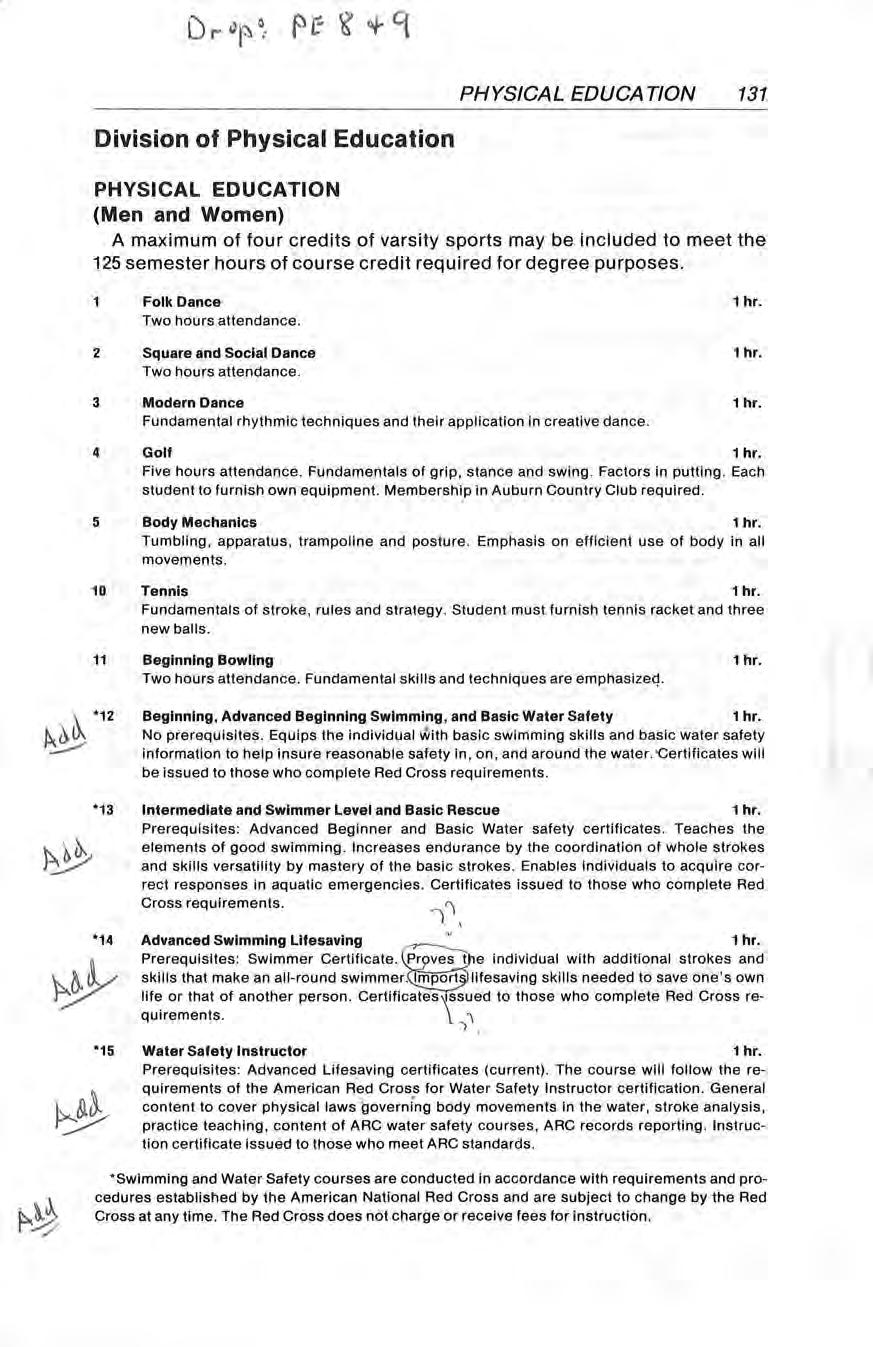
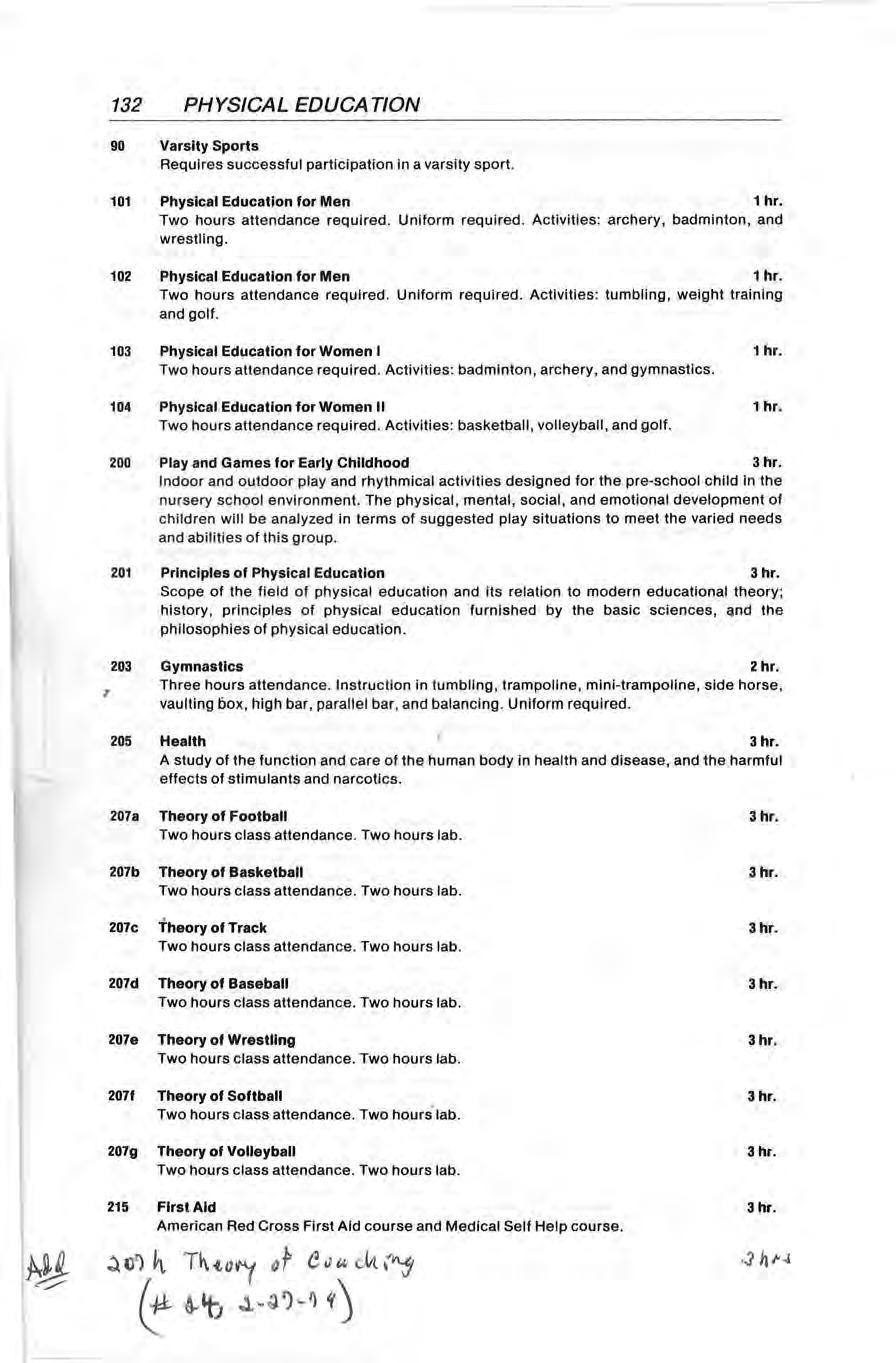
Requires successful participation in a varsity sport.
Education for Men
hr.
Two hours attendance required. Uniform required. Activities : archery, badminton, and wrestling.
Education for Men
Two hours attendance required Uniform required Activities: tumbling, weight training and golf
Education for Women I
Two hours attendance required Activities : badminton, archery, and gymnastics.
Two hours atte ndance required Activities: basketball, volleyball, and golf , 200 Play and Games for Early Childhood
hr. Indoor and outdoor play and rhythmical activities designed for the pre-school child in the nursery school environment. The physical , mental, social, and emotional development of children will be analyzed in terms of suggested play situations to meet the varied needs a nd abilities of this group.
Scope of the field of physical education and its relation to modern educational theory; history , principles of physical education furnished by the basic sciences, <1 nd the philosophies of physical education Gymnastics
Three hours attendance. Instruction in tumbling, trampoline, mini-trampoline, side horse, vaulting box, high bar, parallel bar, and balancing. Uniform required
A study of the function and care of the human body in health and disease , and the harmful effects of stimulants and narcotics.
Minor Sports I
hr
Three hours attendance required. A study o ~ history , strategy, and techniques i nvolved in archery, badminton, and wrestling
Minor Sports II
2 hr .
Three hours attendance required A study of the history, strategy, and techniques involved in tumbling, weight training , and golf
Basic Skills for Women I 2hr.
Three hours of attendance required. A study of the history , strategy and techniques involved in badminton , archer, and gymnastics
Basic Skills for Women II
2hr.
Three hours of attendance required A study of the history , strategy and techniques involved in basketball , volleyball , and golf
Psychology of Coaching
2 hr. Studies the role of the coach and player in understanding and modifying the behavior of athletes Two hours class attendance
Rhythms for the Elementary School
2 hr .
The e x ploration at an elementary educational level of concepts and relationships of mov ement with space. Broadening the concept of self-edu c ation with the enjoyment of selfawareness through the e x perience of basic rhythms in activities at the elementary level.
Aquatics for Elementary School
2 hr.
Prerequisite : PE 12 A program of aquatic activities, games and sports suited to the interests and capabilities of the elementary student. Instruction provided in skills , knowledges , and safety aspects of water related activities.
and Treatment of Athletic Injuries
2 hr: Nature and causes of injuries incident to the physical activities of children and athletes.
Principles of Officiating Fall and Winter Sports
2 hr. Two hours class attendance, two hours ol lab Officiating techniques in football , basketball , volleyball , wrestling Study of rules
Principles of Officiating Spring Sports
2 hr. Two hours class attendance , two hours of lab Officiating techniques in baseball, softball , track a~d field Study of rules
Organization and Administration of Programs In Physical Education and Recreation
2 hr. Consideration of general principles of administrative techniques and responsibil i ties and related to fields of Phys ical Education and Recreation

Physical Education In the Primary Grades 2 hr
The selection and organization of materials and techniques of instruction for the primary grades.
Physical Education In the Intermediate Grades 2 hr.
The selection and organi zation of materials and techniques of instruction in the intermediate grades .
312 Kineslology and Anatomy
3 hr. Study of bones , body movements , muscle action and joint mechanics in relation to P.E activities ; common postural defects and joint injuries
320 Special Methods In Physical Education
2 hr.
Prerequisite : Junior standing An analysis of the techniques used today in the teaching of health and physical education.
350 Independent Study In Physical Education
1 to 3 hr.
An in-depth study of an issu e selected by the student. Must be approved by department chairman
360 Physiology of Exercise
3 hr.
A working understanding of how exercise effects the different systems of the body. Three hours class attendance.
400 Advanced Techniques in Physical Education for Men I
1 hr.
Prerequisite: P.E 216. Required of all m en with areas of concentrat ion in Physical Education. A practicum involving laboratory experiences in P.E. 101.
401 Advanced Techniques In Physical Education for Men II
1 hr.
Prerequisite : P E. 217 Required of all men with areas of concentratio n in Physical Education. A practicum involving laboratory experiences in P.E. 102
402 Advanced Techniques in Physical Education for Women I
1 hr.
Prerequisite: P.E. 218. Required of all women with majors in Physical Education. A practicum involving laboratory experiences in P E 103.
403 Advanced Techniques in Physical Education for Women II
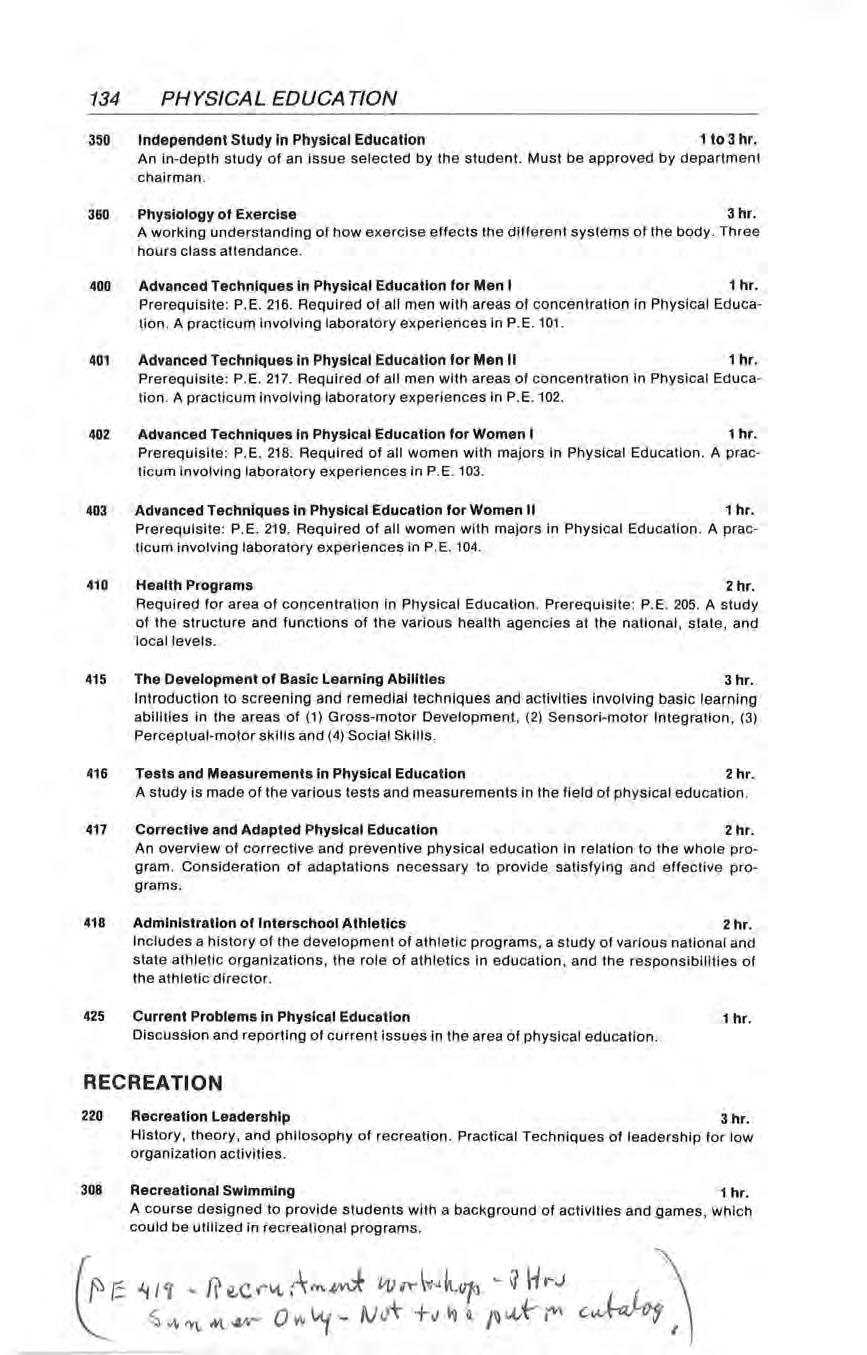
Prerequisite: P E. 219. Required of all women with major s in Physi cal Education. A practicum involving laboratory experiences in P.E. 104. Health Programs
1 hr. 410
2 hr.
Required for area of conce nt rat ion in Physical Education Pr erequisite : P.E. 205. A stud y of th e structure and functions of the vadous health agencies at the n at ional , state, and lo ca l levels.
415 The Development of Basic Learning Abilities
3 hr. introduction to screening and remedial techniques and activities involving basic learning abilities in the areas of (1) Gross-motor Development , (2) Sensori-motor Int egration, (3) Perceptual-motor skills and (4) Social Skills.
2 hr. An overview of cor r ect ive and preventive physical educatio n in relation to the whole program. Consideration of adaptatio ns necessary to provide satisfying a nd effective programs.
2 hr. Includes a history of the development ot'athletic programs , a study of various national and state athletic organizations, the role of athletics in ed u cation , and the responsibilities of the ath letic dir ector
220 Recreation Leadership 3 hr. History, theory, and philosophy of recreation. Practical Techniques of leadership for low organization activities.
308 Recreational Swimming 1 hr. A course designed to provide students with a background of activities and games, which co uld be utilized in recreational programs.
319 Programs In Recreation 3 hr.
A principles course to encompass industrial, social, youth organizations and community recreation.
322 Outdoor Recreation and Camping 3 hr . This course investigates all aspects of outdoor recreation Camping theory and experience in a camping situation are a part of this course.
405 Seminar 1 hr. Special assignments made by the instructor relative to new areas in recreation.
406 Recreation Research 1-3 hr .
Prerequisite : P.E. 405 Investigation of legal , financial, personnel , public relations, political , and philosophical problems of management of federal , state , and local government agencies in the field of recreation.
460 Recreation Internship 6-8 hr.
Prerequisites : all required Rec courses. A practical application of the principles of recreatio~ . The internship will be offered during the summer. Students will be placed in publi c or industrial recreation programs to work with leaders, directors, and supervisors in the field
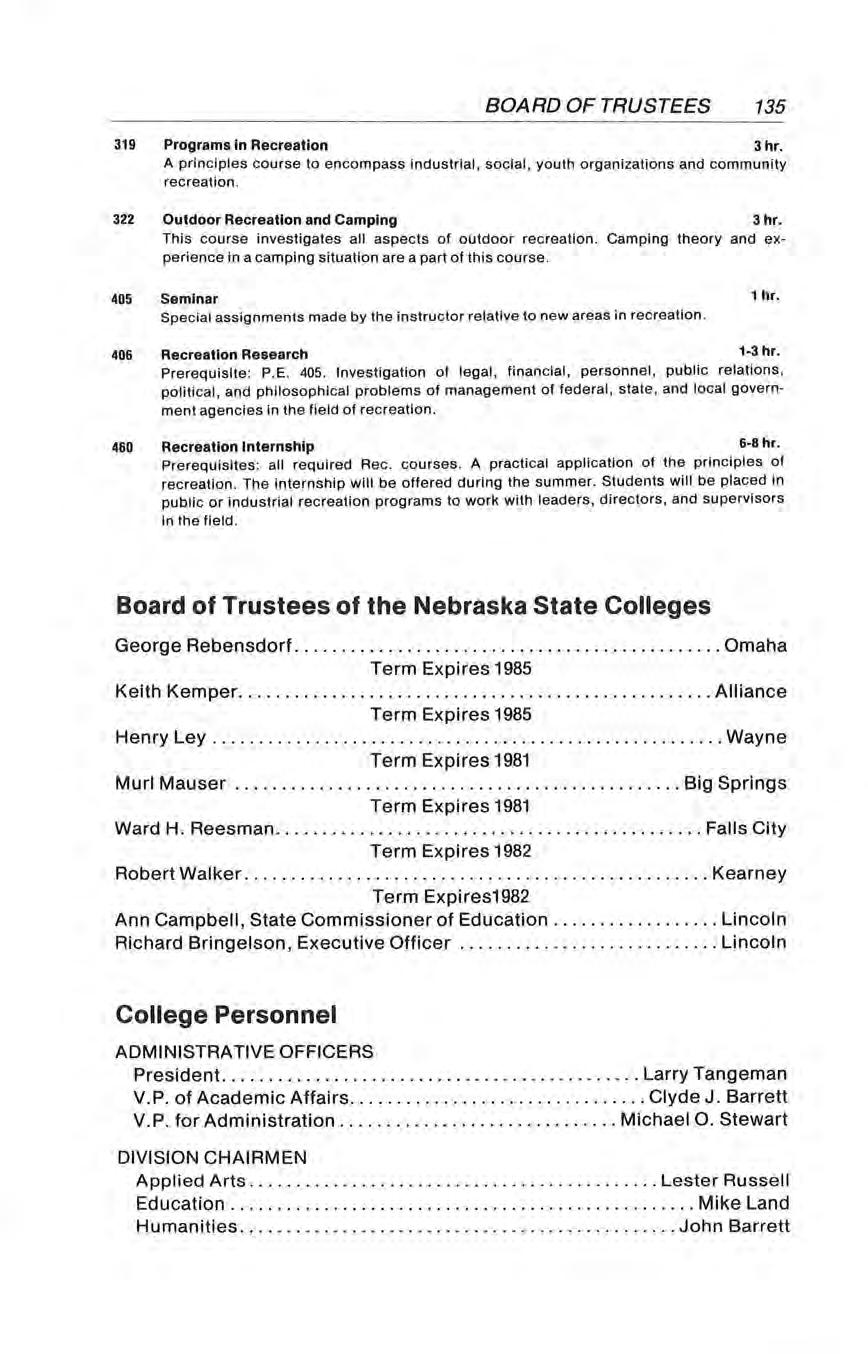
George Rebensdorf
Term Expires 1985
Keith Kemper Alliance
Term Expires 1985
Henry Ley Wayne
Muri Mauser
Ward H. Reesman
Term Expires 1981
Term Expires 1981
Term Expires 1982
Robert Walker ................................. ...
Term Expires1982
Ann Campbell , State Commissioner of Education
Richard Bringelson, Executive Officer
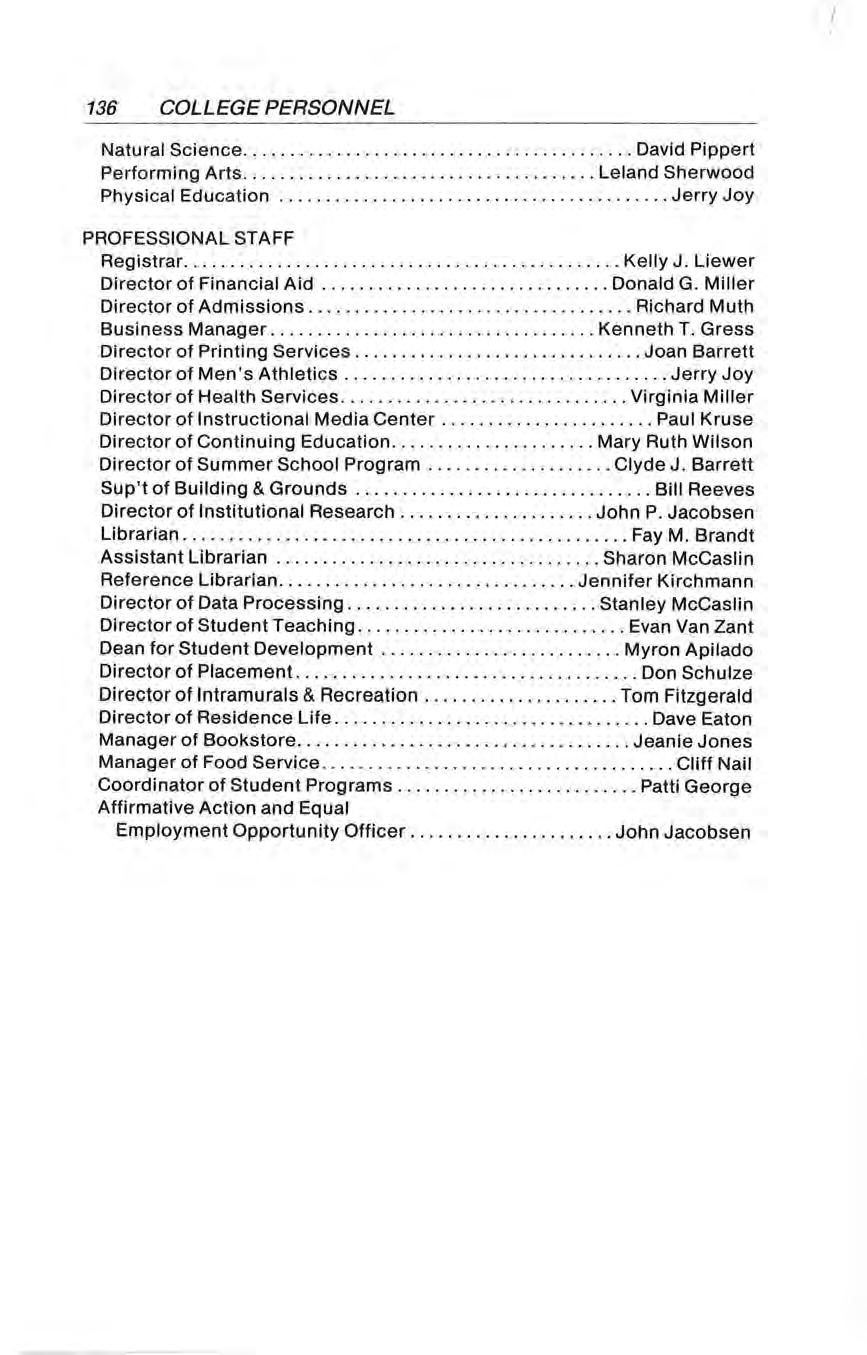
Natural Science David Pippert
Performing Arts Leland Sherwood
Physical Education Jerry Joy
Registrar Kelly J Liewer
Director of Financial Aid Donald G Miller
Director of Admissions
Richard Muth
Business Manager Kenneth T. Gress
Director of Printing Services Joan Barrett
Director of Men ' s Athletics Jerry Joy
Director of Health Services Virginia Miller
Director of Instructional Media Center Paul Kruse
Director of Continuing Education
Mary Ruth Wilson
Director of Summer School Program Clyde J Barrett
Sup't of Building & Grounds
Bill Reeves
Director of Institutional Research John P. Jacobsen
Librarian Fay M . Brandt
Assistant Librarian Sharon Mccaslin
Reference Librarian Jennifer Kirchmann
Director of Data Processing Stanley Mccaslin
Director of Student Teaching
Evan Van Zant
Dean for Student Development Myron Apilado
Director of Placement. Don Schulze
Director of lntramurals & Recreation
Director of Residence Life Dave Eaton
Manager of Bookstore
Manager of Food Service Cliff Nail
Coordinator of Student Programs
Affirmative Action and Equal Employment Opportunity Officer John Jacobsen
(Date indicates year in which service at Peru began.)
Myron Apilado (1976)
Ed . D. , University of South Dakota , Vermillion, Dean for Student Development
Clyde J. Barrett (1965)
Ed D ., University of Arkansas, Fayetteville , Vice President of Academic Affairs , Associate Professor of English
John Barrett (1972)
Ph D , University of Northern Colorado , Greeley , Associate Professor of English , Chairman, Division of Humanities
Russell C. Beldin (1970)
M S ., Mankato State University , Minnesota , Assistant Professor of Business Education
Albert 0 Brady (1957)
M A , University of South Dakota, Vermillion , Asso c iate Profes s or of Biologic al Science
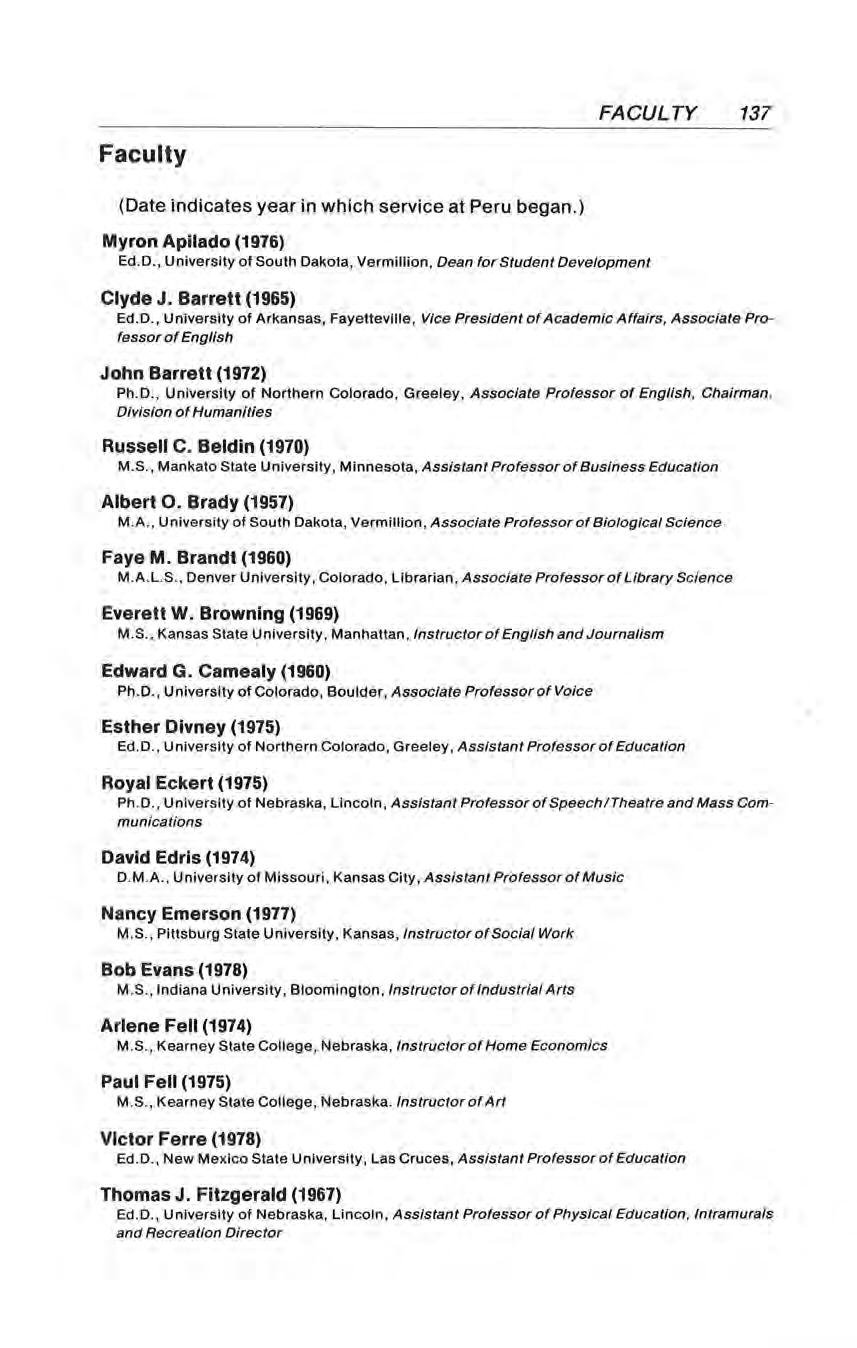
Faye M. Brandt (1960)
M . A . L.S ., Denver University , Colorado , Librarian , Associate Professor of Library Science
Everett W. Browning (1969)
M S. , Kansas State University , Manhattan , Instructor of English and Journalism
Edward G. Camealy (1960)
Ph.D. , Unive r sity of Colorado, Boulder , Associate Professor of Voice
Esther Divney (1975)
Ed D., University of Northern Colorado, Greeley, Assistant Professor of Education
Royal Eckert (1975)
Ph D ., University of Nebraska, Lincoln , A s sistant Professor of Speech / Theatre and Mass Communications
David Edris (1974)
D M A , University of Missouri, Kansas City, Assistant Professor of Music
Nancy Emerson (1977)
M S , Pittsburg State University, Kansas , Instructor of Social Work
Bob Evans (1978)
M S ., Indiana University , Bloomington , Instructor oflndustrial Arts
Arlene Fell (1974)
M .S ., Kearney State College, Nebraska , Instructor of Home Economics
Paul Fell (1975)
M S , Kearney State College , Nebraska Instructor of Art
Victor Ferre (1978)
Ed D ., New Me x ico State University , Las Cruces, Assistant Professor of Education
Thomas J. Fitzgerald (1967)
Ed D. , University of Nebraska, Lincoln , Assistant Professor of Physical Edu cation , lntramurals and Re c reation Director
Pamela Gere (1976)
M.A., University of Illinois , Urbana , Instru ctor of Music.
Patricia A. Gilbert (1976)
M.A., University of Northern Iowa , Cedar Falls, Instru ctor of Physi ca l Education
Terry Gilliland (1977)
M S., Kearney State College, Nebraska, Instructor of Physical Education
Susan Gladstone (1977)
M.B.A Northwest Missouri State University , Maryvill e, Instru ctor of Business
Blaine Gorney (1978)
M.S ., St. Cloud State Univ ers ity, St. Cloud, Instru ctor of Physi c al Education
Kenneth T. Gress (1969)
B A. , Peru State College , Nebraska, Busin ess Manager
Richard Gulizia (1974)
Ed. D , University of Nebraska, Lincoln, Assistant Professor of Education
John Hahn (1968)
Ph D., University of Cincinnati, Ohio , Associate Professor of Political Science
Fredrick Hamann (1973)
M .S ., Fort Hays Kansas State University , Hays , Assistant Professor of Science
Jack Hamilton (1972)
M.S., Pittsburg State University, Kansas, Assistant Professor of Business Education
Charles Harper (1978)
Ph D ., University of Nebraska , Lincoln , Assistant Professor of Speech and Drama
Wreathea Hicks (1968)
M.A ., Emporia Kansas State University , Empori a, Assistant Professor of English
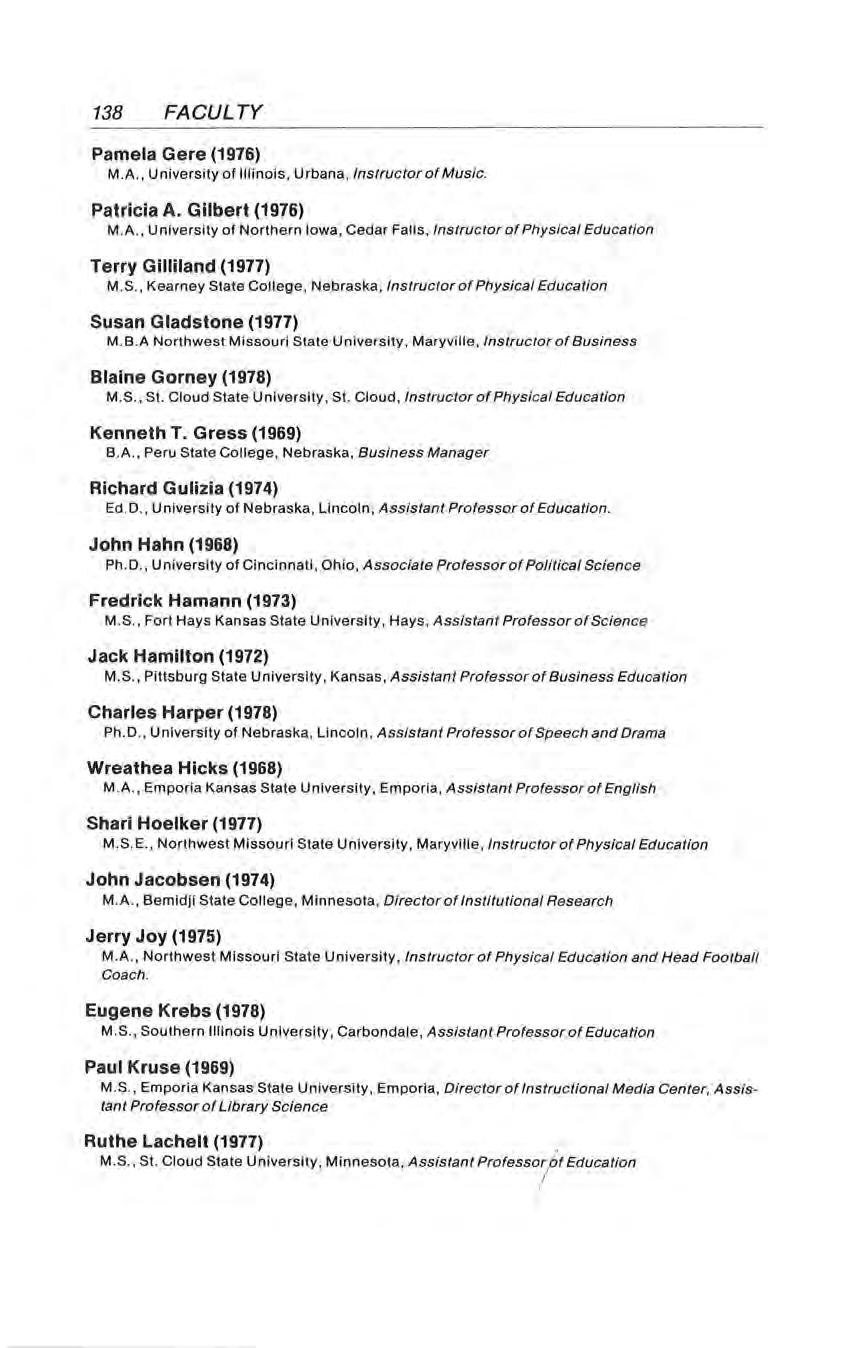
Shari Hoelker (1977)
M.S. E , Northwest Missouri State University, Maryville, Instru ctor of Physical Education
John Jacobsen (1974)
M A ., Bemidji State College , Minnesota, Directoroflnstitutional Research
Jerry Joy (1975)
M.A . , Northwest Missouri State University , Instru ctor of Physi ca l Education and Head Football Coach
Eugene Krebs (1978)
M S , Southern Illinois University, Carbondale, Assistant Professor of Education
Paul Kruse (1969)
M S. , Emporia Kansas State University , Emporia , Director of Instru ctio nal Media Center, Assistant Professor of Library Science
Ruthe Lachelt (1977) ,
M S., St. Cloud State University , Minnesota , Assistant Professo r ( Education
Mike Land (1976)
Ph D ., Te xas A & M , College Station , Associate Professor of Education , Chairman , Division of Education
Robert Lewellen (1972)
M S. , Northwest Missouri State University, Maryville, Assistant Professor of Business Administration
Kelly Liewer (1968)
Ed.D ., University of Nebraska , Lincoln, Registrar
Daryl C. Long (1967)
Ph D., University of Nebraska, Lin co ln, Associate Professor of Sci e nce
Kooros Maskooki (1978)
Ph D , University of Nebraska , Lincoln , Assistant Professor of Business
Sharon Mccaslin (1971)
M. L , Emporia Kansas State University, Emporia, Assistant Librarian
Stanley Mccaslin (1971)
M.S ., California Institute of Technology, Pasadena , Director of Data Pro cessing
Lyle C. McKercher (1959)
M .S , University of Iowa , Iowa City , Associate Professor of Mathematics
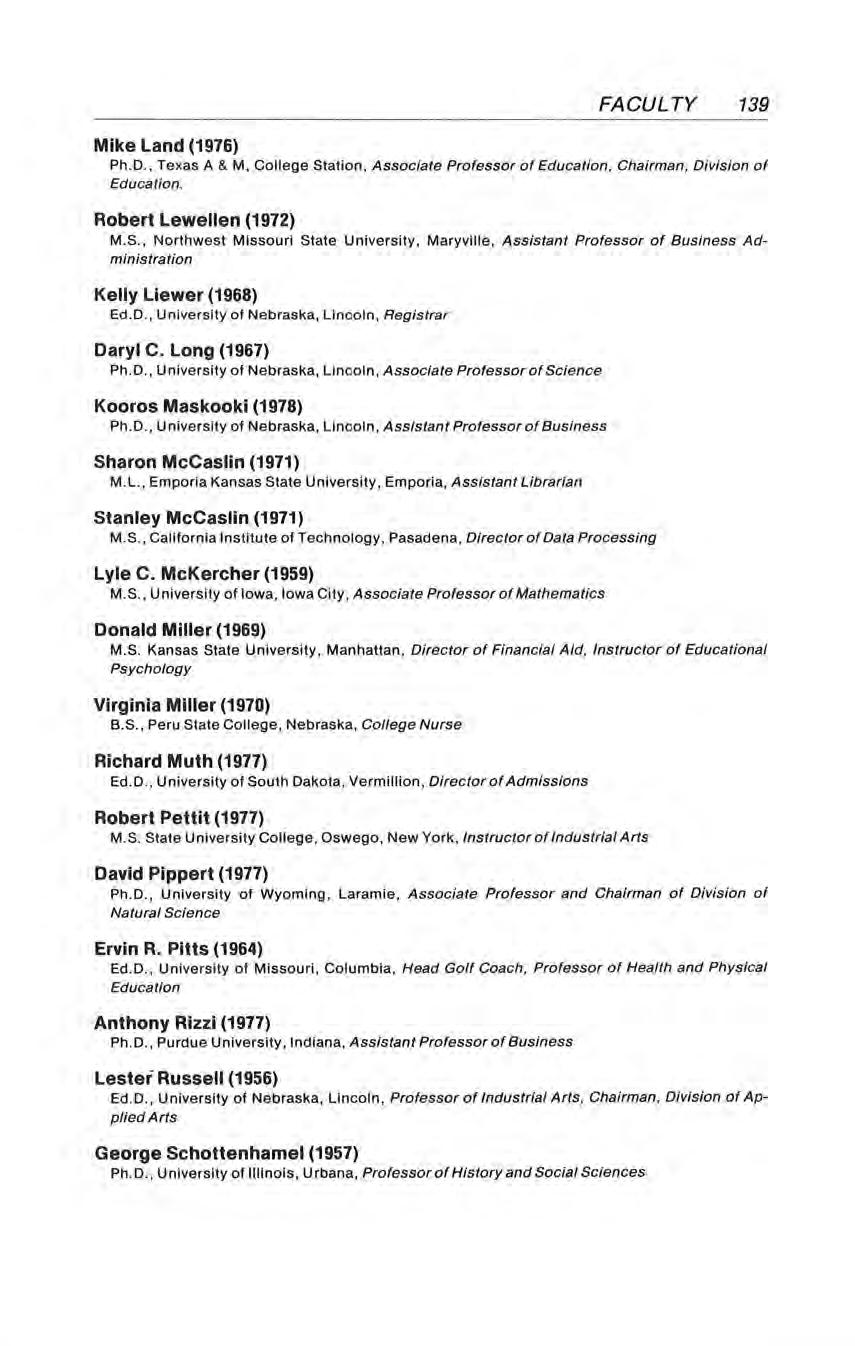
Donald Miller (1969)
M.S. Kansas State University , Manhattan , Director of Financial Aid, Instructor of Educational Psychology
Virginia Miller (1970)
B S. , Peru State College, Nebraska, College Nurse
Richard Muth (1977)
Ed.D. , University of South Dakota , Vermillion, Director of Admissions
Robert Pettit (1977)
M S. State University College , Oswego, New York , Instructor of Industrial Arts
David Pippert (1977)
Ph D. , University of Wyoming , Laramie, Associate Professor and Chairman of Division of Natural Science
Ervin R. Pitts (1964)
Ed D ., University of Missouri , Columbia , Head Goff Coach, Professor of Health and Physical Education
Anthony Rizzi (1977)
Ph.D ., Purdu e University , lndi ~na, Assistant Professor of Business
Lester Russell (1956)
Ed.D., University of Nebraska, Lincoln, Professor of Industrial Arts , Chairman , Di visio n of Applied Arts
George Schottenhamel (1957)
Ph.D., University of Illinois, Urbana, Professor of History and Social Sciences
Donald Schulze (1977)
M.S Emporia Kansas University , Emporia, Dire ct or of Placement
Leland H. Sherwood (1963)
Ed D. , Indiana University , Bloomington , Profe s sor of Art, Ch a irman , Division of Performing Arts
Bill Squires (1978)
M S ., Winona S t ate University , Winona , Instru c tor of Physical Edu c ation
Michael 0. Stewart (1974)
Ph D ., Kansas State University , Manhattan , Vice - President for Administration
Larry Tangeman (1977)
Ed . D. , University of Colorado , Boulder , President
Evan Van Zant (1961)
M A , University of Nebraska, Lincoln, Asso c iat e Professor of Education
Scott J. Williams (1966)
M A. , Ari zona State University , Tempe , Assistant Professor of Geography
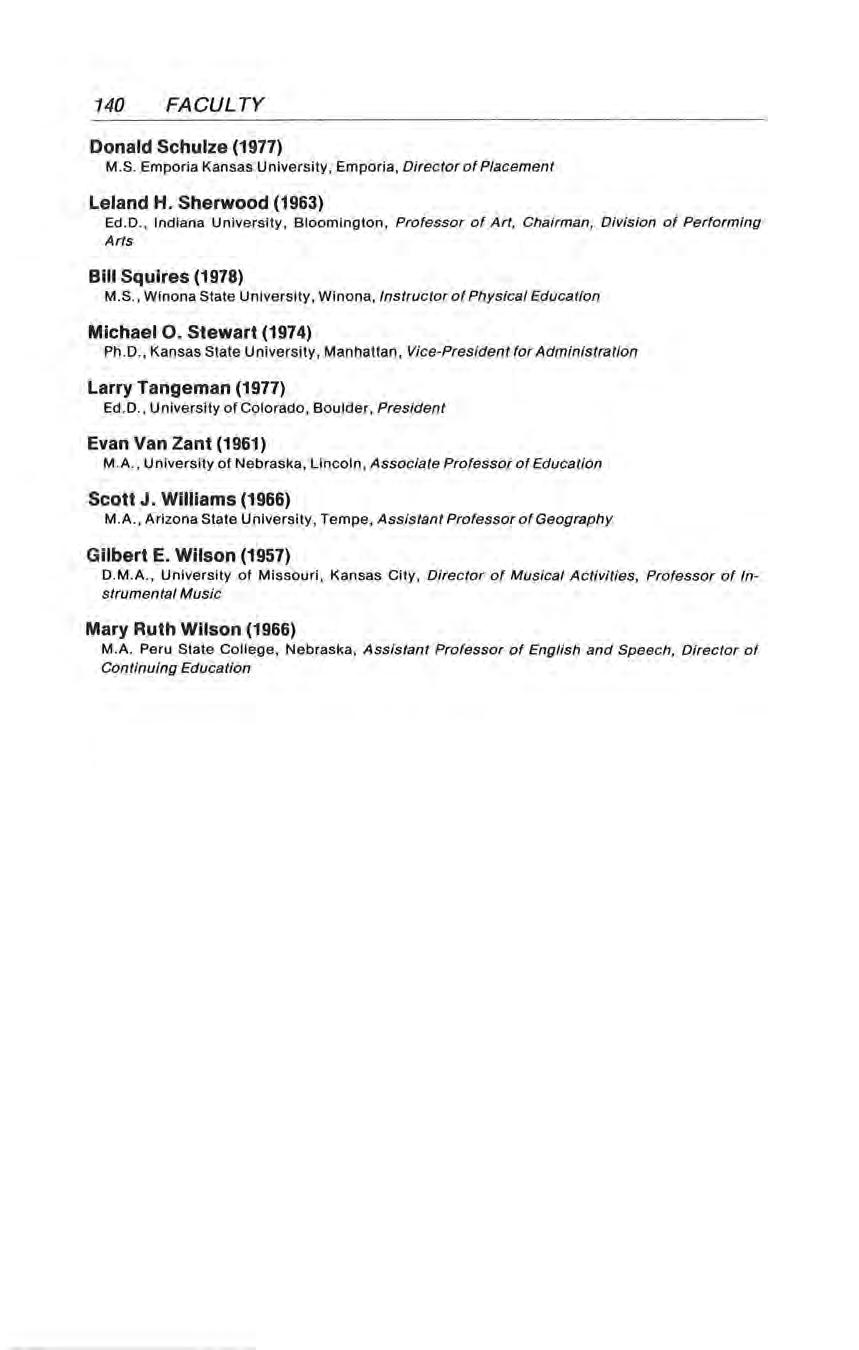
Gilbert E. Wilson (1957)
D.M A., University of Missouri , Kansas City, Direc tor of Musical Activities , Professor of Instrumental Music
Mary Ruth Wilson (1966)
M A. Peru State College , Nebraska , Assis tant P rofessor of English and Speech , Director of Continuing Education
PHYLLIS DAVIDSON (1929-1957) ........ .. . . ...... .. Professor of Women's Physical Education
L.B . MATHEWS (1927-1961) . .. ... .. ... . ........ . ..... Professor of Physics
MARY CLARKE (1951-1964) Professor of Education
ALFRED G. WHEELER (1938-1965) ... ....... ..... .. .. . . Professor of Health and Physical Education
HAROLD 0. BORASS (1951-1966) Professor of Education Psychology
ROBERT D . MOORE (1937-1970) . . .. ..... . . Professor of English and Speech
ALMA ASHLEY (1946-1970) Professor of Elementary Education
FRIEDA D. ROWOLDT (1952-1970) ........ . Professor of Business Education
HANFORD MILLER (1947-1971) Professor of Chemistry
HAROLD JOHNSON (1951-1971) . . .... ... . .. . .. .. . .. Professor of Education
SILAS SUMMERS (1960-1972)
JOHN C CHRIST (1947-1973)
LUCY HOVEY (1967-1973)
LOUISE KREGEL (1957-1974)
JUANITA BRADLEY (1956-1976)
DEE JARVIS (1948-1978)
Professor of English
Professor of Biology
Professor of Home Economics
Assistant Professor of Home Economics
Associate Professor of Education
Associate Professor of Industrial Arts

The Council is the representative of the professional staff of the College and is concerned with the general welfare of the professional staff and the students . It establishes and revises all policies related to the internal affairs of the college
The Commission carries on a continuous study of the instructional program and recommends policy to the College Affairs Council. It is concerned with inter- school and interdepartmental coordination and relationships. The various instructional programs are evaluated in terms of accrediting standards and guidelines of national academic association It evaluates the work and responsibility of its various committees.
The Committee works on a continuing basis for the enhancement of the public image of Peru State College All public relations related matters are a concern of this Committee.
The Committee reports regularly to the Academic Affairs Commission and recommends policy to the Commission. It serves in a liaision capacity between the Library and the faculty - student bodies . It advises in regard to the administration of the policies and regulations related to the Library, and makes suggestions regarding the services, the budget, purchases, allocation of funds, accreditation standards, and over-all needs.
The Teacher Education Committee e x plores and identifies areas needing policy statements . Since the responsibility of the Committee is chiefly in academic affairs, the Commission on Academic Affairs is advised on all recommendations that will be made to the College Affairs Council. It formulates these policies and recommends them to the College Affairs Council. The Committee is authorized to delegate some of its responsibilities, such as Admission to Teacher Education , to a subcommittee

The Commission recommends policy to the College Affairs Council. It interprets the philosophy and policy to students , faculty, parents, and the public. It provides for the centralized administration and coordination of all student personnel functions. The Commission serves as an appeal of hearing body on decisions related to non-academic matters of the student. The Commission shall advise the Director of Financial Aid , as he requests, in the administration of Financial Aids and awards scholarships which are available.
The membership of the committee representing the Faculty Association consists of the Executive Committee of the Association. The Chairman of the Executive Council is the chairman of this committee The Committee concerns itself with both academic and personnel matters of the faculty and reports to either the Academic Affairs Commission or the College Affairs Council. The Faculty Association has the responsibility of assisting with the orientation of new faculty members, and assisting in the evaluation of objectives , policies, and with the professional growth and development of faculty members.
1978-1979
Auburn Albert C. Austin, Superintendent
Principal : Robert H. Lohrberg
Beatrice Robert Cothren, Superintendent
Assistant Superintendent: W. A. Schlichting

Bellevue Richard L. Triplett, Superintendent
Personnel Director: Harold Baker
Boys Town .. ... .. ... . ...... ..... . . .. . ... .. Pat McGinnis, Superintendent
Fairbury ....... ... . ....... ... .. ..... .. .. Lewis E. Patrick, Superintendent
Principal : Ronald Oswald
Falls City J. W. Wimberley, Superintendent
Principal : Gary Price
Humboldt. Darrell L. Montgomery, Superintendent
Principal: Don Overfield
Johnson -B rock (Johnson) ..... . ... . ... R. Wiley Remmers, Superintendent
Principal: William Snyder
Lourdes Central ......... .... . ... . .. ... .. . Rev . Liam Barr, Superintendent
Principal: Dennis Berry
Lincoln John Prasch, Superintendent
Assistant Superintendent: Gayle Hurlbert
Millard Donald L. Stroh, Superintendent
Principal : John Lammel
Nebraska City .. . . .. . .. . .. .. . . .... .. .. .. James L. Withee, Superintendent
Principal: Carl W. Fielder
Omaha ......... .. ... . . ......... ....... Owen A . Knutzen, Superintendent
Administrative Assistant: Karen Crawforld
Papillion Paul D Basler, Superintendent
Principal : Keith G. Pollard
Pawnee City Alvin Nelsen , Superintendent
Principal: Max Martin
Plattsmouth Fred J. Kaufman, Superintendent
Principal : Jack Herweg
Ralston Jerry Kleinsmith, Superintendent
Principal: Lonnie Bernth
Southeast Nebraska (Stella) .............. . . Dwain Myers, Superintendent
Principal: William Jenkins
Springfield (Platteview) ............ ... ... Oscar Mussman, Superintendent
Principal: Louis V Dambrosia
Syracuse-Dunbar- Avoca (Syracuse) Ed Johnson, Superintendent
Principal: John Rhodus
Tecumseh ...... .. .. ... .. .... .... ... .. . .. .... Paul Heller, Superintendent
Principal: Dean Stewart ·
Westside (Omaha)
H. Vaughn Phelps, Superintendent
Assistant Superintendent: William Hoyt
Farragut, Iowa Leo Humphrey , Superintendent
Principal : C.N . Heaton
Femont-Mills, Iowa (Tabor)
Principal: Larry Pfannebecker
Glenwood, Iowa
Principal : Robert Blasi
Robert Abbott , Superintendent
Eugene Nasalnoad, Superintendent
Hamburg, Iowa ... ... ... .... ....... .... ......
Principal: Clarence Devine
R.F . Leland, Superintendent
Lewis Central, Iowa (Council Bluffs) . . .. . ... . James Smith, Superintendent
Principal: Clarence E . Miles
Shenandoah, Iowa
Principal: Ronald Lottridge
H.J Calderon, Superintendent
Sidney , Iowa Eugene Hess, Superintendent
Principal: Duane Ridnour
Rock Port , Missouri .............. ... ..... . Frank Rybnick, Superintendent
Principal: Robert Couldry
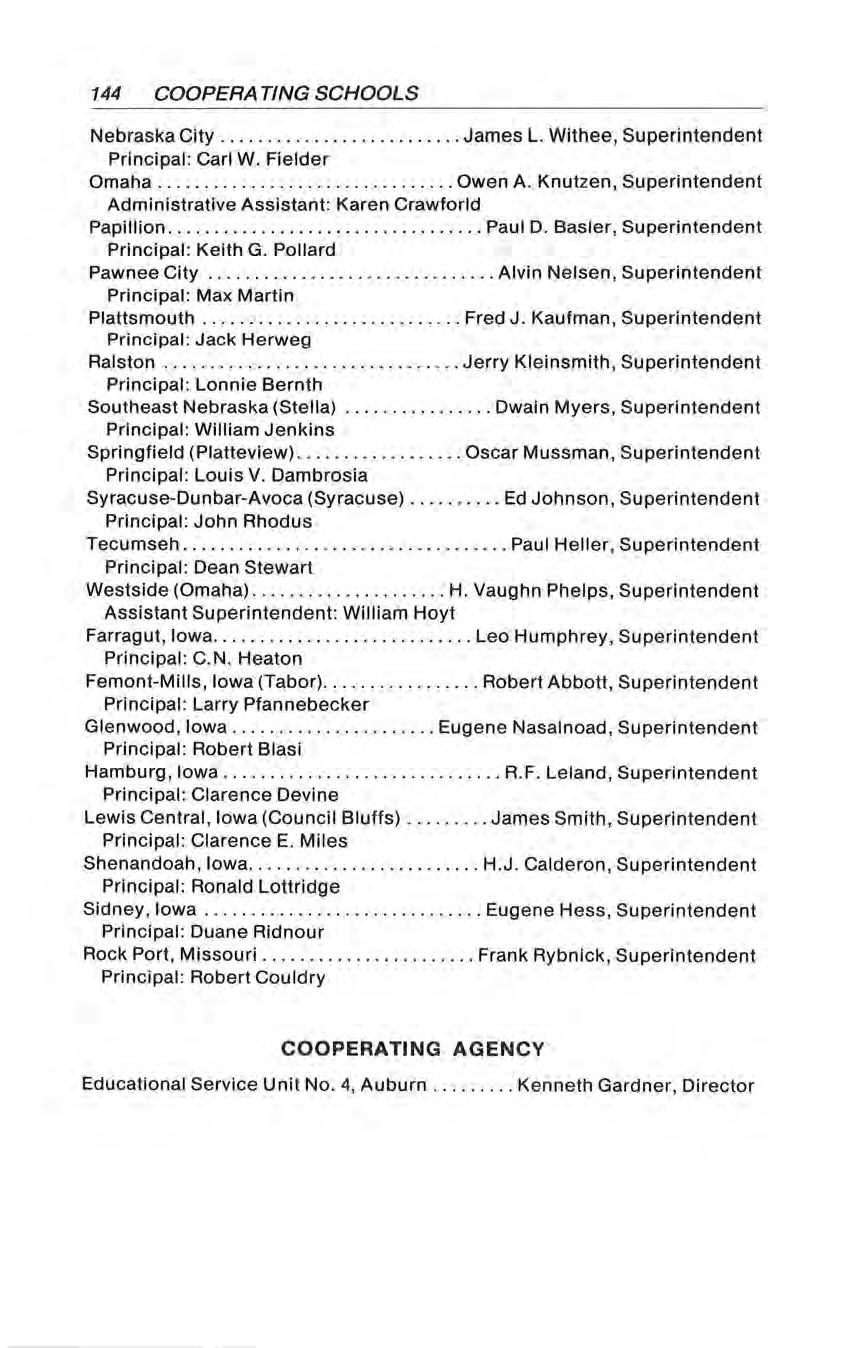
Educational Service Unit No. 4, Auburn
Kenneth Gardner , Director
